More from the Blog
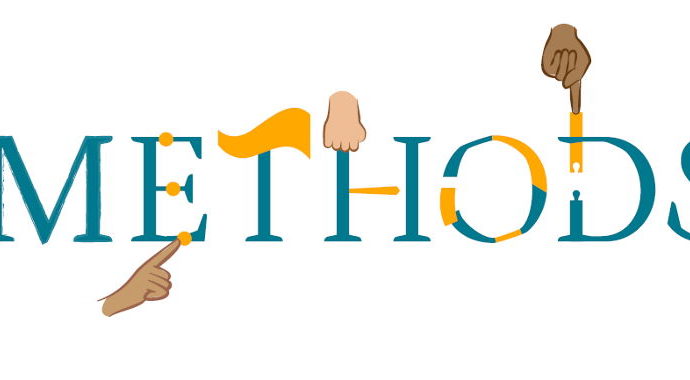
Challenging Research
In a series of events in 2021 entitled Challenging Research, we asked critical questions on the way we use and think about methodologies in sustainability research. About the series Faced…
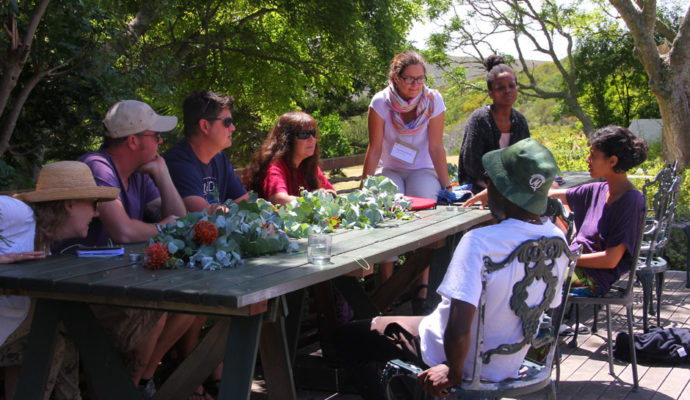

How do researchers’ roles relate to the methods they work with?
Throughout 2021, through a series of virtual events, we explored a wide range of methods that sustainability researchers are using and combining to both generate knowledge and contribute to positive…
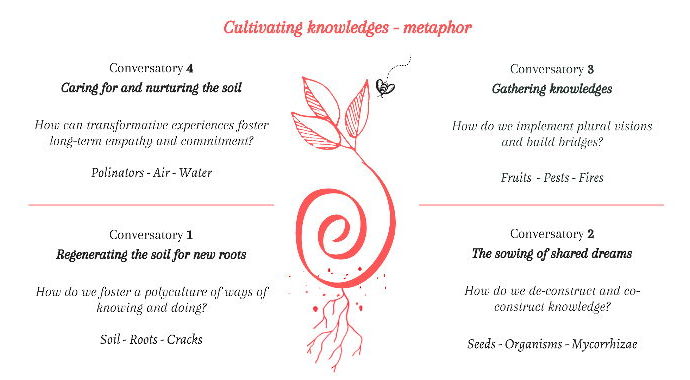


Caring for and nurturing the soil – Umbela Conversatorio #4
In connection with our 2021 Methods theme, the Mexico-based NGO Umbela – Transformaciones Sostenibles has held a series of online events on the theme of ‘Cultivating Knowledges’. In this fourth…



Gathering knowledges – Umbela Conversatorio #3
In connection with our 2021 Methods theme, the Mexico-based NGO Umbela – Transformaciones Sostenibles has held a series of online events on the theme of ‘Cultivating Knowledges’. In this third…
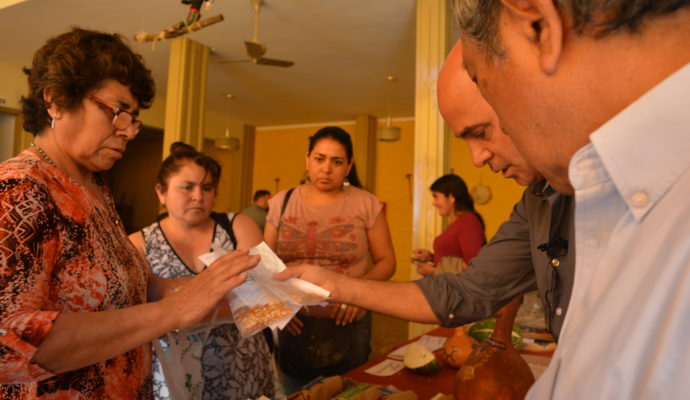

Regulating technologies in diverse development contexts – looking back to look forward
by Adrian Ely, Vanesa Lowenstein and Yuhan Bao As part of the STEPS Centre’s final event on 8 December, we’ll be reflecting on the changes since the Centre’s project ‘Rethinking…




The ‘Methods bazaar’: what did we learn about transdisciplinary methods for sustainability?
What methods can help to ‘open up’ and ‘broaden out’ pathways to sustainability, revealing alternatives to one-track visions of progress and expertise? Sustainability challenges – from Covid-19 to climate change,…
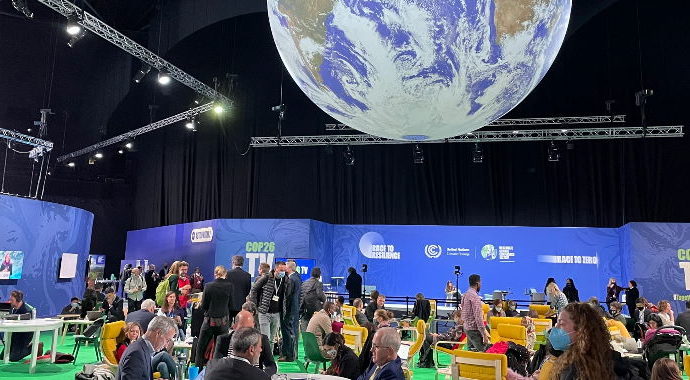

COP26: Two worlds talked past each other – or never even met
At the 2021 UN climate change conference in Glasgow, moving between the corporate slickness of the official “Blue Zone” (a UN-managed space which hosts the negotiations) and the wider fringe…
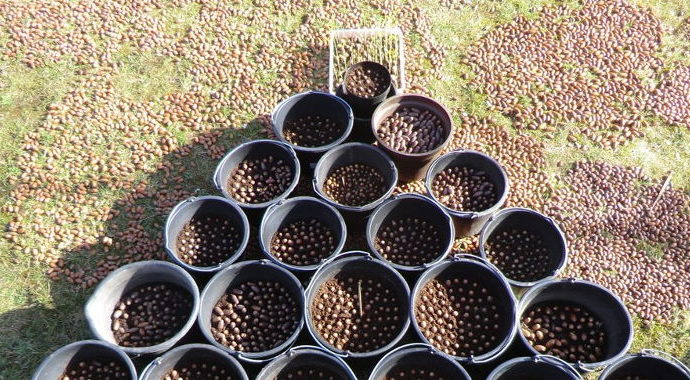

Why carbon offsetting through tree planting won’t help solve the climate crisis
This is the second in a pair of blog posts focusing on tree planting, climate change and biodiversity. Read the first here. The first phase of the delayed Biodiversity Convention…
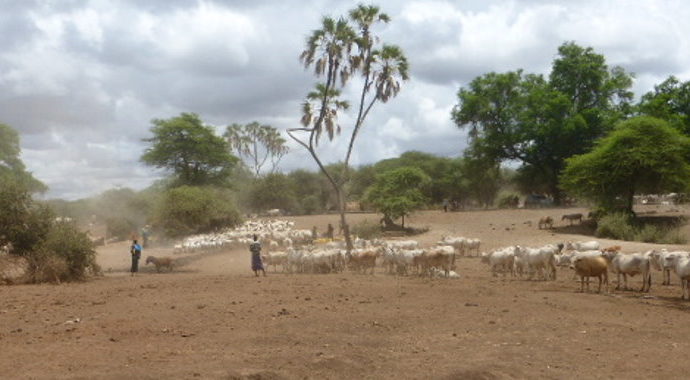

Is mass tree-planting the answer to biodiversity and climate challenges?
Tree planting and ‘nature-based’ solutions are presented as a way to address biodiversity and tackle climate change at a massive scale. But in some cases, these schemes can undermine livelihoods…
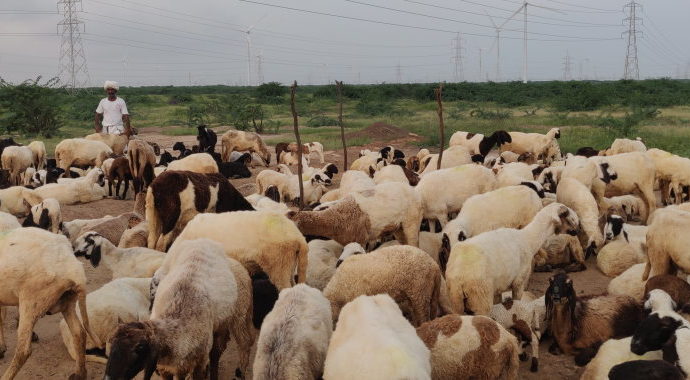

How do we put pastoralists at the centre of food and climate debates?
Last month’s UN Food Systems Summit was highly controversial. Back in July, around the pre-summit process, small-scale farmers and their allies raised concerns that the agenda was being set by…
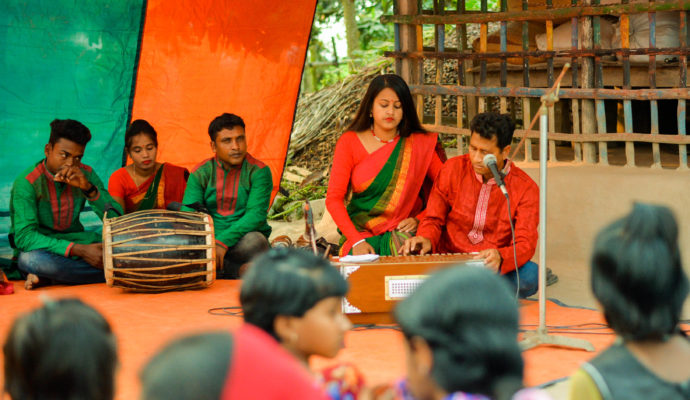

Printing the Calamity: Pattachitra Scrolls on Tropical Cyclones and Natural Disasters in Shyamnagar, Shatkhira
By Sumaiya Binte Anwar, Research Officer, ICCCAD; Mahmuda Akter, Research Officer, ICCCAD; Faizah Jaheen Ahmed Research Intern, ICCCAD “We are the people of coastal area, Our sufferings know no bounds,…
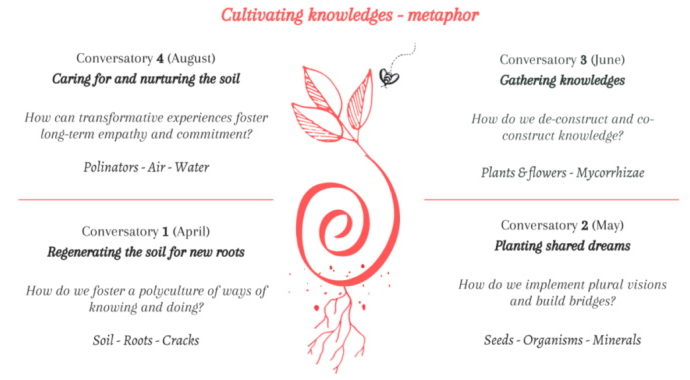

Methods: The sowing of shared dreams – Umbela Conversatorio #2
In connection with our 2021 Methods theme, the Mexico-based NGO Umbela – Transformaciones Sostenibles is holding a series of online events on the theme of ‘Cultivating Knowledges’. In the second…
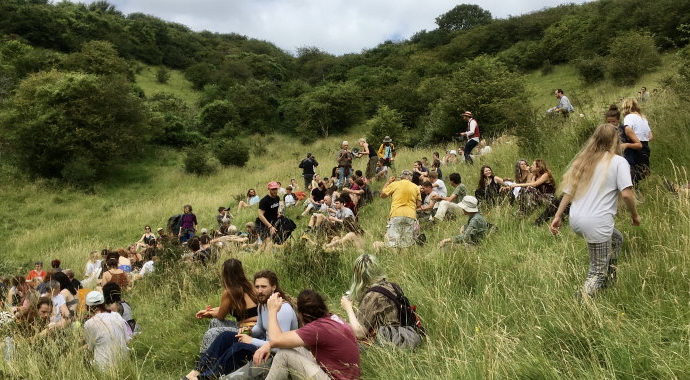

Land reform in the UK: reporting from the Mass Trespass
Access to land is not only a concern in places like Zimbabwe. In England, less than 1% of the population own half the land and 92% of land is out…



Is Degrowth already colonial?
by Saurabh Arora and Andy Stirling We are very grateful to Timothée Parrique for engaging so thoughtfully with our essay on ‘degrowth and the pluriverse: continued coloniality or intercultural revolution’?…
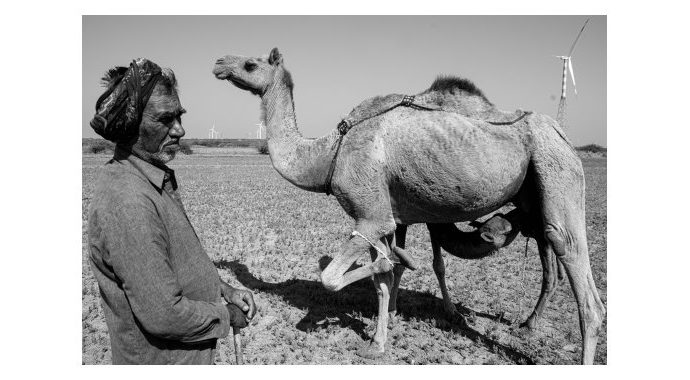

How could camel milk change the fortunes of Gujarat’s pastoralists?
by Ranit Chatterjee, Rohit Jha, Sahjeevan, Shilpi Srivastava, Lyla Mehta, Nobuhito Ohte, Shibaji Bose, TAPESTRY project Kachchh is a dryland in Western India with a dynamic ecosystem. The livestock-based economy…
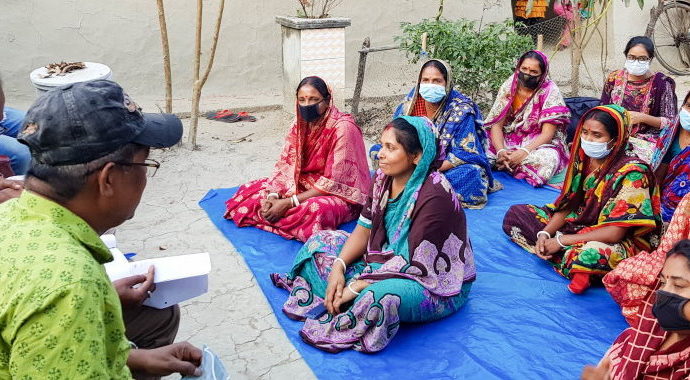

Faced with devastating cyclones, how are women in coastal Bangladesh building resilience?
by Sumaiya Binte Anwar and Mahmuda Akter, Research Officers, ICCCAD In recent years, cyclones have battered the coastal fringes of Bangladesh, with one following closely after another. In Satkhira district,…
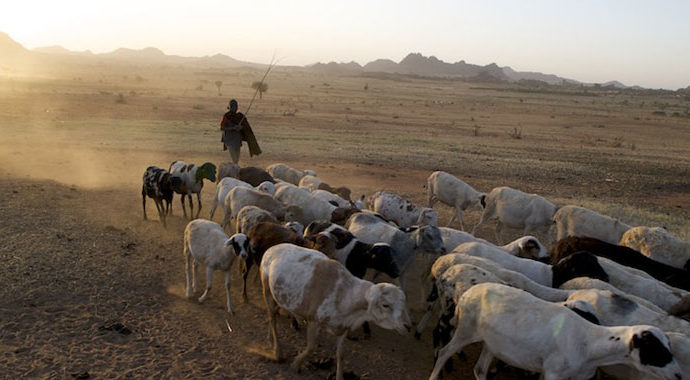


Beyond the ‘Balance of Nature’: Pastoralists’ Alternative Perspectives on Sustainability
By Ian Scoones and PASTRES Read the original blogpost David Attenborough’s mission to restore the balance of nature in the documentary A Life on Our Planet: My Witness Statement, is at…




Degrowth and the pluriverse: continued coloniality or intercultural revolution?
by Saurabh Arora and Andy Stirling UPDATE – 12 May 2021: Timothée Parrique, researcher and author on degrowth, has posted a response to this essay on his website. “And then…
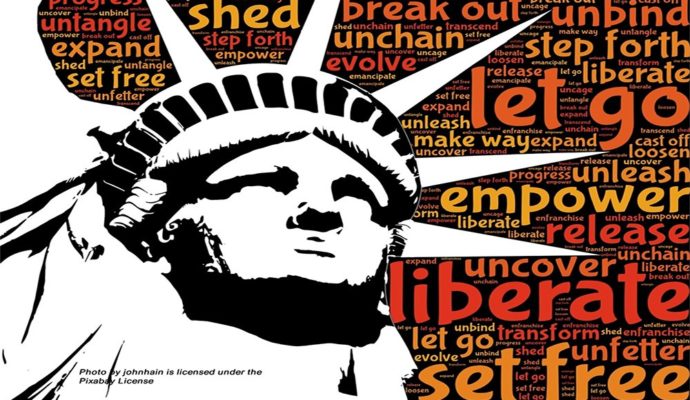

Challenging power through methods
By Linet Mwirigi, Maureen Kabasa, Kennedy Mbeva and Joel Onyango In every sphere of life, different methods and power relations are at play. The dynamics and dimensionality of power and…
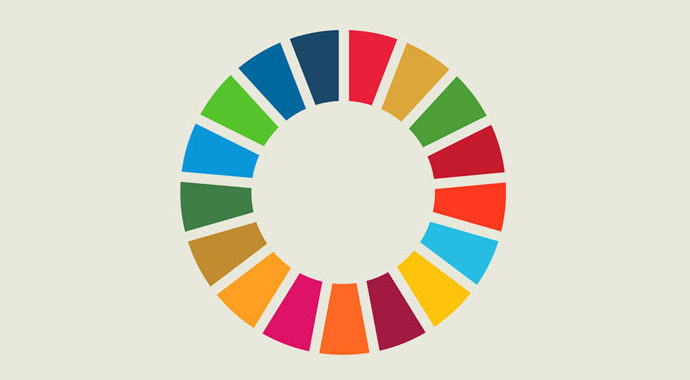



To meet the Sustainable Development Goals, we must transform innovation
By Saurabh Arora and Andy Stirling This blogpost is republished from STRINGS (Steering Research and Innovation for Global Goals). In 1925, Mahatma Gandhi famously included ‘science without humanity’ and ‘knowledge…


Waves of challenging research for sustainability
by Patricia Pérez Belmont, Umbela Transformaciones Sostenibles How can research methods inform and catalyse change towards more sustainable worlds? Last month, the STEPS Centre held an online event to launch…


A crossroads for ‘genome editing’ in Europe – questions, options and dilemmas
A new policy briefing on genome editing discusses choices and dilemmas facing policy makers and societal stakeholders in the European Union and the United Kingdom. The UK is considering changing…




How do we ‘decolonise’ research methodologies?
by Nora Ndege and Joel Onyango, Africa Research and Impact Network / African Centre for Technology Studies This blog post is part of the STEPS Centre’s 2021 theme on Methods….
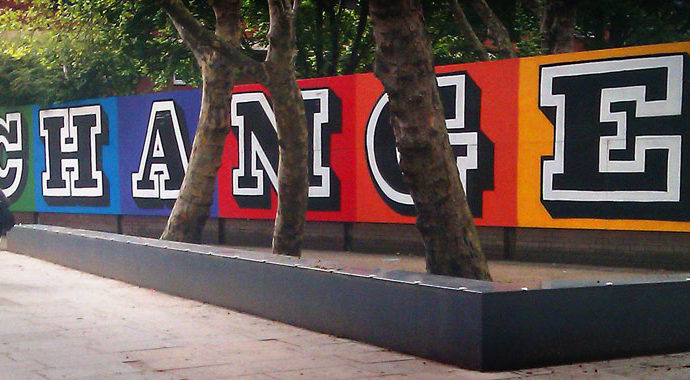


Post-pandemic transformations: new directions for development studies?
by Melissa Leach, Hayley MacGregor and Ian Scoones Does the pandemic reveal new directions for development studies? This was the focus of discussion at a recent IDS seminar. A new…




Challenging sustainability research: how can methods make a difference?
by Marina Apgar and Rose Cairns, Methods theme convenors In this introductory blogpost for the STEPS theme on Methods, we discuss three meanings of sustainability research as ‘challenging research’. Methods…



The STEPS Centre’s final year: reflections on a 15-year journey
by Ian Scoones and Andy Stirling, STEPS co-directors 2021 is the final year of the ESRC STEPS Centre. Established in 2006, but with an even longer backstory, we have come…


“The world has become weird”: crisis, natures and radical re-enchantment
In this essay, Amber Huff and Nathan Oxley reflect on questions that have emerged through Natures, the STEPS Centre’s theme throughout 2020. Dear Reader, I hope that this essay finds…
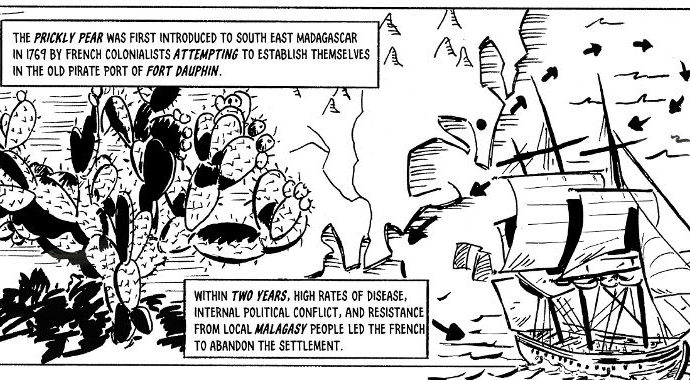

The Killing Famine: an outsider’s view of conservation and colonialism
The Killing Famine is an original comic by the artist Tim Zocco, who has been working with the STEPS Centre throughout 2020. In this piece, Tim Zocco reflects on a…


Weird ecologies
In this short post, Amber Huff (STEPS/IDS) and Adrian Nel (University of KwaZulu Natal) introduce the idea of ‘weird ecologies’ and explains why ‘the Weird’ has such an enduring appeal…


Genome editing in post-Brexit agriculture: Which way for the UK?
Angela Noland, Dominic Glover and Adrian Ely In less than a month’s time, the UK’s relationship with the European Union will change dramatically. Agriculture and food will be among the…
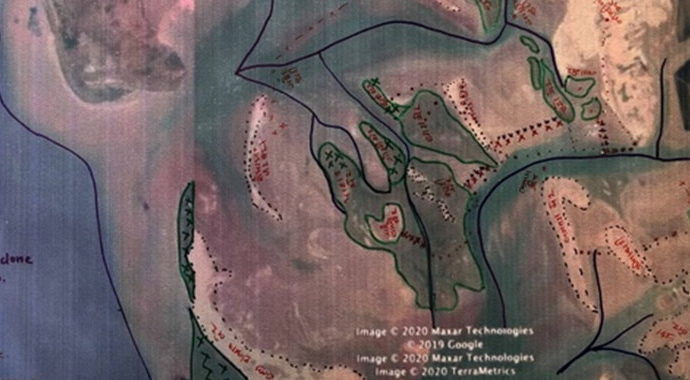

How do we study mangrove ecology with pastoralists in Kachchh?
by Ranit Chaterjee, Pankaj Joshi, Mahendra Bhanani, Mahesh Garva and Nobuhito Ohte As part of the TAPESTRY project, we are working to understand the ecology of mangroves in Kachchh, on…
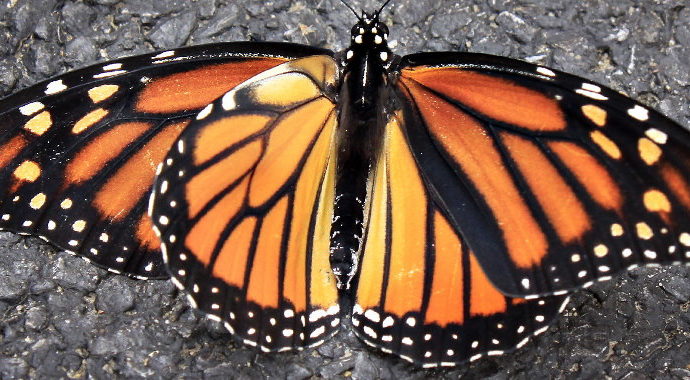

Transformation in a crisis: reflections on research and action
This is a personal reflection from Lyla Mehta on the Transformations to Sustainability mid-term workshop, which took place virtually in June 2020. Find out more about the meeting and see…


Don’t save ‘the world’ – embrace a pluriverse!
by Saurabh Arora and Andy Stirling The United Nations is 75 years old on 24 October 2020. It’s an unfortunate year to be reaching this milestone. Apart from global pandemic…
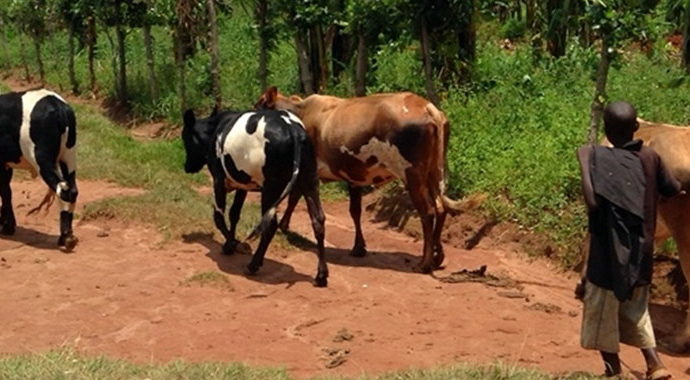

Does the African Green Revolution include smallholder farmers?
This year’s African Green Revolution Forum (AGRF) took place online, hosted out of Kigali, Rwanda. Chaired by the Alliance for a Green Revolution in Africa (AGRA), the AGRF is a…


The ‘weight’ of humanity: questions on Attenborough’s ‘A Life On Our Planet’
Two images stand out in David Attenborough’s new film A Life On Our Planet. The first is of the “blue marble”, the Earth, viewed from a spacecraft for the first…
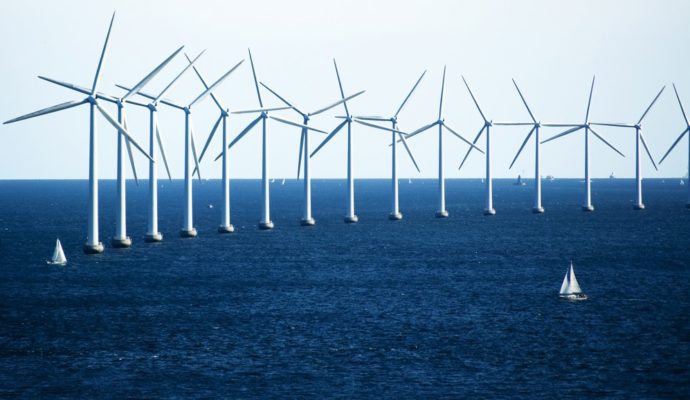

Nuclear vs renewables: what’s better for climate mitigation?
This is an adapted version of a Nature.com blog by Prof Benjamin K. Sovacool and Prof Andy Stirling, to accompany the publication of their paper “Differences in carbon emissions reduction…
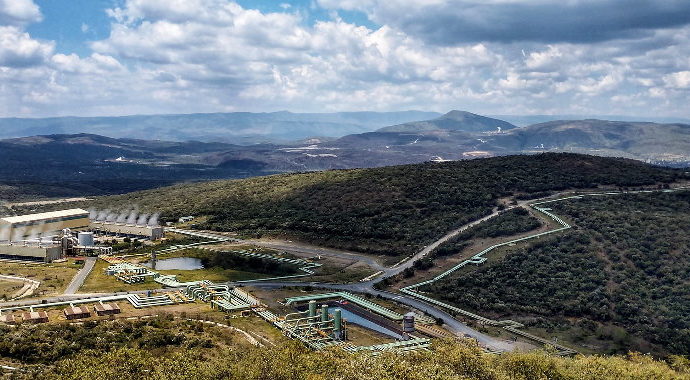

How have large investment projects affected people in Africa’s drylands?
by Jeremy Lind, Doris Okenwa and Ian Scoones In recent years, the gaze of global investment has been directed to Africa’s land and resources. Over the past decade, global capital…
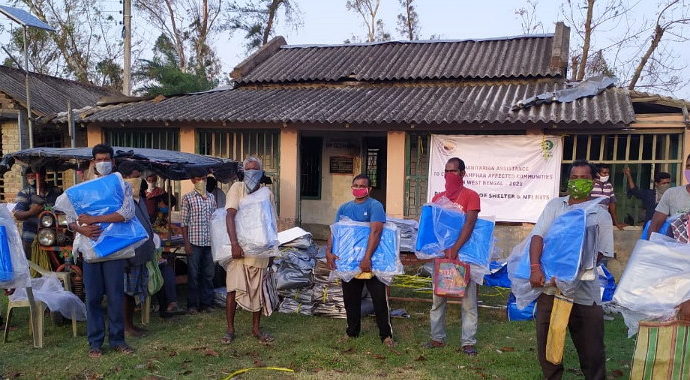

Rebuilding same or rebuilding different? Critical questions in the aftermath of Cyclone Amphan
by Upasona Ghosh, Shibaji Bose, Debdatta Chakraborty, TAPESTRY project “We will build it again. We have done the same before and might have to do it many a time in…
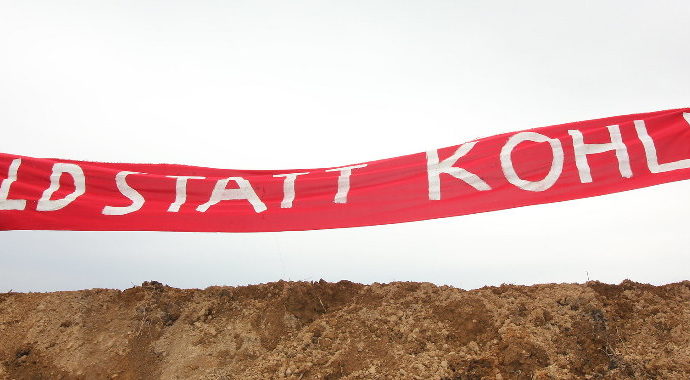

Thriving in an ever-changing world: from technocratic control to emancipatory care?
This is the fourth and last in a series of blog posts on the climate by STEPS co-director Andy Stirling, under the heading: ‘Controlling a stable planetary climate – or…



Betraying the climate? Has environmentalism succumbed to a modernity it hitherto resisted?
This is the third in a series of four blog posts on the climate by STEPS co-director Andy Stirling, under the heading: ‘Controlling a stable planetary climate – or caring…
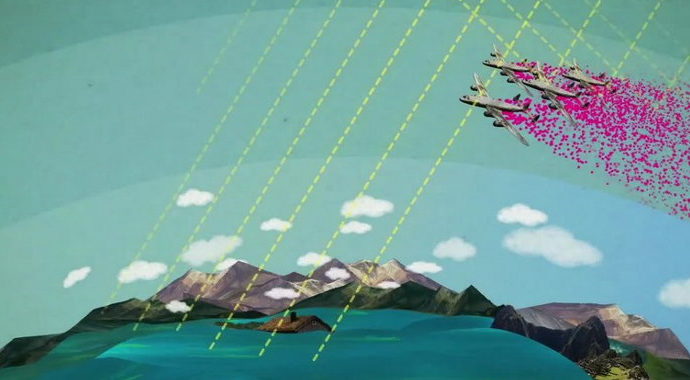

Does the delusion of ‘climate control’ do more harm than good to climate disruption?
This is the second in a series of four blog posts on the climate by STEPS co-director Andy Stirling, under the heading: ‘Controlling a stable planetary climate – or caring…
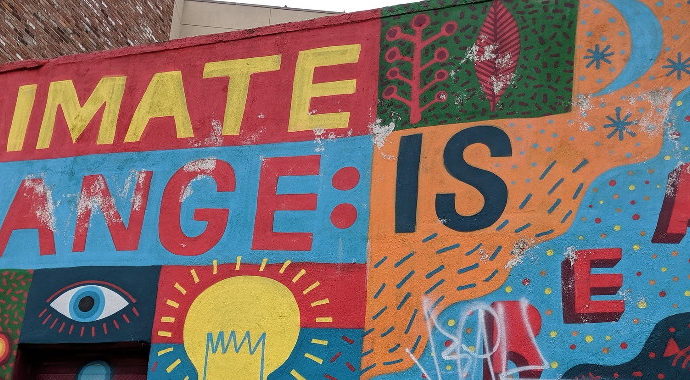

Is the naming of ‘climate change’ a dangerous self-defeat?
This is the first in a series of four blog posts on the climate by STEPS co-director Andy Stirling, under the heading: ‘Controlling a stable planetary climate – or caring…
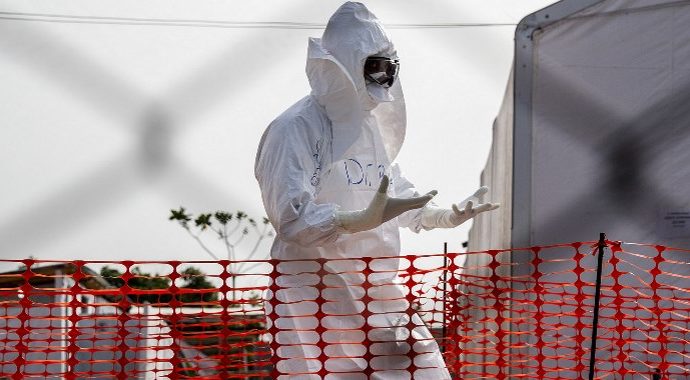

Pandemics: why a new science is needed
What do bubonic plague, Lyme disease, Ebola, Marburg disease, Nipah, sleeping sickness, Lassa fever, avian influenza, Western equine encephalitis, SARS and COVID-19 have in common? All are zoonotic diseases, ones…
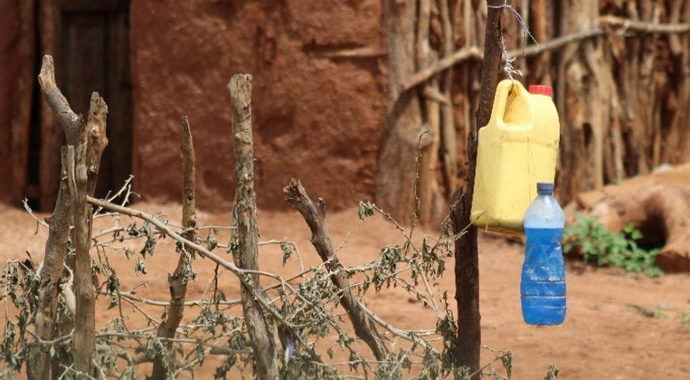

Covid-19 is a stark reminder of the struggle for rights to water and sanitation
On the 10th anniversary of the UN’s recognition of the human right to access water and sanitation, Lyla Mehta and Claudia Ringler reflect on the lessons from Covid-19 and the…
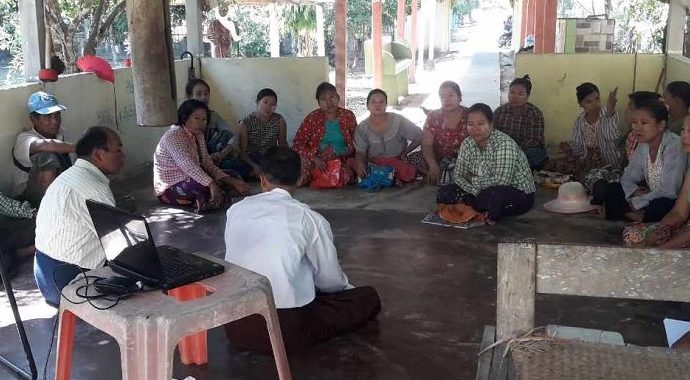

Project pioneers innovative workshops with Myanmar pig farmers
In advance of World Zoonoses Day 2020, this year on Monday, 6 July, we are sharing a story from the Myanmar Pig Partnership project which has been taking a One…
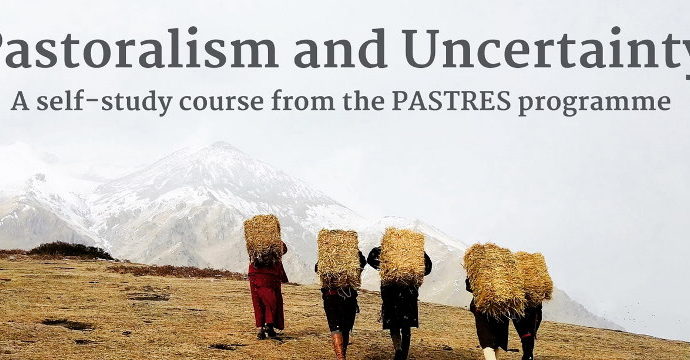

Online course: Pastoralism and Uncertainty
A new online course introduces key debates and concepts about pastoralism, and explores the varying ways that pastoralists respond to uncertainty around the world. Based on the work of PASTRES,…
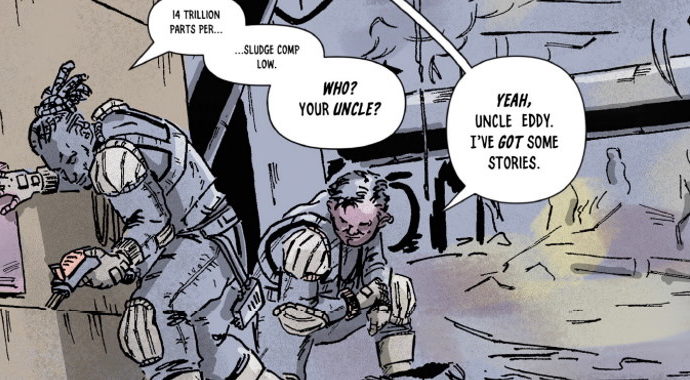

Comic: ‘These Days…’ Covid, crisis and beyond
In our Natures theme for 2020, we are collaborating with the artist Tim Zocco. In the comic ‘These Days…’, a glimpse of a future age shaped by traumatic events, Zocco…
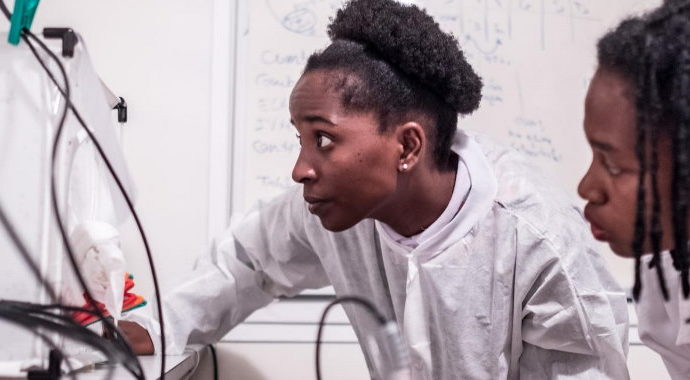

Improving Africa’s knowledge systems: six lessons from Covid-19
The Covid-19 situation is unprecedented and is reshaping various aspects of society, including the way we produce knowledge, share it and use it. In this blog post, Joanes Atela and…
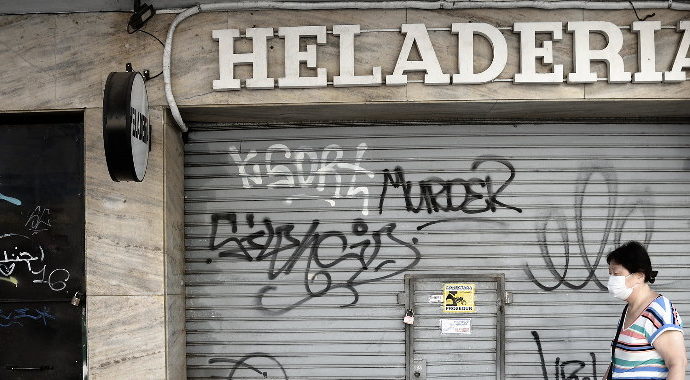

Coronavirus, crisis and the real Argentine economy: post-pandemic challenges
This article was first published in Spanish in the newspaper Pagina12 on 10 May 2020. Read the original article A window of opportunity is opening to reshape the organization of…
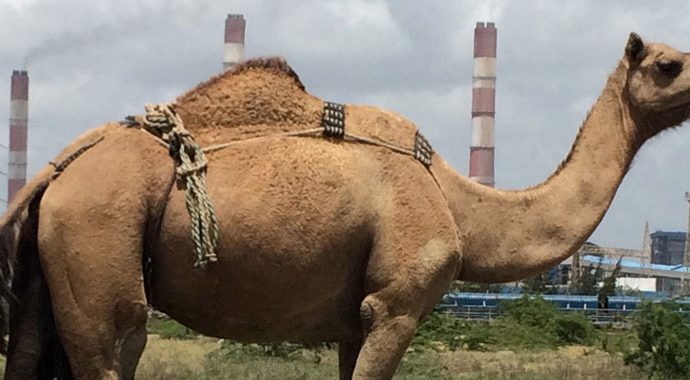


How pastoralists in Kutch respond to social and environmental uncertainty
The TAPESTRY project is working in three different ‘patches’ across India and Bangladesh, creating opportunities for interactions with communities in marginalised environments to co-produce transformative change in sustainable development. In…
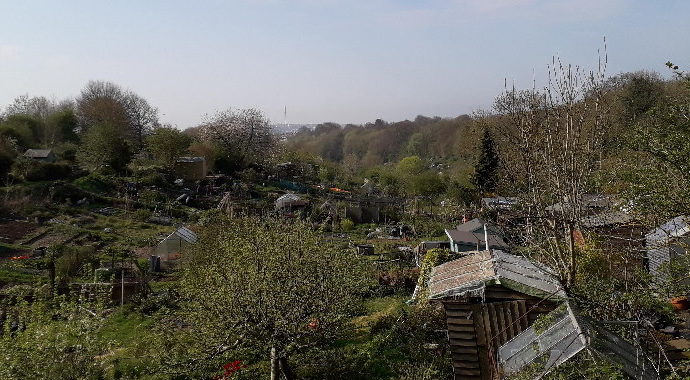

Food in the time of Covid-19: how can local action and national coordination work together?
As we approach the end of week 7 of the UK government’s Covid-19 social distancing measures, we have been witnessing a combination of remarkable efforts to sustain the country through…
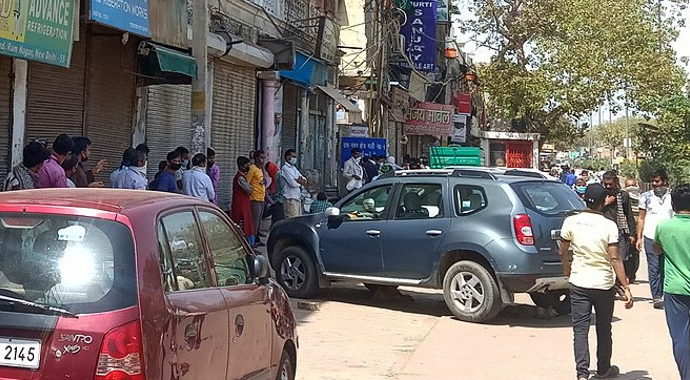

COVID-19, science and governance: lessons from India
by Dinesh Abrol, Ritu Priya and Pravin Kushwaha, South Asia Sustainability Hub The pandemic is global, but the response is local. In India, the first case of the 2019–20 coronavirus…
Five lessons from past global influenza outbreaks for COVID-19
The COVID-19 pandemic is a rare event in its scale and spread. But in responding to it, people have been looking at lessons from other outbreaks of infectious disease. What…
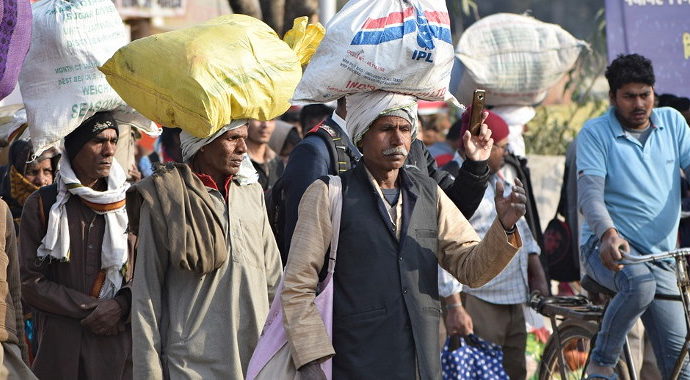

The COVID-19 pandemic shows how power produces poverty
by Saurabh Arora and Divya Sharma Responses by governments to the COVID-19 pandemic around the world reveal how poverty is produced by social power. The pandemic points, in particular, to…



Modernity Without its Clothes: the pandemic crisis shines a light on futilities of control
With so many self-appointed pundits (like me!) currently locked down with their laptops, the present rush of commentary on how to pivot the coronavirus crisis is hardly surprising. Beyond the…


Sharing knowledge instead of food: TAPESTRY at the Versova Koli Seafood Festival
The TAPESTRY project is working in three different sites across India, creating opportunities for interactions with communities in marginalised environments to co-produce transformative change in sustainable development. In this blog…



Post-normal pandemics: Why COVID-19 requires a new approach to science
Guest post by David Waltner-Toews1, Annibale Biggeri2, Bruna De Marchi3, Silvio Funtowicz3, Mario Giampietro4,5, Martin O’Connor6,7, Jerome R. Ravetz8, Andrea Saltelli3,9 and Jeroen P. van der Sluijs3,10 READ THIS ARTICLE…


Science, uncertainty and the COVID-19 response
One of the abiding images of the coronavirus (COVID-19) outbreak in the UK has been the Prime Minister, Boris Johnson, looking nervous and uncomfortable, flanked by his scientific advisors at…
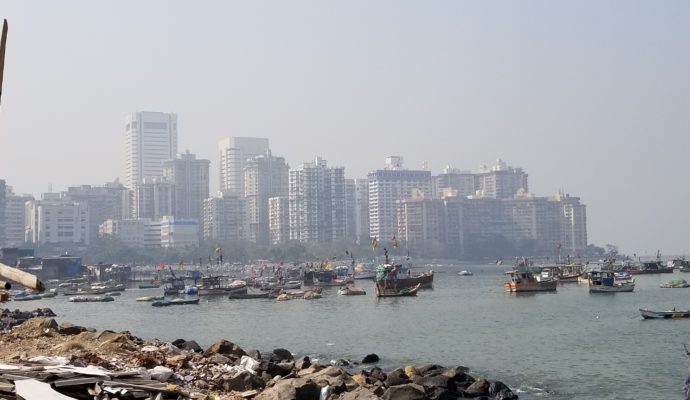

Claiming space: infrastructure, uncertainty and fisherfolks’ livelihoods in Mumbai
Blog post by Synne Movik and Hans Nicolai Adam (from the TAPESTRY project team) The coastal mega-city of Mumbai is a vibrant bustling hub, home to some 20 million people…
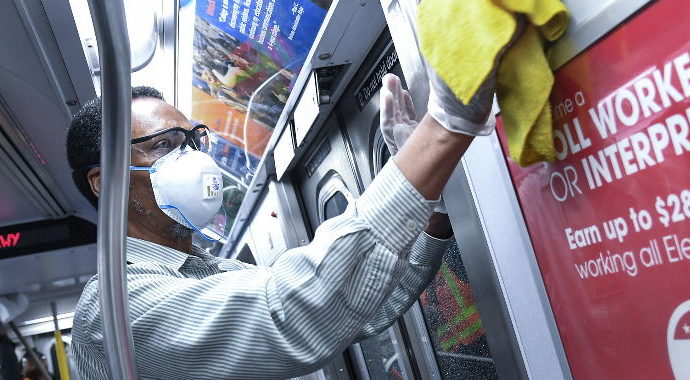

Should we treat the climate crisis like coronavirus?
Why don’t we respond to climate change with the same urgency as coronavirus? The Guardian writer Owen Jones asked this in a new column, making the case that the impacts…
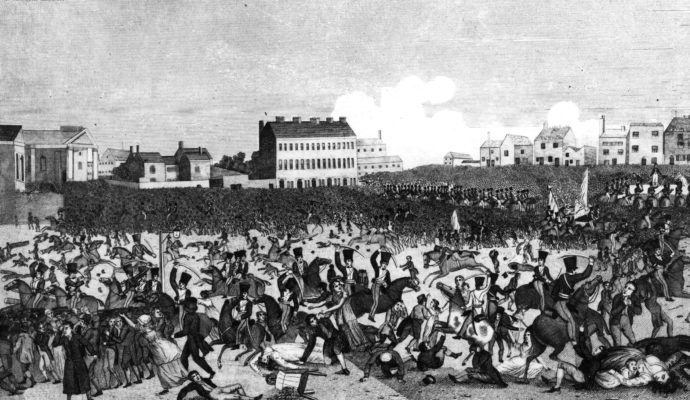

A big-picture view on the climate negotiations: how can transformation(s) happen in practice?
by Hans Nicolai Adam and Synne Movik As the world stares at alarming evidence of climate change impacts, the search for ‘big bang’ solutions remains challenging. The situation requires nothing…


How to respond to Nature in crisis: look beyond the big stories
The STEPS Centre’s theme for 2020 is Natures. In this introductory blog post by Amber Huff and Nathan Oxley, we look at four lines of enquiry that can help us…
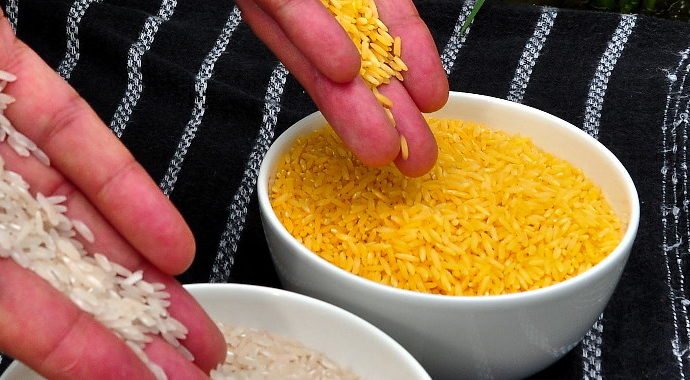

The Philippines has rated ‘Golden Rice’ safe, but farmers might not plant it
by Glenn Davis Stone and Dominic Glover “Golden Rice” is probably the world’s most hotly debated genetically modified organism (GMO). It was intended to be a beta carotene-enriched crop to…
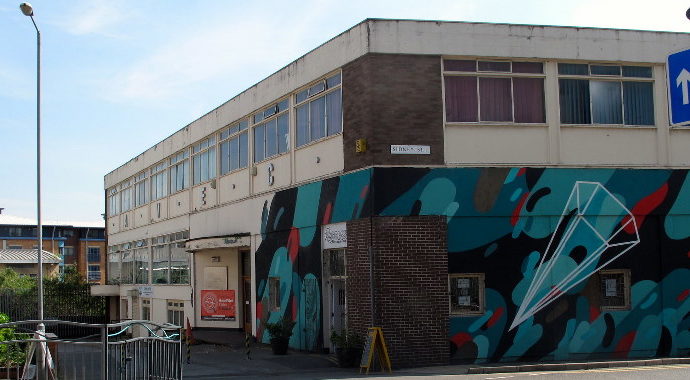

Human capabilities for innovation in UK makerspaces
by Cian O’Donovan and Adrian Smith Makerspaces can be a source of human capabilities that benefit people and society. But these capabilities will only lead to flourishing communities if they…
Community, belonging, identity
Yesterday, Andrea Nightingale visited IDS and we had a discussion about ‘boundary-making’. Her research in Nepal looks critically at what boundaries mean, how they are made, and how they are…


The 2020 Davos Manifesto: A Manifesto for the Past, Rather than the Future
Out of the networking orgy that is the World Economic Forum (WEF) has emerged the Davos Manifesto 2020: ‘The Universal Purpose of a Company in the Fourth Industrial Revolution’. Unfortunately,…
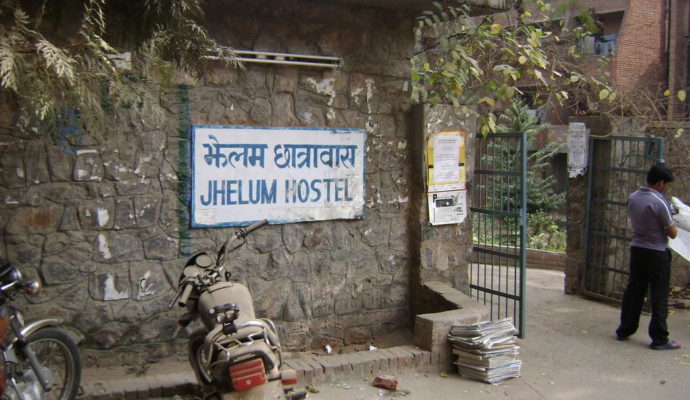

India’s new citizenship act threatens the country’s constitution
A version of this post first appeared on the Institute of Development Studies website. Since the end of 2019, India has been rocked by protests against the Citizenship Amendment Act…
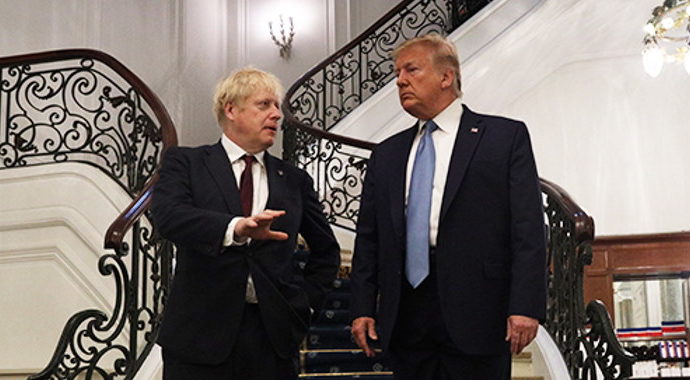

Rural support for authoritarian populism is strong – but another way is possible
The rise of authoritarian populism continues. Now the UK has a fully signed-up version in its new right-wing government, with allies in Trump, Modi, Bolsarano, Orban and others. It is…
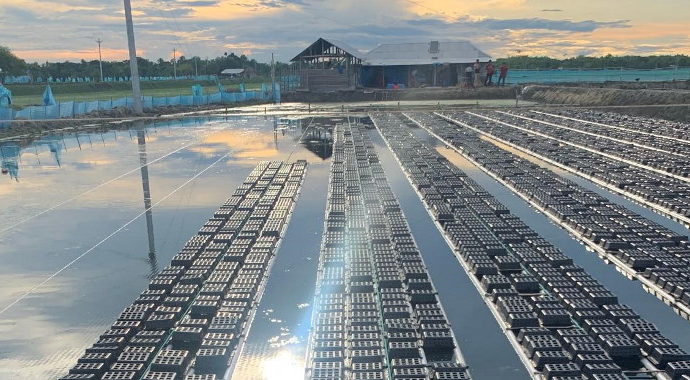

A Tale of Crab Farming in Satkhira: Navigating Uncertainties ‘from below’ in the Sundarbans
The TAPESTRY research project is exploring how transformations may occur ‘from below’ in marginal environments with high levels of uncertainty. In this blog post, Shababa Haque and Mahmuda Mity, part…
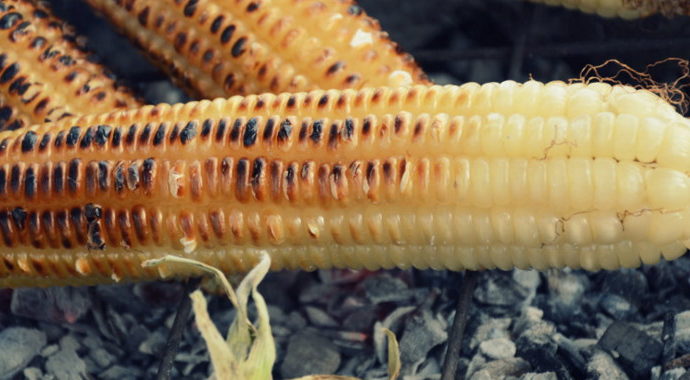

What can the land-water-environment ‘nexus’ do for young farmers in Kenya?
The agrifood system is one of the best examples of the ‘nexus’ of land, water, and the environment. In Kenya, as in some other African countries, there is a push…


Why does public research money often fail to support sustainable and just food systems?
The European Union and its Member States spend considerable amounts of their budget on supporting Research and Development (R&D) activities. In the summer of 2019, the EU Commission announced how…


How can we rethink progressive transformations to sustainability?
In a series of three recent blog posts, Andy Stirling reflects on the governance of transformations to sustainability, and what it means for opening up spaces for politics and democracy….
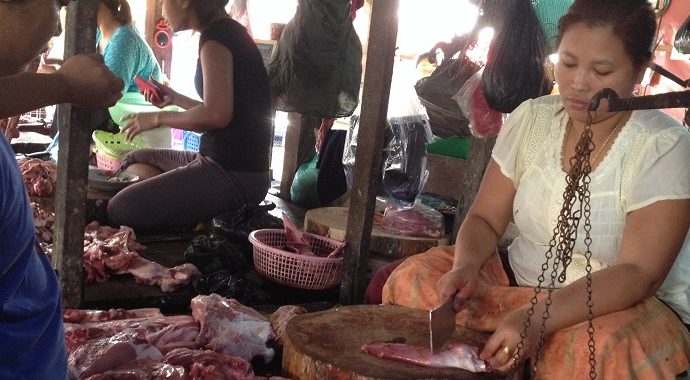

Going deeper with value chain analysis: understanding power relations for animal disease control in Myanmar
Value chain analysis is already praised as a powerful tool for animal disease control. International organisations such as the UN’s Food and Agriculture Organization (FAO) routinely conduct value chain analyses…
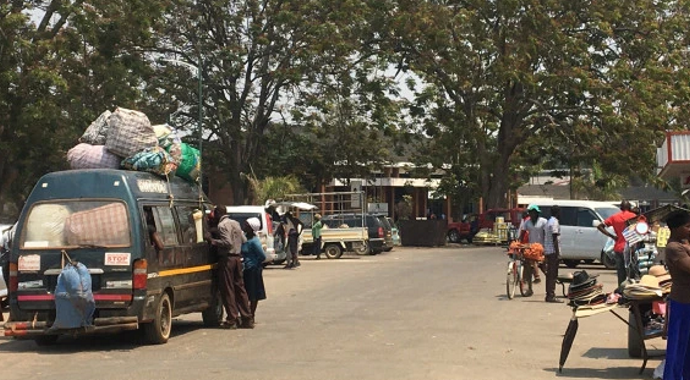

Uncertainty and the Zimbabwean economy
Over the last month there have been a number of reviews of progress – or the lack of it – since the ‘coup’ of November 2017 (see, for example, a…
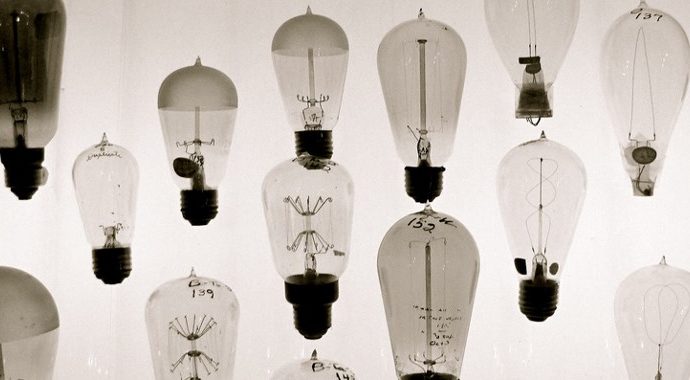

Doing digital differently: four innovation lessons from the grassroots
by Adrian Smith, Adrian Ely and Phil Jones When Knowle West residents met with artists Paul Hurley and Caleb Parking in 2016, they had little idea they were at the…
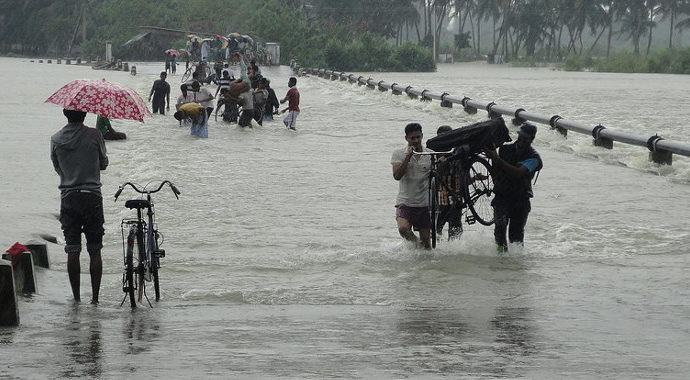

How can NGOs feel at home with uncertainty?
by Irene Guijt, Head of Research and Publishing at Oxfam Great Britain Uncertainty is a given in Oxfam. Each day brings new concerns, unexpected twists in relationships and the rollercoasters…
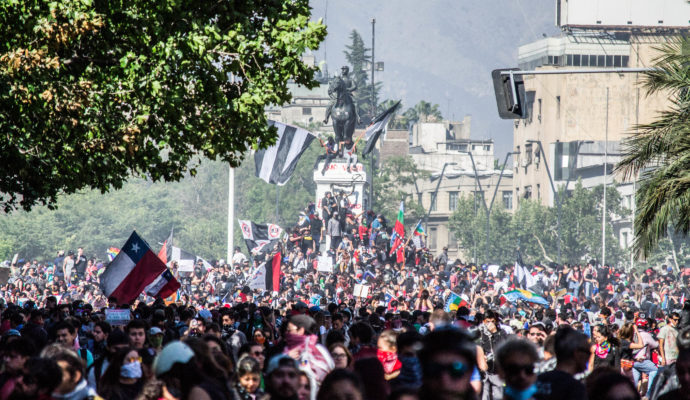

Transdisciplinarity and transformative spaces: six reflections for researchers
For transformations to sustainability to be socially and ecologically just, they must derive from diverse, discursive processes embedded in specific political contexts and cultural conditions. Questions arise from this statement:…
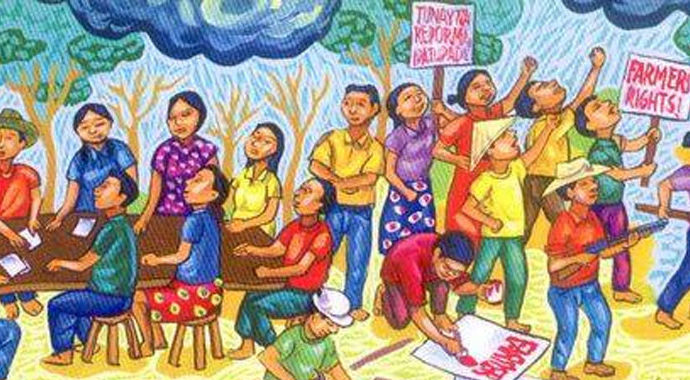


Rural resistance and the far right: news from ERPI Europe
The Emancipatory Rural Politics Initiative (ERPI) is continuing to explore changes and conflicts in rural politics, with a couple of forthcoming events and some publications from the Europe group of…


Now is the time to rise up for Rojava
Kurdish-led Syrian Democratic Forces have been betrayed by the US, giving the Turkish state a green light to carry out atrocities in Northern Syria, write Amber Huff and Patrick Huff. This blog…
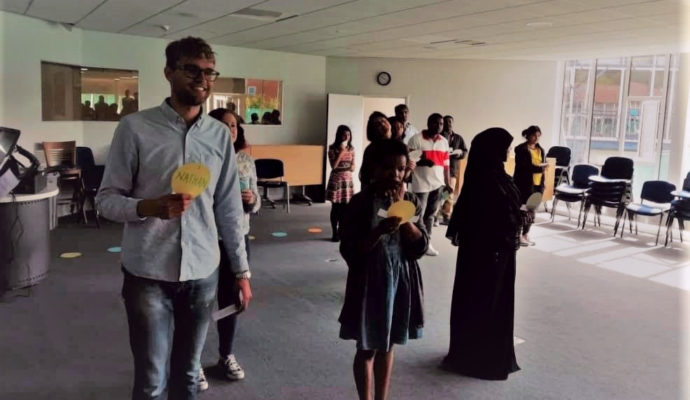

Politicising Pathways: illustrating Relational Power using the Vulnerability Walk
Blog post by Soundarya Iyer, Sayan Das, Uma Dey Sarkar, Natasha Maru, Nimita Pandey and Masresha Taye. In an increasingly complex and dynamic world, how can we envision and strive…
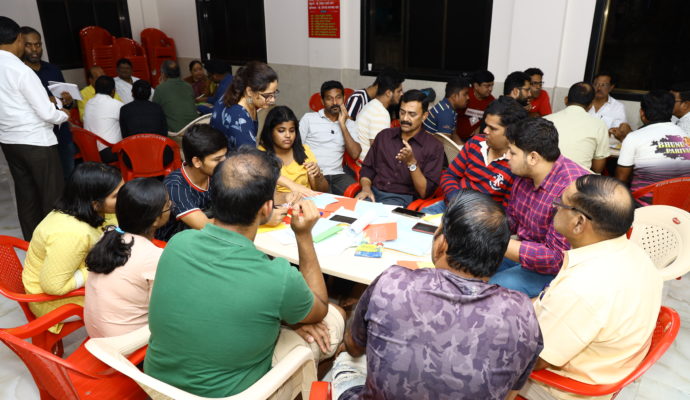

A participatory approach to initiating transformative actions from the bottom-up
Jai and Ketaki Bhadgaonkar (Bombay 61) give this report from the Ideation Workshop in Mumbai for the TAPESTRY project. Versova Koliwada is one of the most thriving fishing villages in…
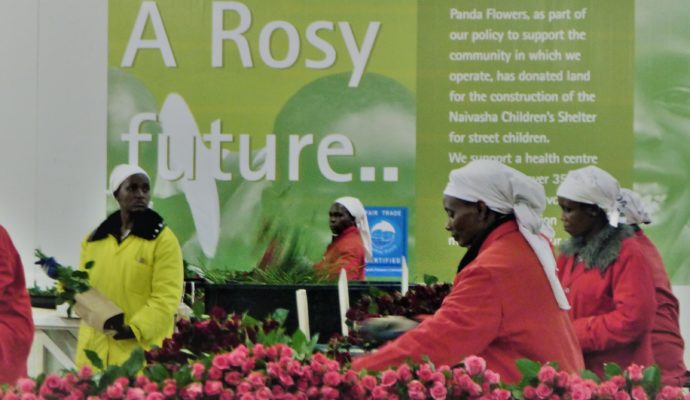

Envisioning the future in the present: making sense of uncertainty
The STEPS symposium on ‘the politics of uncertainty’ made me think about a couple of questions that I have been concerned with in my research work, but that I have…
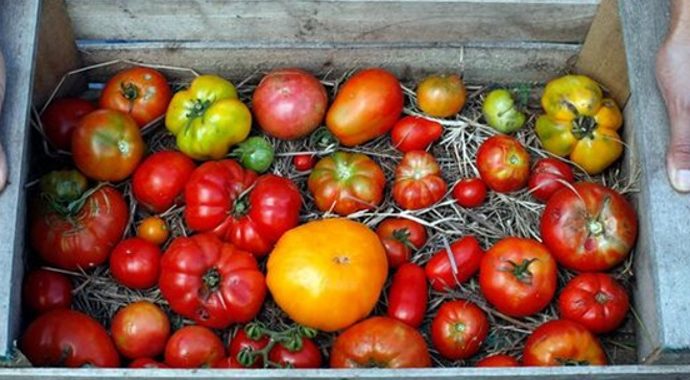

Experimentation to action: how Bioleft is helping to grow an open source seed culture
by Almendra Cremaschi, Patrick van Zwanenberg & Anabel Marin The seed breeding initiative Bioleft has received funding to work with more varieties of seeds in Argentina, and to develop a…
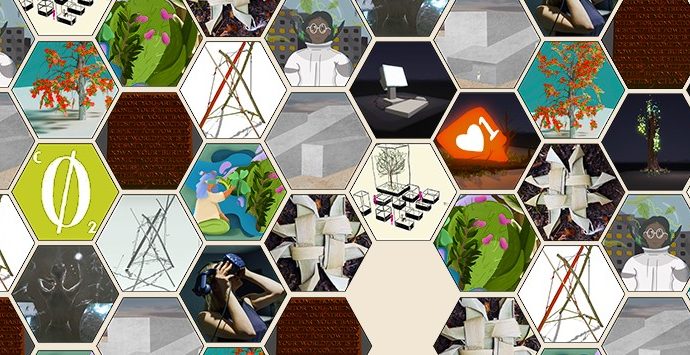

Infrastructures of the imagination: uncertainty and the politics of prefiguration
By Martin Mahony and Silke Beck Sticky imaginaries, shifting frames, irreducible incertitude . . . the recent Politics of Uncertainty symposium gave us much to reflect upon in the context…
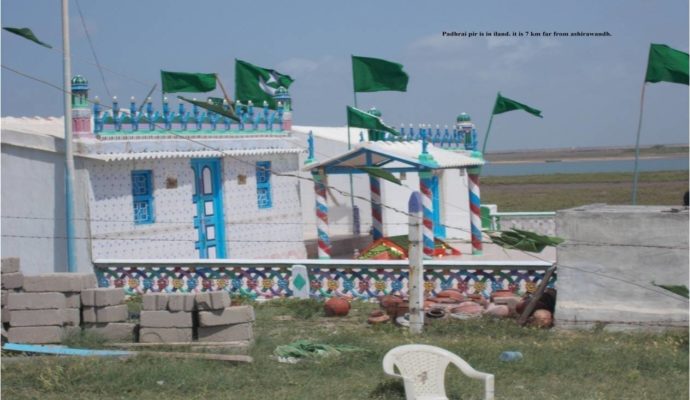

Embracing uncertainty: lessons from journeys and struggles
Michele Nori, Rose Cairns and Nathan Oxley Embracing uncertainty, by choice or by necessity, is something migrants, victims of political violence, and people holding a religious belief have in common….
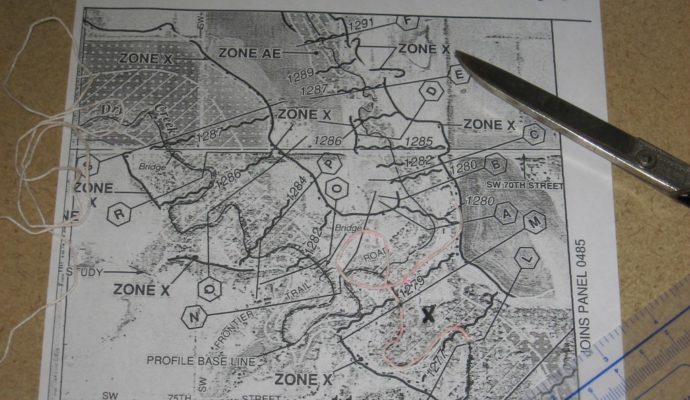

Whose risk? Whose responsibility? The politics and financialisation of uncertainty
At the STEPS Centre Symposium on the Politics of Uncertainty, Susan Erikson (Simon Fraser) and Rebecca Elliott (LSE) presented fascinating cases for the insurance theme, which was part of the…


Net zero and low-carbon transformation: why targets are not enough
This week, the UN Global Climate Summit meets in New York, calling global leaders to describe how they will meet the challenge of disruptive climate change. The long term target…


Climate change: how do we move beyond ‘the Great Derangement’?
by Andrea Nightingale and Lars Otto Naess Climate change has become an ever more pressing and tangible issue. July was the hottest month on record, the IPCC’s report on land…
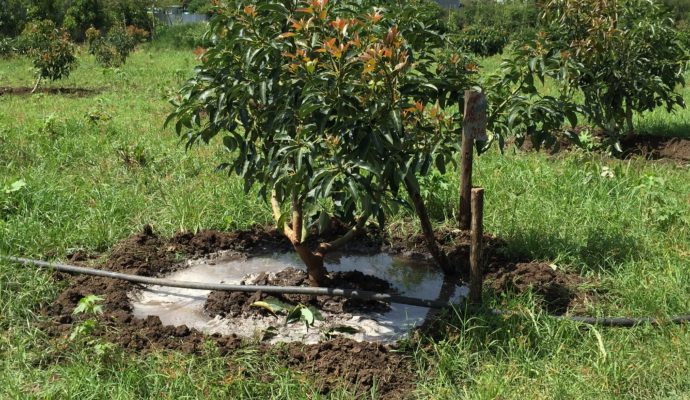

Six pathways identified for sustainable groundwater futures in Africa
by John Thompson, Imogen Bellwood-Howard, Gebrehaweria Gebregziabher, Mohammad Shamsudduha, Richard Taylor, Devotha Kilave, Andrew Tarimo and Japhet Kashaigili Groundwater is likely to become more important as a livelihood resource in…


Solidarity, insurance, emotions and uncertainty
I spent a fascinating three days at the STEPS Politics of Uncertainty Conference in July, and in the last few weeks have been mulling over what I have taken from…
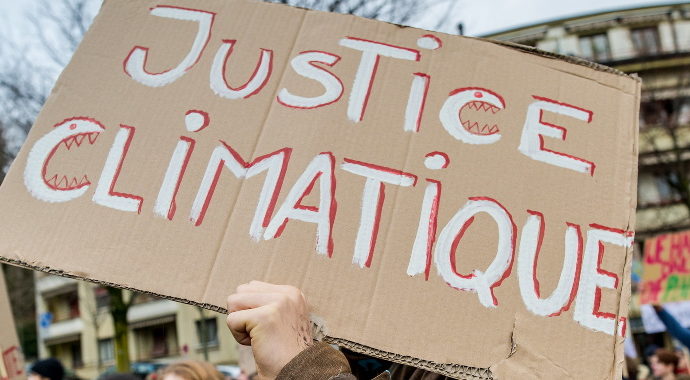

Strikes to science fiction: 4 ways to transform climate and development
by Nathan Oxley and Sophie Marsden The UN Climate Summit next week in New York will once again convene governments to discuss the intimidating challenge of how to coordinate action…


When ignorance does more than you think
Unstudied conditions are avoided as vigilantly as possible—right now, when it matters—by control room operators of large critical infrastructures mandated to operate reliably and safely systemwide. Having failed to fail…


Sustainable Energy Policy in Germany: A Case of Natural Gas Lock-in
A new Working Paper from STEPS Summer School alumni seeks to explain why (and how) natural gas has assumed such a dominant role in German energy policy, and at what…
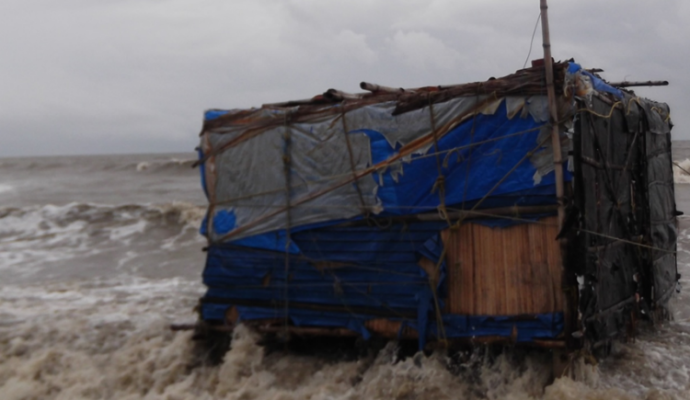

Unpacking uncertainty in times of climate change
By Shilpi Srivastava, Hans Nicolai Adam and Lyla Mehta Climate change undoubtedly is one of the most significant development challenges of our times. Research over the last few decades has…
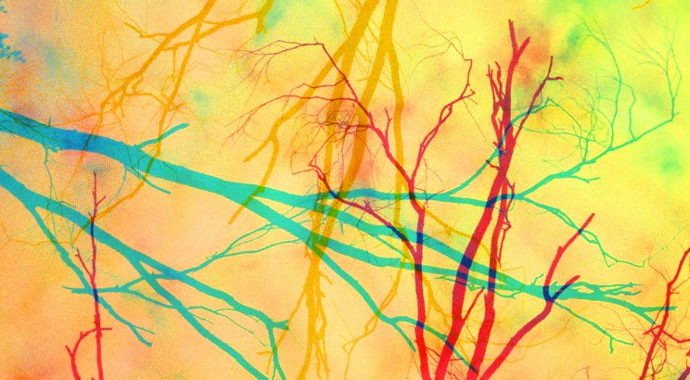

Uncertain superlatives
Certainty has such a strong place in politics not just because it serves as the preferred foundation/platform from which to choose to act, but also because certainty supports and drives…


Uncertain futures and the politics of uncertainty
Since writing The Romantic Economist – Imagination in Economics (2009) I have been fascinated by the link between the human capacity to imagine new futures and the prevalence of uncertainty….
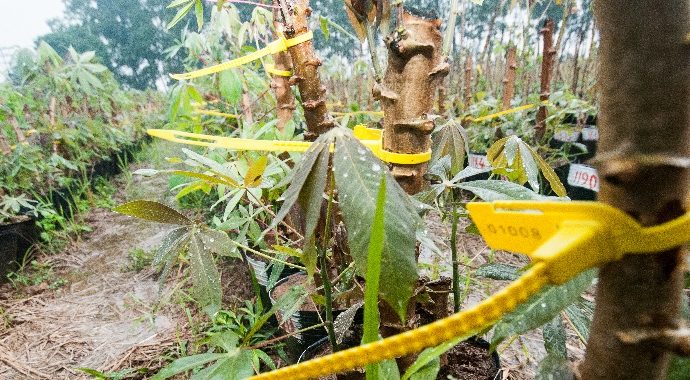

A new framework for thinking about technological change
Global development is all about creating change for the better. One thing is certain: if we want to address the climate breakdown while achieving a high quality of life for…


Measles, MMR and vaccines: where do vaccine anxieties come from?
Measles and vaccines are back in the news. The UK has lost its measles-free status, according to Public Health England. The Guardian reports that about 30,000 children are starting primary…
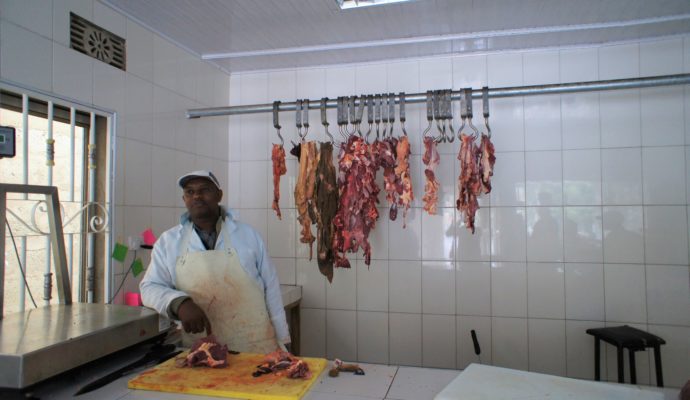

Enhancing red meat safety through ‘street-level diplomacy’ in Tanzania
Rising meat consumption in Tanzania – and indeed across low- and middle-income countries – presents new challenges and opportunities for health and development and we have been considering these as…




HLPF 2019: Why inclusion and power matter for sustainability
On 9-18 July the UN’s High-Level Political Forum meets to discuss progress on the Sustainable Development Goals (SDGs). This meeting takes the theme of “Empowering people and ensuring inclusiveness and…


Catastrophes of biblical proportions: why the apocalypse is back
In a parliamentary debate in London about climate change and ecology on 1 May, the debate turned to scripture to describe the scale of the problem. “We face catastrophes of…



Responding to uncertainty: who are the experts?
Uncertainties are everywhere, part of life. But how to respond? Who are the experts? These are questions that we are debating this week at a symposium entitled ‘The Politics of Uncertainty:…



Choreographed Consensus: The stifling of dissent at CRISPRcon 2019
by Saurabh Arora (SPRU/STEPS Centre), Barbara van Dyck (SPRU/STEPS Centre), Alejandro Argumedo (Asociación ANDES) and Tom Wakeford (ETC Group) Last week, we attended the annual CRISPRcon hosted by Wageningen University…
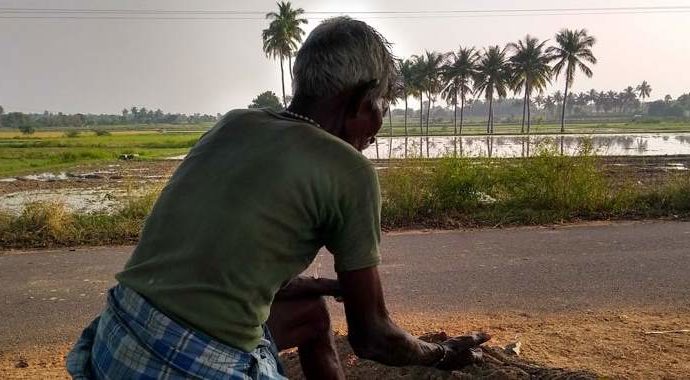

What is revolutionary about the Green Revolution?
The dramatic increase in yields of wheat and rice in the 1960s and 1970s in India, along with many other countries in the post-colonial world, was framed as a technological…


Disciplinary identities and other barriers to advancing interdisciplinary working
By Professor Linda Waldman, Institute of Development Studies, Professor Joanne Sharp, University of Glasgow, and Professor James Wood, University of Cambridge. The following blog was first published on the PLoS…
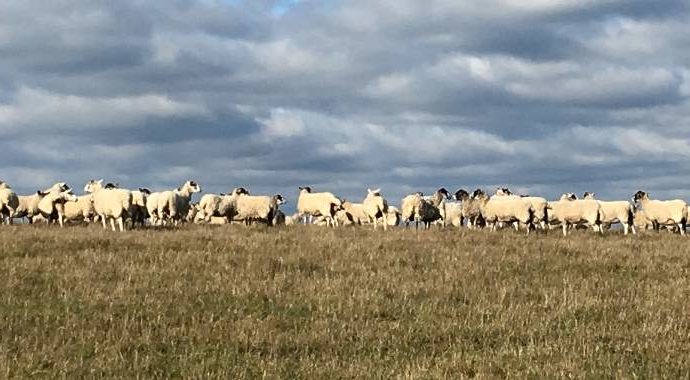

Why radical land reform is needed in the UK
Half of the land is owned by 1% of the people. Getting information on who owns what land is nigh on impossible. Tax arrangements favour land speculation. Ordinary people cannot…
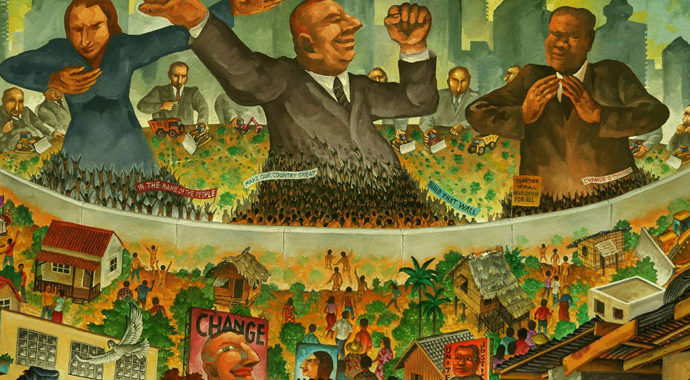

Turning the populist tide
The last week has seen major gains for nationalist, populist parties in elections, both in Europe and India. Is this the end of the centre-ground consensus? What are the alternatives?…


EU Elections: what does populism mean for rural people?
As countries across Europe await the results of the European Union elections, the campaigns of authoritarian and populist political movements are once again in the news. A new collection of…
Antimicrobial resistance and behaviour: an interview with Ayako Ebata
Agricultural economist Dr Ayako Ebata was interviewed in The AMR Studio, a podcast dedicated to interdisciplinary research into antimicrobial resistance (AMR) produced by Uppsala University. Dr Ebata specialises in value…
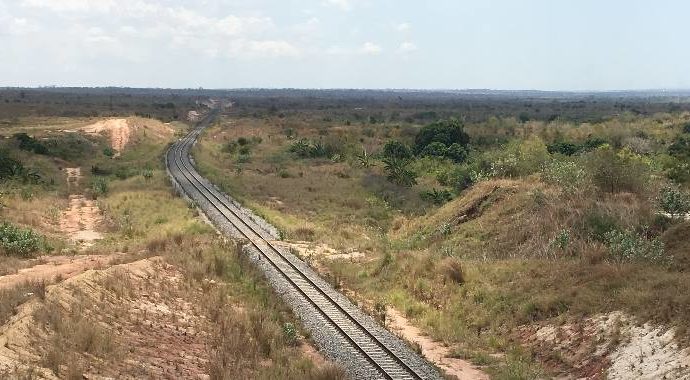

The Chinese Belt and Road Initiative: what’s in it for Africa?
The huge Belt and Road Initiative (BRI) Forum recently concluded in Beijing. 37 heads of state attended, along with droves of policy advisors and numerous thinktanks and research institutes, including…
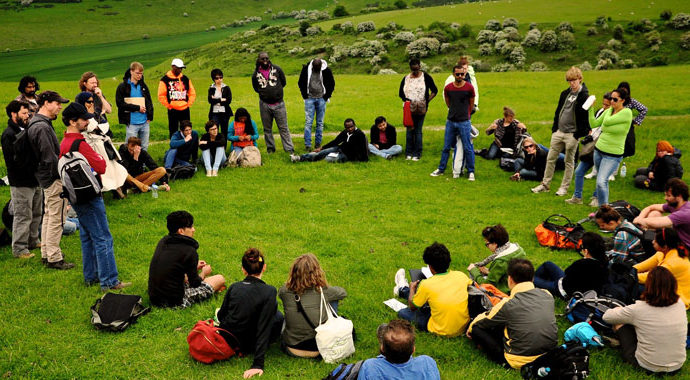

Summer School 2019: Join us online
A group of 43 early career researchers are coming together from 14-24 May to explore pathways to sustainability in the STEPS Centre’s annual Summer School. During the two weeks, we’ll…
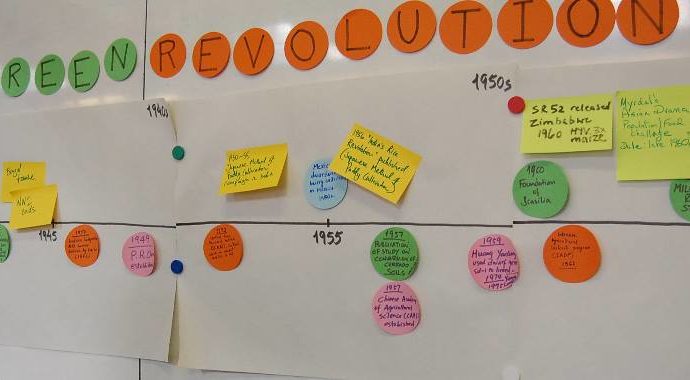

Unpacking the epic narratives of the Green Revolution
by Lidia Cabral, Poonam Pandey and Xiuli Xu Nearly 50 years since its apex, the Green Revolution – a chapter in history associated with rapid expansion in agricultural production driven…
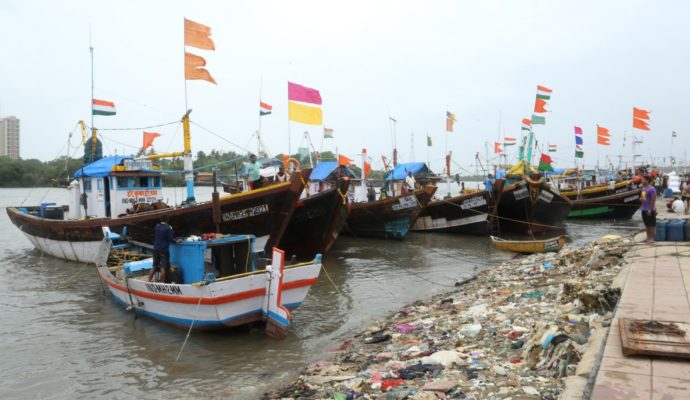

Cities, Uncertainty and Systems Change
Depending who and where you are in the world, you will be experiencing the effects of climate change differently. Here in the UK, the recent hot-weather days in February might…
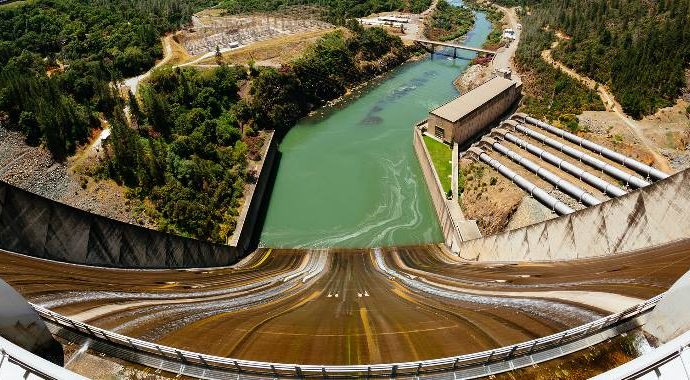

Rediscovering the Water-Food-Energy Nexus
A few months ago, I presented the findings of a new book, The Water-Food-Energy Nexus: Power, Politics and Justice, to an International Water Association conference on the same topic at…
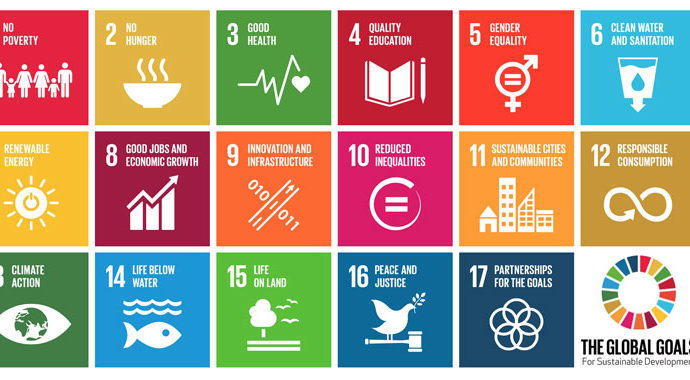


Realising the SDGs: why a sustainable livelihoods approach can help
The Sustainable Development Goals (SDGs) were launched with great fanfare in September 2015. This was an ambitious agenda for the whole world, aiming to transform development towards sustainability, while leaving…


Poverty traps: a short film about how people in rural Appalachia see poverty
Poverty is often described as a ‘trap’. How does this reflect the perception of people who live with poverty in their everyday lives? Researchers often use the words ‘poverty trap’…
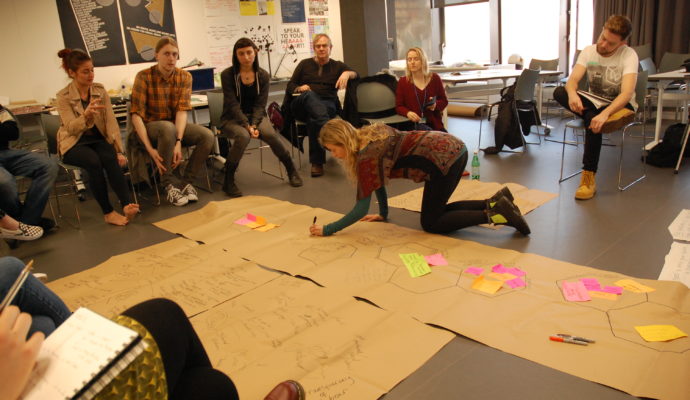

‘What if?’ Meeting, making, dreaming, doing
Each week, the System Change Hive is exploring and experimenting with new solutions to societal and environmental problems, through creative arts practice. Artworks created will be exhibited in different locations around…



Water crisis’ disproportionate toll on women can no longer be ignored
STEPS member Lyla Mehta has written an article with Ria Basu for the Indian magazine Firstpost about the impacts of ‘water crisis’ on women. Often, access to water is about…
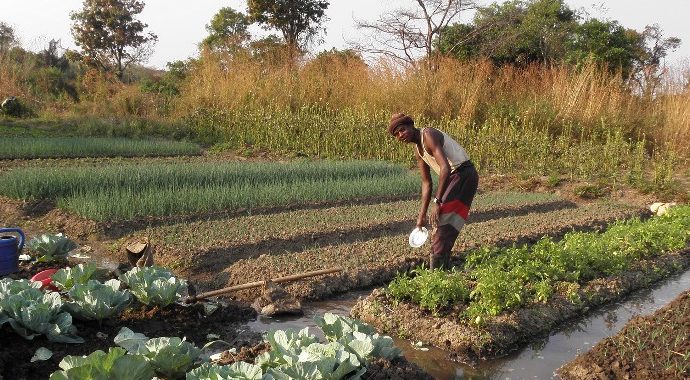

Irrigating Africa: can small-scale farmers lead the way?
by Ian Scoones, Felix Murimbarimba and Jacob Mahenehene We often hear that irrigation in Africa is too limited, and that the key to a “green revolution” on the continent is…
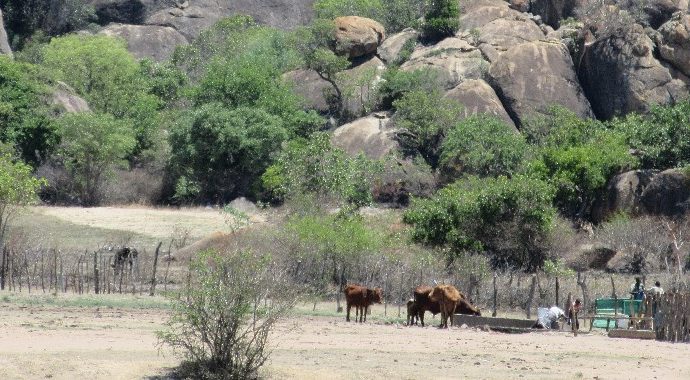

Five problems with ‘integrated assesment’ models, and what to do about them
What are the most appropriate ways of understanding changes in natural resource change in rural areas, particularly in the context of climate change? How can we make use of data…
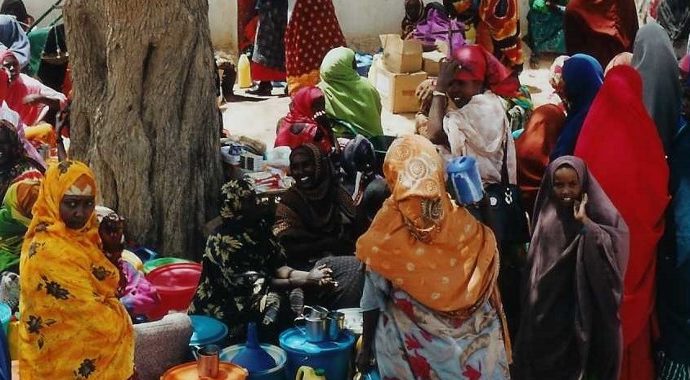

Pastoralist milk is a viable commodity. What enables it to flourish?
Pastoralists’ integration into market dynamics is mostly addressed through the lens of trade in meat products, involving male traders. Pastoral milk, mostly traded by women, is often ignored. But good…
Could Kenya’s local flour mills be an early warning system for famine?
By Fred Ajwang, Relational Pathways project In the Relational Pathways project, we have been exploring how rural people relate to technology in their everyday lives. This has included fieldwork in…
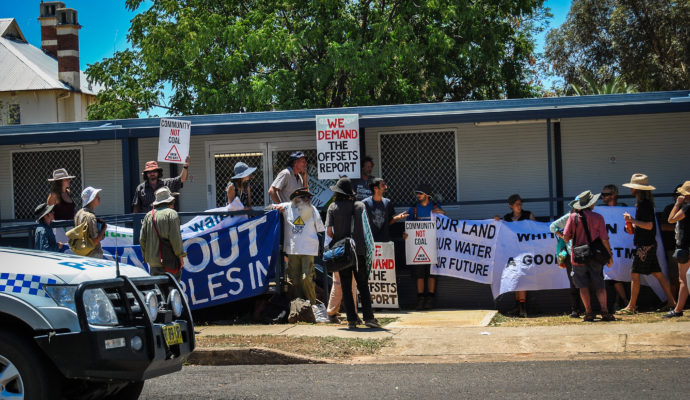

Destruction-prone conservation policies: one pathway to sustainability?
By Niak Sian Koh (Stockholm Resilience Centre, Sweden) and Amos Ochieng (Department of Forestry, Biodiversity and Tourism, Makerere University, Uganda) In an attempt to address the crucial problem of biodiversity…
Learning from crises: state-citizen relations in the time of cholera
The cholera outbreak in Zimbabwe in 2008 was the worst ever recorded in Africa. There were nearly 100,000 infections and some 4,300 deaths. The disease swept through the crowded urban…



Towards a more convivial politics of science
This is the last in a series of three blog posts by Andy Stirling about the theme of the STEPS Centre for 2019: Uncertainty. In previous blogposts in this series,…


How politics closes down uncertainty
This is the second in a series of blog posts on uncertainty by Andy Stirling. The first one is here and the third in the series is here. In a…
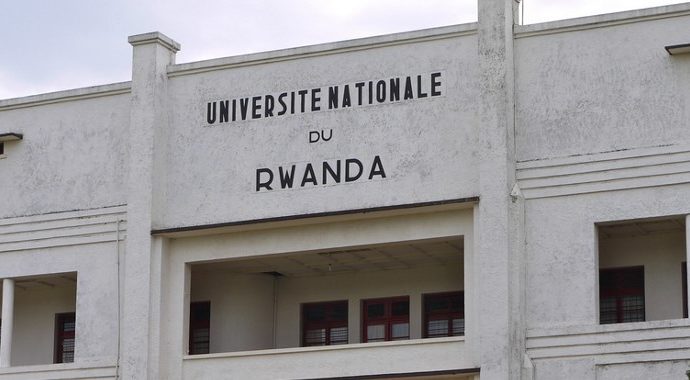

How can knowledge systems in East Africa contribute to sustainable development?
Unpacking Knowledge Systems for sustainable development in East Africa: Practical perspectives from Kenya, Rwanda and Tanzania by Joanes Atela, Fiona Marshall, Nora Ndege, Joanna Chataway, Andy Frost and Andy Hall,…
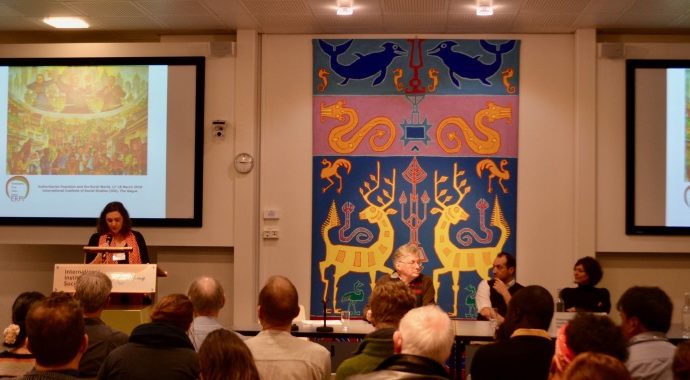

Reflections on Authoritarian Populism: Democracy, Technology and Ecological Destruction
Using anarchist critique to unearth the ‘roots’ of authoritarian populism can offer a productive gateway for understanding the origins and continuation of socio-ecological and economic crises. The language of ‘authoritarian…


Politics in the language of uncertainty
This is the first in a series of three blog post about uncertainty by Andy Stirling. The second post is here and the third post is here. Uncertainty is not…
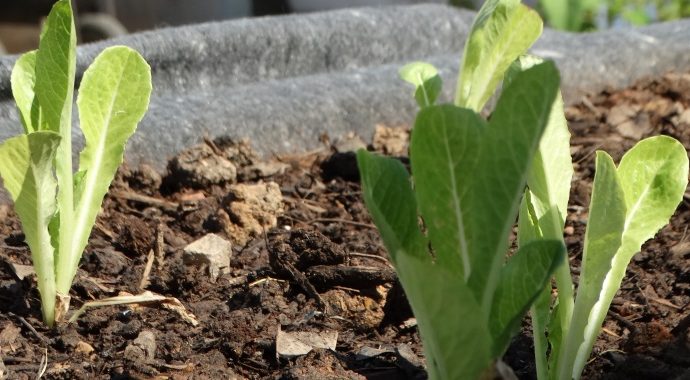

What can transdisciplinarity give back to communities?
By Simone Omori, Leandro Giatti and Saurabh Arora The water-energy-food and environment nexus (w-e-f-e nexus) is a matter of understanding and acting on interdependent areas of activity. By directing attention to…
Should political ecology be populist?
By Diego Andreucci Political ecology should take populism seriously, not only because of its authoritarian or regressive manifestations, but also for its transformative potential. The rise of right-wing populism is intimately…


Art, Uncertainty and System Change
It is becoming increasingly common to see funders, at national and international levels, in the sciences, arts and humanities, encouraging interdisciplinary approaches to various fundamental policy challenges. Initiatives focusing on…



Embracing uncertainty: what are the implications for sustainability and development?
Uncertainty is a concept that defines our times. Every media headline seems to assert that things are uncertain, and increasingly so. Whether it’s climate change, disease outbreaks, economic conditions or…
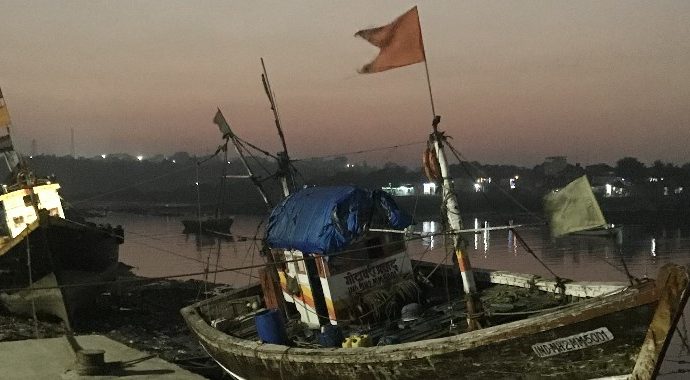

Views from the coast: uncertainty beyond climate change
Coastal areas are a poster child for climate vulnerability. They are marked and scarred by sea level rise, salinization, warming water, declining fish stocks, storms, changes in currents and weather…
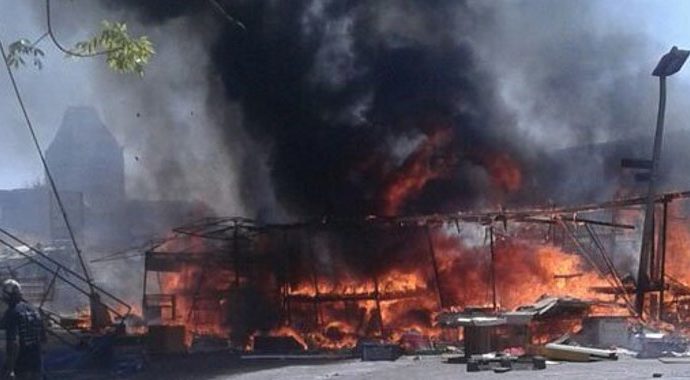

Zimbabwe’s fuel riots: why austerity economics and repression won’t solve the problem
A day after the president announced a 150 percent hike in fuel prices, the Zimbabwe Congress of Trades Unions and others called for a peaceful three-day shutdown. Their demands were…
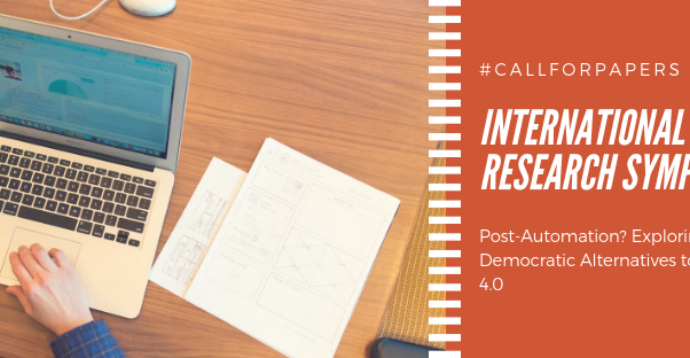

Call For Papers: International Research Symposium on Post-Automation
International Research Symposium Post-Automation? Exploring Democratic Alternatives to Industry 4.0 11-13 September 2019 Science Policy Research Unit (SPRU), University of Sussex, Brighton, UK About the Symposium We are delighted to…
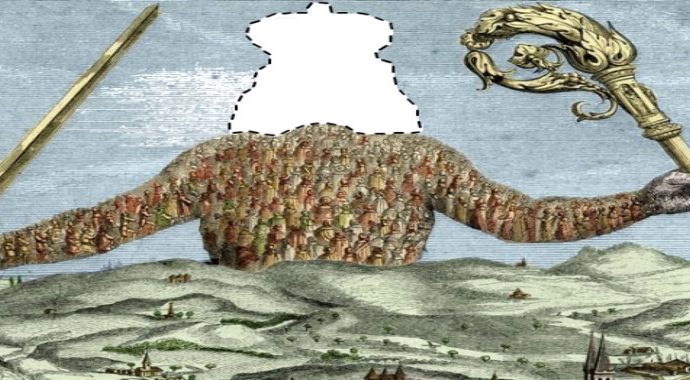

Headless populism and the political ecology of alienation
Populism of the kind displayed by the Yellow Vests is a revolt against social and ecological alienation and an affirmation of collective popular power. Since the gilets jaunes (‘Yellow Vests’) erupted onto…
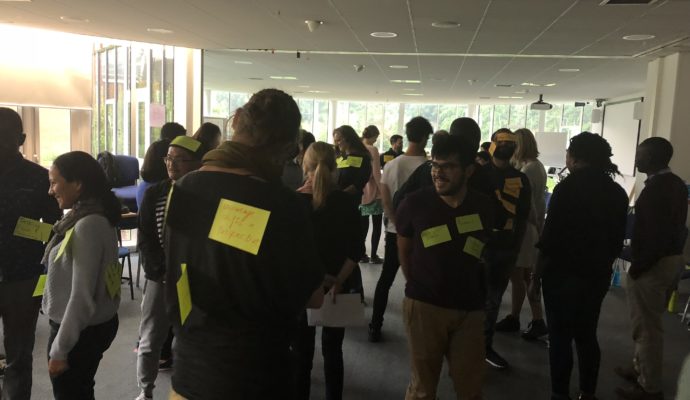

Skills for Sustainability Research
By Fateme Zare, Victoria Evia and Michael Kriechbaum What skills and dispositions do researchers require for sustainability and transdisciplinary research? In this blog post, we want to provide insights on this…


Answers on a postcard: how would you do technology differently?
Picture this… I like picture postcards. I like sending them, and I like receiving them. Despite the instantaneous advantages of Telegram and Twitter, or the range of Instagram and Facebook,…
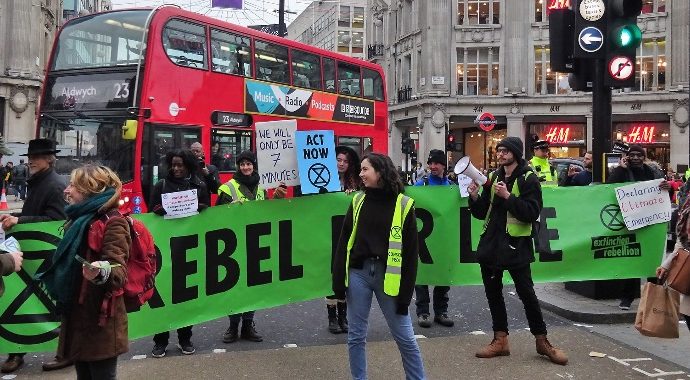

Diets not riots: what would massive public dialogue on climate change look like?
The UN’s COP24 climate conference reaches its halfway point this weekend, and carbon emissions are going in the wrong direction worldwide. Debates about the best ways to tackle climate change…
Authoritarianism, populism and political ecology
by Amber Huff and Levi van Sant Based on a number of events convened under the Emancipatory Rural Politics Initiative, we introduce a series of interventions that explore how political ecologies…
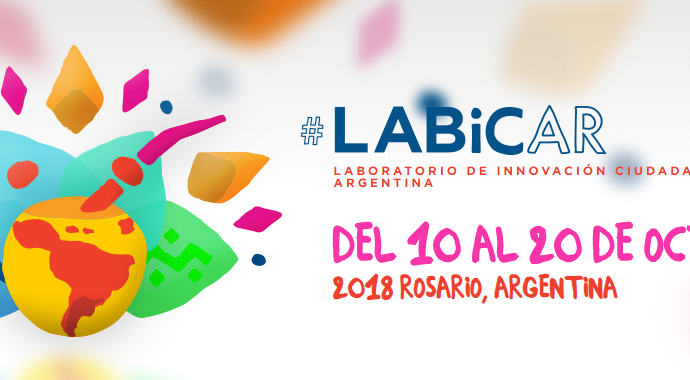

Enabling Innovations
At the launch of STEPS America Latina in 2015, one of the themes that we focused on at our opening event was what we called ‘enabling’ innovations. These are new…
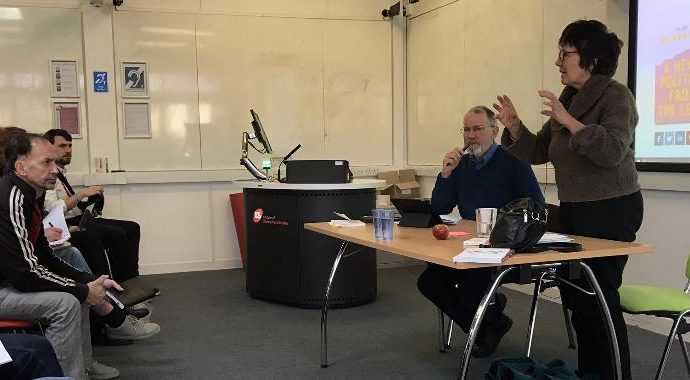

Video: Hilary Wainwright on knowledge, politics and the left
On 31 October 2018 Hilary Wainwright, editor of Red Pepper magazine and author of the book ‘A New Politics From The Left’, spoke at a STEPS/IDS seminar at the Institute…
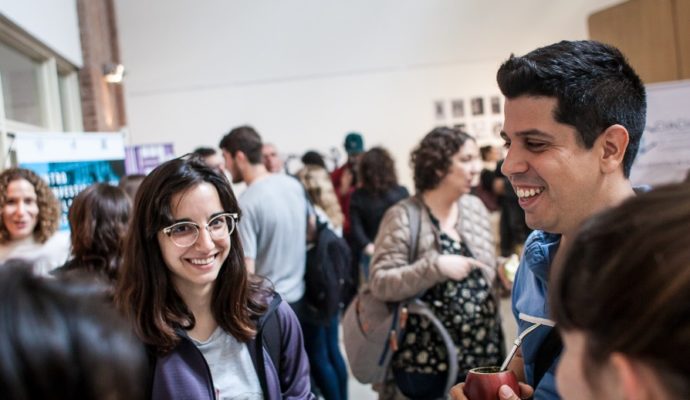

The challenges of open science
On Friday, November 2nd, the Argentine Congress of Open and Citizen Science (CIACIAR) was held at the University of San Martín, organized by CENIT and Cientópolis, and sponsored by STEPS…
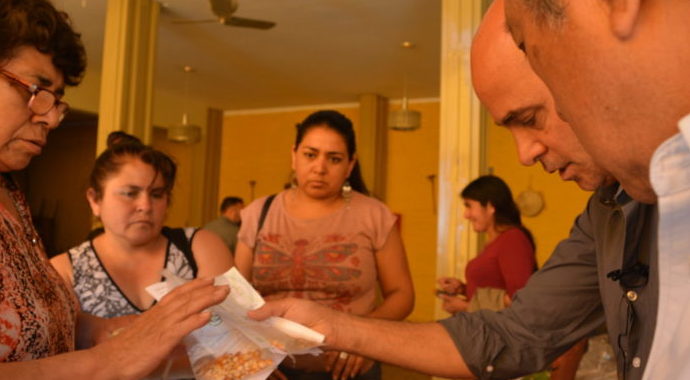

From digital commons to nurturing social relationships: How to practice open source ideas with seeds?
What happens when you try to transfer open source ideas beyond the digital world? In Argentina we organized a workshop on open hardware and immediately afterward an event on open seeds. Some of the difficulties involved in transferring open source ideas from virtual to more material settings, and from communities of practitioners comfortable with networked, digital culture, to those that are less so, were readily apparent.
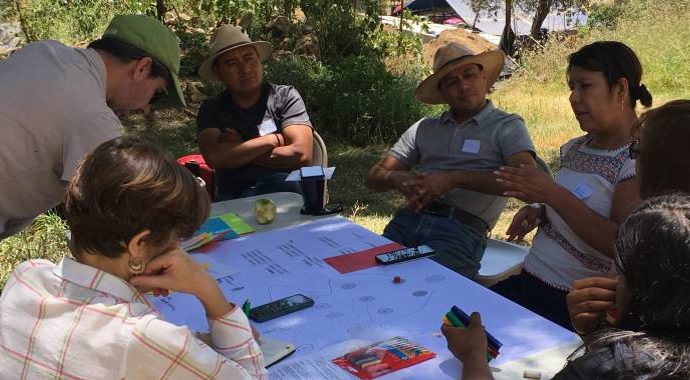

Creating bridges in Xochimilco through the “Pathways to Sustainability Game”
By Beatriz Ruizpalacios, Lakshmi Charli-Joseph, Hallie Eakin, J. Mario Siqueiros-García, Rebecca Shelton, Pathways Network The urban wetland in Xochimilco, Mexico City, and the traditional agricultural areas within it, are undergoing…
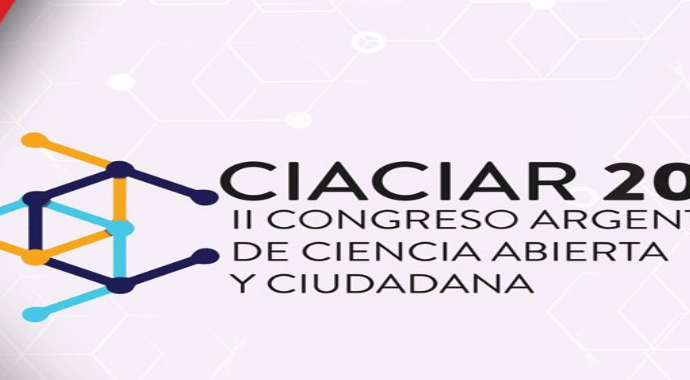

Open and Citizen Science Congress
On November 2nd, starting at 9 a.m. the second edition of the Open and Citizen Science Congress will be held at the University of San Martín, Buenos Aires. The event…
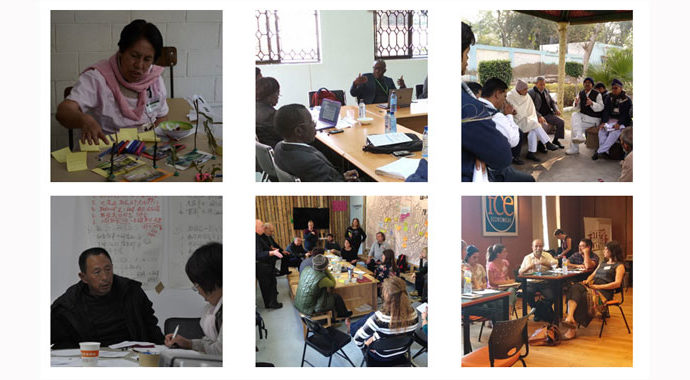

Transformation Labs: Six stories of change
These six stories are summaries of T-Labs (Transformation Labs) carried out by the Pathways Network between 2016 and 2018. The project worked in Mexico, the UK, India, Argentina, China and…
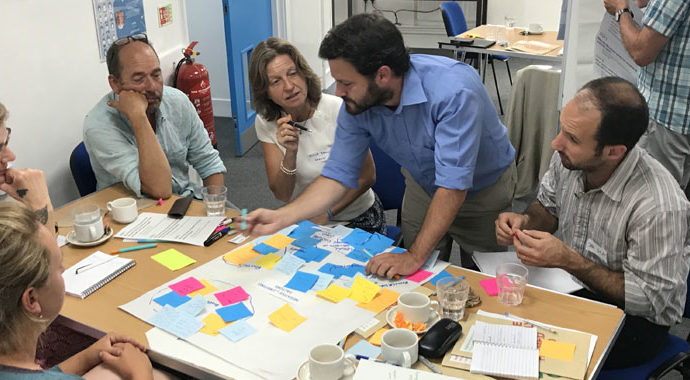

Endings and beginnings: project-based work within wider transformations
by Adrian Ely and Elise Wach Since 2016 we have been involved in a small-scale project, as part of the broader ‘Pathways Network’, that has explored how to move towards…


Hardware y software de código abierto para cambiar el mundo
By Julieta Arancio As part of my doctoral project at CENIT-STEPS Latin America on open hardware, I am working as a mentor at the summer school of the Geneva-Tsinghua Iniciative,…
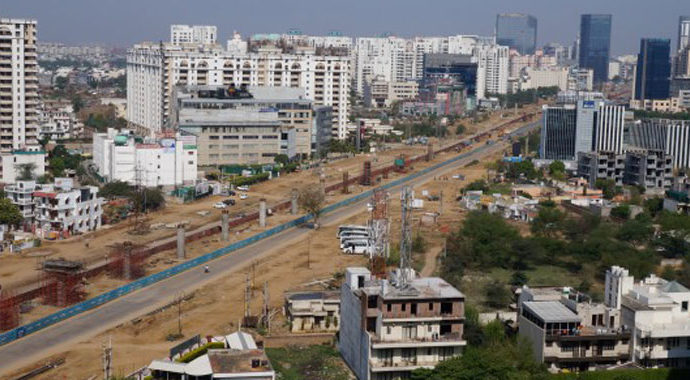

The Power of a T-Lab: Sharing lessons on water and justice in Gurgaon, India
by Dinesh Abrol, Pravin Kushwaha and Bikramaditya K. Choudhary, South Asia Sustainability Hub & Knowledge Network. As big cities change rapidly, people moving into them can struggle for access to…
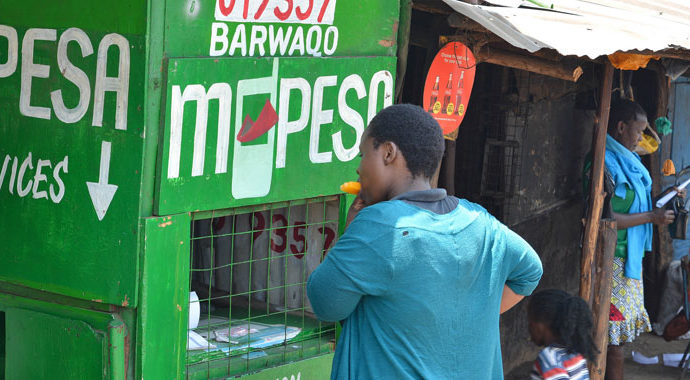

How transformative are mobile payments for solar home systems in Kenya?
by Victoria Chengo and Kennedy Mbeva, Africa Sustainability Hub The second Transformation Lab workshop (T-Lab) organised by the Africa Sustainability Hub was held in June in Nairobi, Kenya – one…


Open access and open science: A historic opportunity
By Mariano Fressoli In recent years several countries in Latin America managed to develop policies and legislation on open access. For example, Argentina, Peru and Mexico have national legislations. While…
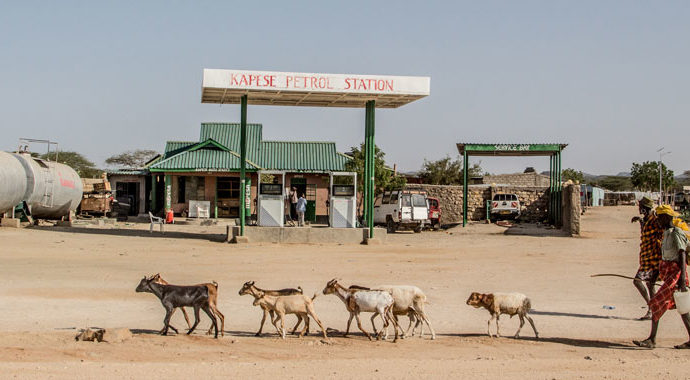

Who benefits and loses from large developments in Eastern Africa’s rangelands?
The past ten years have seen the spread of large-scale investments in infrastructure, resources and land across pastoral areas of eastern Africa. In the past, these areas were insignificant to…
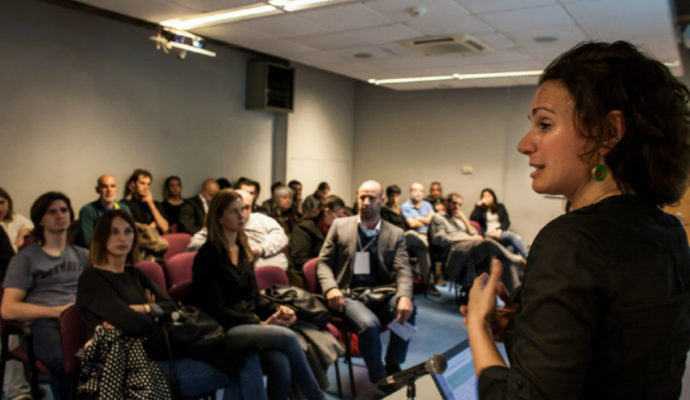

Bioleft Project in Comunes meeting
On August 15th, Anabel Marin presented the Bioleft project within the Comunes meeting, on behalf of an interdisciplinary team of members from CENIT, the University of Buenos Aires and CONICET….


Are alternative visions missing from the debates about sustainability transitions?
by Kasper Ampe, Michael Kriechbaum and Sofie Sandin In June 2018 we attended the IST (International Sustainability Transitions) conference in Manchester. It was a repeat visit for all of us,…
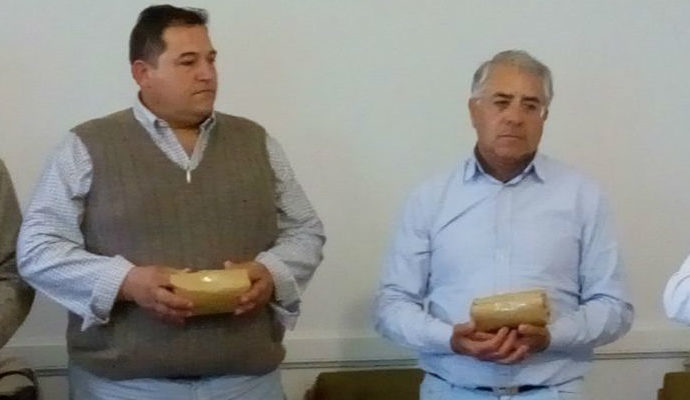

Argentina’s ‘Bioleft’ project shares its first open source seeds
Seeds were transferred from researchers to farmers for the first time under a new kind of open source transfer contract, called Bioleft, .


Open Science Map: Charting the development of Open Science practices in Latin America
Open Science represents a new approach in scientific knowledge based on collaborative work and new ways of spreading information using digital technologies. There are many benefits that come with open…


Is the new European ruling on GM techniques ‘anti-science’?
Frontstage rhetorics, backstage forces in current debates around the European Court of Justice ruling on GM crops There has been much commotion in the media over the past week, following…
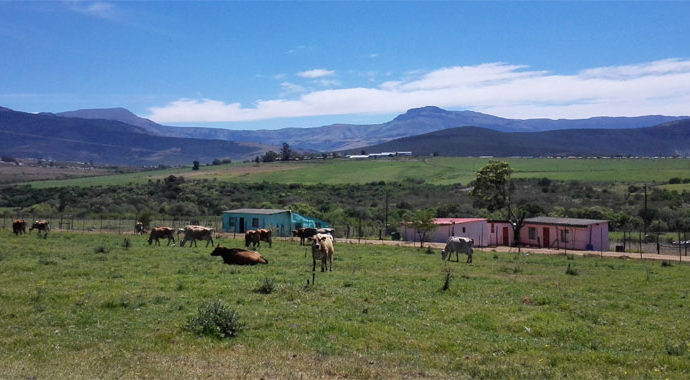

In South Africa’s land reform, class matters
In South Africa’s former ‘homelands’ the government is trying to ‘revive’ agriculture. These areas are a legacy of the 1913 and 1936 land acts, which reserved only 13% of the…
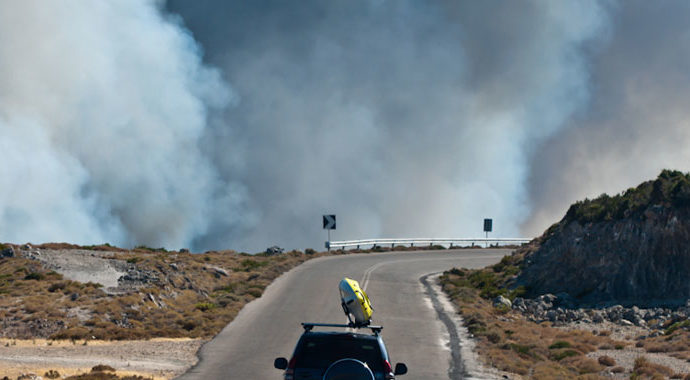

What do we do about the heatwave?
The heatwave has turned deadly. Tinder-dry fields and forests in Europe, most dramatically in Greece, have burst into flames, with catastrophic results. Crops are failing; for some, the health risks…
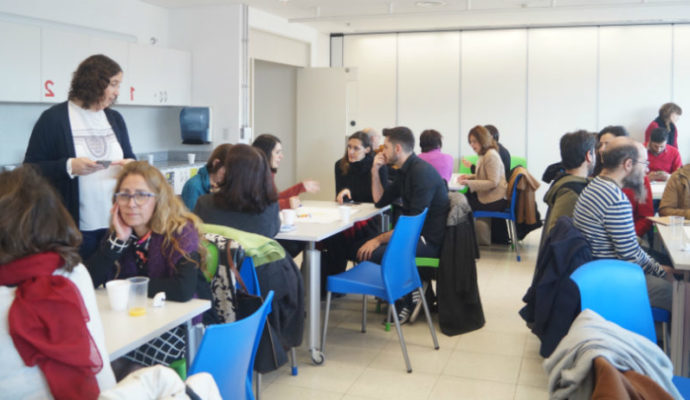

Three projects that explore open and collaborative production
Over the last decade, radically open and collaborative forms of producing knowledge and material artifacts have been gaining ground, accelerated by the advance of new technologies. Researchers from STEPS Latin…




How can the Sustainable Development Goals be transformative?
The theme of this year’s High-level Political Forum on sustainable development is “Transformation towards sustainable and resilient societies.” The HLPF meets every year to review progress towards the Sustainable Development…



Democratizing public health and urban sustainability: how can nexus framings be useful?
By Saurabh Arora (SPRU, University of Sussex, UK) and Leandro Giatti (SPH, USP, Brazil) Public health and urban sustainability are inextricably linked. The World Health Organization (WHO) has emphasized this, drawing…
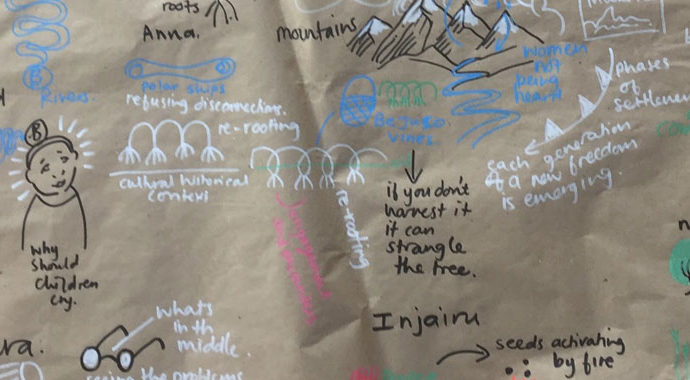

Living Aulas: What connects ‘undisciplinary’ research on sustainability?
by Almendra Cremaschi and Rebecca Shelton, Pathways Network In the context of climate change and the rise of research about and towards transformations to sustainability, being an early career researcher…
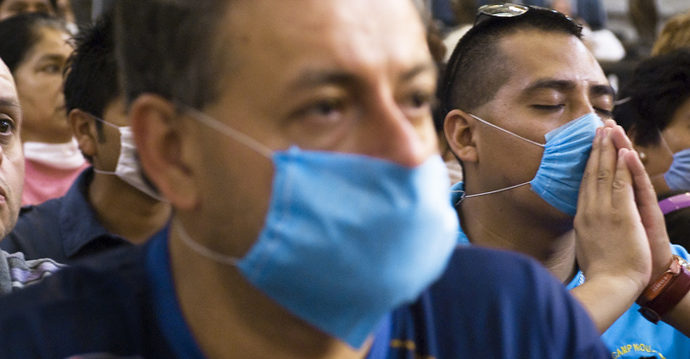

Why politics has to be at the heart of any response to zoonoses
World Zoonoses Day, on July 6 every year, is a reminder of the continuing problem of emerging diseases, particularly those originating in animals. Zoonoses have dominated policy debates in the…
Are Elsevier corrupting open science in Europe?
Elsevier – one of the largest and most notorious scholarly publishers – are monitoring Open Science in the EU on behalf of the European Commission. Jon Tennant argues that they…
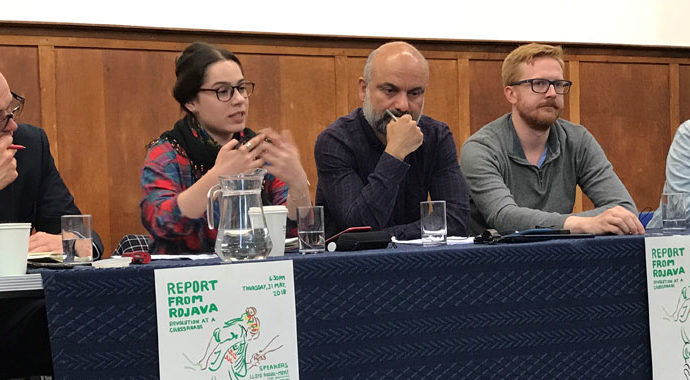

Report from Rojava: Revolution at a Crossroads
Rojava’s revolution is one of the most promising projects of democratization and social transformation afoot in the current conjuncture in the Middle East. Its context within the ongoing Syrian War…
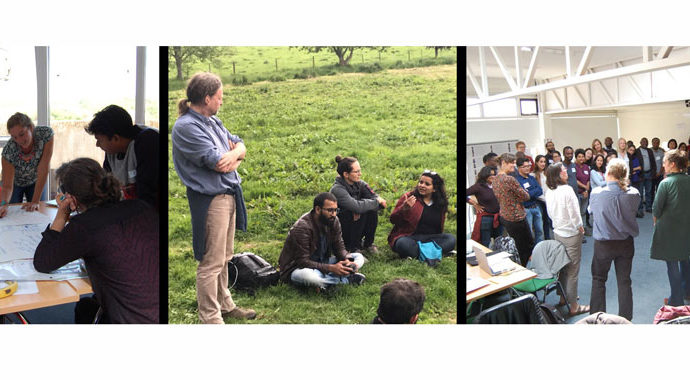

Dialogues along Plural Pathways: STEPS researchers and Summer School participants in conversation
Following the STEPS Summer School in May 2018, this blog post is a conversation convened by three participants, Nimisha Agarwal, Ankita Rastogi and Jessica Cockburn. It includes introductions to the…
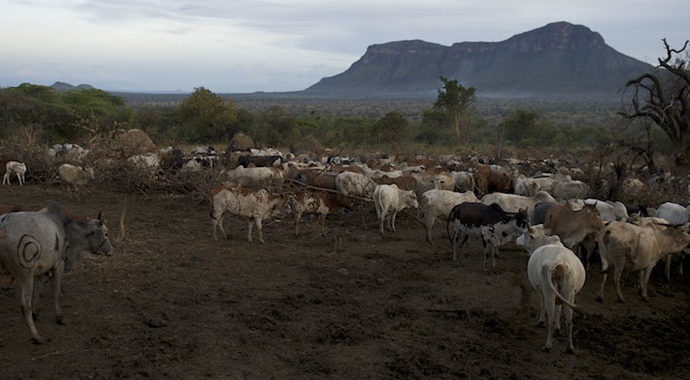

Should we blame livestock for climate change?
Livestock are essential to rural economies and livelihoods across the world. But are these animals contributing to planetary destruction through greenhouse gas emissions? Estimates suggest that 14.5% of all anthropogenic…
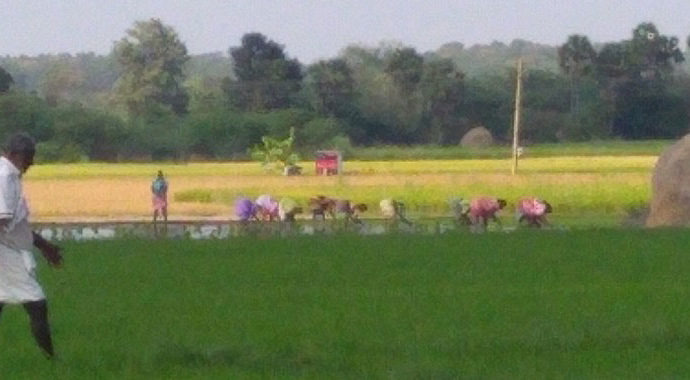

Uncovering Transgressive Solidarities
By Divya Sharma, Relational Pathways project In the Relational Pathways project, we are trying to understand the pathways in and out of poverty for farmers in India and Kenya. ‘Green…
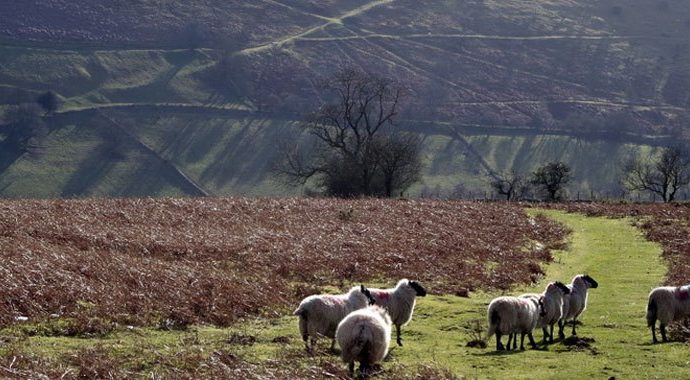

Wilderness for whom? Negotiating the role of livestock in landscapes
Livestock keeping is seen by some as a scourge on ‘natural’ landscapes, creating devastation through grazing and browsing. Reversion to some form of idealised ‘wilderness’ is seen as the solution,…
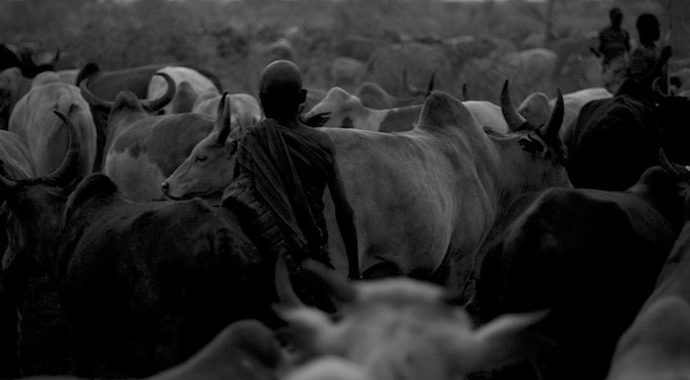

The vegan craze: what does it mean for pastoralists?
by Ian Scoones There’s a vegan craze in full swing in Brighton in the UK – and it seems more broadly. There was a vegan festival near my house the…
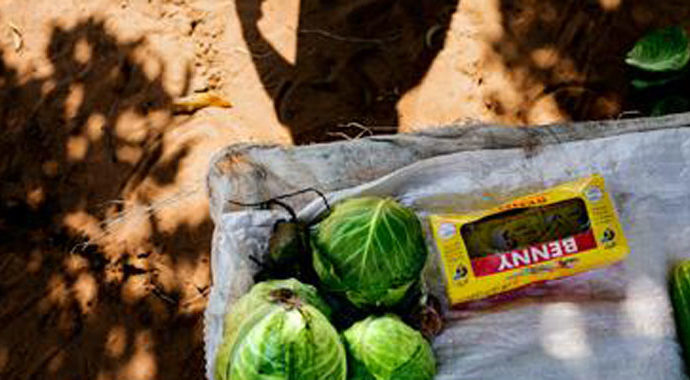

Narratives of scarcity and the global land rush
by Ian Scoones Narratives of scarcity dominate policy discourses about resources, including land. This was certainly the case during the peak of the global land rush, as we show in a…


BioLeft: experimenting with open source seed innovation in Argentina
by Patrick van Zwanenberg and Anabel Marin (Conicet / Cenit / UNSAM) It is sometimes said that plant breeders breed their aspirations about how agricultural production systems ought to function…
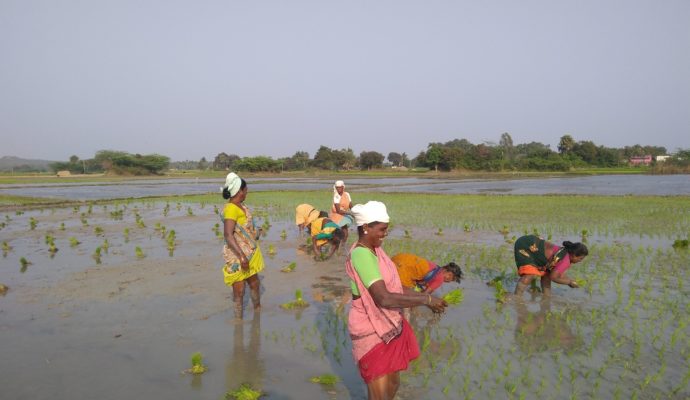

Contextualising life histories in Tamil Nadu
by Divya Sharma and V. Gajendra, Relational Pathways project In the Relational Pathways project we are trying to understand the pathways in and out of poverty for farmers in India…
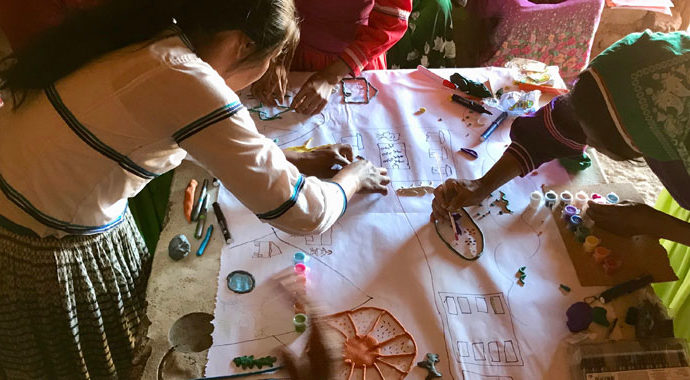

Mapping a transforming world in the Sierra Huichol, Mexico
by Shiara González, Lakshmi Charli-Joseph, and Beth Tellman The Wixáritari communities, better known as Huichol, are mainly located within the Sierra Madre Occidental, north of Jalisco state, Mexico. These communities,…
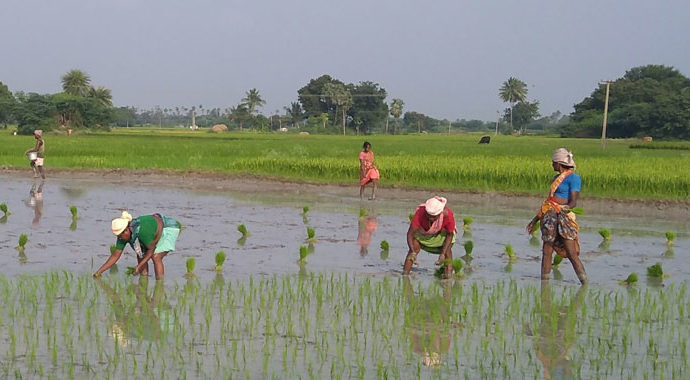

What role does rural people’s agency play in finding pathways out of poverty?
by Saurabh Arora, Divya Sharma, M. Vijaybaskar, Ajit Menon and Joanes Atela This is the inaugural blog post for the project Relational Pathways: Mapping Agency and Poverty Dynamics through Green…
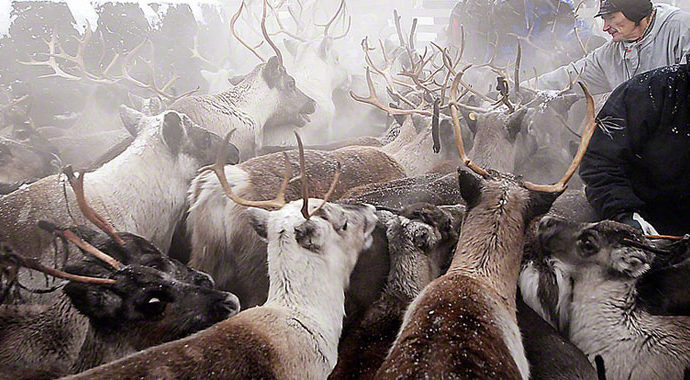

Why killing reindeer is poor science
The Norwegian state has ordered Sami reindeer owners to reduce the size of their herds to the ‘carrying capacity’ deemed acceptable by the Ministry of Agriculture and Food, arguing that high stocking…
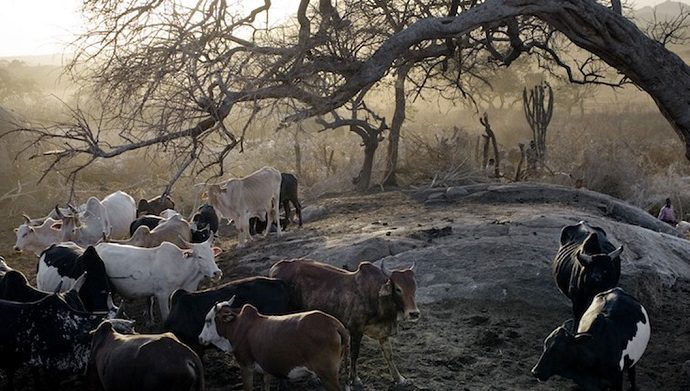

The many futures of pastoralism in the Horn of Africa
A 2016 article by Andy Catley, Jeremy Lind and Ian Scoones – The futures of pastoralism in the Horn of Africa: pathways of growth and change – outlines the different pathways of…
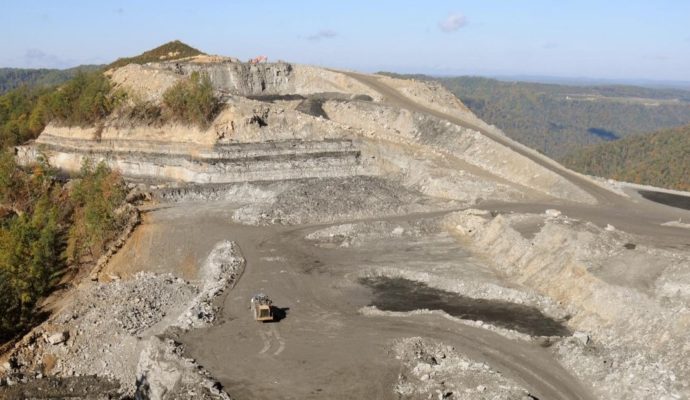

Just Transitions as a process with communities, not for communities
Societal transitions towards a new energy regime are underway in order to shift society back towards a more sustainable state of functioning. However, this pathway is not without trade-offs and…
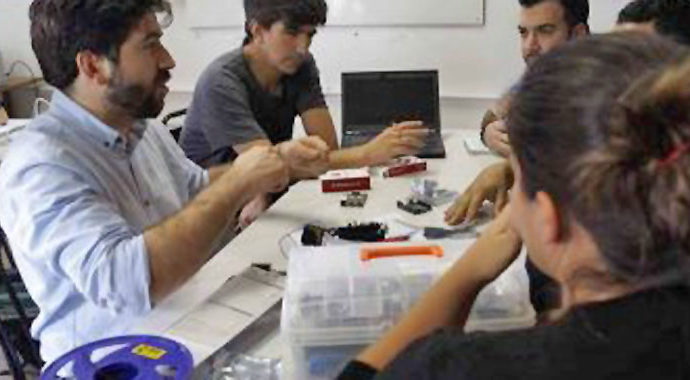

Open science hardware across the Andes
After an intense programme of Open Scientific Hardware (OScH) workshops in Argentina and Chile, researchers André Chagas (University of Tübingen) and Ben Paffhausen (Freie Universität, Berlin) go back home with…
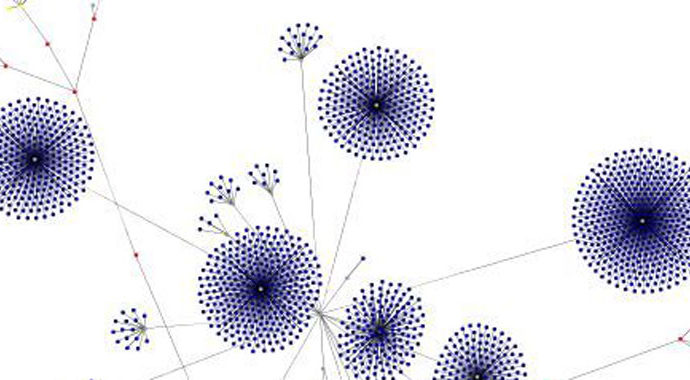

New insights on navigating complexity in development
by Marina Apgar and Eric Kasper, Institute of Development Studies The challenges of development are complex. Insights about the nature of complexity – coming from various scientific disciplines – lead…
Governing The Land-Water-Environment Nexus: Grant Awardees 2017-2018
The following researchers have received grants for 2017-2018 for research under the project Governing the Land-Water-Environment Nexus in Southern Africa. Eromose Ebhuoma Eromose Ebhuoma was awarded the degree of a PhD…
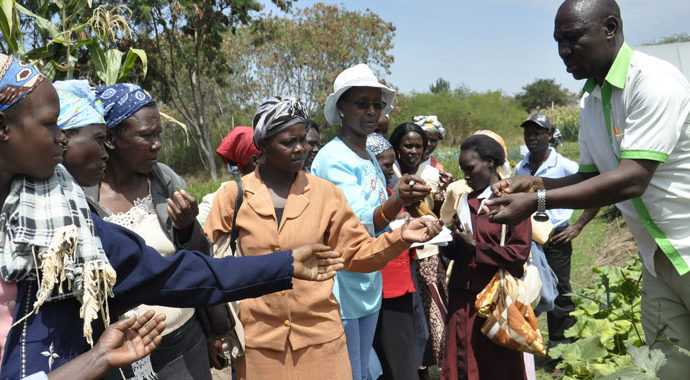

Where is the agency of farmers in Africa’s ‘new Green Revolution’?
by Joanes Atela, Charles Tonui, Dominic Glover and Saurabh Arora Hunger and food insecurity have continued to persist in sub-Saharan Africa. To address these problems, during the last decade there…
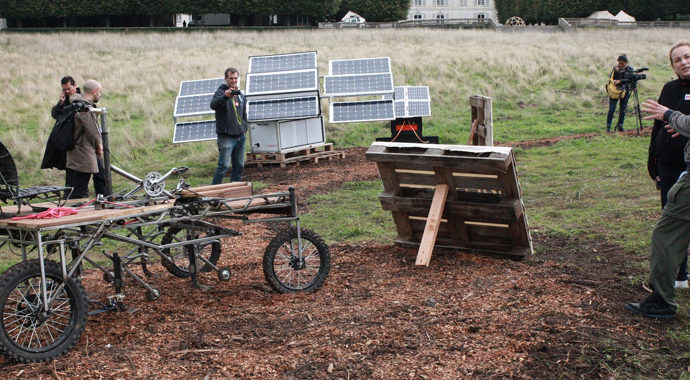

Forking the SDGs: How prototypes could transform the new global goals
Sustainable alternatives often come about through prototypes, from DIY electronics repair to ecohousing, agricultural tools to digital knowledge platforms. Prototypes are often small (at least to begin with) and local,…
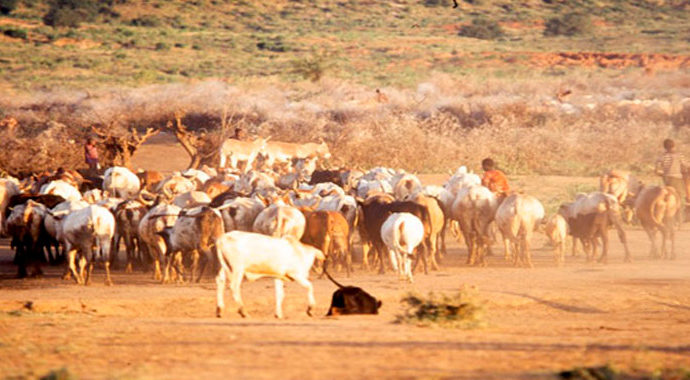

Pastoralism is changing in the Horn of Africa
A few weeks back, Ian Scoones, representing the PASTRES project, joined Andy Catley and Peter Little in a webinar organised by the Feinstein International Center at Tufts University, and chaired by…
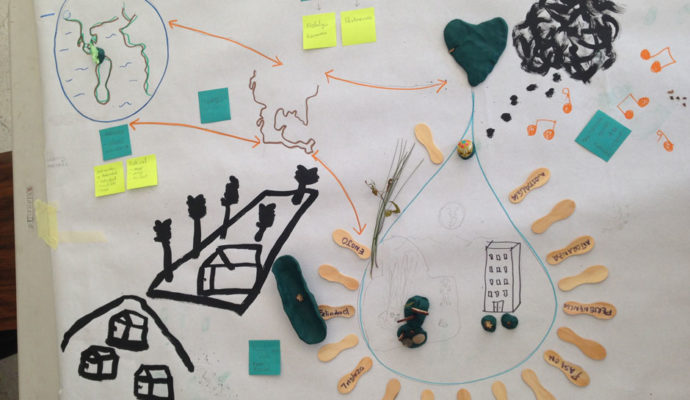

The Transformation Labs (T-Labs) approach to change
The PATHWAYS Network is exploring solutions to problems in six sites (in Argentina, China, Kenya, India, Mexico and the UK) where socio-ecological systems are transforming. To intervene in these transformations,…
Protected: Reading list: Summer School on Pathways to Sustainabilility 2018
There is no excerpt because this is a protected post.


GOSH Roadmap: democratizing technology, from a Latin American perspective
As the year begins, also begin the efforts of low-budget university labs to make ends meet. The scene is unfortunately quite familiar to many of us in Latin America. How…



Care or control? Four challenges for transformations to sustainability
This post introduces a series of blog posts on ‘Transformations’, our theme for 2018. Transformation is one of those buzz words that’s everywhere these days, especially in relation to the…
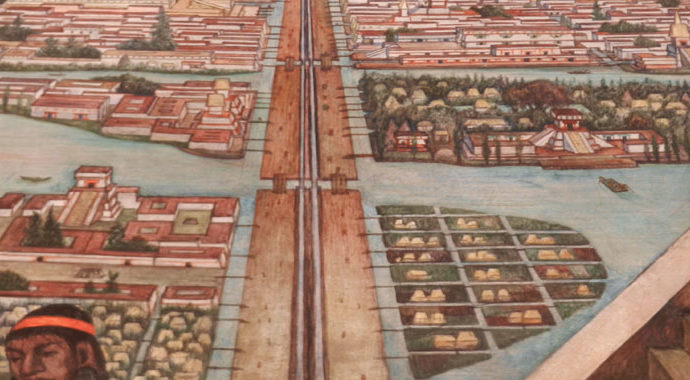

Things can change: history and transformations to sustainability
by Nathan Oxley, Jonathan Dolley, Shilpi Srivastava and Gordon McGranahan This is one in a series of four blog posts exploring ideas and case studies on ‘transformations’, drawing on research…


Want to transform access to technology? Follow the invisible threads
by Adrian Smith, Rob Byrne, David Ockwell and Ian Scoones This is one in a series of four blog posts exploring ideas and case studies on ‘transformations’, drawing on research…
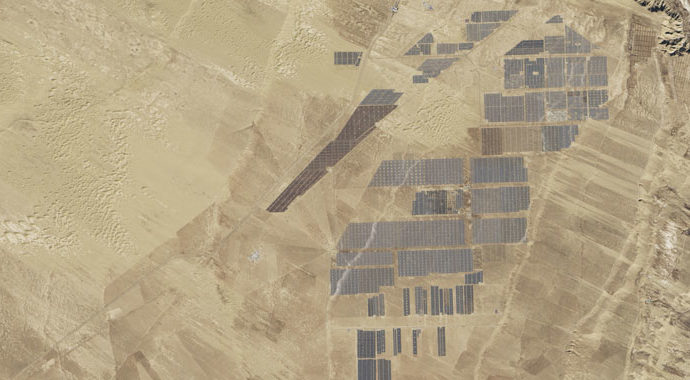

Green transformations in India and China: who’s in charge?
by Sam Geall, Wei Shen, Lyla Mehta and Peter Newell This is one in a series of four blog posts exploring ideas and case studies on ‘transformations’, drawing on research…



How do we ‘co-produce’ transformative knowledge?
by Andy Stirling, Adrian Ely and Fiona Marshall This is one in a series of four blog posts exploring ideas and case studies on ‘transformations’, drawing on research carried out…



Pastoralism, uncertainty, resilience: introducing the PASTRES project
by Ian Scoones and Michele Nori, PASTRES project This month we are launching a new European Research Council funded project, Pastoralism, Uncertainty and Resilience: Global Lessons from the Margins (PASTRES)…
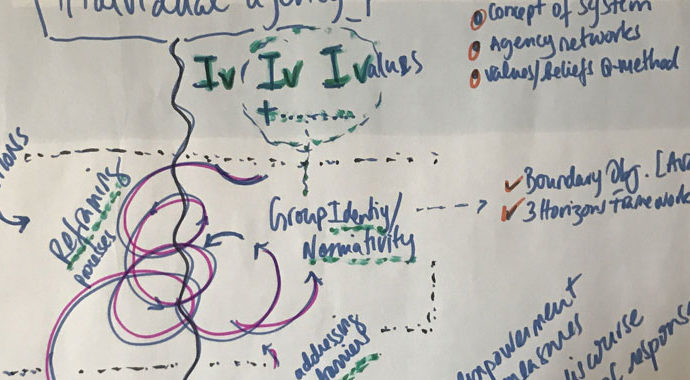

What ‘agency’ do researchers have in transformative research projects?
by Hallie Eakin, Lakshmi Charli-Joseph and J. Mario Siqueiros In our PATHWAYS network case in Xochimilco, Mexico City, we are exploring whether people can have ‘agency’ to make a difference…
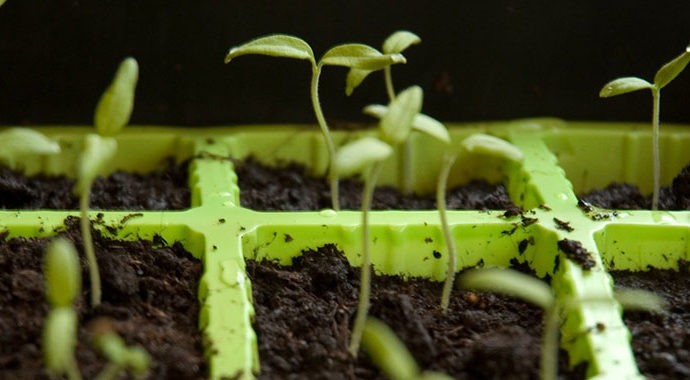

Seeding ideas: knowledge brokering and recombination for agricultural transformations
by Adrian Ely, Paddy Van Zwanenberg, Elise Wach, Martin Obaya and Almendra Cremaschi Straight after the ‘Transformations 2017’ conference, the ‘Pathways’ network gathered at the mid-point in our three year…
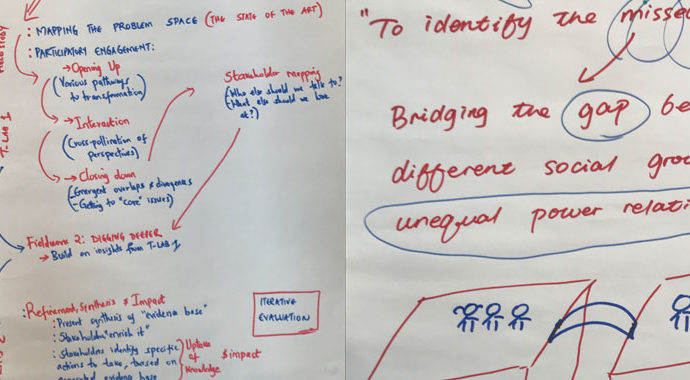

Transformations from Beijing to Nairobi and back: what can we learn from each other?
by Yang Lichao, Kennedy Liti Mbeva and Jiang Chulin This blog post summarises discussions between the Africa and China hubs at the project-wide meeting of the PATHWAYS Network in Dundee…
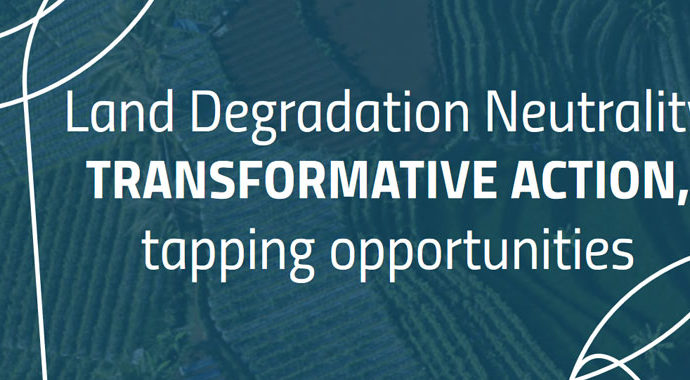

Degradation Neutrality and the Faustian bargain of conservation finance
A critical assessment of ‘degradation neutrality’, the latest idea to emerge in global conservation efforts, is at the heart of a new article for the Antipode Foundation by Amber Huff…


What does transformative research for sustainability look like?
by Patrick van Zwanenberg, Hallie Eakin, Ethemcan Turhan, Mutizwa Mukute and Fiona Marshall Efforts to nurture more sustainable, just futures are happening all around us, albeit in the context of…
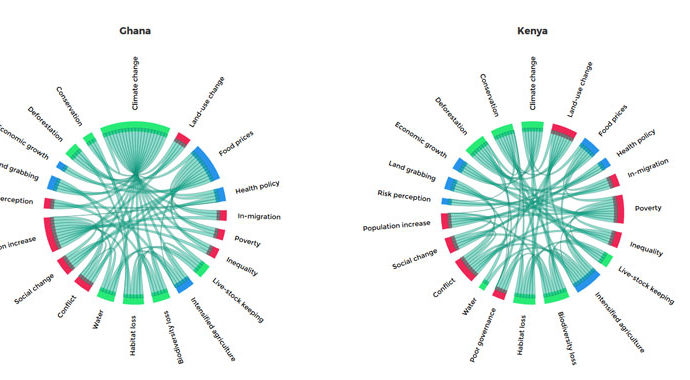

One Health Day: why tackling human health isn’t enough
One Health Day, on Friday 3 November 2017, draws attention to the interconnectedness of human, animal and environmental health. More than 60 per cent of emerging infectious diseases affecting people…


How to embrace the darkness
In her book Hope in the Dark, Rebecca Solnit offers a view of uncertainty that may seem surprising. Uncertainty might seem to go hand in hand with fear and even…
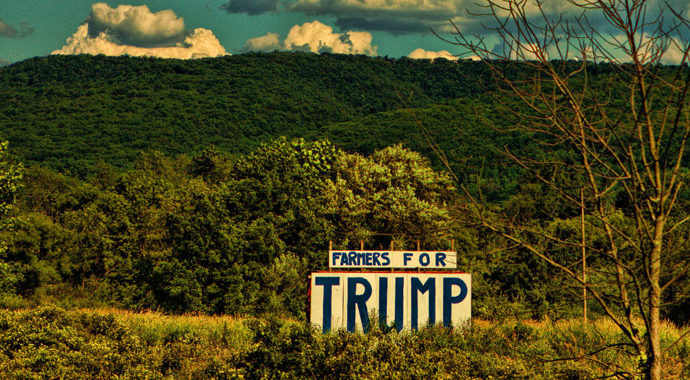

Why agrarian studies should confront the rise of authoritarian, populist movements
Last week I was in Russia at the fascinating fifth BRICS Initiative in Critical Agrarian Studies conference. Throughout the event we heard about the emergence of particular styles of authoritarian populist regimes,…
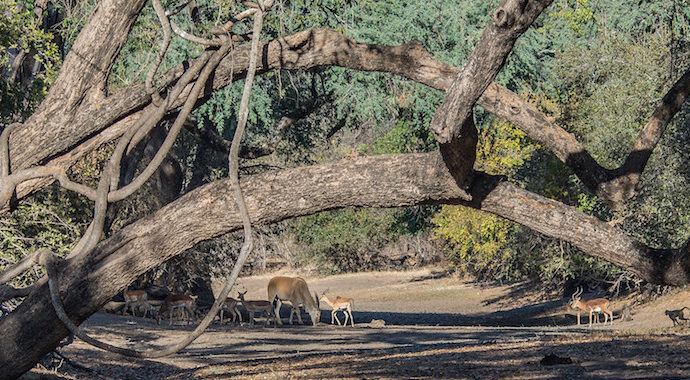

NEW PAPER: People, patches and parasites
Just out in Human Ecology is a new paper – People, patches and parasites: the case of trypanosomiasis in Zimbabwe. It’s open access, so do have a look! It presents…
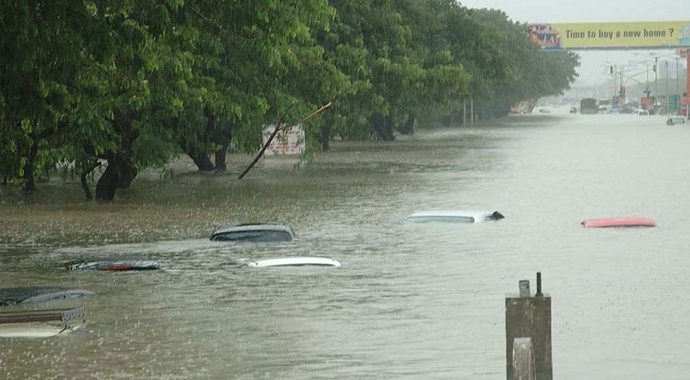

Why Mumbai’s floods are an urban planning disaster
by Hans Nicolai Adam, Lyla Mehta and D. Parthasarathy, Climate Change, Uncertainty and Transformation project As Houston was inundated by ‘biblical’ rainfall and grapples with extreme flooding and its aftermath,…
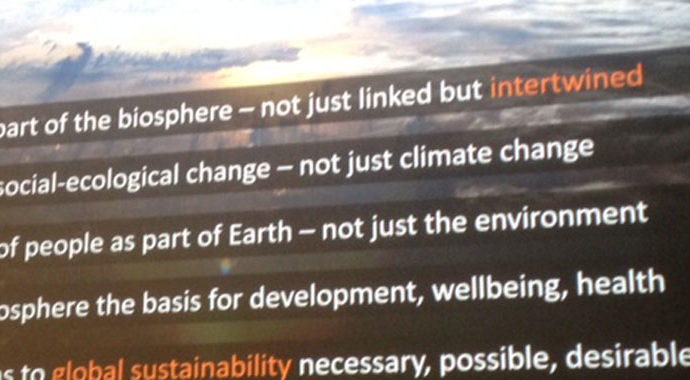

How do we ensure values are at the heart of resilience science?
We live and work now perhaps more than ever before in the time of science for transformation. This was the central theme of discussions in Stockholm during the Resilience 2017…
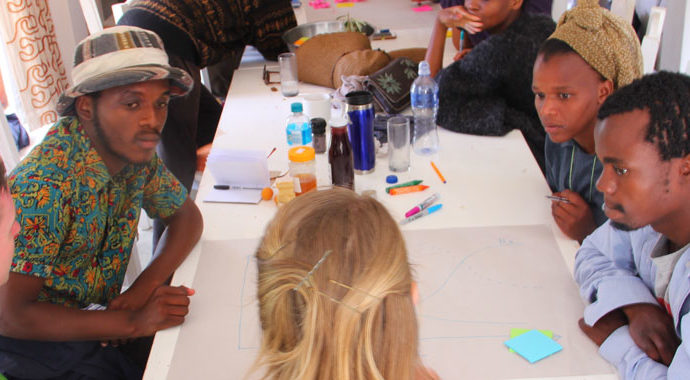

Coming to terms with messiness: What is a ‘Transformation Lab’?
In this blog post, Laura Pereira explains the idea of a ‘Transformation Lab’ (T-lab). T-labs are being used in our Pathways Network project in 6 countries to try to enable…
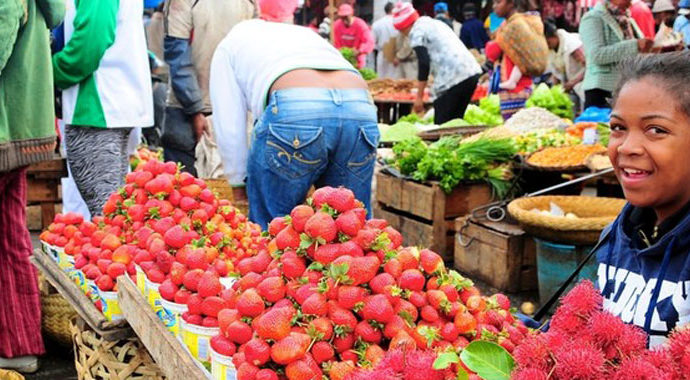

The global food system still benefits the rich at the expense of the poor
Ramen noodles in Sweden, wheat bread in Tanzania and Chilean wines in China. The cross-Atlantic transit of the potato and the tomato from the Andes to Europe, and back again…


Can open and collaborative approaches change the world?
by Patrick van Zwanenberg, Mariano Fressoli, Valeria Arza and Adrian Smith Around the world, people are changing how things are made and how knowledge is produced, by involving more people,…
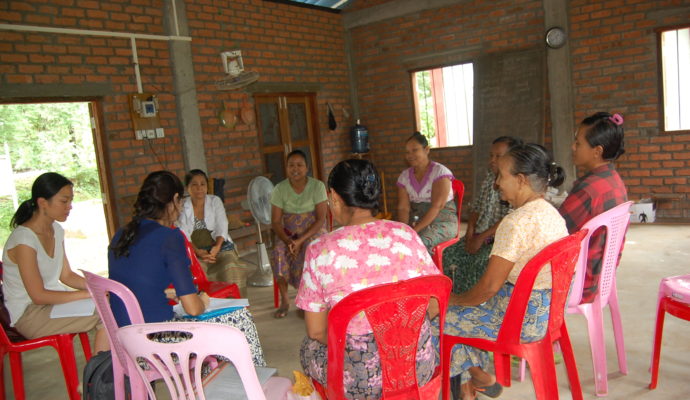

Why will no one listen to the pig farmers of Yangon?
Sitting in a pig farmer’s house in the Yangon region of Myanmar, I heard a question I’d heard many times before from backyard farmers: “What will your project provide us…


Brexit and food: there is no plan, so what is the UK going to put on the table?
by Tim Lang, City, University of London; Erik P Millstone, University of Sussex, and Terry Marsden, Cardiff University Even the British eat. But one might be forgiven for thinking that…
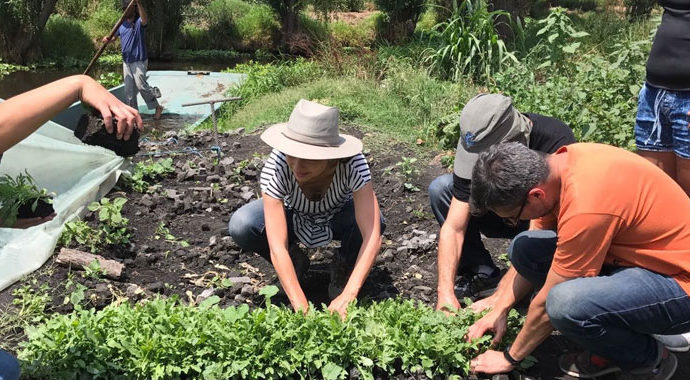

A day in the Chinampas
In the wetlands of Xochimilco in Mexico, farming is carried out in a system going back to Mesoamerican times, in chinampas – rectangular floating fields growing crops on a shallow…
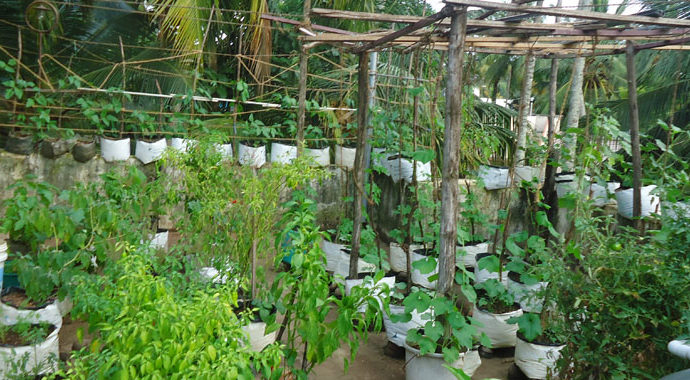

How Kerala is making the transition towards healthy, home-grown food
In Kerala, agri-food systems are in transition towards self-reliance and sustainability. Through bringing traditional gardening into the mainstream food agenda, and adopting technologies and practices like agroecology, growers and consumers…
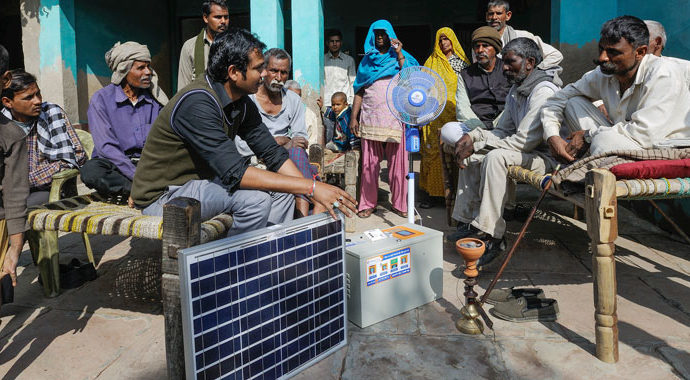

Unpacking sustainabilities in diverse transitions contexts: Four key lessons from empirical research
In the late 18th century, an Indian philosopher and religious leader offered a piece of knowledge to his followers. Taking into account the diverse religious faiths that exist in societies,…



Confronting authoritarian populism: a new initiative and a new paper
A few weeks back, I highlighted the launch of the Emancipatory Rural Politics Initiative (ERPI), and the availability of small grants for doing research on both the contours of the…
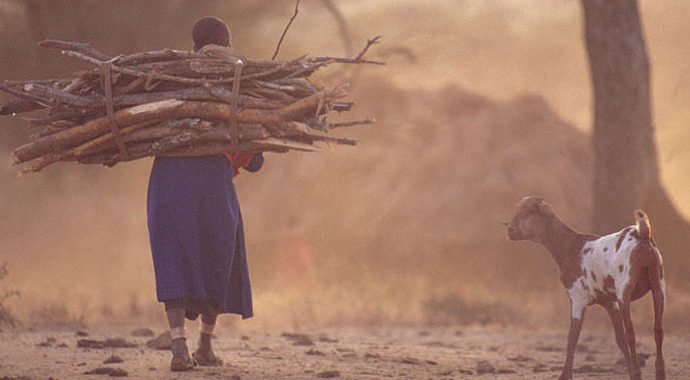

Results of four-year zoonoses research showcased in One Health ‘Special Issue’
Infectious diseases traceable to animals are driven by climate change, land-use change and the massive expansion of towns and cities, according to contributors to a paper in a major new…
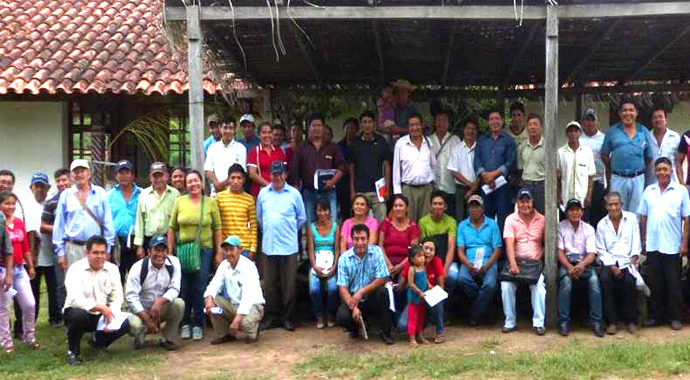

Research, convening and bridging: sharing insights from the ISSC’s Transformative Knowledge Networks
by Adrian Ely (co-lead, ‘Pathways’ Network), with contributions from Joanes Atela, Mirna Inturias, Dylan McGarry, Iokiñe Rodríguez & Patrick Van Zwanenberg Working with the World Social Science Council’s ‘Transformations to…
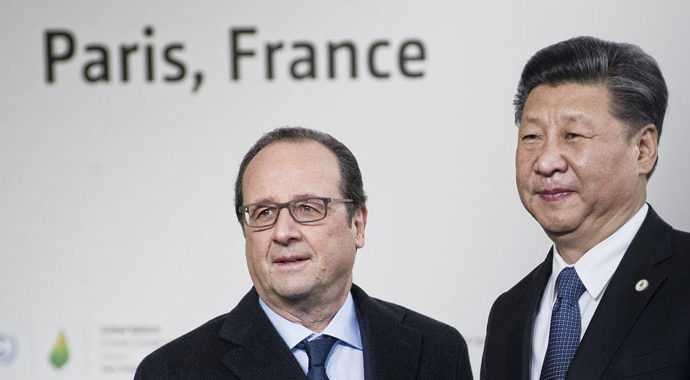

Can China be a global climate leader?
President Donald Trump’s decision to withdraw the United States from the Paris climate agreement has sparked off another round of intense global discussion on China’s potential as a global leader…
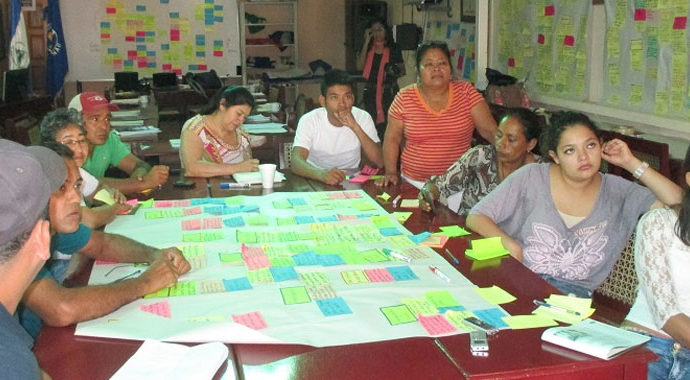

Using a “farmers’ jury” to see Nicaragua’s food system from rural perspectives
Jorge Irán Vásquez Zeledón, a participant in the project on Transitions to Agroecological Food Systems based in Nicaragua, has written a blog post (in Spanish) about a “Farmers’ Jury” organised…
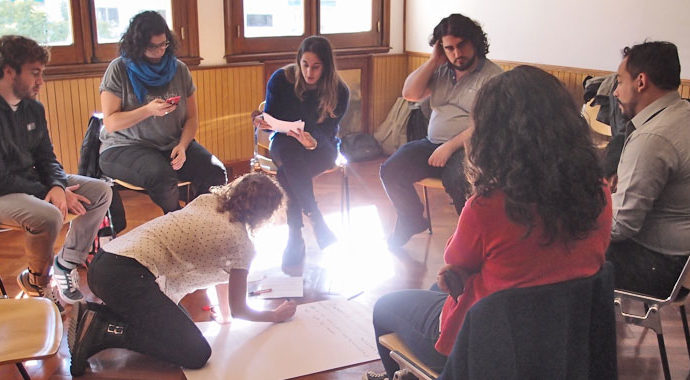

How can open and collaborative knowledge help to build communities?
by Adrian Smith, STEPS Centre and Patrick van Zwanenberg, STEPS America Latina Experimentation with open and collaborative ways of creating knowledge is flourishing. How might the increasing interest in initiatives…
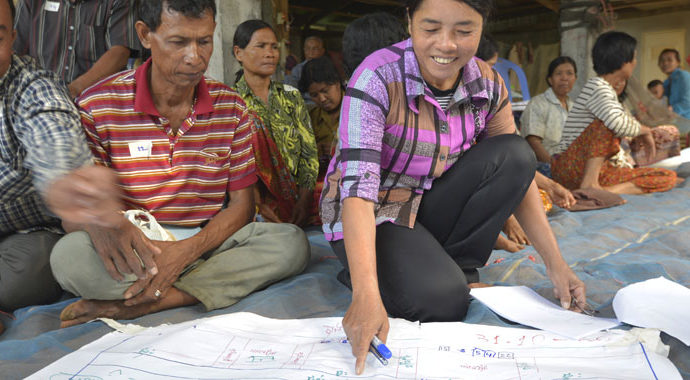

Putting research to use in addressing complex development challenges: are we ready?
by Marina Apgar and Boru Douthwaite The Sustainable Development Goals provide a framework that may open up space to move beyond the siloes of disciplines and sectors. Those of us…
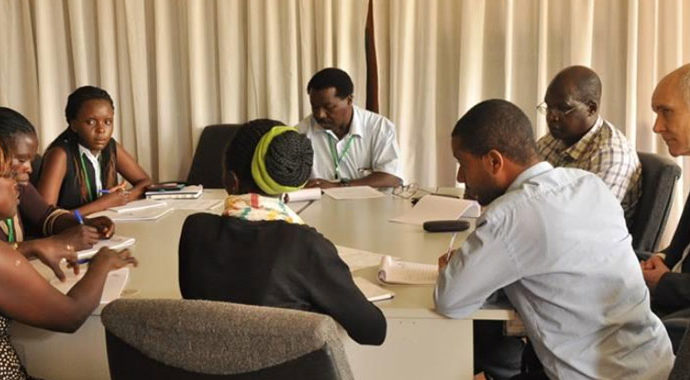

Rethinking transformative pathways to equitable growth in Kenya: key research options for the Kenya’s Newton Utafiti Fund
Kenya has witnessed a proliferation of research interventions on both international and national fronts. The country is a host to renowned research and development agencies such as the CGIAR, UN…
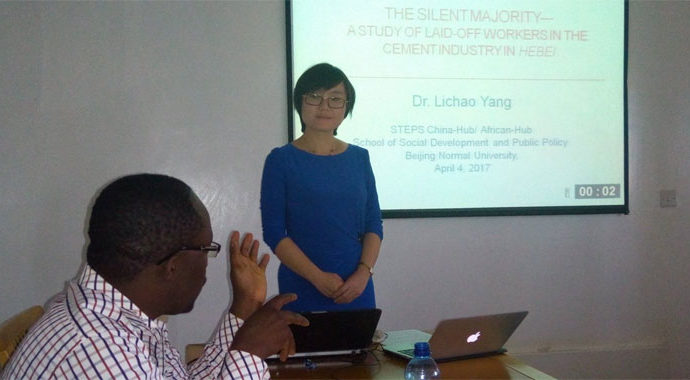

Learning across continents on sustainable transformations: a visit from China to Africa
In early April I visited Nairobi for a four-day exchange visit to the African Centre for Technology Studies (ACTS), as part of a project on Transformative Pathways to Sustainability funded…
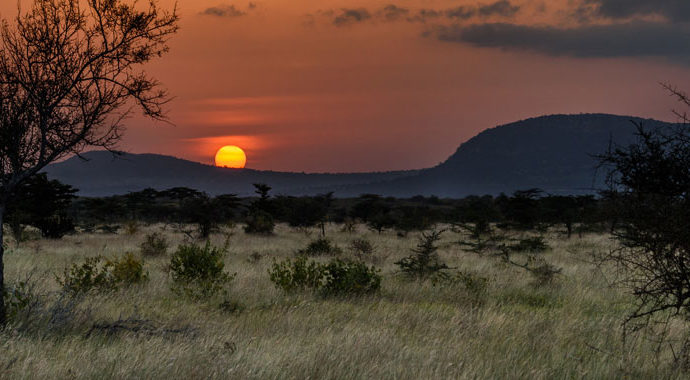

Beyond policy statements: how politics and ecology combine in land, water and forests
Governing land, water and forests (so-called ‘nexus’ resources) is critical for sustaining livelihoods, especially in the face of emerging shocks such as climate change. This also means that the effectiveness…
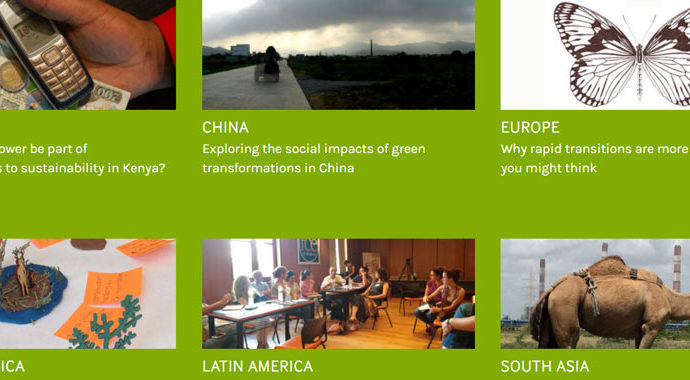

Introducing the new STEPS Centre and Global Consortium website
You might have noticed that the STEPS Centre has a new website. As the final step to our online facelift, we have just launched a new global section of the…
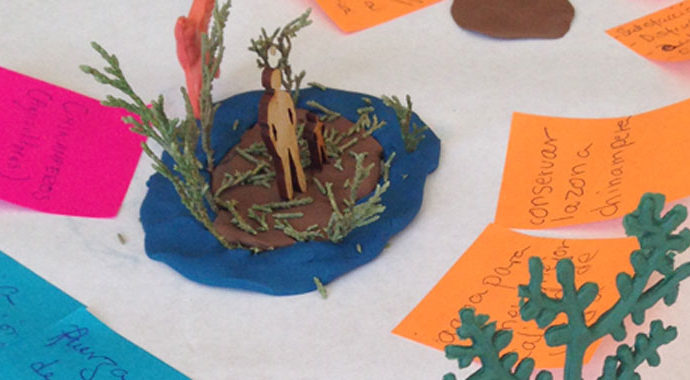

How rethinking local people’s agency could help navigate Xochimilco’s troubled waters
Xochimilco, Mexico City is the last remnant of the complex lacustrine system of wetlands that was the basis for agriculture and livelihoods (the chinampa system) in pre-Columbian times. However, the…
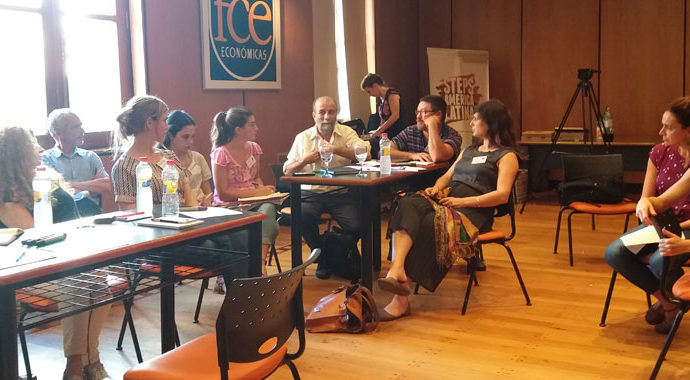

Could new alliances for seeds in Argentina be a way to nurture agricultural diversity?
Over the last three decades there has been an unprecedented process of concentration in world and regional seed markets. Seed R&D has shifted from being widely distributed over hundreds of…


Why rapid transitions are more possible than you might think
In the face of climate change and social inequality, changing to a greener and fairer society might feel impossible – but rapid, radical transitions may be more possible than you…


To combat neglected tropical diseases, we need more than just drugs and vaccines
Neglected tropical diseases have been in the news this week. A big meeting at the World Health Organisation in Geneva has resulted in big pledges from the UK aid progamme…


Is Trident Influencing UK Energy Policy?
What explains the UK government’s enthusiasm for nuclear power, despite its various problems – including technical difficulties and cost? Could one hidden factor be the pressure to support the infrastructure…
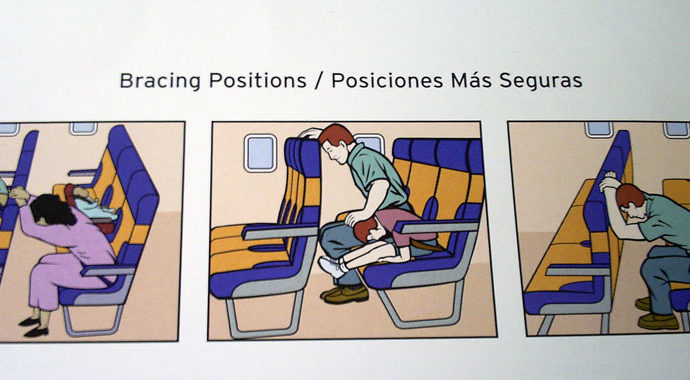

Facts vs truth: Brexit and sustainability in turbulent times
Today the UK’s Article 50 letter will be delivered, formally marking the UK’s intention to leave the European Union. Two weeks ago a conference on ‘Sustainability in Turbulent Times’ was…


How can solar power be part of transformations to sustainability in Kenya?
Transforming pro-poor energy access is a priority goal for many countries in Africa. Many poorer households are not connected to the grid, so use kerosene, paraffin or batteries, or have…



Just another drop in the bucket on World Water Day?
Each year, the United Nations uses World Water Day as an opportunity to raise awareness and demand action around the global water crisis. Each year, there is a theme. This…
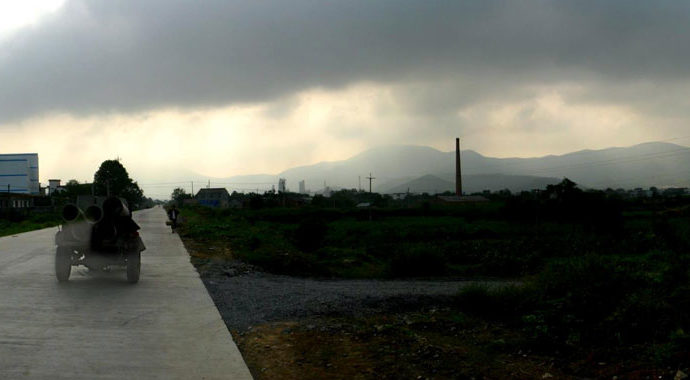

Exploring the social impacts of green transformations in China
pA transformation lab (T-Lab) focused on China’s green transformation policy and its impacts was held in Shijiazhuang City, Hebei Province on October 22, 2016. The T-lab intended to identify problems…
Protected: Reading list: Summer School on Pathways to Sustainabilility 2017
There is no excerpt because this is a protected post.
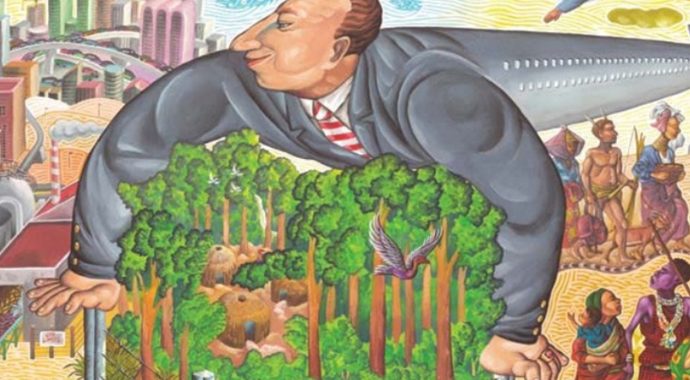

Impact story #2: From land grabs to the Anthropocene
A new impact story, From land grabs to the Anthropocene: exploring the politics of resources is the second in our series looking back at a decade of STEPS Centre research…
How understanding politics and science can help create resilient cities
A new article in Proceedings of the National Academy of Sciences (PNAS) explores how urban resilience can be strengthened by considering social and political norms, values and behaviours alongside engineering…
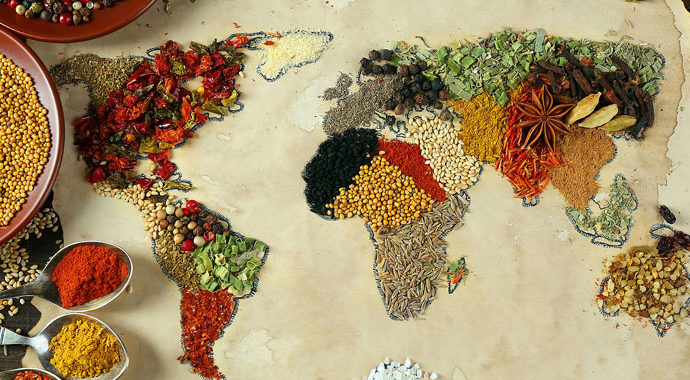

How open science practices in evaluation systems can make research socially relevant for developing countries
Researchers’ choices are inevitably affected by assessment systems. This often means pursuing publication in a high-impact journal and topics that appeal to the international scientific community. For researchers from developing…
One Health: are we doing it wrong?
International scientific meetings are great for many reasons. But I also found myself profoundly frustrated and disappointed when I attended the 4th International One Health Congress, One Health EcoHealth 2016, in Melbourne recently.
From remunicipalisation to reprivatisation of water? The case of Mozambique
After widespread privatisation in the 1980s, 1990s and 2000s, many water services around the world began to be transferred back into public control. This ‘remunicipalisation’ has been welcomed by the…
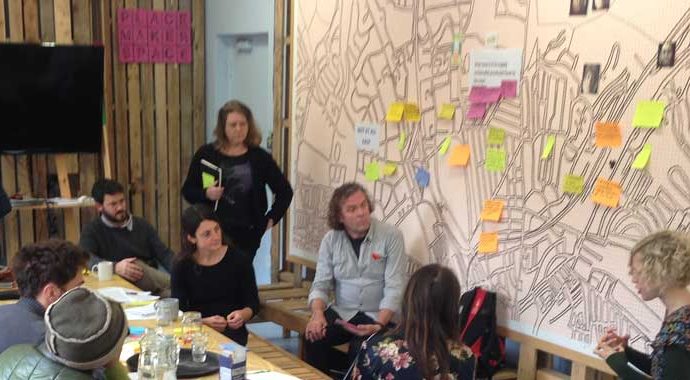

Why local land matters for sustainable food systems
Land presents both challenges and opportunities for establishing sustainable food systems. That is one of the learning points from a workshop in Brighton on 7 December 2016. Stakeholders joining the…
The social life of infectious diseases: a new impact story from STEPS
A new multimedia story, ‘The social life of infectious diseases’ is the first in a new series of impact stories from the STEPS Centre. It traces how our thinking on…



Livelihoods on the edge: contested mangroves in Kachchh
There is a real buzz about Mundra village on the Gulf of Kachchh coast, one of the fastest growing industrial hubs in India. A sprawling port, two of India’s biggest…
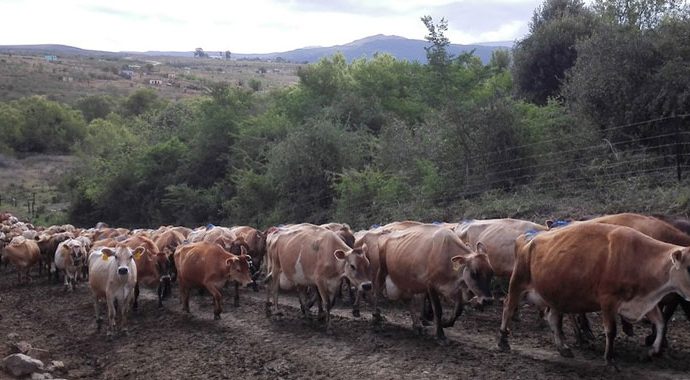

Livelihoods and the political economy of dairy in India and South Africa
This is the second of two blog posts comparing the dairy sector in India and South Africa, as part of research from the Governing the Land-Water-Environment Nexus in Southern Africa…
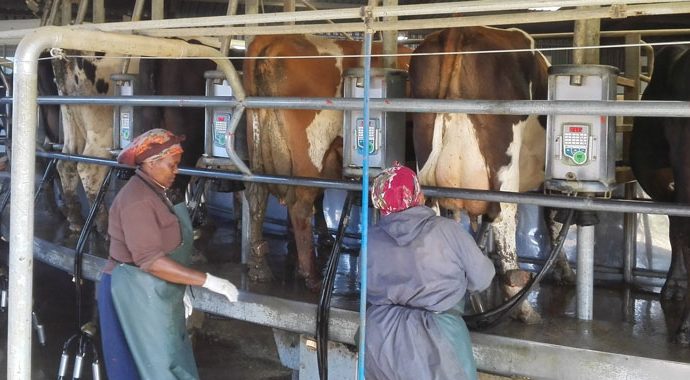

Divergent Dairy: comparing pathways in India and South Africa
As a significant agricultural commodity in both India and South Africa, what role can dairy play in spurring development?
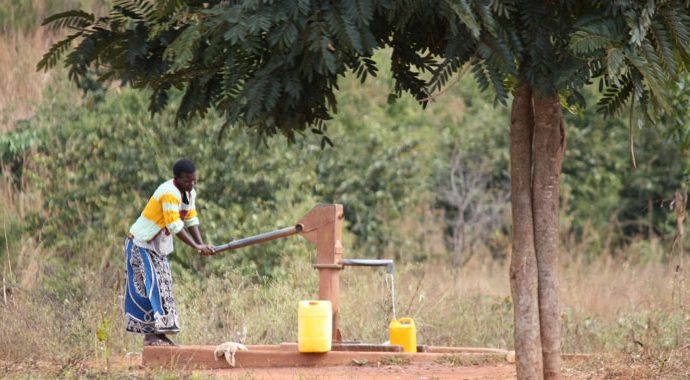

How water became a casualty of Mozambique’s debt crisis
One interesting aspect of doing fieldwork is that you get to understand some theoretical premises better. One such premise related to my PhD research is that the water/development nexus can…
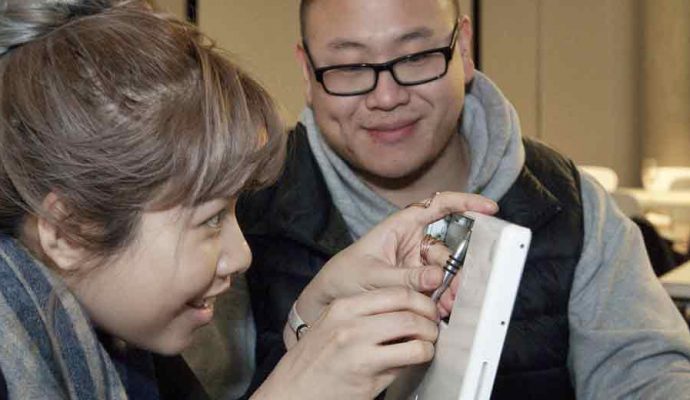

Power to the people: making & politics at the Science Museum
by Cian O’Donovan and Adrian Smith The maker movement in the UK, and globally, has grown rapidly over recent years. Hundreds of maker spaces, equipped with 3D printers, laser cutters,…
Trump and Brexit: what’s the alternative?
Sometimes when you suffer trauma, you have to look elsewhere to seek out radically new ways of framing things in order to recover. This year we’ve suffered two major traumas…
COP22: Climate change and innovation
The 22nd session of the Conference of the Parties (COP22) to the UNFCCC took place from 7-18 November 2016. Read research and opinion from STEPS on what happens next. This…


Winners and losers of China’s green transformation
The willow trees and pagodas lining the shore of the canal in a newly-built park in Jishuitan, Beijing are all meant to evoke the sights and smells of the Qing…
Governing the Land-Water-Environment Nexus: grant awardees 2015-2016
The following researchers have received grants for 2015-2016 for research under the project Governing the Land-Water-Environment Nexus in Southern Africa. Joanes Atela: Implications of governing the nexus on REDD+ implementation:…
Farming in the UK: can we nourish ourselves from this land?
The recent dispute over food prices between the UK’s largest supermarket chain, Tesco, and the UK’s biggest food and grocery manufacturer, Unilever shines a light on a deeper problem in…
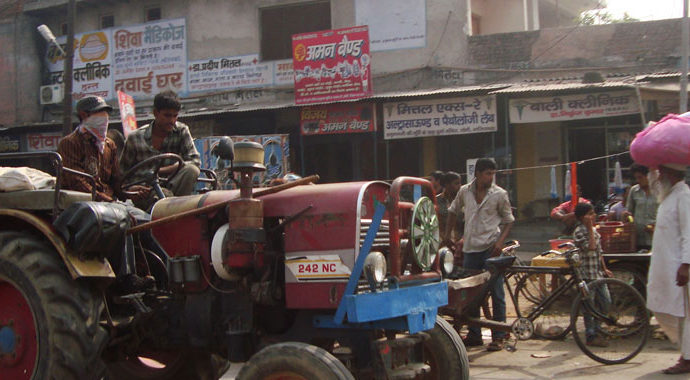

What does the future hold for Delhi’s urban farmers?
A new digital story and photo book show the dilemmas facing urban farmers at the edge of Delhi and Ghaziabad in India. Surrounded on all sides by rapid urbanisation, industry…
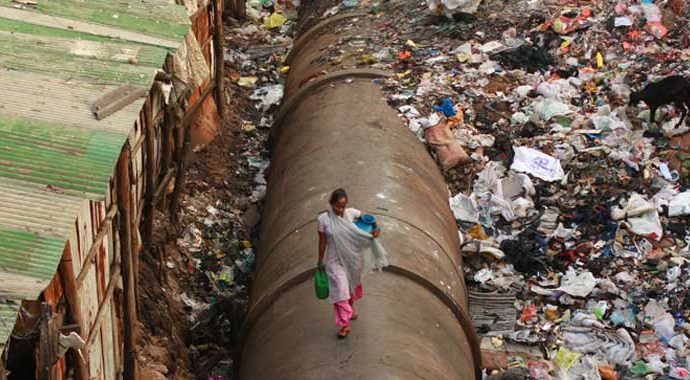

The New Urban Agenda and its 47 inclusions
Inclusion can be a powerful term, particularly when applied to cities and urbanisation. It focuses attention on the means through which exclusion and inequality are produced and reproduced, and…
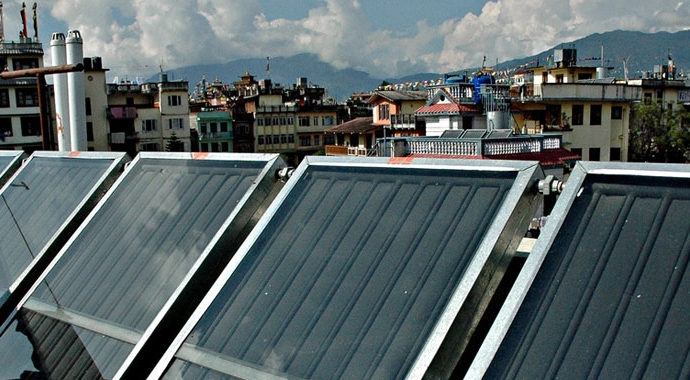

Learning from Nepal about aid, technology and development
A new book Aid, Technology and Development: The Lessons from Nepal will be published by Routledge in November. It is co-edited by Dipak Gyawali, who has had long-term links with…
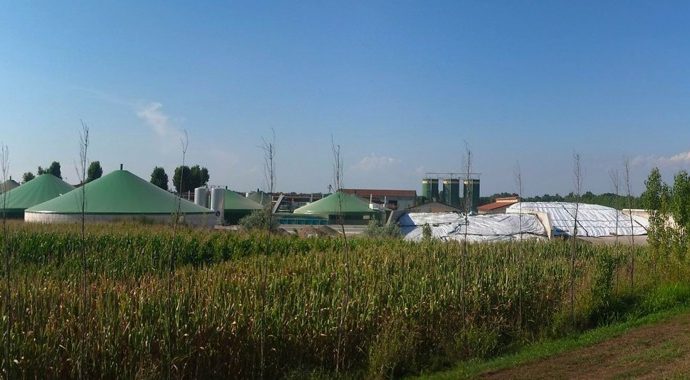

Hot debate about biogas: lessons from Italy
A new STEPS working paper by Bianca Cavicchi and Adrian Ely examines the history of biogas as a source of energy in the region of Emilia Romagna, Northern Italy. Over…
What can we learn from digital transformations?
by Nathan Oxley and Adrian Smith With climate change, inequality, and injustice putting pressure on societies around the world, it often seems that incremental change towards sustainable development is not…
The sugar rush in southern Africa
In a new post on his Zimbabweland blog, STEPS director Ian Scoones discusses a new special issue looking at sugar in South Africa. “It is a good moment to review…
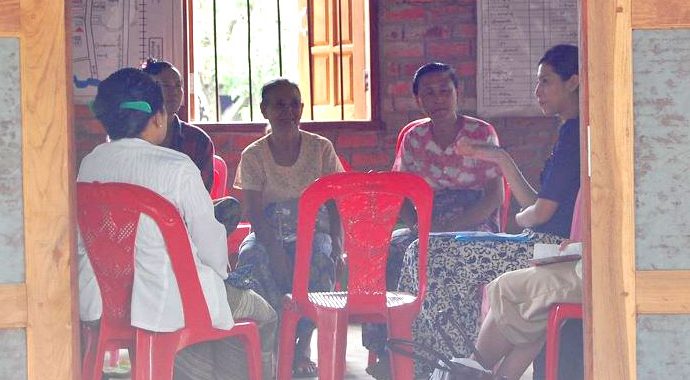

Agricultural revolutions then and now
I’m writing from a village 70km north of Yangon in Myanmar. A group of women farmers are talking about their experiences raising pigs. They have small herds, five to 30…
Hinkley C: why is the UK building a new nuclear power plant?
Today the UK government approved Britain’s first new nuclear power plant in 20 years at Hinkley Point C. Many of the reactions to the decision have been critical for a…
Learning from Rojava: exploring democracy in the midst of the Syrian war and beyond
Ahead of two events on democratic transformations in Northern Syria on 3 and 4 November, Patrick Huff (Birkbeck, University of London) blogs on the extraordinary changes going on in the…


What we talk about when we talk about technology
In casual conversation ‘technology’ usually means something like a device, gadget or machine. Your smartphone for instance, or the satellite navigation system in your car; maybe the car itself, why…
Empowering chickens?
In his latest Zimbabweland blog, STEPS director Ian Scoones looks at the latest scheme from Bill Gates to distribute chickens to help poor rural women.
Six grassroots innovation movements, and why they matter
Innovation is increasingly said to be vital for responding to global challenges like sustainable development. Often overlooked, however, is the fact that networks of community groups, activists and researchers have…
Beyond two-dimensional perspectives: Sustainable energy access as adaptation and mitigation?
Earlier this year, the Institute of Development Studies convened a one day meeting of scholars to discuss the emerging field of the politics of climate change adaptation. I study sustainable…
Responsibility and geoengineering in the Anthropocene
As the Anthropocene Working Group debate the start date of a new geological era, Jack Stilgoe asks what the Anthropocene means for how science takes responsibility for the climate. In…
Digital fabrication. Whose industrial revolution?
As the Society for Social Studies of Science & EASST build up to their annual meeting in Barcelona next month, the 4S blog is featuring preview pieces by participants. One…
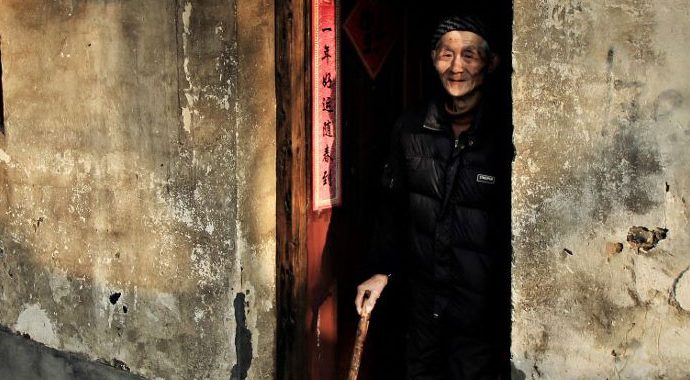

How China’s social care providers are experimenting to meet the changing needs of citizens
Welfare provision in China, including social care for older people, is being stretched and challenged by economic, social and demographic changes in the country. The rise in people’s expectations is…
Recipe for a Green Economy
Why aren’t the media talking more about climate change and population growth? asked Nigel Chapman, the Director of the BBC World Service and Trust from 2004 to 2009, speaking at…
Landmarks: how to get up close and personal with nature
I’ve just finished reading Landmarks by Robert Macfarlane, and it’s a must-read for anyone interested in sustainability and language. Each chapter focuses on one or two authors who’ve made deep…
How to move beyond technology in ‘Sustainable Intensification’
by Saurabh Arora and Ravic Nijbroek Sustainable Intensification (SI) promises more food from the same amount of land, while minimizing pressure on the environment. In Sub-Saharan Africa, considerable research and…
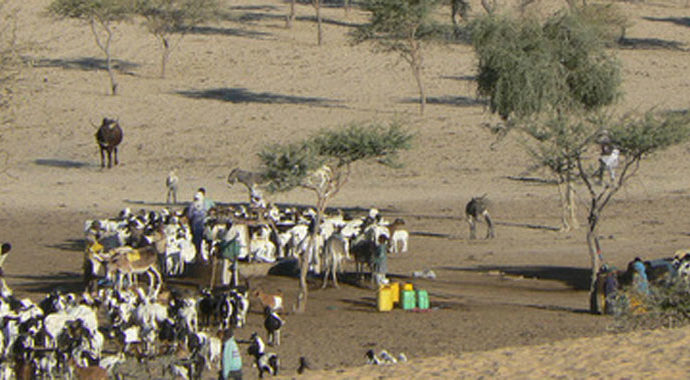

Why we should stop talking about ‘desertification’
A great new book has just been published called ‘The End of Desertification? Disputing Environmental Change in the Drylands’, available at a shocking price from Springer. It is edited by…
Science, Brexit and ‘post-truth’ politics
STEPS co-director Andy Stirling is one of six researchers writing in the Guardian on ‘science after Brexit’. A longer version of his part of the Guardian article is below. The…
How are the LDCs defining a new sustainable development agenda?
In June 2016, the Least Developed Countries Independent Expert Group, the International Institute for Environment and Development and the STEPS Centre hosted a dialogue for Least Developed Country (LDC) experts…
Why Britain’s decision to leave the EU is bad news for Africa
The fallout from the UK referendum that ended in victory for those wanting the country to exit from the European Union (EU) is still reverberating around the world. But what…
Brexit and development
As Britain faces the prospect of leaving the European Union, here’s a couple of blog posts on what the referendum result might mean for the UK’s role in international development….
Civilising Hypocrisies and Fundamental Questions: on “emancipating transformations”
This week Manchester Tyndall Centre hosted a provocative and highly interesting seminar. Professor Andy Stirling, who spent the 80s in the trenches for Greenpeace, had schlepped up to deliver a…
5 challenges for Least Developed Countries in the post-2015 era
2016 has been a big year for international agreements on development. New Sustainable Development Goals and targets were agreed. The Paris Agreement, the strongest statement for some time on climate…
Understanding the Anthropocene: blog series
We now live in an era where humankind has become the dominant force behind global environmental change. Paul Crutzen and Eugene Stoermer introduced the term “Anthropocene” to reflect the growing…
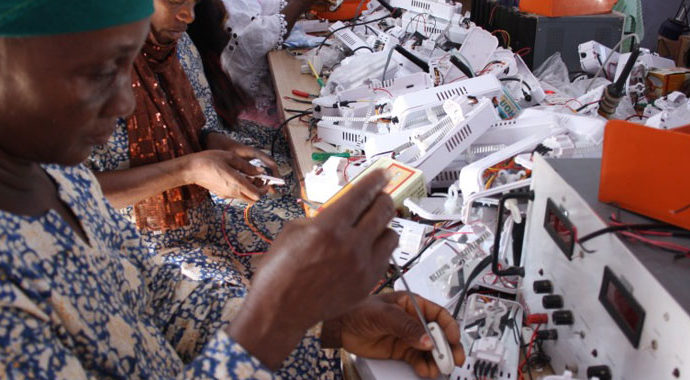

How can African countries really provide sustainable energy for poor people?
Last month, delegates drawn from across the world gathered at the UNEP headquarters in Nairobi for the second session of the United Nations Environment Assembly (UNEA-2) to discuss the theme…
Landesque Capital and the Political Ecology of the Anthropocene
In many areas of South East Asia rice terraces which are centuries old cover the mountainsides, while paddy field farming in South East Asia goes back hundreds of years. In…
Makerspaces: Creating inclusive spaces for sustainable innovations
Making stuff is all the rage these days. But how does sustainable development fit into this enthusiasm? The White House is celebrating a Week of Making from June 16-23 2016…
Painting a new picture of development
Can the Sustainable Development Goals trigger a new approach to development in the world’s Least Developed Countries? On Monday, Least Developed Country experts from around the world gathered in London…
How do we reform fossil fuel subsidies?
The idea of reforming fossil fuel subsidies is attracting attention in both academic and policy circles. The environmental and economic aspects of subsidies and their reform have been much debated,…
Four Scenarios of future urban E-mobility in China
What will it be like to live in Chinese cities as e-mobility takes hold? This is the question that has been investigated by a team at CeMoRe, Lancaster University and…
The financialisation of nature
Financialization describes an economic system or process that aims to reduce all values into a financial instrument. As part of this process, nature is treated as a private resource or…
How the Sustainable Development Goals create a political space to reimagine development
When the Sustainable Development Goals (SDGs) were agreed last September, there was much expectation about how they could help get sustainability back on the development agenda, and push the international…
Yukon: Sustainability Lessons from self-governing First Nations
The Yukon is a vast territory in northwest Canada with a small population and a rich complement of natural resources, from minerals to fossil fuels, wildlife to water. It is…
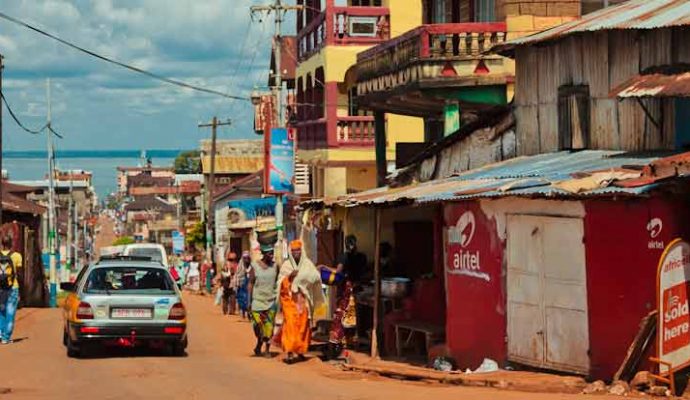

In the world’s poorest countries, cities could be the test for the Sustainable Development Goals
Ahead of a dialogue event on 13 June, STEPS member Gordon McGranahan discusses how the Sustainable Development Goals present challenges and opportunities for urbanisation in the world’s Least Developed Countries…
Explainer: Sustainable Development Goals and Least Developed Countries
The Sustainable Development Goals (SDGs) could provide an opportunity for radical transformation in the Least Developed Countries (LDCs). But with hundreds of targets, attempts to implement the goals could be…
Learning from the past about rapid transition
What can history teach us for the task of rapid transition in the face of climate change and corrosive inequality? Historian Molly Conisbee, a speaker at this week’s Transformations events…
Report: Transforming global food systems from uniformity to diversity
A report published today written by food security and nutrition experts proposes that input-intensive crop monocultures and industrial-scale feedlots must be consigned to the past in order to put global…
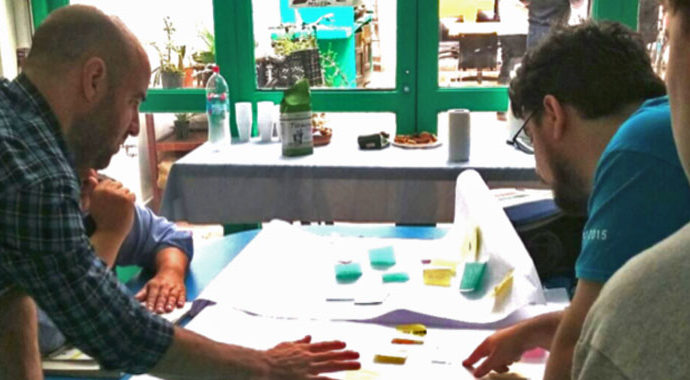

From social networks to robot scarecrows: Agroecology meets Open Source technologies
Agroecology has been traditionally based on co-producing knowledge with farmers, scientists, indigenous communities and technicians. As such, it could be regarded as an “open and collaborative” practice. But does this…
Iran’s environmental crisis: why we should be mindful of depicting a dystopian future
In our age of computers and satellites, our sense of both urgency and fear has become central to the process of addressing environmental challenges. This sense of necessity for urgent…
Needs of the poorest must be central to tackling antibiotic resistance
by Gerry Bloom and Annie Wilkinson, IDS / STEPS Centre Launched this week is a major report on tackling the growing resistance to antibiotics, published by the UK Government and…
Why we need to reveal the hidden connections at the heart of cities
By Fiona Marshall and Ritu Priya, STEPS Urbanisation theme Urban areas are intense meeting points of people and cultures, but they’re also places where more or less visible interactions happen:…
The Wicked Foundations of the Anthropocene
The Anthropocene describes how human society has now become the dominant force on Earth’s geology and ecosystems. The notion of the Anthropocene highlights a confounding contradiction: we have an unprecedented…
Making visible the hidden cogs of the urban nexus
On the steep hills on the outskirts of Lima, slums like San Juan de Lurigancho are ever expanding. As roads and shacks are built on steep slopes, residents face the…
Call for papers: Transformations 2017
A call for papers has been issued for the Transformations 2017 conference in Dundee, UK. Transformations 2017 is the third in a biennial series of international interdisciplinary conferences that focuses…
Next steps to strengthen global land governance
by Ruth Hall and Ian Scoones Four years ago voluntary guidelines on the governance of land and land tenure were agreed at the United Nations (UN) Food and Agriculture Organisation…
How can the STEPS pathways approach help us understand the Anthropocene?
by Mathew Bukhi Mabele (Department of Geography, University of Zurich) and Jacob Weger (Department of Anthropology, University of Georgia) It has been sixteen years since Paul Crutzen and Eugene Stoermer first…
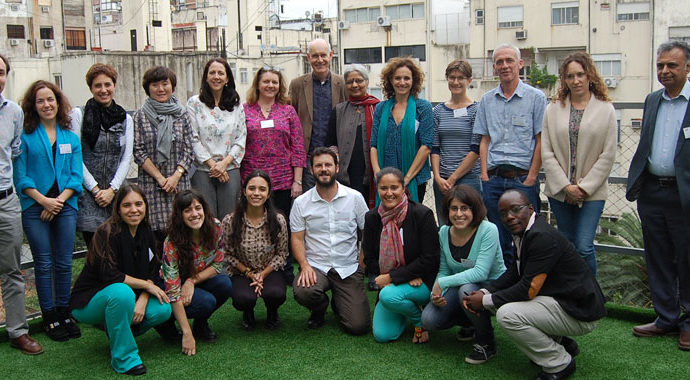

Seeking sustainable transformations around the world
The new ‘Pathways’ Network, which explores transformations to sustainability in 6 cases around the world, had its opening workshop in Buenos Aires on 24-27 April 2016. At the workshop, participants…
Earth Day: are we astronauts or toads?
It’s 50 years since the first image of the Earth from space was beamed back home from Lunar Orbiter 1. It’s hard for us now to imagine, or remember, what…
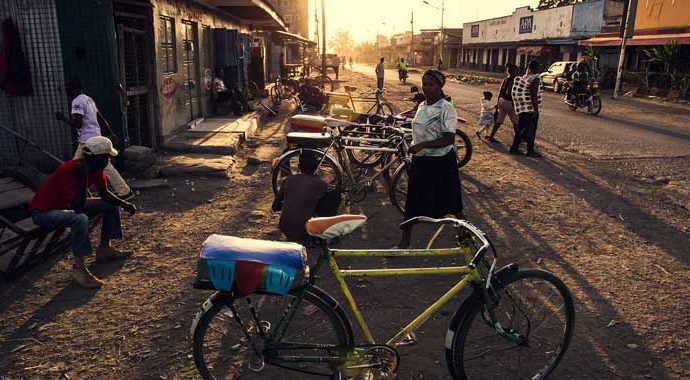

How do we link research and action for sustainability?
In March, researchers, knowledge brokers and funders gathered in Pretoria, South Africa to share lessons and experiences on how a decade of ESRC-DFID research support has impacted on poverty reduction….
Research collaboration for global challenges: why it’s really hard
On 17-18 March at London Zoo was the final conference of a project I have been involved in over the past four years on zoonoses, ecosystems and wellbeing in Africa….
Puzzling questions on tackling antibiotic resistance
Last week’s conference on One Health for the Real World was an enriching experience. All the participants agreed that One Health means linking together our understandings of, and responses to,…
Chinese engagement in African agriculture is not what it seems
In December 2015, Chinese President Xi Jinping flew into South Africa for the Forum on China-Africa Co-operation with great fanfare. There were lots of announcements about prospective investments across Africa….
Discussing low carbon urban mobility in China
On Sunday 13th March, the ‘Low Carbon Innovation in China: Prospects, Politics and Practice’ project held the closing workshop of its research package on urban e-mobilities at the Shenzhen Graduate…
Beyond risk factors: the all-too-human world of zoonotic pandemics
Human relationships are the unquantifiable that must be accounted for in global health according to the editor of a new STEPS book on One Health.
One Health for the Real World symposium
Welcome to the web page for our international symposium, ‘One Health for the Real World: zoonoses, ecosystems and wellbeing’, which took place at the Zoological Society of London, 17-18 March 2016.
Uncertainty and Climate Change in India
Harbouring one of the largest mangrove forest tracks in the world, the Sunderbans cover a sizeable area in southern Bangladesh and east India. Formed by the confluence of three major rivers, the deltaic…
Are China and Brazil transforming African agriculture?
A new Open Access Special Issue in World Development based on our work on the changing role of China and Brazil in Africa’s agriculture is now available (links to individual…
Contested Agronomy: Imagining different futures for food and farmers
The question of how to improve farming to feed and sustain people in developing countries is as important as ever, and there are no easy solutions. One route to finding…
Is more inclusive urbanisation essential to the 2030 Agenda?
The 2030 Agenda promises Sustainable Development Goals (SDGs) that are “integrated and indivisible” and “leave no-one behind”. Yet goals listed have historically been pursued in ways that bring them into conflict…
Nexus, resource conflict and social justice: are we speaking the same language?
Nexus network meetings are a bit like a bar scene in Star Wars, joked Professor Mike Bradshaw, from the University of Warwick: “What we need is a universal translator to…
Why we need Degrowth
In this post, Giorgos Kallis responds to a three-part critique by Andy Stirling of his ideas on the ‘Degrowth Hypothesis’. You can read Andy’s blog posts here: Part 1 /…
Outgrowing the twin simplifications of Growth and Degrowth: part 3
This is the third of a series of 3 blogs by STEPS co-director Andy Stirling, responding to the ideas of Giorgos Kallis on the ‘degrowth hypothesis’. Read Part 1 and…
Contested Agronomy: Four big questions to debate
We have just finished a fantastic conference co-hosted by the STEPS Centre on ‘Contested Agronomy’ with 80 participants and a vibrant discussion. I was asked to give some comments at…
Exporting China and Brazil’s agricultural know-how to Africa
Can China and Brazil use their home grown agricultural knowledge, which has driven phenomenal agricultural productivity at home, to transform agriculture in Africa? That was one of many questions discussed…
Outgrowing the twin simplifications of Growth and Degrowth: part 2
This is the second of a series of 3 blogs by STEPS co-director Andy Stirling, responding to the ideas of Giorgos Kallis on the ‘degrowth hypothesis’. Read Part 1 and…
To struggle against and to build with: what does student activism in Delhi mean for pathways to justice?
At the weekend, Umar Khalid, one of the six student activists accused in Delhi’s ‘anti-nationalism scandal’ unfolded by the Hindu nationalist government of Prime Minister Modi, returned to the campus…
Outgrowing the twin simplifications of Growth and Degrowth: part 1
This is the first of a series of 3 blogs by STEPS co-director Andy Stirling, responding to the ideas of Giorgos Kallis on the ‘degrowth hypothesis’. Read part 2 and…
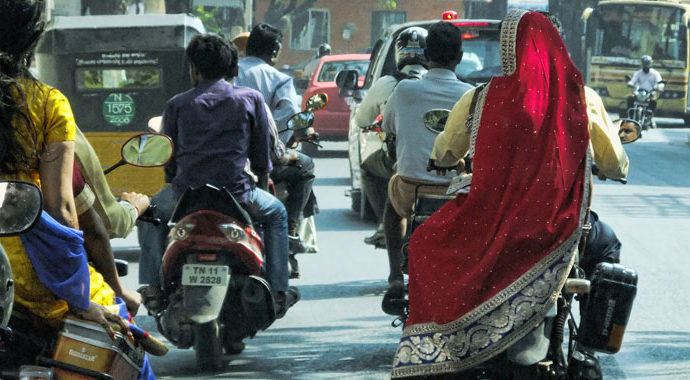

The challenges of creating new visions for sustainable urbanisation in India
by Poonam Pandey, from the Centre for Studies in Science Policy, Jawaharlal Nehru University. A two-day conference organised at Jawaharlal Nehru University, in collaboration with the STEPS centre, raised questions about how to…
First Ebola, now Zika: inconvenient truths about emerging diseases
In the second time in as many years, the World Health Organization (WHO) has declared a new Global Public Health Emergency: the Zika virus crisis has been born. A new…
Contested Agronomy 2016: Whose agronomy counts?
Contested Agronomy 2016 is a conference about the battlefields in agricultural research, past and present. Date and venue 23 – 25 February 2016 Institute of Development Studies University of Sussex,…
Contested Agronomy: more heat than light?
by Jim Sumberg, John Thompson, Ken Giller and Jens Andersson Agriculture, and the agronomic research that supports it, will be critical in making sustainable, equitable and secure development a reality….
Solidarity with JNU
We in the STEPS Centre stand in full solidarity and support for our colleagues at Jawaharlal Nehru University (JNU), India. We were distressed to hear of the circumstances leading to the arrests…
Video: Dominic Glover on agricultural biotech and smallholder farmers
STEPS member Dominic Glover spoke yesterday at the FAO’s International Symposium on “The Role of Agricultural Biotechnologies in Sustainable Food Systems and Nutrition”. Dominic’s presentation focused on the need to…
Symposium: animal-to-human diseases
Leading scientists, One Health practitioners and international policymakers are speaking this week at the One Health for the Real World: zoonoses, ecosystems and wellbeing symposium, co-organised by the STEPS-led Dynamic Drivers of…
Protected: STEPS Summer School 2016: Reading list
There is no excerpt because this is a protected post.
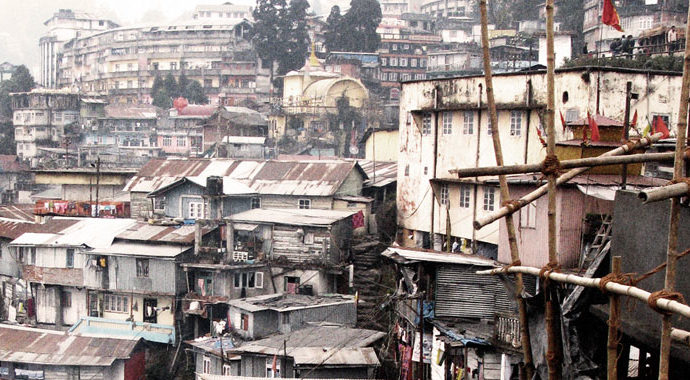

Why India’s urban researchers need to move beyond megacities
Guest post by Aviram Sharma The launch of the South Asia Sustainability Hub and Knowledge Network (SAH&KN) provides a much needed platform to the academic, policy and civil society groups…
Rethinking ‘smart’ in India: The city as an ecology of practices
Last week, the government of India announced the names of the first 20 cities slated to become ‘smart’. These are the winners of the recently concluded ‘Smart City Challenge’. The…
STEPS researchers among winners of China-Africa research fellowships
The China Africa Research Initiative has announced the Fall 2015 winners of its SAIS-CARI Fellowship Programme. Research projects will start between January 2016 and April 2016, and two researchers associated with STEPS…
What would a sustainable city look like?
On Thursday, India announced the first 20 cities to receive funding to become ‘Smart Cities’. It’s a high profile mission to modernise and transform urban infrastructure, especially using digital technologies…
From Dragon Heads to Farm Drops, Chinese agriculture has many faces
In Beijing last week, STEPS member Adrian Ely hosted a roundtable with social enterprises, NGOs and firms involved in food and agriculture to discuss the findings of the Low Carbon…
South Asia Sustainability Hub launched in Delhi
The economist Nitin Desai, the environmentalist Sunita Narain and the writer P. Sainath spoke at the South Asia Sustainability Hub & Knowledge Network launch event on 28 January in Delhi….
India’s seed sector is flourishing. Could African farmers benefit?
Africa’s farmers need quality seeds but the seed sector in Africa has often struggled to meet this need. The continent’s share in the global seed trade is very low, seed…
How do we end the dominance of rich countries over sustainability science?
by Patrick van Zwanenberg, Anabel Marin & Adrian Ely With the new Sustainable Development Goals adopted by the UN last year, SciDev.Net has published a timely report on the global…
Four neglected challenges for China’s low carbon future
Last year ended with a momentous political step forward on climate change. The Paris Agreement, signed at the COP21 climate conference in December, requires countries to work together to meet…
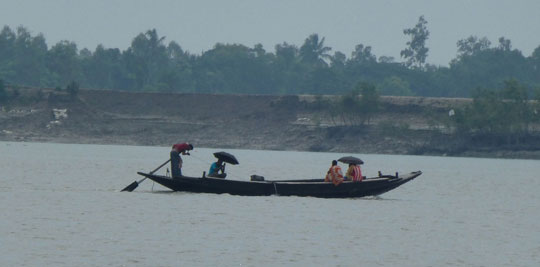

Workshop: Climate Change and Uncertainty from Above and Below
27-28 January 2016 New Delhi, India Uncertainty is often considered to be a “super wicked problem” or “monster” by scientists and policy makers. The integration of uncertainty in climate change…
International Conference: Pathways to Sustainable Urbanisation
29-30 January 2016 Jawaharlal Nehru University, New Delhi, India Cities in India and other South Asian nations are in the midst of experiencing rapid urbanization. In this time of growth,…
Bats, people and a complex web of disease transmission
By Kate Jones and Liam Brierley It might seem strange that after millennia of human history, outbreaks of new, ’emerging’ diseases that we’ve never seen before still regularly occur around…
In search of transformations at COP21
The International Social Science Council has published interviews from the COP21 climate conference with three researchers who are part of their ‘Transformations to Sustainability programme’. The interviewees include STEPS researcher…
Call for papers: EASST/4S session on makers, manufacturers and politics of digital fabrication
STEPS member Adrian Smith is one of the organisers of a session at this year’s EASST/4S conference. The session title is ‘Digital fabrications amongst hackers, makers and manufacturers: whose “industrial…
Was COP21 a failure or a success?
In the aftermath of the COP21 climate change conference, the debate over whether the Paris Agreement is a success or a failure is going full blast. Among other things, the…
‘This hope is real’: how COP21 frames the future
Who would have bet any meaningful amount of money, a month ago, that most of the world would sign up to 1.5 degrees at COP21? Of course there were celebrations…
Video: Andy Stirling on research methods and policy
In this video, STEPS Co-director Andy Stirling talks about the need to fully understand what qualitative and quantitative methods are before evaluating their role in science policy making. Andy’s presentation…
How to prevent epidemics: an optimist’s blog
“The optimist is someone who believes the future is uncertain.” Leo Szilard When I first studied epidemiology several decades ago, a story made the rounds that was supposed…
China’s largest wind farm and the politics of renewable energy
by Wei Shen and Sam Geall As negotiators enter the crucial final week of the UN-led Paris climate-change conference, much of the cautious optimism is pinned on big changes in…
Carbon forestry in Africa: who wins?
2015 is a crucial moment for sustainability and climate change, with the Conference of the Parties (COP) in Paris following hard on the heels of the UN’s new Sustainable Development…
‘All eyes on Paris’: climate talks in a heightened security context
For the past few weeks, all eyes have been on Paris because of two major events. The first is the seven coordinated terrorist attacks that hit the French capital on…
Escaping the frames of war
The world is now witnessing yet one further bout in a perennial tragedy. As so often before, organised violence is being used as an instrument of politics. This is no…
Africa’s land rush
There is a rush on for African farmland – a phenomenon unmatched since colonial times. Africa’s land rush, and the implications for rural livelihoods and agrarian change, is the subject of a…
COP21: How can climate-friendly innovation flourish in developing countries?
For low carbon development to work well, innovation is crucial. Both technological hardware like solar panels and grids, and social and institutional structures, need to change as the world looks…
How the Water-Energy-Food ‘Nexus’ in Asia affects real lives
By Carl Middleton, Center for Social Development Studies, Faculty of Political Science, Chulalongkorn University In Asia and globally, the water-energy-food nexus has received growing attention from policy makers, researchers, and practitioners….
COP21: how can Southern Africa cope with El Niño?
Today COP 21 opens in Paris. Over two weeks a new climate deal will hopefully be agreed. It is a critical juncture for humanity. As high level officials discuss options…
How to ensure governments stick to their Paris climate commitments
More than 146 countries covering 87% of global greenhouse gas emissions have now submitted their national pledges to tackle climate change in advance of the major climate summit in Paris….
Why climate negotiations should tackle ‘technology injustice’
Climate change is already causing harm to vulnerable people and will continue to do so. If we accept that mitigation and adaptation alone cannot avoid all the adverse impacts of…
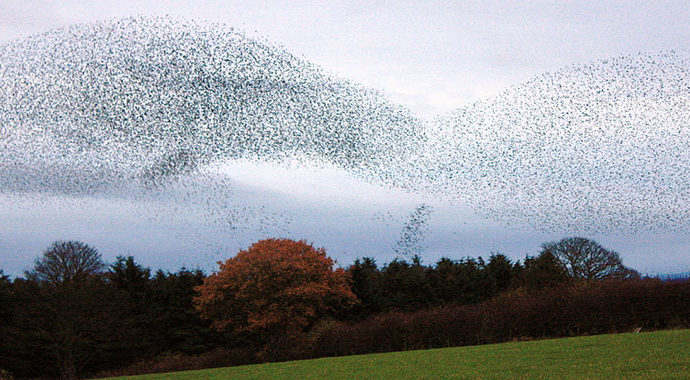

Opening up democratic politics for sustainable development: reflections from STEPS America Latina
The event that launched STEPS América Latina earlier this month, ‘Opening up the development agenda’, was a great workshop. It’s rare for a meeting of this kind to be so…
Spectacular cynicism: Seeing Indonesia’s fire and haze from the margins
Guest post by Zachary Anderson, University of Toronto Recently Indonesia was hit by massive forest fires, which were largely ignored by the Western media, despite their severe scale and impact….
Why are some people so keen to link climate change and terrorism?
Friday’s murderous attacks in Paris came just over two weeks before the start of the COP21 conference on climate change. A crisis meeting was held on Saturday morning to determine…
What are we doing when we do open science and inclusive innovation?
Last week I participated in the ‘launch’ event of STEPS América Latina, as part of ongoing work with researchers in the region. There, as elsewhere, we are exploring the politics…
Sharing the Open Source Seed Initiative at STEPS América Latina
by Claire Luby, Open Source Seed Initiative (OSSI) Claire Luby presented her work at the STEPS América Latina launch event in November 2015, as part of a panel on ‘horizontal…
Call for proposals: SPRU 50th Anniversary Conference
As part of the Science Policy Research Unit’s 50th anniversary in 2016, it will be hosting a major conference from 7-9 September 2016 at the University of Sussex. The conference will…
Call for papers: 2016 Initiatives in Critical Agrarian Studies (ICAS) colloquium
A call for papers has been issued for the international colloquium on Global governance/politics, climate justice & agrarian/social justice: linkages and challenges on 4-5 February 2016 in The Hague, Netherlands….
Opening up science and development in Latin America
STEPS América Latina is the latest regional hub of the Pathways to Sustainability global consortium to be launched. The launch event, which took place on 5-6 November in Buenos Aires,…
What is Ecological Civilisation?
The Chinese Communist Party last week held its annual plenum in Beijing at which details of the country’s 13th Five Year Plan, from 2016 to 2020, were set out for…
‘Reigning back’ the Anthropocene is hard – but Earth’s worth it
I am very grateful to Laura Pereira, Victor Galaz and Johan Rockström for taking precious time to respond to the points I raise in my earlier blog. It is a…
Making new worlds together
How could we end up in this world nobody ever wanted? This question, posed by Justyna Swat from POC21 during her talk at Monday’s event on makerspaces and sustainability, has…
The Anthropocene, control and responsibility: a reply to Andy Stirling
By Johan Rockström (Director, Stockholm Resilience Centre). This post is a slightly edited version of an email response and follows a blogpost by Andy Stirling on the Anthropocene, and Laura…
Reflections on “Time to Rei(g)n Back the Anthropocene”
By Victor Galaz, Stockholm Resilience Centre. This post was first published on the Resilience Science blog and is reposted here with kind permission of the author. This is a short…
Seeing the Anthropocene as a responsibility: to act with care for each other and for our planet
by Laura Pereira, University of Cape Town (UCT), South Africa This post is my contribution to the debate on the Anthropocene initiated by Andy Stirling in his blog. His comments…
The political economy of small-scale mining in Zimbabwe
There was much discussion about small-scale and artisanal mining at the STEPS Centre’s Resource Politics conference last month. This is where resources and politics come together; perhaps especially so in Zimbabwe. Ever since…
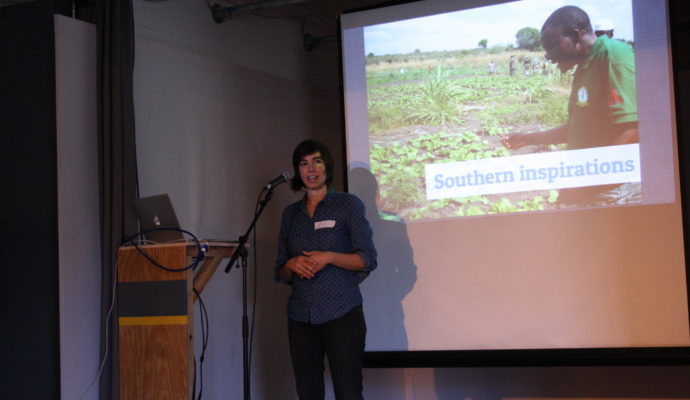

Making and Sustainability
At an event at the Machines Room in London on 26 October, we discussed the roles that maker communities and the places where they interact can play in sustainable development….
Borders and resources: “Across this line, you do not…”
Borders and maps are such a defining feature of modern civilisation that we can’t live without them. At the same time, many of us are subject to the mischievous urge…
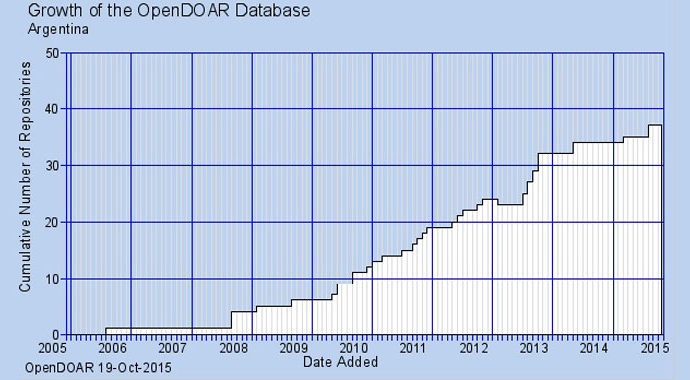

Open Access and Open Science in Argentina
In this OCSDNet blogpost for Open Access Week 2015, Mariano Fressoli and Valeria Arza write about Open Access digital repositories and the culture of Open Science in Argentina. It’s not…
What can China teach India about dealing with waste?
by Bharati Chaturvedi and Ashish Chaturvedi Just past the first anniversary of Swachh Bharat Abhiyan, as we ruminate about the achievements of the Modi government’s much-vaunted programme, it might also…
Exploring ‘dynamic sustainabilities’ in the Anthropocene
In this post, STEPS Summer School alumnus Mathew Bukhi Mabele explains plans for a session on ‘Exploring ‘dynamic sustainabilities’ in the Anthropocene’, which will feature at the 6th Annual Dimensions of Political…
Time to rei(g)n back the Anthropocene?
I was very lucky to be able to participate in last week’s Stockholm Resilience Centre conference on ‘Transformations 2015: People and Planet in the Anthropocene‘. Involving a dynamic and highly…
Why livelihoods perspectives still matter
Livelihoods perspectives have become increasingly central to discussions of rural development over the past few decades. They have offered a way of integrating sectoral concerns and rooting development in the…
What lies behind the UK’s strange policy on nuclear power?
The UK chancellor George Osborne has recently made further commitments to support massive new investment in nuclear infrastructure, including the much-criticised Hinkley C power station. Why is the UK determined…
How can African agriculture adapt to an uncertain climate?
By Stephen Whitfield, Lecturer: Climate Change & Food Security, University of Leeds Often operating at the margins of sustainability, for smallholder farming systems in Africa the challenge of adapting to uncertain climatic change is particularly…
El Niño predictions signal urgent need to prepare for Rift Valley fever epidemics in eastern Africa
Recent climate predictions suggest East Africa may be in line for an epidemic of Rift Valley fever (RVF) – an infectious disease which can hit people, their livestock and livelihoods,…
Politics of Integrated Water Resources Management in southern Africa
For the past two decades, Integrated Water Resources Management (IWRM) has been the dominant paradigm in water resources. It is the flagship project of global bodies such as the Global Water Partnership (GWP)….
Bringing vehicle sharing to China
by Dr Dennis Zuev (Research Associate, Lancaster University) & Dr David Tyfield (Reader, Lancaster University) Car-sharing is the fastest growing urban mobility innovation worldwide but is yet to take off in Chinese cities. According to a recent…
Moving beyond products to material culture
Prototyping or debating sustainable developments in makerspaces? In the previous blog I introduced some of the diverse ways that makerspaces are helping cultivate sustainable developments. Admittedly, these initiatives do not represent…
Why should we seek sustainable developments in makerspaces?
Community-based workshops like hackerspaces, fablabs and makerspaces, equipped with design, prototyping and fabrication tools have spread rapidly in recent years. Interest in the social, economic and environmental possibilities of these spaces has…
Sustainability: the next 50 years
Accelerating sustainability is a challenge that defines our era. A new Institute of Development Studies (IDS) paper by Hubert Schmitz and Ian Scoones, Accelerating Sustainability: Why Political Economy Matters (pdf),…
BEAM Exchange Research: Call for proposals
BEAM Exchange is investing in a significant research programme to develop new knowledge that is authoritative and accessible around critical questions about market systems approaches. A call for proposals has…
Centre for Bionetworking symposium: have we become too ethical?
The Centre for Bionetworking is running a symposium on research ethics, to be held at the University of Sussex in November. Have We Become Too Ethical? – Managing vulnerability in…
What does systems thinking for rabies control mean for rabies research?
Rabies, in many ways, is an atypical zoonosis. It continues to feature as a priority disease by multiple national as well as international agencies. There is substantial research evidence regarding…
In defence of ethics
Michael Hauskeller writes in defence of ethics: “We are not sitting in an evolutionary elevator that has only two directions: up and down. Instead, there are many different ways of…
Ramaswamy Iyer: remembering a water justice fighter
An obituary of the Indian water policy expert Ramaswamy Iyer has been published in the magazine Seminar. The author is Dipak Gyawali, a member of the STEPS advisory committee, who…
Giving flesh to the science and innovation we need to see
by Ben Ramalingam, Research Fellow, Institute of Development Studies Science, technology and innovation have been integral in successful development and poverty-reduction efforts, whether in Europe, Latin America, Asia or Africa….




Rethinking Africa’s sustainable development pathways
Sustainable development (SD), brought into the spotlight with this week’s UN summit, remains a landmark policy and global development agenda since the 1992 Convention on Environment and Development. Anchored on…
SDGs: time to rethink energy infrastructure?
As the new Sustainable Development Goals are launched this week, attention will be focused on some of the great global challenges that face our world. They also give us a…
Will the Sustainable Development Goals make a difference?
This week heads of state assemble in New York to launch the Sustainable Development Goals. The agreed text lays out 17 goals and 169 targets. It is an ambitious agenda…
Understanding soils using interdisciplinary methods
Our director Ian Scoones has applied the STEPS pathways approach to understanding soils, for a new article in Current Opinion in Environmental Sustainability. 2015 has been named as the International…
WSSF 2015: What kinds of alliances create transformative knowledge?
In advance of the World Social Science Forum I have been in Durban with an inspiring group of researchers and activists to discuss transformations to sustainability. It has been incredibly…
WSSF 2015: What role can social science play in working towards a just world?
Nearly a thousand delegates from across 84 countries are gathering right now in Durban, South Africa, for the third World Social Science Forum. The first similar forum ‘One Planet –…
Hunger and HIV: have we misread the landscape?
Some of the most important questions we have concern large and extreme events of which we have little experience and few examples. We don’t learn nearly as much as we…
Ebola: identifying the true game-changers
Compared to this time last year, news about Ebola is hugely more encouraging. Although not over, the number of new cases per week tends to be in single figures instead…
New book: Sustainable Livelihoods and Rural Development
Livelihoods are a vital lens on rural development, but should be examined in the context of wider questions of political economy. A new book by STEPS director Ian Scoones looks…
Who writes international climate change reports?
Guest blog by Esteve Corbera (ICTA-UAB, Spain) This week in the journal Nature Climate Change, colleagues and I published an analysis of who has participated in the latest 5AR mitigation…
Achieving sustainable development means no goal leaving gender behind
This article is part of a series on the Sustainable Development Goals. Feminists and their allies fought strongly for a stand-alone Sustainable Development Goal (SDG) on gender equality and empowerment…
Why Germany is dumping nuclear power – and Britain isn’t
by Philip Johnstone and Andy Stirling The starkly differing nuclear policies of Germany and the UK present perhaps the clearest divergence in developed world energy strategies. Under the current major…
Resource politics: living in the Anthropocene
By Ian Scoones, Director of the STEPS Centre This week we are hosting a major conference at the STEPS Centre at Sussex on resource politics. There are panels looking at…
Conference: Resource Politics 2015
This year’s STEPS Centre conference, Resource Politics: transforming pathways to sustainability, took place from 7-9 September 2015 at the Institute of Development Studies. Plenary speakers include Rohan D’Souza, Betsy Hartmann,…
STEPS at the IST2015 Sustainability Transformations conference
This week the International Sustainability Transitions Conference takes place at Sussex University, hosted by the Science Policy Research Unit (SPRU). The event kicks off on the afternoon of 25 August…
More about the research
Although reliable numbers are hard to come by, Myanmar pig production is expected to grow rapidly over the coming decades. Livestock intensification This growth is being accompanied by an intensification…
Book: Gender Equality and Sustainable Development
A new book, Gender Equality and Sustainable Development, edited by Melissa Leach, has been published in the STEPS Centre’s Pathways to Sustainability book series. For pathways to be truly sustainable…
Are Common Wealth Trusts the way forward for a sustainable and equitable future?
STEPS co-director Andy Stirling responds to a recent article on the Great Transition Initiative website by Peter Barnes, which makes the case for Common Wealth Trusts as a way of…
Debating Science and Technology for Development in Africa
By Ian Scoones, Director of the STEPS Centre At an event today we will be debating the STISA-2024 (Science, Technology and Innovation Strategy for Africa) initiative by the African Union…
Submerged origins of UK nuclear lock-in?
By Andy Stirling, STEPS Co-Director and Phil Johnstone, Research Fellow at SPRU – Science Policy Research Unit Many legitimately contrasting views are possible on the pros and cons of nuclear…
Cecil the Lion and Zimbabwe’s conservation carve-up
The huge uproar generated by the shooting of Cecil the lion provides a fascinating lens into Zimbabwe’s new elite land politics and the relationship between humans and “wild” nature. The…
Does the Anthropocene mean we have to ‘put democracy on hold’?
Our co-director Andy Stirling is at the 2015 conference of the International Society for the Systems Sciences in Berlin today, and sent us this abstract of his keynote, ‘Emancipating Transformations:…
Unpacking multiple “shades of green” to make hope possible
Sandra Pointel, Associate Tutor, SPRU This year will see the culmination of two major global agreements for climate change and development. From 30 November to 11 December, worldwide negotiators will…
Tackling climate change: the contested politics of forest carbon projects in Africa
Tackling climate change is one of the most pressing challenges of our age. And this year is a crucial moment with the Conference of the Parties meeting in Paris in…
Sussex Sustainability Research Programme seeks new Director
The University of Sussex is recruiting a Director for its Sussex Sustainability Research Programme. Initiated this year, SSRP spans four of the University’s Schools and the Institute of Development Studies…
Does social science suffer from ‘physics envy’?
Many social scientists and some humanities scholars suffer from a condition that I like to refer to as ‘physics envy’. The term resonates with Freud’s theory of ‘penis envy’, as…
From COP21 to antibiotics: all the latest news from STEPS
Resources to help make sense of climate change in the run up to COP21 feature in our latest newsletter, packed with new projects, publications and events. Read all about it:…
Pollution in the Hindon River
This month, the Hindustan Times featured a short series of articles about the Hindon river and its tributaries. The Hindon runs through Ghaziabad, one of the study sites in our…
STISA-2024: Debating Africa’s “Blueprint” for Science, Technology & Innovation
The desire to enhance the strategic use of Science, Technology and Innovation (STI), and public policies in achieving Africa’s socio-economic and development aspirations started decades ago. We know that as…
Welcoming the medics to the One Health movement
The Ebola epidemic alerted many to the interconnectedness of human, animal and environmental health. The medical community has traditionally lagged behind animal health and ecosystem experts in embracing One Health,…
Partners
The Myanmar Pig Partnership comprises a multidisciplinary team including vets, microbiologists and social anthropologists from across the UK, Myanmar and Vietnam. There are four partners: The University of Cambridge (lead)…
Global lessons for agricultural sustainability from GM crops
Governing Agricultural Sustainability: Global lessons from GM crops is the latest title in the STEPS Centre’s Pathways to Sustainability book series. Editor Phil Macnaghten introduces its reframing of the GM…
What Greece can learn from Africa about the effects of austerity after a debt crisis
Ian Scoones, republished from The Conversation Some have asked what can Africa learn from Greece. I argue that Greece (and others) can learn a lot from the African experience….
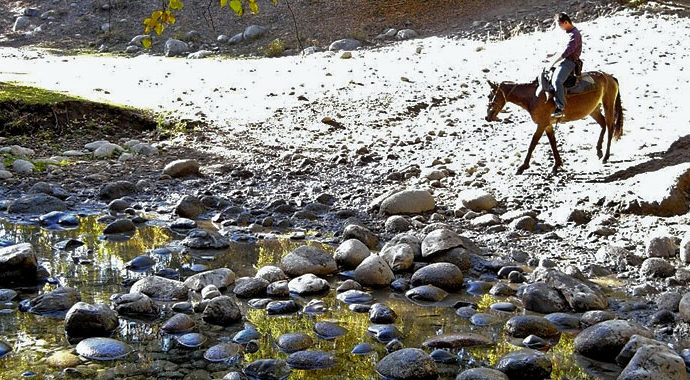

What can development learn from China’s approach to reform?
By Lewis Husain and Adrian Ely At the launch of the STEPS China hub in Beijing this year, there was much talk of learning from China’s development experiences. A key…
Multicriteria Mapping meets Operational Research for Development
By Bipashyee Ghosh and Josie Coburn On Thursday (9 July), we facilitated a Multicriteria Mapping workshop as part of a two-day Operational Research for Development workshop, OR: Uplifting Living Conditions,…
For or against GM crops? Other positions are available
Academic cheerleaders for biotechnology corporations need better arguments if they want to persuade the public, write Erik Millstone, Andy Stirling and Dominic Glover, introducing their article in a forthcoming edition…
Our Common Future day 1: Climate science & climate politics in Paris
STEPS member Adrian Ely is at the Our Common Future conference in Paris, and has sent this blogpost looking back on Day 1. The conference runs until Friday. Read our…
A market without trading: China’s ambition to create a nationwide Emission Trading Scheme (ETS) and its challenges
It is 10 years since the European Emissions Trading Scheme (EU-ETS) launched. Now China is working on its own equivalent scheme, with a huge potential impact. But China’s businesses –…
Restart Podcast: Adrian Smith on grassroots innovation
The London-based Restart project, which promotes community repair for electronics, interviewed STEPS researcher Adrian Smith for their latest podcast, ‘Searching for the roots of grassroots innovation’. In it, Adrian discusses…
STEPS Director Ian Scoones wins ESRC Impact Award
STEPS Director Ian Scoones was a winner of the Outstanding International Impact Award at the ESRC’s 50th anniversary Celebrating Impact Award ceremony, for his work on rural livelihoods in Zimbabwe….
Reports on climate change and health forecast gloomy future but ‘no-regret’ options may save the day
Ever since climate change became an issue of concern there have been questions about the possible impacts on health. This month, two landmark reports have been released, both of which…
Could changes in beef market regulations open opportunities in southern Africa?
Last month at the OIE (World Animal Health Organisation) Assembly in Paris, changes to international regulatory standards around Foot and Mouth Disease were adopted. This has long been argued for, and…
Africa Sustainability Hub will promote low-carbon opportunities
A new African sustainability research hub will make a “huge contribution” to promoting low carbon economic development in Kenya, according to a speech on Wednesday 10th June by Hon. Henry…
Myint Zaw to join us for Resource Politics 2015
Myint Zaw, winner of one of this year’s ‘Green Nobels’, the Goldman Environmental Prize for Asia, will speak at Resource Politics 2015, the title of this year’s STEPS Centre annual…
Stories from STEPS: Float like a Fab Lab, sting like a Honey Bee
The second in a series of digital stories from the STEPS Centre looks at movements and experiences of ‘grassroots innovation’ and ‘inclusive innovation’ around the world, and asks how they…
Pope Francis’ environmental encyclical
Today sees the publication of “Laudato Si”, the Pope’s encyclical on the environment. Encyclicals are for Catholics (and there are 1.2 billion of them in the world) but in this…
Pro-poor, low carbon energy conversations across the STEPS global consortium
I was in Nairobi last week for the launch of the Africa hub of the STEPS Global Consortium. During the three day event, I learned a great deal about developments…
Kenya Treasury Cabinet Secretary Rotich Launches Africa Sustainability Hub
A new African sustainability research hub will make a “huge contribution” to promoting low carbon economic development in Kenya, according to a speech on Wednesday by Hon. Henry Rotich, Cabinet…
Why isn’t global renewable energy investment growing faster?
Guest blog by Stephen Spratt, Research Fellow at the Institute of Development Studies Last Friday I was a discussant at a fascinating seminar given at SPRU by Marianna Mazzucato and…
Carbon Conflicts: A new book from STEPS
Carbon Conflicts and Forest Landscapes in Africa, edited by Melissa Leach and Ian Scoones, examines the management of forests and carbon. Tackling climate change is one of the most pressing…
Kenyan Cabinet Secretary for Finance: STEPS Africa is “a huge contribution”
On behalf of the Cabinet Secretary of the National Treasury on Kenya, Hon. Henry Rotich, Professor Judi Wakhungu, Cabinet Secretary for Environment, Water and Natural Resources formally launched the STEPS…
STEPS Africa Sustainability Hub launched in Nairobi
“There is no better time to launch the Africa Sustainability Hub than now,” says Dr Mohamed Kyari from the Human Resources, Science and Technology Department of the African Union. The…
Why access to energy is crucial for economic growth and poverty reduction
This week I am in Nairobi for a conference focused on ‘Low Carbon Africa’, discussing the diverse pathways to low carbon energy. Energy access is a key issue across the…
Knowledge is power: towards Low Carbon Energy in Africa
The G7 have promised to phase out fossil fuel emissions by the end of the century. Though a long-term target, it’s the first time a proper date has been set…
Global land grabbing: new papers & special issues
This week 200 delegates assemble in Chiang Mai in Thailand for a major conference on land grabbing, conflict and agrarian-environment transformations in southeast Asia. It is co-organised by the Land…
Waste(d) laws in India
by Ashish Chaturvedi Research Fellow, Institute of Development Studies Last year, I wrote about the Government of India’s Swachh Bharat Abhiyaan (Clean India Mission), launched on the anniversary of Gandhi’s…
Watch: Mike Hulme on climate science, values and disagreements
At our 2015 STEPS lecture, Mike Hulme spoke on continuing disagreements on climate change, and his thinking on how they could be addressed in ways that take account of diverse…
A human rights approach to Water and Food Security connections
A new report on water for food security and nutrition led by Lyla Mehta shows how land, food and water issues are inextricably linked and must be reflected in policymaking…
Glyphosate, politics and chemical safety
Glyphosate, the world’s most widely used herbicide, hit the headlines in March after the International Agency for Research on Cancer (IARC) announced that it is a “probable human carcinogen”. The…
Nepal: resilience, disasters and development
The doyen among Nepal’s ethnographers, the Janku-blessed Bihari Krishna Shrestha had a valid point. Since his phone had gone dead after the Big Earthquake of 25th April, I had gone…
Stories from STEPS: Waste not, want not
The first of a new series of digital stories from the STEPS Centre looks at the working lives of India’s waste pickers, and reveals the hidden connections within the life…
Sustainable urban waste management in India
By Fiona Marshall and Pritpal Randhawa Today in Delhi government officials, representatives of waste pickers associations, NGOs, industries and resident welfare associations will participate in the launch event for our…
Water purification and the regulatory vacuum in India
By Aviram Sharma, Centre for Studies in Science Policy, JNU Water purification technologies have witnessed a rapid rise at firm, household and community level in developing countries, especially during the…
We’re Number One! University of Sussex tops world rankings for development studies
The University of Sussex – home to the ESRC STEPS Centre – has been named as the top university in the world for development studies by Higher Education data specialist…
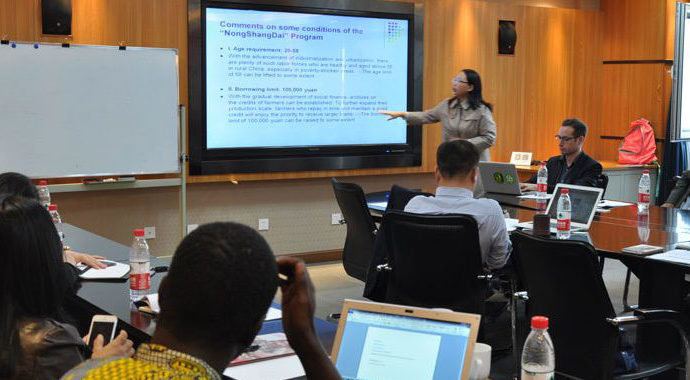

China Daily covers launch of China Sustainability Hub
Mutual learning across continents is one of the key imperatives behind the launch of our China Sustainability Hub and the focus of a China Daily article about the Hub, which…
South-South Cooperation: Voices from Africa and Latin America resonate in China
By Sandra Pointel The launch of the STEPS Centre China Sustainability Hub in Beijing last week provided a useful platform for participants at the Pathways to Sustainability in a Changing…
Between ‘greenization’ and ‘citizenization’: Welcome to China’s New Normal
By Sandra Pointel A group of researchers from China, Africa, Latin America and Europe met last week in Beijing to launch the new China Sustainability Hub, in collaboration with the…
Has the ‘impact agenda’ helped agronomy – or harmed it?
Every agronomist or agricultural research institute with an interest in international development, and who has applied for a research grant in the last 15 years, will have had to develop…
Made in China? Mutual learning in a global development era
This week marks the 60th anniversary of the Bandung conference when Asian and African countries gathered in Indonesia to discuss independence, peace and prosperity. The conference resulted in 10 principles…
Sustainability in a Changing China
The STEPS Centre is delighted to be working with partners in China to launch a Sustainability Hub for collaborative, interdisciplinary research and learning, launched today at an international conference on…
Addressing Resistance to Antibiotics
There is growing international concern about the threat to public health of the emergence and spread of bacteria resistant to existing antibiotics. An effective response must invest in both the…
Displaced by ‘development’: land, water and protest in Modi’s India
In the Narmada valley in western India, displaced people and activists are protesting against displacement, submergence and the violation of their basic rights. 20 activists, including Alok Agarwal, senior activist…
New pathways: learning from China’s ‘greenization’
There is much talk of ‘Rising Powers’ in contemporary worldwide development debates. But my experience is mainly in ‘Failing Powers’. So I will focus my summary on some of the…
Join us for a Nexus methods workshop
Applications are invited for a Nexus Network workshop on Transdisciplinary Methods for Developing Nexus Capabilities led by STEPS Co-director Andy Stirling. The workshop will take a critical look the research…
45 years of Earth Day: transitions and transformations
It’s 45 years today since the first Earth Day. Plenty has happened since then to explore different pathways to sustainability – from big, high-profile international conferences and governance, to local…
STEPS-BNU Conference – Storify
←BACK TO CHINA INTERNATIONAL CONFERENCE HOMEPAGE The story of the conference as it happens, collating resources and social media to help bring the event’s debates to life. [View the story…
Water rationing in Taiwan and California is not the start of a ‘global water crisis’
Political leaders and international experts are discussing the future of water resources management at the 7th World Water Forum in Korea, a forum that meets every three years to raise…
Global Soil Week: 5 blogposts on soil by Ian Scoones
This week, the Global Soil Week conference takes place in Berlin. It’s part of a series of activities across the globe in the International Year of Soils. In the past…
Greening Agrarian Studies
In honor of this year’s Earth Day, The Journal of Peasant Studies (JPS) is delighted to offer readers free access to a special virtual issue entitled ‘Greening Agrarian Studies’. “As…
A new tool to prepare for zoonotic surprise
A new website from the STEPS-led Dynamic Drivers of Disease in Africa Consortium illustrates how scenarios modelling can provide a new and vital new tool in the global health community’s toolkit….
Jeremy Allouche on BBC’s ‘Today’ Programme: Taiwan and global water reserves
STEPS member and IDS fellow Jeremy Allouche discussed global water reserves on this morning’s Today Programme on BBC Radio 4. The discussion comes in the context of Taiwan’s planned restrictions…
Watch video: ‘India’s Risks’ book launch
You can now watch video of the launch event of the book ‘India’s Risks: Democratizing the Management of Threats to Environment, Health and Values’. The video features contributions from Professor…
Market-based environmentalism under fire
Last week I was lucky enough to attend the fantastic Financialisation of Nature conference, co-hosted by the STEPS Centre, along with the Sussex Centre for Global Political Economy and Sussex…
“Are you Reg?” The strange and mythical reality of ‘carbon’
Last night’s “Nature As Commodity” debate in Brighton discussed what happens when we treat ecosystems as commodities and ‘carbon’ as something to be traded and offset, among other things. I…
Seed Laws… Government Advocacy and Grassroots Action
By Adrian Ely, Anabel Marin and Sam Geall Research at the STEPS Centre addresses sustainable development challenges that are felt both globally and locally. Over the last two months three…
Financialisation of Nature: why we need politics and theory
Guest post by Andrea Brock and Mareike Beck, School of Global Studies, Sussex University In recent years, a broad range of new instruments have been promoted and celebrated to tackle…
Why we should argue about agronomy
“The real problem is that too many people are playing politics with agriculture, and poor people are suffering – agronomists should stick to the facts!” Organic agriculture, agroecology, Conservation Agriculture,…
Mind your (innovation) language
by Adrian Smith and Saurabh Arora, SPRU At the STEPS Centre, we recently organised a couple of workshops looking at the topic of alternative innovation and its proliferation of innovation…
Grub’s up: great infographic on the future of eating insects
A handy infographic (see below) by Alexandra Sexton outlines some of the case for insects as part of human and animal diets – as well as the key uncertainties and…
How to redefine innovation & development: an African perspective
This guest post is by Gillian M. Marcelle, STI policy and management scholar, writing in a personal capacity. Too often public policy debates on global issues get framed and defined…
Join us for Resource Politics 2015
The ESRC STEPS Centre’s annual conference, Resource Politics: transforming pathways to sustainability will be held at the Institute of Development Studies on 7-9 September 2015. Registration is now closed. Among…
‘Green Transformations’, Leonard Cohen and the Elephant
Guest blog by Marc Hudson, University of Manchester A lively debate about the near and long-term future of western civilisation took place [on Tuesday] in central London, at the launch…
GM report: Some nice recommendations, shame about the spin
The UK Parliamentary Select Committee on Science and Technology has today released its long-awaited report on ‘Advanced genetic techniques for crop improvement: regulation, risk and precaution’. The ESRC STEPS Centre…
Storify: The Politics of Green Transformations book launch
←BACK TO GREEN TRANSFORMATIONS HOMEPAGE We’ve captured some of the lively debate at the Politics of Green Transformations book launch in the Storify below, featuring tweets, images & links to…
The Politics of Green Transformations
It’s a crunch year for science, environment and development agreements – COP21, the Sustainable Development Goals – but will 2015 be the transformative moment it is being hyped as? (Michael…
Green Transformations: Whose Politics and which Green?
By Professor Peter Newell, School of Global Studies, University of Sussex Talk of transformation is back in vogue. This time the call is for a green transformation. Recent and recurrent…
Green Transformations: Video
←BACK TO GREEN TRANSFORMATIONS HOMEPAGE Book launch debate The Politics of Green Transformations was launched on 24 February 2015 with a high-profile debate at the National Liberal Club in London,…
Is it time to refocus the Water-Energy-Food nexus?
The water-energy-food nexus is the ‘new kid on the block’ in development thinking since 2008, and is a key concept within the UN post-2015 development agenda. The current framing of…
Anne Glover speaks out on scientific advice in Brussels
Prof Anne Glover, former Chief Scientific Adviser to the President of the European Commission, has written a revealing article on the Guardian’s ‘Political Science’ blog about her three years in…
From Knowledge Economy to Innovation Democracy
The ESRC STEPS Centre’s Co-Director Professor Andy Stirling recently gave a keynote speech at the European Commission’s ‘FTA 2014: future oriented technology analysis’ conference. Prof. Stirling’s address, From Knowledge Economy…
Climate innovation systems: new STEPS working paper
A new STEPS working paper discusses the academic evidence for a promising idea for supporting climate change technology in developing countries. The paper, CRIBs (Climate Relevant Innovation-system Builders): An effective…
Researchers pick ‘breakthrough’ technologies for growth
Dr Adrian Ely, STEPS Centre head of impact and engagement was interviewed for a story about ‘breakthrough’ technologies by Aamna Mohdin for SciDev.net Desalination using renewable energy, vaccines to help…
Warning tape and turning points: how we talk about planetary boundaries
Last week, updated research on ‘planetary boundaries’ was published, with new analysis of what humanity is doing to various natural processes and the risks we face as a species. Reading…
Stairways to the sky: sustainability & rice in the Philippines
The rice terraces of central Luzon’s Cordillera mountain range in the Philippines climb up the steep valley-sides like bleachers designed for an audience of giants. This remarkable human-made landscape was…
Davos, development and delivering progress
As the money men and women of the world gather in the Swiss ski resort of Davos for annual The World Economic Forum (WEF), the challenges of addressing inequality, mitigating…
Resource Politics 2015: Call for panels and posters
We are delighted to announce our annual conference, Resource Politics: transforming pathways to sustainability, to be held at the Institute of Development Studies on 7-9 September 2015. Among the plenary…
‘Thousands of models’: Planetary boundaries, values & power
The role of current patterns of human habitation in earth systems processes is pushing beyond planetary boundaries; which is to say our impacts on climate and biosphere risk tipping our…
STEPS Africa research network to boost development in Africa planned
By Gilbert Nakweya for SciDev.net [NAIROBI] A new research and capacity building hub focusing on sustainable development issues in Africa will be established by mid this year, a meeting has…
How climate change transformed India’s megacities
By Alankar, researcher at Sarai / STEPS Uncertainty from Below project. The megacities of India like Delhi and Mumbai are exhibiting today what we can call ‘urbanization of poverty’ and…
Soil and politics
What do you think of when you think about soil? There are radically different ways to answer the question. For some scientists, it’s a subject of investigation – what do…
Major new research project on animal-to-human disease transmission
The ESRC STEPS Centre has begun work on a major, international research project exploring the factors that drive animal-to-human (‘zoonotic’) disease transmission in Tanzania, with the aim of informing new…
STEPS blog: best of 2014
We can hardly believe it, but it’s nearly the end of 2014. To mark the occasion, the STEPS Centre communications team has picked 12 of our favourite blog posts by…
‘A new way of doing science’: Future Earth in Argentina
By Patrick van Zwanenberg and Mariano Fressoli, STEPS America Latina. Future Earth is a major 10-year international research programme that aims to provide the critical knowledge needed to address challenges…
What are Climate-Relevant Innovation System Builders (CRIBS)?
Update (1 July 2015): The research described in this blogpost has been written up in an article for the journal Climate Policy: Ockwell D. and Byrne R. (2015) Improving technology…
Space, markets and employment: 3 films from Zimbabwe
A new series of films explores the links between land reform and economic activity in Zimbabwe, focusing on three commodities: tobacco, beef and horticulture. The films are produced for the…
COP20: Research from the edge
The UN Climate Change Conference (COP20) in Lima, Peru (1-12 December 2014) will settle the key elements of a global climate deal to be finalised in Paris next year, when…
STEPS America Latina launches new website
The Centro STEPS America Latina – the new Latin American regional hub for our Global Pathways to Sustainability Consortium – has unveiled its own dedicated website. The new website is…
Maker culture and sustainability
What are citizen labs and ‘maker’ culture providing to sustainable development? STEPS researcher Adrian Smith was part of a panel discussing this question at an event on 18 November in…
Innovation choices in the face of uncertainty
Professor Andy Stirling writes chapter accompanying the UK Government Chief Scientific Adviser’s inaugural report Sir Mark Walport recently launched his first ever annual report as UK Government Chief Scientific Adviser, Innovation:…
The precautionary principle must be retained, unless we are willing to be reckless with our common future
Guest blog by Rupert Read I recently submitted evidence to the House of Commons Science and Technology Committee inquiry on GM food and the Precautionary Principle. Unfortunately, as you’ll see…
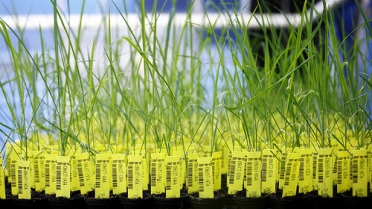

GM Food and the precautionary principle
“Precaution does not necessarily mean a ban. It simply urges that time and space be found to get things right.” Professor Andy Stirling, writing in the Guardian Overview The UK House…
China and the new climate deal
“The joint US-China announcement on tackling climate change has been described as “historic”, a “turning point” and a “positive signal”. It has also been written off as insubstantive or even…
Informing the UK’s approach to SDGs
A Parliamentary inquiry about the UK’s position and approach to the development targets to replace the millennium development goals has published evidence from the ESRC STEPS Centre. The Environmental Audit Committee’s inquiry is looking at how best…
Were ‘Technology Networks’ the Fab Labs of the 1980s?
A new article by Adrian Smith in the Journal of Peer Production looks at the story of Technology Networks – community based workshops which arose in the UK in the…
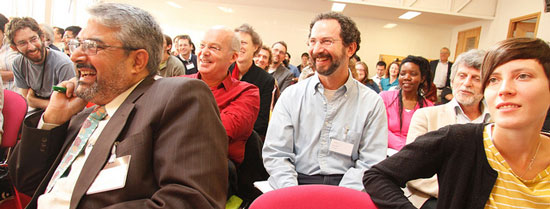

ESRC Studentships: study with the STEPS Centre
The STEPS Centre is delighted to offer PhD training in association with the Sussex ESRC Doctoral Training Centre, one of a network of 21 Doctoral Training Centres in the UK, set up by the…
Political Ecology: resources, power and justice
With conceptual roots in political economy and cultural ecology, as well as close relationships with development studies and science and technology studies, the multidisciplinary field of political ecology shares a…
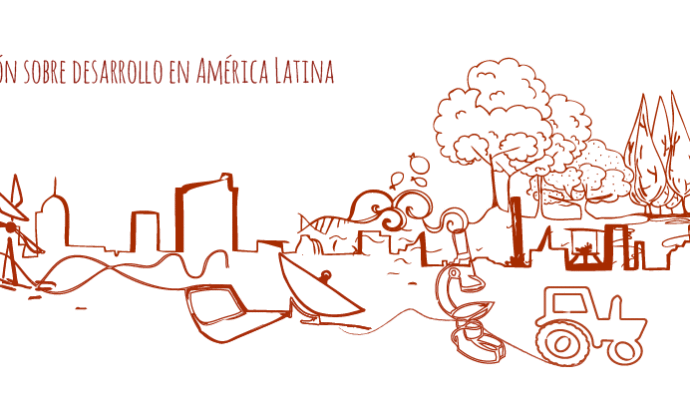

STEPS América Latina at the Open and Collaborative Science in Development Network
By Mariano Fressoli, STEPS America Latina Between 13 and 15 October the Open and Collaborative Science in Development Network held its first workshop in Nairobi. The objective of the workshop,…
Call for abstracts: Critical Perspectives on the Financialisation of Nature
A Call for Abstracts has been issued for a workshop in March 2015 on the financialisation of nature. Update (12 December 2014): The call for abstracts has now closed. Successful…
Business for peace?
It is difficult to avoid being swept up in the current tide of optimism about Africa and resource development. For once, Africa is not only portrayed by outsiders as a…
Journal of Peasant Studies new special issue: critical perspectives on Food Sovereignty
A new special issue on ‘Critical perspectives on food sovereignty’ from the Journal of Peasant Studies has been released, with free articles available for a limited period. The guest editors…
Melissa Leach on Ebola & inequality – lecture text & audio
Some materials are now available from the recent Sussex Development Lecture on Equality, Sustainability, Security: Interlaced challenges in a global development era by former STEPS Director Melissa Leach. The text…
Gender equality and Sustainability: STEPS members contribute to new UN Women report
STEPS Centre members have contributed to a major United Nations report that highlights the deep connections between gender equality and sustainable development, as the world moves towards a post-2015 framework….
Why gender equality and sustainable development are inextricably linked
by Melissa Leach, Director, Institute of Development Studies As the world moves towards Sustainable Development Goals for the post-2015 era, there is emerging debate about how target-setting and implementation might…
New Multicriteria Mapping software launched
Multicriteria Mapping (MCM), a new software package to aid decision-making by exploring contrasting perspectives on complex issues, has been launched. MCM was pioneered by STEPS co-director Andy Stirling as a…
Ebola: difficult questions for development
As the horrific Ebola crisis unfolds across West Africa, and the international community belatedly responds, there are some bigger questions that arise beyond the immediate challenges on the ground. These…
David Ockwell at UNFCCC workshop on innovation systems (live webcast)
On 13–14 October, the Technology Executive Committee (TEC) of the UNFCCC is holding a workshop on Strengthening national systems of innovation in developing countries, covering the entire technology cycle for…
STEPS wins ISSC Transformations to Sustainability grant
The ESRC STEPS Centre is delighted to have won an International Social Science Council (ISSC) seed grant under the new Transformations to Sustainability Programme. The ISSC programme aims to build the…
Join us for What Works at the Nexus?
Join us at the first Nexus Network conference: What works at the nexus? New connections in food, energy, water and environment on Thursday 27 November from 9.30 am to 5.30 pm at…
Get involved! Your views on water and food security wanted by the UN.
Would you like to help inform a report for the UN on food and water security? Now here is your chance. A year ago, the United Nations Committee on World Food Security…
Adrian Smith on grassroots prototyping at SCORAI Europe
Adrian Smith, STEPS Grassroots Innovation project convenor, will talk about grassroots prototyping past and present to a SCORAI (Europe) workshop on sustainable consumption at Kingston University today. The flourishing of…
Complex Adaptive Systems & health: new resources
In June 2014, Future Health Systems (FHS) and the STEPS Centre co-hosted a workshop exploring Complex Adaptive Systems (CAS) approaches to health systems strengthening in low- and middle-income countries (LMICs). FHS…
Complex combinations: climate, poverty and health in the Sundarbans
by Upasona Ghosh, Senior Research Officer at the Indian Institute of Health Management Research, and researcher on the STEPS Centre’s project on Uncertainty from below. My first trip to Sundarbans…
Talking Zimbabwe & Land Reform at ASAUK14 this Wednesday
New research from Zimbabwe will be shared at a double panel session at the UK African Studies Association conference this week. This year’s event is at the University of Sussex,…
Why are informal water services overlooked in post-conflict state building?
by Jeremy Allouche & Maria Cooper Resource politics is coming back to the forefront of academic and policy debates around peacebuilding. Environmental peace and state building agendas are dominated by…
‘Innovation histories’: capturing legacy & learning from long-term programmes
By Annie Wilkinson, post doctorate researcher, Institute of Development Studies (This post is part of a series of reflections emerging from a workshop on complex adaptive systems research methods held in Baltimore in June 2014.)…
New methods needed: How can complexity science help us to understand pluralistic health systems?
This is the first blogpost in a series of reflections emerging from a workshop on complex adaptive systems research methods held in Baltimore in June 2014. It was first published on…
Article roundup: STEPS Latin America monthly debates
As part of the build up to the launch of the STEPS Centre’s Latin American hub in 2015, we have started a series of monthly debates in Buenos Aires on…
GM Nation or GM Planet? How to involve citizens in decisions about transgenic crops
The UK’s GM Nation? public debate – conducted over a decade ago, tried to include the voices of citizens in decision-making over transgenic crops. With recent decisions by China and…
GM in China: ‘Paranoia’ and public opinion
Biosafety certificates permitting Chinese researchers to grow genetically modified rice and corn expired last week, with little indication that the Ministry of Agriculture will renew them. The certificates, issued in…
A day with Argentina’s ‘street engineers’
They take pride in what they do at the Reciclando Sueños co-operative. Situated in the La Matanza district of greater Buenos Aires, the workers describe themselves as cartoneros profesionales (professional…
Why STEPS is creating a new research hub in Latin America
I am in Buenos Aires for the ESOCITE/4S conference, which is bringing together Latin American scholars in Science & Technology Studies and visitors from the USA, Europe and other regions…
The road to 2015: experiences and challenges from Community-Led Total Sanitation (CLTS)
by Kamal Kar, Founder of the Community-Led Total Sanitation Foundation I was recently invited to IDS as part of an EPSRC-funded solid waste management project, ‘A Global Solution to Protect…
India’s risks: forging a new multidisciplinary debate
by Raphaelle Moor A prospective superpower, India is grappling with a host of risks that threaten to hamper its progress towards becoming a more economically successful, egalitarian, safe and harmonious…
Recordando el Plan de Lucas: que nos puede decir el movimiento para producción social útil sobre la innovación inclusiva hoy?
This post is a translated and edited version of an article first published in English on the Guardian’s Political Science blog En enero de 1976 los trabajadores de Lucas Aerospace…
Livelihood pathways after land reform in Zimbabwe
Understanding livelihood pathways requires sustained fieldwork in particular sites in order to understand what changes and why. Systematic longitudinal studies are sadly rare in many developing country settings. Project grants…
Sustainable Development Goals: lessons from the ‘nexus’
As part of our engagement with the ‘nexus’ of food, water, energy and the environment, STEPS members will be participating in an Overseas Development Institute event on 11 September 2014….
Urban Futures: Case studies and comparator sites
This page is about case studies and locations in the project ‘Risks and Responses to Urban Futures’. For an overview, see the project homepage. The project is working in two…
Urban Futures: Background and research questions
This page provides detail of the background and research questions of the project ‘Risks and Responses to Urban Futures’. For a shorter overview, see the project homepage. Urbanisation creates of…
Global health meets genomics: inequality and politics
Scientific advances in the understanding of genetics and genomics have the potential to generate major improvements for human health in the near future. However, from a global health perspective, the…
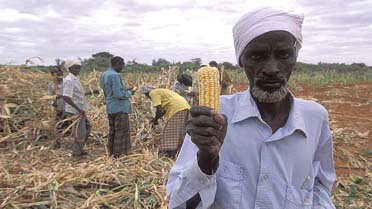

Same meat, different gravy? The new Science, Technology and Innovation Strategy for Africa (STISA)
By David Ockwell, STEPS Centre Deputy Director, Research On 2 July African Union Heads of State and Government adopted the new Science, Technology and Innovation Strategy for Africa 2024…
Building low carbon, high growth futures in Africa
An article in New Scientist magazine pubished today sets out one of the most hotly-contestated questions about increasing energy access in the global south: can low carbon techology deliver meaningful opportunities for economic growth? Author…
Community-based Micro Grids: Experiences in Rural Kenya
By Lorenz Gollwitzer I am standing in Olosho-Oibor, a small village three-hours from Nairobi, at the bottom of the Ngong Hills (famous as the place where Denys Finch Hatton crashed his…
Technology & democracy: the story of Brazil’s Social Technology Network
A new STEPS working paper tells the story of a recent experiment in grassroots innovation – the Social Technology Network (STN) in Brazil. The paper, by Mariano Fressoli and Rafael…
Ebola: failures, flashpoints and focus
By Annie Wilkinson, post doctorate researcher, Institute of Development Studies As the worst Ebola epidemic on record shows no signs of abating in West Africa, fear and ignorance are increasingly…
Missionary discourses: can the green economy bring climate justice to the South?
by Joanes Atela, researcher, political ecology of carbon in Africa project The green economy has become one of the most powerful political and social agendas in the era of climate…
Mission-Oriented Finance for Innovation: top-down missions or bottom-up causes?
Andy Stirling, co-director of STEPS, will be a speaker at the conference Mission-Oriented Finance for Innovation on 22-24 July in London, which examines the important role of public sector agencies…
Antibiotics: Avoiding a return to the dark ages of medicine
By Annie Wilkinson, post doctorate researcher, Institute of Development Studies Listeners to BBC Radio 4’s Today programme woke up yesterday to Prime Minister David Cameron’s prediction of a return to the “dark ages…
Ghana,’Brazil of Africa’: Keeping lights on for the World Cup
By Sandra Pointel in Accra Over recent years, concerns to “keep the lights on” have featured high on energy policy agendas and in media headlines, especially in the developed world. Competing…
The nexus – politics, practice and disciplinary dilemmas
STEPS researchers have written a series of blogposts for the Guardian and the Nexus Platform website addressing the challenges of the water-food-energy-environment ‘nexus’. Andy Stirling addresses the challenges of working across disciplines,…
GM crops: what people in the global South really think
Durham University has just published an important new research report on the governance of transgenic crops in three of the world’s ‘rising powers’ – Brazil, Mexico and India – looking…
Andy Stirling at events on well-being and research methods
STEPS director Andy Stirling was a speaker at “Let’s Talk Happiness – beyond GDP”, a conference organised by the Various Interests Group of the European Economic and Social Committee (EESC)…
Sustainable intensification: a new buzzword to feed the world?
The term ‘sustainable intensification’ (SI) has entered academic and policy discourse in recent years, including in debates about what to do about agriculture in Zimbabwe. I have been intrigued for…
GM Crops: Continuing controversy
By Ian Scoones, STEPS Centre Director In 2002, the international press was full of headlines such as ‘Starving Zimbabwe Shuns GM Maize’. This was repeated again in 2010. The context…
The Badaun murder: violence, vulnerability and safer sanitation
by Shilpi Srivastava, DPhil Student, Institute of Development Studies The heinous rape and murder of two teenaged girls in the Badaun district of Uttar Pradesh (India) has provoked a mix…
‘Resilience’ and the peri-urban: limitations & potential
A new IDS Briefing looks at the potentials and pitfalls of the use of the ‘resilience agenda’ in talking about the role of the peri-urban space in urban expansion. One…
‘Negotiating Environmental Change’ now available as an e-book
The 2003 book Negotiating Environmental Change: New Perspectives on Social Science, edited by STEPS director Ian Scoones, Melissa Leach (former director) and Frans Berkhout (Interim Director of Future Earth), has…
STEPS Summer School 2014 – Elsie Khakasa’s review
Guest post by Elsie Khakasa, STEPS Summer School 2014 participant. This post is reposted from Elsie’s blog with kind permission. Two weeks of a thought provoking and intense summer school…
Political Ecologies of Carbon project researchers to speak at Green Economy in the South conference in July
Martin Kijazi and others from the STEPS Centre’s Political Ecologies of Carbon in Africa project will be speaking at the international conference “Green Economy in the South – Negotiating Environmental…
Nature Not For Sale: Ian Scoones discusses biodiversity & communities
STEPS Centre Director Ian Scoones is on a panel at Nature Not For Sale: 2nd Forum on Natural Commons today in London. The forum brings together NGOs, academics, activists and…
STEPS Summer School 2015: apply
Applications for the STEPS Summer School 2015 are now closed. Who should apply? Applications are invited from highly-motivated doctoral and postdoctoral researchers,working in fields around development studies, science and technology…
Against authoritarianism: Why we shouldn’t ‘put democracy on hold’ to achieve sustainability
Does the human response to global environmental challenges need to be channelled through authoritarian, controlled ‘transitions’? Threatened by climate change, should we ‘put democracy on hold for a while’? Or…
Latin American STEPS Centre Hub starts with debate series on sustainability
by Valeria Arza, Mariano Fressoli, Anabel Marin and Patrick van Zwanenberg, STEPS Centre Latin American hub A new series of Debates on Sustainability and Development in Latin America has kicked…
The Wonders of Walkshops
By Melissa Leach, IDS Director The STEPS Centre Summer School has been running here at IDS over the last two weeks – 38 fantastic PhD students and early career researchers…
Learning from Great Transformations Past and Present
Reflecting on Karl Polanyi at the Resilience 2014 Conference By John Thompson, STEPS Centre Food and Agriculture Convenor In June 2013, I served on the Scientific Steering Committee of the…
The power and politics around ‘objective’ performance monitoring
Performance monitoring, most prominently exemplified in the Millennium Development Goals, is often perceived as providing objective results. Using the case of access to rural water supplies in Ethiopia, a new…
Mariana Mazzucato on ‘The Green Entrepreneurial State’: video, audio & slides
Mariana Mazzucato gave a public lecture on ‘The Green Entrepreneurial State’ as part of this year’s STEPS Summer School. Audio, video and slides from her talk are now available (see…
Grassroots fabrication in makerspaces: the importance of culture, context & relationships
On Thursday 10th April 2014, the Grassroots Innovations project organised a half-day World Café workshop in Copenhagen on the topic of grassroots fabrication in makerspaces. It formed one session within…
On the benefits of walking and talking
Our Summer School kicked off today, with 38 students from 25 countries meeting at IDS for two weeks of intensive debate and discussion. On Wednesday, after a short lecture on…
STEPS Centre Summer School 2014
Our Summer School brought together an exceptional group of people who are exploring and developing ideas on building pathways to sustainability. This year 38 participants from 25 countries challenged the…
Public lecture, 12 May: ‘The Green Entrepreneurial State’
We’re delighted to announce that Prof Mariana Mazzucato will be the speaker for our annual public lecture at Sussex University, which takes place as part of the STEPS Centre Summer…
Resilience 2014: Limits revisited? Planetary boundaries, justice and power
By Melissa Leach, IDS Director In 1972 Meadows et al’s Limits to Growth made scientific and policy waves, as its ‘World3’ model predicted the end of growth and prosperity as…
Resilience 2014: Planetary boundaries, politics and pathways
How can we build development pathways that enhance sustainability and resilience, integrating ecological integrity, social equality, human rights, well-being and security? That was the tough question at the centre of Professor Melissa Leach’s…
New leadership for the ESRC STEPS Centre
A new leadership team has been announced at the ESRC STEPS Centre today. The two founding Co-Directors, Prof. Ian Scoones and Prof. Andy Stirling remain at the helm of STEPS, with…
Mike Hulme to chair ESRC STEPS Centre International Advisory Committee
The ESRC STEPS Centre is delighted to announce Mike Hulme, Professor of Climate and Culture at King’s College London, is taking over as chair of the Centre’s International Advisory Committee….
Ebola in Guinea – people, patterns and puzzles
By Melissa Leach, Principal Investigator of Dynamic Drivers of Disease in Africa Consortium The francophone West African country of Guinea doesn’t often make international headlines, but has this week for…
Understanding water for food security
Lyla Mehta, STEPS Centre water & sanitation theme convenor, is heading a team writing the report on Water and Food Security to the Committee of World Food Security (CFS). Water…
Guest blogpost: Andrew Barnett on low carbon development trade offs
Andrew Barnett, Director of The Policy Practice, inspired by the discussion at The Royal Society on Monday 31 March 2014 to discuss the policy implications of research on low carbon development…
IPCC: should climate change debates be more political?
The latest report by the Intergovernmental Panel on Climate Change, focusing on impacts, adaptation and vulnerability, makes sobering reading. But it also situates climate change among a range of other…
Inclusive innovation: learning to listen to the excluded
Last week I spent a fascinating couple of days at the OECD Symposium on Innovation and Inclusive Growth, where discussion kept returning to the challenge of scaling-up inclusive innovation. Unsurprisingly,…
Future Earth launches new website
Future Earth, the international hub for research on sustainability, has launched a new website to share news of its events and projects. Future Earth was launched in June 2012 and…
World Water Day: Time to consider a low water economy
The theme of this year’s World Water Day on 22 March is ‘water and energy’ – giving a chance to reflect on how these two vital resources are linked. In…
Scaling-up inclusive innovation: asking the right questions?
This post is based on a contribution I’ll be making in a session on ‘scaling up’ at the OECD Symposium on Innovation and Inclusive Growth in Paris on 20-21 March…
Sustainable energy for whom?
How can we move from “sustainable energy for some” towards “sustainable energy for all”, whilst promoting economic development in some of the world’s poorest nations? In a new blogpost for Politics@Warwick…
STEPS-JNU Symposium 2014: Powerful storytelling
The power of simple storytelling to move and inspire is explored in a new post about ‘photovoice’ by Julia Day, STEPS Centre Deputy Director and Head of Communications, written for…
Dams, displacement and development
A dam disaster in Zimbabwe prompts STEPS co-director Ian Scoones to reflect on dams, displacement and development more broadly on the Zimbabweland blog. He points to a new paper in…
More than just a “clean energy race”? BRICS invesment and innovation could lead the way on green transformation
By Adrian Ely On the sidelines of the World Cup in Brazil this year, another competition will be the subject of conversation amongst the delegations attending this year’s BRICS summit,…
Photovoice – Uncertainty through the lens
← BACK TO SYMPOSIUM 2014 HOMEPAGE The views of people living and coping with the everyday effects of climate change in India are explored here through an innovative ‘Photovoice’ presentation created by…
Steps-JNU Symposium 2014 – Storify
←BACK TO SYMPOSIUM 2014 HOMEPAGE We told the story of the Symposium as it happened via Storify. By collating resources and social media from difference sources we hoped to bring the event debates to…
STEPS-JNU Symposium 2014 – Videos
←BACK TO SYMPOSIUM 2014 HOMEPAGE View video clips from our 2014 Annual Symposium, ‘Exploring pathways to sustainability’, co-organised with the Centre for Studies in Science Policy at Jawaharlal Nehru University,…
STEPS-JNU SYMPOSIUM: “Are you an academic or an activist?”
By Elisa Arond, Doctoral student, Clark University and researcher STEPS Centre Grassroots Innovation project (Photo: poster at JNU, Delhi) “Are you an academic or an activist?” That was the first…
Telling stories about scarcity
‘Scarcity’ is a key term in debates about the global rush for land and other resources. A new Future Agricultures working paper, co-authored by STEPS director Ian Scoones, looks at…
STEPS-JNU SYMPOSIUM: Every case is its own study? Every movement has its own goals?
By Adrian Smith, Researcher, STEPS Centre / SPRU Learning with and across diverse grassroots innovation movements Here in Delhi, first at the Grassroots Innovation Movements Workshop, and then at the…
STEPS-JNU SYMPOSIUM: Nexus narratives – water politics in Asia
By Ian Scoones, Co-Director, STEPS Centre The fourth panel at the STEPS-JNU Symposium focused on the highly contested narratives around how water is stored and accessed in Asia, with cases…
STEPS-JNU SYMPOSIUM: Transformative innovation from the grassroots
By Ian Scoones, Co-Director, STEPS Centre Session three at the JNU-STEPS Symposium focused on ‘grassroots innovation’. The panel emphasised the transformative possibilities of innovation, and the need to go beyond…
STEPS-JNU SYMPOSIUM: Making climate change visible
By Ian Scoones, Co-Director, STEPS Centre The second session at the JNU-STEPS Symposium focused on how uncertainties generated by climate change are appreciated both ‘from above’ and ‘from below’ –…
STEPS-JNU SYMPOSIUM: Turning urban sustainability on its head
By Ian Scoones, Co-Director, STEPS Centre At the STEPS-JNU Symposium on ‘Exploring Pathways to Sustainability’ organised with the Centre for Studies in Science Policy (CSSP) at Jawaharlal Nehru University in…
Call for participation: Engineering, social justice & peace, Argentina
The Network on Engineering, Social Justice and Peace (ESJP) has issued a call for participation ahead of its Annual Meeting in Buenos Aires in August 2014. STEPS Centre member Adrian…
STEPS-JNU Symposium: Exploring Pathways To Sustainabilty
Our 2014 Annual Symposium, ‘Exploring pathways to sustainability’, was co-organised with the Centre for Studies in Science Policy at Jawaharlal Nehru University, India and launched a new initiative across four schools…
IDS seeks 3 new fellows in environmental change
The Institute of Development Studies is seeking to recruit up to three new researchers with international reputations for innovative interdisciplinary work broadly within the area of ‘Environmental Change’. A particular…
Missing politics and food sovereignty
Over the last two decades La Via Campesina has grown as a movement campaigning for a change in the global agri-food system. Some claim that it is the world’s largest…
Controlling animal-to-human disease in Africa
African trypanosomiasis is a devastating disease, both for humans and animals. Over the last hundred years huge efforts have been made to control it. A working paper by Ian Scoones…
Paper: the Lucas Plan and socially useful production
A working paper by Adrian Smith tells the story of the ‘socially useful production’ movement in the 1970s and 80s, in particular the Lucas Plan, and its lessons for how…
Food Sovereignty: a Critical Dialogue
On 24 January 2014, the event ‘Food Sovereignty: A Critical Dialogue’ will bring together sceptics and advocates of food sovereignty to discuss the future of this controversial idea in critical…
World 3.0: Reimagining development for a turbulent planet
Last summer, Jon Moris gave a fantastic STEPS seminar entitled Reimagining Development 3.0 for a Changing Planet. Now an IDS and STEPS Working Paper is available that offers his argument…
Linking global and local sustainability: new journal article
The United Nations Conference on Sustainable Development (Rio+20) in 2012 was another opportunity to reflect on the links between global and local sustainability. High-profile global processes, including the Convention on…
Best of STEPS 2013: Science and technology for development
From the global politics of scientific advice to solar home systems in Kenya. From the GM crops debate to living with climate uncertainty in India. The STEPS Centre and our partners around…
Call for abstracts: ‘Innovation for social inclusion’, 4s/ESOCITE meeting (August 2014)
STEPS member Adrian Smith (convenor of our Grassroots Innovation project) is co-organising a session on ‘innovation for social inclusion’ at the ESOCITE/Society for Social Studies of Science (4s) annual meeting…
Apply now for ESRC Studentship Awards
Apply now for ESRC studentship awards to join our Innovation and Sustainability: Management and Policy course, part-based at the STEPS Centre. Open to all UK and EU students, the ESRC studentships…
Debating Zimbabwe’s Land Reform: new book by Ian Scoones
Zimbabwe’s land reform has been intensely controversial. Yet debate has been plagued by bias and misinformation. A new book by Ian Scoones, Debating Zimbabwe’s Land Reform, aims to offer a…
Video: Melissa Leach on ‘science-governance challenges in the Anthropocene’
Here’s a video of Melissa Leach highlighting the importance of social justice and governance in thinking about planetary boundaries, as part of a seminar on challenges for the Anthropocene hosted…
Prof Melissa Leach appointed director of IDS
Professor Melissa Leach, ESRC STEPS Centre director, has been appointed as the new director of the UK’s Institute of Development Studies. Prof. Leach will continue in her current roles, as director…
Why we should embrace different stories in sustainability
How can critical views of ‘stories’ help in seeking pathways to sustainability? I’ve recently got back from the Communicate conference where I talked about stories using examples from the STEPS…
COP19: A push for pro-poor low carbon development
Julia Day, STEPS Centre Communications Manager All too often discussions about low carbon technologies range around the interests of high and middle income countries, but fail to factor in the…
Grassroots innovations: special issue of ‘Global Environmental Change’
The latest issue of the research journal Global Environmental Change is dedicated to the topic of grassroots innovation for sustainability. The special issue contains six original research articles which focus…
When global climate change politics meets African agriculture
by Joanes Atela, Political Ecologies of Carbon in Africa project As nations debate climate change this week at the 19th Conference of the Parties (COP19), addressing the urgent questions linking…
World Social Science Report 2013: Navigating pathways in the safe and just space for humanity
A framework for negotiating pathways to a safe and just sustainable future for people and planet is presented by Melissa Leach, STEPS Centre director, in a new article for the World…
Big stories, little stories
This is the (slightly edited) text of my talk at Communicate 2013, in a session called “liberating stories”. The pictures are some of the slides I used. The brief was…
COP19: Cutting edge policy research
The ESRC STEPS Centre is seeking to address the many different impacts that climate change has on peoples’ lives and livelihoods in sustainable ways that work for people and planet, using…
New book: land deals and the state
A new book examines the state’s role in land deals through theoretical insights and empirical studies from around the globe. Governing Global Land Deals: The Role of the State in…
Who knows best when creating technology?
What attempts are being made to ‘improve reality’ and who are the real beneficiaries of bids to mould the future to the vision of a few, powerful actors? STEPS Centre…
The Water Cookbook: Bhagwati Prasad’s strange and beautiful illustrations from peri-urban Delhi
I’ve just come across a copy of The Water Cookbook which I was given by Lyla Mehta, produced by part of our project looking at water conflicts in peri-urban Delhi….
Don’t believe the hype: Who authors our futures?
A chain of technological developments set into motion by chemist and physicist Gordon Moore more than 45 years ago is still resonating in technological choices being made today, says Justin Pickard, a…
Living on the edge: Rethinking aid amidst complexity
By Melissa Leach, STEPS Centre director These days, a remarkably short and convenient flight takes one from Sussex UK – where among other STEPS Centre activities this week I’ve been…
Where branding and sustainability collide
By Nathan Oxley, Communications Officer, STEPS Centre Peace Parks sound lovely, don’t they? I mean, who would be against the idea of creating a nature reserve across national borders to promote…
From Uncertainty in India to low carbon in Kenya: Our autumn newsletter is out now
Our autumn 2013 newsletter gives a snapshot of a few of the areas we are researching right now. A new briefing looks at how people deal with uncertainty about climate, disease or natural disasters in…
A new way of bringing ‘farms’ and ‘systems’ together
by Jim Sumberg, Stephen Whitfield and Ken Giller How do we understand farms as systems, and farms as part of systems? The terms and definitions that researchers use affect how…
Building pathways of pro-poor energy access
The misconception that developing countries can plump for either increasing access to energy, or low carbon development, but not both, is exploded in a paper presented by Dr Rob Byrne,…
Citizens and science in a greener China
As China and the UK seek to collaborate more closely in science and innovation, there are lessons they can share about how to govern and debate new technologies, write Adrian…
Good & evil: two articles on closing down the debate on GM crops
Is it right to call opponents of GM crops ‘wicked’? In a recent interview, Owen Paterson denounced in starkly moralistic language people whom he sees as holding up progress on…
New articles: Access to Water in peri-urban India
A new article examining the increasing inequalities around water provision in Delhi by STEPS Centre partner Alankar is published this week. Socio-Spatial Situatedness and Access to Water (Economic & Political Weekly, October 12, 2013 vol…
Framing impact: a simple word for a complex beast
What is this thing called “impact”? More specifically, what are we talking about when we speak of the non-academic impact of research? In this post I want to explore some…
Getting serious on climate action: Why the science is never enough
By Tom Tanner. The release of the international climate panel’s fifth assessment report of climate science has reinforced the reality of the climate crisis. The science is unequivocal: the problem…
IPCC climate report: research, resources and expertise
As the most comprehensive statement on climate science to date is published, we have gathered some of our key resources on the impact of climate change on poor and marginalised people in developing countries….
Post-2015 outcome document: inclusivity needed
By Julia Day “With less than 850 days remaining.” It’s a sobering thought. If we were talking about football, we’d be well in to extra time now. As it is,…
Engaging science and politics in a Post-2015 framework
A new STEPS Centre/IDS policy briefing examines how science and politics must be engaged in a post-2015 framework in order to tackle the interlinked environmental and social justice challenges which the world faces….
Call for papers: Is the Nexus Secure … and for Whom?
Water Alternatives will publish a special issue on Critical Thinking On the ‘New Security Convergence’ in Energy, Food, Climate and Water, with financial support from the STEPS Centre. The editors invite abstracts…
Responses to frequently asked questions on genetically-modified crops and development
GM Rice / BASF / Flickr Creative Commons By Andy Stirling, co-director of the STEPS Centre Questions are never far from the headlines about how the world can farm more fairly,…
GM crops and biotechnology
GM crops, Golden Rice and other related technologies polarise opinion: they are the solution to the global food crisis; or they are ‘frankenfoods’ causing irreversible environmental harm. Concerns about poverty,…
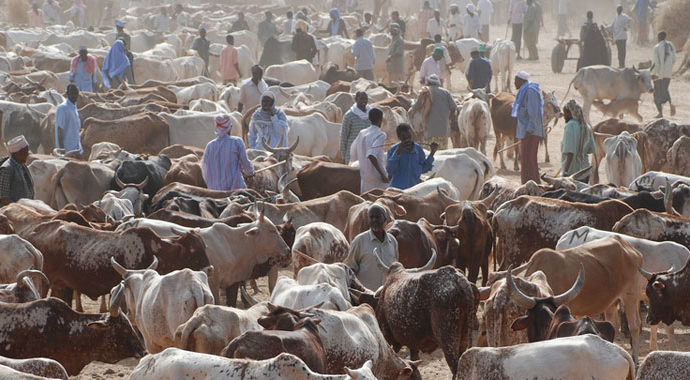

How was a ‘policy space’ created for pastoralism in Kenya?
Pastoralism in Kenya has long been neglected and understood. Pastoralists have been seen by some as vulnerable, a source of conflict and a drain on the country’s resources. But recent…
Against ‘monocultures’ in agriculture and knowledge
Faced with the undeniable fact of hunger in developing countries, ‘sustainable intensification’ has been claimed as a science-led solution to food security. In an article for SciDev.Net, Prof Brian Wynne…
Climate change: where stereotypes go to die
What do you mean when you call someone a climate sceptic? I went to a panel discussion last Thursday evening, “Tackling scepticism: How can we most effectively communicate climate change?”…
David Dickson 1947-2013
The STEPS Centre’s directors, members and partners are sad to have learnt of the sudden death of David Dickson (1947-2013), the founding director of SciDev.Net. David played an important part in the…
Responsibility at the Science-Publics-Policy Interface: What I learnt at the 2013 Science in Public Conference
The village of Onna, after the 2009 L’Aquila earthquake. Photo: Darkroom_Daze (Flickr) by Stephen WhitfieldDPhil Student, Institute of Development Studies This year’s ‘Science in Public’ conference hosted by Nottingham University…
IDS Bulletin: China and Brazil in African Agriculture
New research published by the Institute of Development Studies, and jointly edited by STEPS co-director Ian Scoones, reveals the realities of how the BRICS and Africa are engaging in agricultural…
Getting the facts right on land grabs: 5 new (free) articles
As part of its series on land grabs, The Journal of Peasant Studies has released a collection of 5 new articles on the problem of recording accurate and reliable information…
New UK climate envoy, Rear Admiral Neil Morisetti, on climate change and conflict
Today’s Guardian reports comments on climate change as a global threat from the first interview with the UK’s interim Special Representative for Climate Change, Rear Admiral Neil Morisetti, since he…
More than nets: tackling malaria through development
Does reducing poverty help to tackle malaria? A systematic review of studies on socioeconomic status and malaria in children, published in the Lancet, suggests that greater wealth and standards of…
Irrigation isn’t the only way to achieve food security in Ghana
Farmers attending their livestock in Northern Ghana (2012) by Ericsson Images / Flickr By Rachael Taylor, PhD studentSPRU, University of Sussex Earlier this month, a number of Members of the…
‘Golden Rice’ and the GM crop debate
Golden Rice grain compared to white rice grain in screenhouse of Golden Rice plants / IRRI Guest blog by Sally Brooks, Researcher and Associate Tutor at the University of York, and…
TV interview: Social Innovations
Kevin Urama, executive director of the African Technology Policy Studies Network (ATPS) and Adrian Ely, STEPS Centre head of impact and engagement, talk about social innovations and prosperous societies to Kenyan…
Exposing the political journey of climate change evidence from Exeter to Africa
The Met Office’s modelling IBM supercomputer Stephen Whitfield, PhD student, Institute of Development Studies (Knowledge, Technology and Society Team) For someone more used to the quiet productivity and relative inconspicuousness…
Future Earth takes flight with inaugural scientific committee
Global sustainability research programme Future Earth has announced its inaugural science committee, with ESRC STEPS Centre director Melissa Leach serving as vice chair. Future Earth is major 10-year international research…
Future Earth takes flight with inaugural science committee
Global sustainability research programme Future Earth has announced its inaugural science committee, with ESRC STEPS Centre director Melissa Leach serving as vice chair. Future Earth is major 10-year international research…
Innovation Histories workshop, the Solar Home System market in Kenya
←BACK TO PRO-POOR LOW CARBON DEVELOPMENT Innovation Histories briefing (PDF 226kb) Innovation Histories report Full report from the workshop (PDF 1,136kb) Photos from the Innovation Histories workshop Watch a…
How can the G8 solve hunger?
By Ian Scoones. Next weekend the leaders of the G8 gather in Northern Ireland for their annual summit. This year it’s hosted by the UK, and Prime Minister David Cameron…
Summer School 2013 begins
Group discussion on transitions and grassroots innovation Our annual Summer School has hit the ground running, with 40 students from around the world descending on Sussex to hear and challenge…
The GM debate should not be closed down to what is rational, but opened up to multiple rationalities…. A response to Chris Whitty and colleagues
By Stephen Whitfield, PhD student, Institute of Development Studies (Knowledge, Technology and Society Team) Genetically modified rice / BASF In a recent commentary published in Nature, Chris Whitty…
Public debate: Fuel poverty, climate change and social justice
Watch our lively public debate on fuel poverty, climate change and social justice. With Doug Parr, Jim Watson, Thurstan Crockett and Kirsty Alexander, chaired by Alice Bell. Watch the video (on YouTube) See photos…
STEPS Centre Summer School 2013
Our Summer School brought together an exceptional group of people who are exploring and developing ideas on pathways to sustainability. Through a mix of lectures, walks, discussions and public events, participants…
Bird Flu: Panic, Pandemics and Planning
A steady stream of reports about bird flu infection cases in China over the past month has given way in the past couple of days to panicked confirmations of deaths (27 as of today) and…
Mike Hulme on planetary boundaries and other metaphors
Spaceship Earth? Photo: NCC-1701-A by tram_painter on Flickr (cc-by-nc-nd) Prof Mike Hulme has a thoughtful post on the UEA’s 3S blog today on how metaphors affect the way we think…
Could the 3Ds breathe new life into farming systems research?
by Jim Sumberg, STEPS centre research fellow Hans Ruthenberg Hans Ruthenberg’s Farming Systems in the Tropics, first published in 1971, still stands as a classic. Through detailed and systematic treatment…
Pandemic Flu Controversies
How can a better understanding of the social, political, institutional and policy dimensions of pandemic control and preparedness planning help us deal with new outbreak controversies, such as the new H7N9 avian flu in…
DIG-IT Workshop: Dialogue on Inclusive Growth, Innovation and Technology
The DIG-IT Workshop on Inclusive Growth, Innovation and Technology – co-sponsored by the STEPS Centre – promoted a unique forum for discussion of alternative and interdisciplinary frameworks to improve our understanding…
Public events in May: climate, justice, planetary boundaries
Next month we’re running three public events in Brighton on climate change, social justice and planetary boundaries. These events take place during our annual Summer School on Pathways to Sustainability….
Democracy in the Anthropocene?
Planetary boundaries / Illustration from Global Change magazine STEPS Centre director Melissa Leach recently wrote in the Huffington Post: “When the cover of the Economist famously announced ‘Welcome to the…
What multidisciplinary means: Nature doesn’t care about our building blocks
Rats in a maze, by ithinkx on Flickr (cc-by-nc-nd) The deeper you dig into most matters, the more complex things become. International development research is no different – and, given…
Celestial (policy) navigation
by Jim Sumberg, STEPS Centre research fellow The proposition that public policy should be ‘evidence-based’ is now widely accepted (although there is still considerable contestation around the meaning, nature, types,…
Democracy in the Anthropocene? Science and Sustainable Development Goals at the UN
Melissa Leach, STEPS Centre director, was one of 28 scientists invited to attend a United Nations Expert Meeting to discuss science and Sustainable Development Goals. She reflects on the issues addressed,…
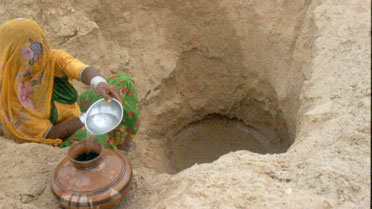

World Water Day 2013
Lyla Mehta, STEPS Centre water and sanitation convenor, writes about the need to look at the Millennium Development Goal on water and sanitation and what it means for gender justice, particularly as we look…
STEPS Seminar: The Entrepreneurial State and the Risk-Reward Nexus: Implications for Innovation and Inequality
Mariana Mazzucato, Professor of Economics and RM Phillips Chair in Science and Technology Policy at SPRU Science and Technology Policy Research at the University of Sussex, will give a STEPS…
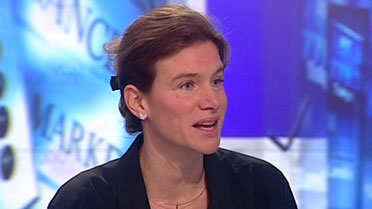

The Entrepreneurial State and the Risk-Reward Nexus: Implications for Innovation and Inequality
Mariana Mazzucato, Professor of Economics, SPRU, University of Sussex, will give a STEPS Seminar on Tuesday 16 April on a new framework to study the relationship between innovation and inequality. Tuesday 16 April, 1pm-2.30pm University of…
Technological paradigms and technological trajectories – 1982
Giovanni Dosi – 1982 There is a recognised relationship between economic growth and technical progress; however the intimacies of the relationship includes technical development in relation to the market in…
Amartya Sen’s Capability Approach – July 1983
At a time when well-being was measured as either opulence (income) or utility (happiness, desire fulfilment), Amartya Sen introduced a more elaborate human development model that included social and psychological…
Last Child in the Woods
Richard Louv’s book, ‘Last Child in the Woods’ illustrates the alarming impact that a growing divide between children and the outdoors has had on childhood development and environmental outlooks. He…
First issue of the Whole Earth Catalog
“We are as gods, and might as well get good at it.” — Stewart Brand, The Whole Earth Catalog, 1968. A self-published occasional ecology magazine, which ran from 1968-1974 (with…
Joseph Schumpeter: Capitalism, Socialism and Democracy 1942
The work within this book has been an important building block towards the understanding of innovation. In this seminal book, Schumpeter first identified the notion of creative destruction. Schumpeter used…
“Scientific Research and Social Needs” by Julian Huxley, 1934
Julian Huxley’s book “Scientific Research and Social Needs“, which was published in 1934, deals with British science efforts, with particular reference to social needs. He sees science as a social…
Farmer First Revisited
In the context of current complex and urgent needs for agricultural innovation, effective research and development systems and efficient adaptation methods are required in both advanced and developing economies. This…
Decorating the Christmas tree with perfect Sustainable Development Goals?
By Katharina Welle, STEPS Centre PhD student The 2013 STEPS Symposium on “credibility across cultures” examined questions surrounding ‘best available’ scientific advice in relation to global policy processes on sustainable…
Why don’t we know how to control the spread of Lassa fever?
Researchers in Sierra Leone are looking at how to prevent Lassa fever – a particularly nasty haemorrhagic virus which can wipe out entire households – by controlling the multimammate rat,…
Crossing swords over science
Kendo practice / gratapictures / Flickr (cc-by-nc) By Nathan Oxley, STEPS Centre Why do words matter in the politics of science? The topic of language kept coming back again and…
STEPS Seminar this Wednesday: climate and resettlement in Mozambique
This week’s STEPS Centre seminar will be with Alex Arnall of the University of Reading. Alex will discuss how, in one area of Mozambique, narratives about adapting to climate change…
What role does the scientific community have in post-2015 debates?
ECOSOC, from unisgeneva’s photostream on Flickr by Pedro Telles, MA student, Institute of Development Studies Those who work in the development field currently find themselves in tricky debates around the…
Fear of flying: the uneasy marriage of numbers and risk
STEPS Centre co-director Prof Andy Stirling has written an article for the Guardian‘s new blog, Political Science, about how using numbers to communicate risk can create a false sense of…
STEPS Symposium 2013: S is for Society
Susan Owens.Photo: Lance Bellers Guest blog by Sandra Pointel, Doctoral researcher, SPRU The last session of the STEPS Symposium on Credibility Across Cultures was promising. Its focus on “power, plurality…
Contested agronomy: low-level evidence, high-level claims
Demonstrating ‘impact’ has become a strong imperative for those involved in agricultural research. But this pressure has led to some large-scale claims for techniques that have only been tested at…
STEPS Symposium 2013: Beyond Rio+20 – Improving global structures for scientific advice
Lidia Brito. Photo: Lance Bellers Guest blog by Ruth Segal, Doctoral Researcher, SPRU In recent years, global initiatives have attempted to co-ordinate scientific advice and assessments – on climate…
STEPS Symposium 2013: Science and developing countries – whose expertise counts?
Dipak Gyawali at the symposium. Photo: Lance Bellers Guest blog by Rachael Taylor, PhD student, SPRU The second session of the STEPS Symposium on the global politics of scientific advice…
Anne Glover on science advice in Europe
The STEPS Centre’s symposium on the global politics of science advice looked at how evidence informs decision-making. The speakers included Prof Anne Glover, Chief Scientific Adviser to the President, European…
STEPS Symposium 2013: Photo gallery
The 2013 STEPS Symposium, Credibility Across Cultures: expertise, uncertainty and the global politics of scientific advice, was held in February 2013 at the University of Sussex. Browse the photo gallery…
Storify: STEPS symposium 2013
This Storify documents tweets, links, photos and video posted during the 2013 STEPS Symposium, Credibility Across Cultures: expertise, uncertainty and the global politics of scientific advice, held in February 2013…
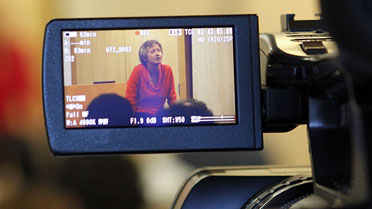

STEPS SYMPOSIUM 2013 – VIDEOS
View all the video from our symposium “Credibility across cultures: expertise, uncertainty and the global politics of scientific advice”, which took place at Sussex University on 6-7 February 2013. Symposium…
Introduction of the German Council for Sustainable Development
In April 2001 the Council for Sustainable Development, consisting of 15 councillors, was set up by the German Federal Government in order to contribute to implement the National Sustainability Strategy….
Dow Jones Sustainability Index in 1999
Dow Jones Sustainability Index (DJSI) is the longest-running of its kind, built by Sustainability Asset Management (SAM) and Dow Jones Index in 1999. A family of different indexes, its goal…
UN World Summit on Sustainable Development – Johannesburg (2002)
The world summit on sustainable development was held by United Nations in Johannesburg, South Africa from 26 August to 4 September in 2002. It was a follow-up conference of the…
African Union S&T Consolidated Plan of Action
The African Science and Technology consolidated plan (herby, referred to as ASTCPA) came about as a result of the first African Ministerial Conference on Science and Technology (AMCOST) in 2003….
STEPS Symposium 2013 – Speaker presentations
The 2013 STEPS Symposium, Credibility Across Cultures: expertise, uncertainty and the global politics of scientific advice, was held in February 2013 at the University of Sussex. Slides from the speakers…
#steps13 social media roundup
Following Alice Bell’s insightful post on the recent history of social media and science campaigns, I had quick look at our symposium speakers’ online profiles (the full list of speakers…
From MDGs to SDGs: aspirations, evidence and diversity in setting global goals
By Adrian Ely, STEPS Centre Head of Impact and Engagement This week’s STEPS Centre Annual Symposium will be looking at the tensions between scientific advice and policy-making across international borders. I’ll…
Science policy, social media and skepticism
Science is Vital protest outside the Treasury, 2010 By Alice Bell, Research Fellow, SPRU – Science and Technology Policy Research The Royal Institution is up for sale. There are…
What the new Ahmedabad Declaration means for grassroots innovation
by Adrian Smith, STEPS Grassroots Innovation project NOTE: A new article on grassroots innovation has just been published on the website of the Journal of Cleaner Production, authored by Adrian…
The battle over evidence-based approaches to development
If you haven’t already seen it, it’s worth looking at the debate over evidence-based approaches to development assistance that ran over three days on Duncan Green’s From Poverty to Power…
3 challenges for science and democracy after Rio+20
Rally to Restore Sanity, from Steve Rhodes’ photostream on Flickr (by-nc-nd) By Melissa Leach, STEPS Centre director When sustainability poses complex and often tangled questions, how do we answer them?…
Press Release: Pandemic Controversies: the global response to pandemic influenza must change
New research sets out alternative approach to preparing for pandemics ‘Evil’ scientists, deadly viruses and terrorist plots are usually the preserve of Hollywood blockbusters. But when it comes to pandemic…
The limits of ‘evidence’: Evidence-Based Policy-making for African agriculture
By James Sumberg, Martha Awo, John Thompson, George T-M Kwadzo and Dela-Dem Doe Fiankor, Researchers, STEPS Centre Livestock project Agricultural policy makers in Africa are now being dragged into the…
Credibility Across Cultures: resources
A set of resources relevant to the STEPS Centre Annual Symposium 2013 Credibility across cultures: expertise, uncertainty and the global politics of scientific advice Symposium home | Video | Presentations | Photos …
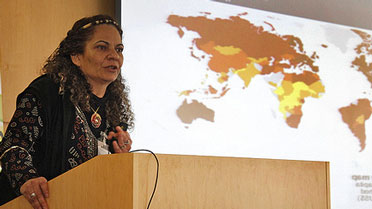

Credibility Across Cultures – STEPS Annual Symposium 2013
Our symposium on the global politics of scientific advice was held on 6-7 February at the University of Sussex. Video, slides, comment and other resources are now available to view….
Credibility across cultures: expertise, uncertainty and the global politics of scientific advice, 6-7 February 2013, UK
Speakers include: Professors Anne Glover, Sir Robert Watson, Lidia Brito, David Spiegelhalter, Chris Whitty, Roger Pielke, Duncan Green and more. Tackling 21st century sustainability and development challenges requires the ‘best…
Ghana: take 70,900 metric tons of frozen chicken, add politics
A billboard advertising chicken in Accra, Ghana. By alew on Flickr By Jim Sumberg and John Thompson Convenors, STEPS Centre Livestock project The well known expression – that [something] is…
COP 18: Climate change resources
A range of resources relevant to the issues being discussed at COP18. Rapid environmental change and the key development challenges of alleviating poverty and inequity are inseparable and increasingly complex. The STEPS…
“Pastoralism” book launch, 29 November, London
On 29 November, we’re launching the book Pastoralism and Development in Africa with a panel debate and drinks reception in Central London, held in association with the Royal African Society….
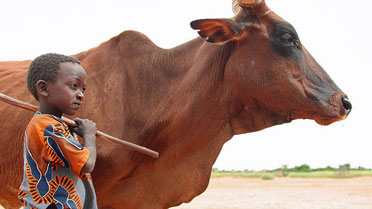

Pastoralism and Development in Africa: Dynamic change at the margins
This book takes a fresh look at the livestock sector in the Horn of Africa. The region is often in the headlines for all the wrong reasons: drought, famine, conflict…
STEPS Centre newsletter – autumn 2012
A bumper edition of the quarterly newsletter this autumn includes details of our upcoming annual symposium, Credibility Across Cultures, next year’s Summer School, a prestigious award win as well as work on the Post-2015 agenda,…
New Andy Stirling presentations
A collection of presentations recently given by STEPS co-director Andy Stirling on: civil society and the direction of innovation; the implications of uncertainty for science policy; knowledge and innovation implications for…
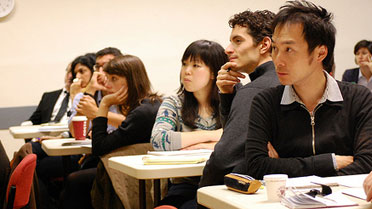

The new ‘security’ agenda in water, energy and food
On 26 October 2012 the STEPS Centre and SOAS ran a joint event to discuss the connections made between water, energy, food and climate, and the tendency to frame these…
Land grabs: knowledge and resistance
by Nathan Oxley, STEPS Centre communications officer Shalmali Guttal from Focus on the Global South addresses the opening plenary The Global Land Grabbing II conference at Cornell last week brought…
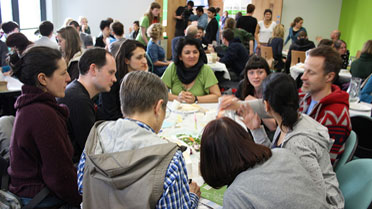

STEPS Centre wins award for contribution to public understanding of the social dimensions of science
The European Association for the Study of Science and Technology (EASST) has awarded the ESRC STEPS Centre its prestigious new Ziman award for “the most innovative cooperation in a venture…
GLOBAL LAND GRABBING II
See videos, photos, blogs and more from the second international conference on ‘Global Land Grabbing’. The STEPS Centre also has a range of useful resources on land, green and water grabs. Organised…
World Food Day: The State of Food Insecurity in the World and the Need for Coordinated Action
By John Thompson and Jim Sumberg The three Rome-based agencies of the United Nations – the Food and Agriculture Organization (FAO), the International Fund for Agriculture and Development (IFAD) and…
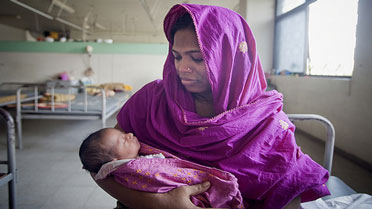

Tackling unregulated health markets
Follow the Washington debate which launched our new book on the spread of health markets in developing countries via the event Storify. New book: Transforming health markets Our new book in the STEPS…
Herd it on the grapevine: how pastoralists get a raw deal in policy and the media
Mike Shanahan of IIED has written two great blog posts in two weeks on how pastoralism is viewed by politicians and by stories in the media. The first covers how…
Pandemic Influenza: Research themes
Outbreak policy narratives Public and policy reactions to H5N1 and H1N1 have been guided by the prospect of the devastating impacts of an outbreak. ‘Outbreak narratives’ have guided policymaking,…
Pandemic Influenza: Resources
Books Scoones, I. (ed.) (2010) Avian Influenza: Science, Policy and Politics, London: Earthscan Routledge. Elbe, S. (2010) Security and Global Health, Polity Press Dry, S. and Leach, M. (eds.) (2010)…
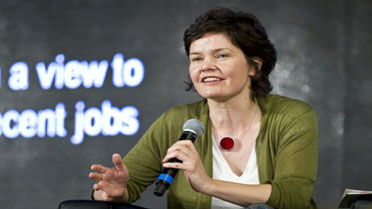

Video and slides: Kate Raworth, Oxfam on planetary boundaries
10th October 2012: ‘A safe and just space for humanity: can we live within the doughnut?’ Kate Raworth, Senior Researcher at Oxfam, gave a STEPS Centre seminar at the Institute of…
Press notice: Animal-to-human disease transmission: The science and poverty implications
As a new strain of SARS-like virus1 is reported to have been identified by UK officials and a major new popular science book Spillover – Animal Infections and the Next…
Vive la révolution?
Photo: Garissa cattle market from USAID’s photostream on Flickr Revolution is in the air. As the 3-day African Green Revolution Forum kicks off officially today in Arusha, the talk…
The great green land grab
“Land grabbing” is rarely out of the headlines. But the practice of land being appropriated by the environmental agenda – so-called “green grabs” – is gaining more and more attention….
Low Carbon Energy for Development Network second international workshop
The second international workshop of the Low Carbon Energy for Development Network (LCEDN), titled Transitions to low carbon energy systems: which pathways to energy access for all?, took place at the…
Low Carbon Energy Development Network 2nd conference (#LCEDN2)
Follow the conference on Storify They are big, big questions: How can developing countries transition to low carbon energy systems? Do low carbon futures preclude economic development? Can low carbon energy access go…
Video: Working together for low carbon development
Ed Brown, LCEDN Co-coordinator from Responding to Climate Change on Vimeo. In this video, Dr Ed Brown, Co-coordinator of the Low Carbon Energy for Development Network talks to RTCC about…
Final Call: register for #LCEDN2 – Low Carbon Energy for Development workshop, 10-11 September
You can still register for the international workshop of the Low Carbon Energy for Development Network (LCEDN) at Sussex University on 10-11 September. There are a small number of places…


Contested Agronomy: Agricultural research in a changing world
Agronomy – the science of crop production and land management – is increasingly a field for political debate. This book from the STEPS Centre explores how arguments about agricultural research…
Video: Adrian Ely on steps to sustainability (TEDx)
Adrian Ely talked about technology, innovation and the STEPS Centre’s ideas on pathways to sustainability earlier this year at TEDx Sussex University. The video’s just been made available, so here…
Rio+20 activities and resources
Following Rio+20, our work on science and technology for development continues. On this page: New paper | High-Level Dialogue | Resource Centre | Media coverage | Press releases | Green grabs | Activities | Events | Blog |…
Agriculture as Assembly (or, what is the nature of the factory in ‘factory farming’?)
By Jim Sumberg and John Thompson When considering the nature and spatial distribution of economic activity, two fundamental contrasts take centre stage: ‘urban vs. rural’ and ‘industry vs. agriculture’. While…
Low Carbon Energy Development Network (LCEDN) Second International Workshop
The second international workshop of the Low Carbon Energy for Development Network (LCEDN), titled Transitions to low carbon energy systems: which pathways to energy access for all?, will take place at…
Video: Pastoralism in Africa – doing things differently
Our new book Pastoralism and Development in Africa explores the booming livestock trade in the Horn of Africa, a region more often associated with conflict and famine. In this video,…
Health markets: Gerry Bloom and David Peters in Nature
Gerry Bloom, STEPS health convenor and David Peters (Johns Hopkins Bloomberg School of Public Health) have a comment piece in Nature today, on the challenge of unregulated health markets in…
Pastoralism: the hidden story of development in the Horn of Africa
Our new book Pastoralism and Development in Africa: Dynamic Change at the Margins explores the hidden story of pastoralism in the Horn of Africa. The latest volume in our Pathways…
Green Grabs explained: radio interview with Melissa Leach
Last week, our director Melissa Leach was interviewed about green grabs – the appropriation of land for environmental ends – by Brent Bambury of the Canadian station CBC Radio. Here’s…
Harnessing diversity across the global innovation system: a key challenge post Rio+20
By Adrian Ely, Head of Impact and Engagement, STEPS Centre Technology and innovation feature prominently in what looks likely to be the final outcome document from Rio+20, however the diversity…
Opening up Sustainable Development decision-making at the UN?
By Adrian Ely, in Rio de Janeiro The Rio+20 conference has been enriched by a process to engage civil society the Rio+20 Dialogues forSustainable Development. While innovative and pioneering approaches…
The slippery nature of ‘water grabbing’
Large-scale land acquisitions for agricultural investment, popularly known as ‘land grabbing’, have recently attracted headline attention. But the implications of these land grabs for water resources have stayed out of…
Video: listening to different views on sustainability
To mark the week of the Rio+20 conference, our funders ESRC have produced a series of short films looking at what social sciences are contributing to environmental research across a…
Where is the green economy? Audio interview with Tim Jackson
Here’s a treat for those looking for Rio+20 listening material: an interview with Prof Tim Jackson (author of Prosperity without Growth), talking about the future of the green economy. The…
Background Paper / Innovación, Sustentabilidad, Desarrollo e Inclusión Social: Lecciones desde América Latina
English version of this paper El presente manuscrito es uno de una serie de documentos de trabajo relacionados con experiencias regionales sobre ideas propuestas por el Nuevo Manifiesto del Centro…
Transforming innovation for sustainability
A radical new approach to science and innovation is urgently needed to steer us within planetary boundaries and secure human wellbeing, fostering diverse types of innovation and empowering the grassroots…
Press release: Single-track sustainability ‘solutions’ threaten people and planet
Fostering grassroots innovations and empowering the creativity of marginalized groups can boost sustainability The targets, indicators and approaches being used to pursue progress towards sustainable development at Rio+20 are counter-productive,…
Press release: Green grabs: the dark side of the green economy
Green’ market initiatives are increasing poverty. Local ecosystem stewardship must be nurtured instead. ‘Green grabbing’ – the rapidly-growing appropriation of land and resources in the name of ‘green ’ biofuels,…
Influencing the Rio+20 outcome document
By Melissa Leach The STEPS Centre submitted a position paper to the Rio+20 zero draft preparation process, in which we argued that science, technology and innovation have essential roles to play in…
Sustainable business in India: challenges for Rio+20
By Ian Scoones India has seen unprecedented economic growth in recent years; yet with this comes a growing demand for resources and increased pressure on the environment. But how can…
Beyond Rio Resource Centre
Research and expertise on the key Rio+20 issues in a new Beyond Rio Resource Centre. For more than 20 years the University of Sussex and the Institute of Development Studies…
The ‘Geeks’ Fight Back: Challenges for Science and Democracy
A mood of scientific self-righteousness has broken out in the UK. The ‘geeks’ – professional scientists committed to evidence-based policy – are on the march. What has brought this on?…
SUMMER SCHOOL: “WHAT IS RESEARCH FOR SUSTAINABILITY?”
Participants in the recent STEPS Summer School came to Brighton from all around the world, bringing diverse life experiences and disciplinary perspectives together to learn about, discuss and debate new…
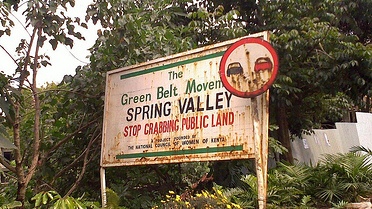

Colloquium on global land grabbing, 11 June
STEPS Centre researchers will be among the speakers at the Critical Agrarian Studies Colloquium No. 4, which takes place in The Hague on 11 June 2012. After a few years…
A NEW ALLIANCE FOR FOOD SECURITY, OR A TWO-TRACK AFRICA?
In a new post on the Future Agricultures Consortium blog, Ian Scoones examines the ‘New Alliance for Food Security and Nutrition’, announced at a high-profile conference in Chicago last week…
NUDGE, NUDGE
Ilse Oosterlaken, one of the participants in our summer school, has blogged about some of the lectures and discussions that have happened so far. One of Ilse’s blog posts reflects…
Debate: Who’s going to save the planet?
Who’s going to save the planet? IDS and STEPS Centre event at Brighton Fringe Festival 2012 by Ids (Uk) on Mixcloud A debate with Caroline Lucas MP and others…
About Us
The Dynamic Drivers of Disease in Africa was a research programme designed to deliver much-needed, cutting-edge science on the relationships between ecosystems, zoonoses, health and wellbeing, with the objective of helping people move…
Approach
The Dynamic Drivers of Disease in Africa programme brought together natural and social scientists, including environmental, biological, social, political, and human and animal health researchers. It was an integrated multidisciplinary –…
CHINA AND BRAZIL IN ZIMBABWE
Ian Scoones, STEPS Centre co-director, has written a blog post about Chinese and Brazilian projects in Zimbabwe, looking at the complex relations between donors and recipients of aid and investment…
People
The Dynamic Drivers of Disease in Africa team comprised: Neil Anderson Neil is a vet with a PhD in wildlife epidemiology. His research interests centre around the transmission of diseases at the wildlife/livestock/human…
EVENTS NEXT WEEK: TIM JACKSON LECTURE AND BRIGHTON DEBATE
Next week is the start of our first ever Summer School on Pathways to Sustainability in Brighton. Although most of the session are only open to the 42 invited participants,…
Consortium
The Dynamic Drivers of Disease in Africa Consortium was funded by the Ecosystem Services for Poverty Alleviation (ESPA) programme. The ESPA programme is funded by the Department for International Development (DFID), the…
Diseases
The Dynamic Drivers of Disease in Africa programme saw natural and social scientists working on four zoonotic diseases, each affected in different ways by ecosystem changes and having different impacts on…
VIDEO: TECHNOLOGY & THE GREEN ECONOMY
Our session at Planet Under Pressure in March looked at how to open up diverse pathways to sustainability, looking at different technologies from around the world. Adrian Ely (STEPS) spoke…
TIM JACKSON PUBLIC LECTURE AT SUSSEX, 14 MAY: WHERE IS THE GREEN ECONOMY?
On Monday 14 May, Tim Jackson is coming to Sussex University to give a public lecture, organised by the STEPS Centre. The lecture’s called “Where is the green economy? Prosperity,…
Briefings on the Maize project
A set of 7 briefings was produced as part of our project on Environmental Change and Maize Innovations in Kenya. The briefings cover the ideas, methods and results from the…
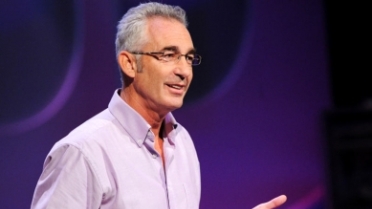

14 May: Tim Jackson – Where is the green economy?
In a live-streamed public lecture on 14 May at Sussex University entitled Where is the green economy? Prosperity, work and sustainability ‘after the crisis’, Tim Jackson talked about the challenges for…
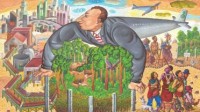

“Green Grabs”: Appropriating nature
A special issue of the Journal of Peasant Studies, published in May 2012, explores the controversial issue of ‘green grabbing’ – the appropriation of land and resources for environmental ends….
STUDENT Q&A #3: “AN EXTREMELY ENJOYABLE AND FULFILLING YEAR”
We asked some of our recent students at the Institute of Development Studies to talk us through their experience of studying on the MA Science Society and Development. For the…
Publications
September 2017 People, patches, and parasites: the case of trypanosomiasis in Zimbabwe, was published in the journal Human Ecology. Co-authors include DDDAC partners Ian Scoones, Vupenyu Dzingirai, Neil Anderson, William Shereni and Susan Welburn. june 2017 A Special Theme Issue of the Philosophical…
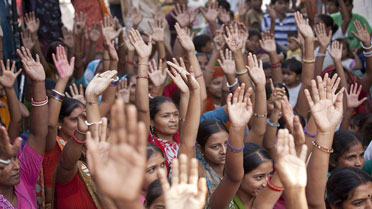

WELCOME
The STEPS Centre is delighted to have been granted new ESRC funding, running until 2016, following our first five years of research. In this new phase we are launching eight…
PLANET UNDER PRESSURE: BEYOND SCIENCE?
Planet Under Pressure, which ends today, is a big conference – not only in terms of the crowds of people here, but in the grand scale of the problems we’re…
PLANET UNDER PRESSURE: VIDEO HOPES FOR RIO+20
The journalist and author Fred Pearce, Oxfam campaigns and policy director Phil Bloomer and ESRC associate research director Paul Rouse are among those to tell us about their one big…
Press release: Rio+20 Must Radically Rethink Innovation (27 March 2012)
A radical new approach to innovation is urgently needed to ensure a fair and green economy and avoid reversing progress made on global poverty reduction, according to leading scientists at…
STEPS at PLANET UNDER PRESSURE
The STEPS Centre is mounting a variety of exciting activities at the Planet Under Pressure conference in London, this week (March 26-29): convening a key session, taking part in four…
STEPS at Planet Under Pressure
The STEPS Centre mounted a variety of activities at the Planet Under Pressure conference in London (March 26-29) from convening a key session to having an exhibition stand and holding…
WORLD WATER DAY: VIDEO HOPES FOR RIO+20
Ahead of the UN Conference on Sustainable Development, we are asking academics, practitioners, policymakers and other stakeholders to tell us about the one sustainable development issue they would like to see addressed…
WORLD WATER FORUM 2012: ARE SUSTAINABILITY TARGETS THE NEXT GOAL?
By Phemo Kgomotso, IDS Phd Student The editors of the IDS Bulletin titled ‘Some for All? Politics and Pathways in Water and Sanitation’, Volume 43, No. 2, March 2012 launched…
WORLD WATER FORUM 2012: DECISION TIME?
By Jeremy Allouche There was a certain sense of excitement around the Forum and the slogan ‘a time for solutions’, set the tone. It’s time for post MDGs and Rio+20. As…
WORLD WATER FORUM 2012: WHO IS BUYING IN?
by Alan Nicol World Water Forum six is drawing to a close here in Marseille. Booths are emptying and participants are dwindling at the slightly drab Parc Chanot. The monolithic…
WORLD WATER FORUM 2012: DEBATES AND CONTRADICTIONS
By Lyla Mehta and Harriet Dudley This was our third World Water Forum, and compared with the other ones we’ve attended it was pretty tame, far more low-key and lacked…
HAVE YOUR SAY: HOPES FOR RIO+20
Before and during the Planet Under Pressure conference in London next week, we’re asking people to tell us what sustainable development issue they want to see addressed at the Rio+20…
STEPS AT WORLD WATER FORUM
The STEPS Centre water and sanitation team is at the sixth World Water Forum in Marseille where they are preparing for our event this evening, where the progress – or…
STEPS AT THE WORLD WATER FORUM 2012
This Thursday (15 March), we’re holding a side event at the 6th World Water Forum in Marseille. Speakers include Jeremy Allouche, Alan Nicol, Lyla Mehta, Archana Patkar (WSSCC), Kamal Kar…
Multimedia
Listen to Victor Galaz, co-lead of the Drivers of Disease political economy of knowledge and policy theme, and Assistant Professor at the Stockholm…
PhD STUDENTSHIP ON ZOONOTIC DISEASE: APPLY NOW
The STEPS Centre is inviting expressions of interest in a doctoral studentship on the social dimensions of zoonotic disease in Africa. This 3+1 studentship starts in October 2012. The deadline…
More epidemics resources
Our blogs on swine flu Ian Scoones on Responding to Pandemic Threats (April 2010) The lessons of swine flu: Ian Scoones, The Guardian, 10 May 2009. A longer version is…
World Water Day 2012
To mark World Water Day we have published a range of thought-provoking new resources, and we are holding a seminar at IDS in the UK (details below) >>A new edition of the…
JOIN US FOR BOOK SERIES LAUNCH
If you are going to be at the Planet Under Pressure event in London in March, we would be delighted if you joined us for drinks at 5.30pm on the…
Business and Biotech in Bangalore
Two events with India-based partners explored the recent history and future of Indian business and biotechnology. These events, held in February 2012, are part of our ongoing work on risk,…
RISK, COMPETITIVENESS AND SUSTAINABILITY CONFERENCE, INDIA
The Center for Public Policy (CPP) at the Indian Institute of Management Bangalore (IIMB) and the STEPS Centre, with Infosys and climate3C, are hosting a conference to focus on “Risk,…
Getting hotter: Regulating biotechnology in India
by Ian Scoones, STEPS Centre co-director Biotechnology offers many potentials but also dangers. Regulation is clearly essential. But how, over what and with what measures is less clear. The debate…
Biotech business in Bangalore: a decade of hype and hope?
By Ian Scoones, STEPS Centre co-director A decade ago, biotechnology was being hyped as the next big thing. Building on the successes of the IT sector, BT (biotech) was, it…
WHAT HAPPENED TO BIOTECH IN BANGALORE?
A decade ago, biotechnology was being hyped as the next big thing in Bangalore, India. Building on the successes of the IT sector, BT (biotech) was, it was argued, going…
Media coverage archive 2006-2011
STEPS Centre media coverage 2006-2011 Gates Tells G20 Innovation is the Key to Development, SciDev.net, 4 Nov 2011, STEPS member Adrian Ely comments A new colonial carve up? Ian Scoones…
“SOME FOR ALL” IN WATER: FORTHCOMING IDS BULLETIN
A new IDS Bulletin, published on 2 March, will focus on STEPS work on water and sanitation. Entitled “Some for All? Pathways and Politics Since New Delhi 1990”, it brings…
STUDYING SCIENCE, SOCIETY AND DEVELOPMENT AT IDS
For those considering postgraduate study in England, the uncertainties of taking a year out of ‘normal’ life may be worrying. We’ve asked some of our recent students at the Institute…
STEPS AT PLANET UNDER PRESSURE
The STEPS Centre is taking part in a variety of activities at the Planet Under Pressure conference in London next month, from March 26-29. The event promises to “focus the…
BIOTECH IN BANGALORE SEMINAR
Center for Public Policy (CPP), Indian Institute of Management Bangalore (IIMB) and the STEPS Centre, are coming together with the Association of Biotechnology-Led Enterprises (ABLE) to hold a half a…
STEPS IN PARLIAMENT
The STEPS Centre director Melissa Leach will represent the Centre in two UK Parliament events next week. After the Centre’s submission to the Science and Technology Select Committee’s inquiry in…
WHY STUDY THE MA SCIENCE, SOCIETY AND DEVELOPMENT AT IDS?
What is it like to be an MA student at Institute of Development Studies? A graduate of the 2011 cohort talks about why she moved from New Delhi to take…
Full list of STEPS projects
Animal Disease Re-emerging transmissible transboundary animal diseases: comparing Rift Valley Fever with BSE Avian Flu Avian ‘flu: The politics and policy processes of a global response Biochar Biochar and Anthropogenic…
STEVE WADDELL ON DYNAMIC SUSTAINABILITIES
Steve Waddell, founding Executive Director of Global Action Network Net (GAN-Net) and Leadership for Change (among his many other activities) has written on his blog about the STEPS Centre’s recent…
NEW INITIATIVE TO HELP DEVELOPING COUNTRIES ACHIEVE LOW-CARBON GOALS
By Julia Day Friday 13th; unlucky for some. But for a new initiative launching today, we hope the old proverb is wrong and the date will prove auspicious. The Low…
LOOKING AHEAD TO RIO+20
By Julia Day It is 2012 already, and the biggest event in our calendar this year (apologies to Seb Coe and the London 2012 Olympic Organising Committee) is the United…
Haemorrhagic fevers in Africa: Narratives, politics and pathways of disease and response
This article by Melissa Leach, STEPS Centre director, appeared in Wellcome History 38 (Summer 2008). Haemorrhagic fevers capture popular imagination as deadly zoonotic diseases that come ‘out of Africa’. Ebola,…
AVIAN FLU BIO-TERROR FEARS
By Julia Day Researchers in a Dutch University laboratory have mutated the H5N1 strain of avian influenza so that it can be transmitted betweem humans through the air via coughs…
Manifesto: translated versions
Innovation, Sustainability, Development: A New Manifesto was originally published in English, but the Manifesto project has involved discussions in many countries. We would like people around the world to be…
BBC COVERAGE OF ZIMBABWE LAND REFORM RESEARCH
Zimbabwe’s land reform since 2000 has been intensely controversial. Overturning the settler colonial pattern of land use and creating a new agrarian structure has had far-reaching consequences. Yet the debate…
Press release archive
2010 Press pack: Innovation, Sustainability, Development: A New Manifesto Press release: A Manifesto to make innovation deliver for development 15 June 2010 Opening presentation from launch event by STEPS director…
GM Crops 10 years on
by Ian Scoones, STEPS Centre co-director A decade ago there was much hope – and even more hype – about the potentials of GM crops. GM crops were going to…
Theme 4: Public participation and the politics of policy
This theme is part of the Biotechnology Research Archive. Governing biotechnologies in favour of ‘pro-poor’ outcomes is a challenge. The research contained in this section of the Biotechnology Research Archive…
Theme 3: The role of the private sector and corporate control
This theme is part of the Biotechnology Research Archive. This section of includes studies of biotechnology business in action, including detailed analyses of the role of the corporate sector –…
Theme 2: Regulating agricultural biotechnology
This theme is part of the Biotechnology Research Archive. Effective and well-designed regulation is essential to any innovation process. This is particularly the case for novel genetic techniques, where uncertainty…
Theme 1: Poverty reduction and food security: impacts of genetic technologies
This theme is part of the Biotechnology Research Archive. What have been the impacts of modern agricultural biotechnology on poverty and food security? Studies include broad international overviews to particular…
Reconsideración de la normativa: las semillas y las drogas en China y Argentina
En inglés Pagina en español (pdf 98kb) Reconsideración de la normativa El proyecto compara la normativa de dos tecnologías – las semillas de algodón y los antibióticos transgénicos – con…
Backgrounder: Veterinary Science, Transboundary Animal Diseases and Markets
Contexts Contexts for southern Africa’s livestock production systems are fast changing. A wider group of producers, including smallholders, are demanding access to markets and the privileged position of large scale…
Backgrounder: Avian ‘flu: the politics and policy processes of a global response
Framing policy: the case of Highly Pathogenic Avian Influenza (HPAI) The central focus of this project is an analysis of policy framings and the way different actors, networks and interests…
“Seminar” special issue: Knowledge Society
The STEPS Centre held events in Hyderabad, Bangalore and Delhi from 5-13 January 2009 to discuss the Knowledge Society. “Seminar” special issue The Indian journal Seminar devoted a special issue…
Media Centre
World-class scientists from the Dynamic Drivers of Disease in Africa Consortium are available for interview and to comment on the science of emerging and re-emerging zoonotic diseases, the poverty impacts of…
STEPS AND SEG AT COP17
Rob Byrne, convenor of the new STEPS Centre energy and climate change domain, together with Jose Opazo, a doctoral researcher from the Sussex Energy Group, will be at the latest round of global…
STEPS SUMMER SCHOOL: MAY 2012
An event at the STEPS Centre We’re delighted to announce that we’ll be holding a two-week Summer School on Pathways to Sustainability next May. An international group of leading researchers…
Globelics ’11: Lessons from India’s experience of innovation politics shared at Globelics
Report on STEPS UK-India collaborations at the 9th Globelics Conference, 17th November 2011(supported by UKIERI), by Adrian Ely Perspectives from India were amongst those shared in an international panel on…
NEW PAPER: LESSONS FROM LATIN AMERICA
A new STEPS Centre paper, by Elisa Arond, Iokiñe Rodríguez, Valeria Arza, Francisco Herrera and Myriam Sánchez, investigates the challenges of linking science, technology and innovation to social needs, in…
GLOBELICS’11: Innovation for social inclusion and sustainable development
By Adrian Smith, STEPS Centre and SPRU During the session Innovation for Social Inclusion and Sustainable Development, we heard a rich set of perspectives from different regions around the world….
GLOBELICS’11: STEPS CENTRE SESSION WORDLE
As the STEPS Centre prepares for it’s session at the Globelics conference in Buenos Aires today, member Adrian Smith has created a Wordle based on the contents of his presentation for the…
GLOBELICS ’11: Innovation begins at home
By Adrian Ely, STEPS Centre member Innovation for inclusive development was a resounding theme in the introductory session of the 9th Globelics Conference in Buenos Aires on 15th November. Ministers,…
NEW BOOK ON KENYAN MILLENNIUM VILLAGES
A new book has just been published on the Kenyan Millennium Villages by Awuor Ponge, entitled Indigenous Knowledge and Sustainable Crop Production: A Study of the Millennium Village Project in Bar-Sauri…
Background Paper / Innovation, Sustainability, Development and Social Inclusion: Lessons from Latin America
By Elisa Arond, Iokiñe Rodríguez, Valeria Arza, Francisco Herrera and Myriam Sánchez This paper is one of a series of working papers relating regional experiences to ideas proposed by the…
GLOBELICS 2011
The STEPS Centre ran a special session at the 9th Globelics Conference in Buenos Aires, Argentina, on 17 November, entitled Innovation for Social Inclusion and Sustainable Development.
INNOVATION WITH IMPACT?
By Julia Day, STEPS Centre communications manager Billionaire philanthropist Bill Gates was asked by French President Nicolas Sarkozy to investigate finance for development and to report back to the G20 in…
UK PRIME MINISTER URGED TO ATTEND RIO+20
By Julia Day, STEPS Centre Communications Manager “The Prime Minister should promise to attend next year’s Rio + 20 Earth Summit to show leadership on sustainability and strengthen global political…
INNOVATION AND SUSTAINABLE DEVELOPMENT AT GLOBELICS
By Julia Day, STEPS Centre Communications Manager How can innovation contribute to social justice and sustainable development goals? Two of the STEPS Centre’s members will be debating this issue in Argentina next…
CGIAR SCIENCE FORUM, BEIJING
By ERIK MILLSTONE, STEPS Centre Member The 2nd Science Forum of the CGIAR (Consultative Group on International Agricultural Research) took place in Beijing this week, and the discussions represented a…
JIM WATSON JOINS TELEGRAPH’S AGE OF ENERGY INITIATIVE
Jim Watson, Professor of Energy Policy at SPRU and director of the Sussex Energy Group as well as co-convenor of the STEPS Centre’s new Energy domain, has been asked to…
BELLAGIO: THE FUTURE OF PHILANTHROPY
By ADRIAN ELY, STEPS Centre researcher I was lucky enough to participate in a fascinating discussion on global governance and regulation, organised as part of the Bellagio Initiative last week….
LAND GRABS: CALL FOR NEW GRANT APPLICATIONS
By Julia Day, STEPS Centre Communications Manager Across the world, especially in the global South, there has been a dramatic rise in ‘land grabs’ – cross-border, transnational corporation-driven and, in…
WE’RE IN THE IDS ANNUAL REPORT
By Nathan Oxley, STEPS Communications Assistant The STEPS Centre is mentioned twice in the beautifully interactive Annual Report of the Institute of Development Studies. The Knowledge, Technology and Society section…
NON-COMMUNICABLE DISEASES: AN INDICATOR OF GREATER SHIFTS
By Hayley MacGregor, STEPS Centre member The UN High-level Summit on Non-communicable Diseases now underway comes at an important moment for the development community. With just over 50 per cent…
TOP 10 POSTS OF ALL TIME
I’ve been looking at the most-viewed posts on the blog since we started in January 2007 (with a post on pro-poor rice farming). It’s interesting to see how the blog’s…
HAVE YOUR SAY: DELHI SEMINAR ON INNOVATION, SUSTAINABILITY AND DEVELOPMENT
At last month’s seminar on Innovation, Sustainability and Development at NISTADS, participants reflected on the state of innovation in various fields – in food and agriculture, health, ICTs, low carbon…
VIRUS AND BEAST: HOW ONE WORD CHANGES EVERYTHING
How does a single word affect the way we deal with a problem? Last night’s edition of All In The Mind on BBC Radio 4 offered a striking example. Researchers…
INDIA SEMINAR: INNOVATION, IDEAS & INSPIRATION
by Adrian Ely, Manifesto project convenor Last week, STEPS participated in a 3-day seminar on “Innovation, Sustainability and Development” in Delhi, India. It was hosted by the National Institute of…
Delhi, June 2011: Seminar on Innovation, Sustainability and Development
On June 28-30, 2011, the National Institute of Science, Technology and Development Studies (Delhi) organised an international seminar on Innovation, Sustainability and Development in partnership with the Centre for Development…
EVERYONE’S A WINNER (EXCEPT IF YOU’RE NOT…)
Photo: Jatropha curcas – the biofuel plant from tonrulkens’ photostream on Flickr Our director Melissa Leach is giving the first Annual Piers Blaikie Lecture on Environmental Politics at the University…
A NEW LEADER AND A NEW BEGINNING FOR THE UN FOOD AND AGRICULTURE ORGANISATION?
By John Thompson, co-convenor, STEPS Centre food and agriculture domain and joint coordinator, Future Agricultures Consortium The Food and Agriculture Organisation (FAO) of the United Nations (UN) chose Brazil’s José…
A MISSED OPPORTUNITY: THE G-20 ACTION PLAN ON FOOD PRICE VOLATILITY AND AGRICULTURE
By John Thompson, co-convenor, STEPS Centre food and agriculture domain and joint coordinator, Future Agricultures Consortium The Group of Twenty (G-20), comprised of the world’s 19 largest economies, plus the…
COMPLEXITY SCIENCE & DEVELOPMENT
In a world where systems change and interact unpredictably, there’s a growing interest in using complexity science to tackle questions in international development. Our director Melissa Leach spoke last month…
VIDEO: MELISSA LEACH AT NESS 2011
Melissa Leach, STEPS Centre Director, spoke at NESS 2011 (The 10th Nordic Environmental Social Science Conference) in Stockholm last week. Her talk (56 minutes), “Pathways to sustainability? Environmental social science…
INEQUALITY AND FOOD: 10 TASKS FOR THE UK GOVERNMENT
by Erik Millstone, STEPS Centre Food and Agriculture co-convenor There are massive inequalities between industrialised and developing countries, and they have widened over the past 15 years, but there are…
THE MANIFESTO: ONE YEAR ON
By Adrian Ely, Manifesto project convenor Innovation, Sustainability, Development: A New Manifesto is a year old! It’s been a busy year. In the time since the launch of the Manifesto,…
RISKY ADVICE AND UNCERTAINTY
Andy Stirling, STEPS Director and Alister Scott, visiting fellow at SPRU, have an article up at Project Syndicate (and on the Al Jazeera website) on recent technological disasters (Fukushima, BP…
REVOLUTIONISING DEVELOPMENT: WHOSE FUTURE COUNTS?
By Melissa Leach, STEPS Centre director I first worked with Robert Chambers as a research assistant when I was little more than an undergraduate myself. In the book ‘Revolutionising Development’,…
Report: New Models of Technology Assessment for Development
By Adrian Ely, Patrick Van Zwanenberg and Andy Stirling The report builds on work previously conducted as part of the Manifesto and research carried out during the first phase of…
Manifesto Cultural Café, SE Brazil, 13 May 2011
Dr Edmilson Costa Teixeira, Associate Professor at the Department of Environmental Engineering at the Universidade Federal do Espirito Santo will be hosting a ‘cultural café’ discussion focussing on the New…
“GOLDEN RICE”: A GOLDEN OPPORTUNITY?
by Sally Brooks, Biosafety project convenor Biofortified crops, for example rice enriched with vitamin A, are claimed as a way of getting vital extra nutrition to poor people. They’ve also…
History of the Sussex Manifesto
Professor Sir Hans Singer considered it one of the three most important reports he had been involved in writing. Given Prof. Singer’s illustrious career spanning seven decades from 1936, that…
VIDEO: WATER, OIL AND POLITICS IN EGYPT AND SUDAN
In a time of intense and dramatic change in North Africa, Sudan splits into two. One of the most crucial negotiations to take place is over water: who gets how…
FILM: “SEEDS AND SUSTAINABILITY” OUT NOW
Our new film, “Seeds and Sustainability: Maize pathways in Kenya”, explores how to secure seeds for farmers growing maize – Kenya’s key staple crop – in drought-prone regions of the…
VIDEO: WATER & SANITATION FOR ALL?
We were lucky to have some big names in water & sanitation at our Water & Sanitation Symposium last week. We asked them what the biggest barriers were for water…
DIVERSITY, DISTRIBUTION AND DEVELOPMENT THROUGH KNOWLEDGE, NETWORKS AND NATIONS
By Melissa Leach, STEPS Centre director A new report by the Royal Society surveys the global scientific landscape in 2011, noting the shift to an increasingly multipolar world underpinned by…
WATER & SANITATION FOR ALL IS ELUSIVE, BUT ACHIEVABLE
Here’s another guest post on water and sanitation, on the eve of our Symposium on that subject. Barbara Frost is Chief Executive of Water Aid, a charity dedicated to the…
RETHINKING WATER
Our second guest blog for the STEPS Water Symposium is by Gourisankar Ghosh. Gourisankar is the CEO of FXB India Suraksha, a non profit company working for the vulnerable children…
FILM: “WATER AND JUSTICE” OUT NOW
Our new film, “Water and Justice: Peri-urban pathways in Delhi”, tells the story of three people and their relationship with water in the towns and villages on the edge of…
THINKING OUT OF THE WATER BOX
We’re delighted to feature this guest post by Erik Swyngedouw, Professor of Geography at the University of Manchester. This is the first of a series of blog posts by speakers…
JAPAN: NEGLECTED NUCLEAR LESSONS
Photo: Screen capture from video of an explosion at the Fukushima Daichi plant in Japan (Reuters) By Andy Stirling, STEPS Centre co-director What lessons can be learned from the tragic…
Center for Scientific Studies (CECS) in Chile
The Center for Scientific Studies (CECS) was founded in 1984 as the first independent scientific research organization in the history of Chile, and has become an important centre for science in Chile and Latin America.
The Belgrade Process on International Environmental Governance
The First meeting of the Consultative Group of Ministers or High-level Representatives on International Environmental Governance – ‘The Belgrade Process’ governed by UNEP
Ethos founded in Brazil
Ethos is a not-for-profit organization, founded in 1998 in Brazil to support firms to set commitments toward social responsibility and sustainability.
Happy Planet Index
The Happy Planet Index (HPI) is an index of human well-being and environmental impact that was introduced by the New Economics Foundation (NEF) in July 2006.
Special Climate Change Program 2009-2012 Mexico (PECC)
Elaborated by the Mexican Federal Government this document establishes quantitative mitigation and adaptation goals for the period 2009-2012 and long term goals for 2020 and 2050.
The World Conservation Strategy
The World Conservation Strategy was published by the International Union for Conservation of Nature and Natural Resources (IUCN), United Nations Environment Programme (UNEP) and the World Wide Fund for Nature (WWF) in 1980.
Identification of Minamata Disease
Minamata disease is one of the most severe diseases caused by environmental pollution in the world, which was first confirmed in 1956 in Minamata City, Japan.
The Stern Review on the Economics of Climate Change
The Stern Review is a 700-page report released for the British Government, on the economics of mitigating and adapting climate change.
‘Geoengineering the Climate – Science, Governance & Uncertainty’
‘Geoengineering the Climate – Science, Governance & Uncertainty’ is a report published by the Royal Society in September 2009.
International Space Station (ISS)
The start of construction of the International Space Station (ISS)
Environmental Partnership for Sustainable Development founded
Founded in 1991 as a response to the dramatic political changes in the region, the Environmental Partnership for Central Europe (as it was first called) initially aimed to identify key…
National Innovation Council for Competitiveness, Chile
The National Innovation Council for Competitiveness is a public-private partnership that acts as permanent adviser to the President of the Republic of Chile.
‘Putting Africa First: The Making of African Innovation Systems’
Publication of the book, Putting Africa First: The Making of African Innovation Systems (2003)
Kyoto Protocol
The Kyoto Protocol is an international agreement linked to the United Nations Framework Convention on Climate Change.
Intergovernmental Panel on Climate Change (IPCC)
The Intergovernmental Panel on Climate Change (IPCC) is a scientific intergovernmental body tasked with reviewing and assessing the most recent scientific, technical and socio-economic information produced worldwide relevant to the understanding of climate change.
“Limits to Growth Forum”, Sussex, 11 March 2011
The ‘Limits to Growth Forum’ brought together a series of expert speakers to address the inherent problems of our current economic system, and explore the possible alternatives for ‘beyond growth’…
SCIENCE & INTOLERANCE
John Beddington, the UK Government’s Chief Scientific Advisor, said earlier this month that scientists should be “grossly intolerant” towards “pseudoscience” and suggested that the media gives too much space to…
REVOLUTIONS ON THE NILE
By Alan Nicol, IDS and Ana Cascão, Stockholm International Water Institute Today is official Nile Day in the basin and celebrations will be taking place in Goma, Democratic Republic of…
ANDY STIRLING ON SCIENCE & SCEPTICISM
After the UK Government’s Chief Scientific Adviser, John Beddington, called for scientists to be “grossly intolerant” of pseudo-science The point is that the basic aspirational principles of science offer the…
EGYPT AND SUDAN: POLITICS AND WATER IN A NEW NILE STATE
Our STEPS Water Seminar on 22 February is with Ana Cascão from Stockholm International Water Institute, who’s recently returned from working in Egypt and Sudan. Ana is a political scientist…
WHAT DOES “ONE HEALTH” MEAN?
STEPS Centre researcher Paul Forster is blogging from the International One Health Congress in Melbourne. This is his second and final post from the Congress. Three full days on from…
ONE HEALTH, ONE WORLD?
Photo: SARS Mural, from Steel Monkey’s Flickr photostream (creative commons)STEPS Centre researcher Paul Forster is blogging from the International One Health Congress in Melbourne. This is the first of his…
SOLAR STOVES: MAKING THINGS PEOPLE ACTUALLY USE
Photo: Solar technology in the CIFRES carpark, by Adrian Ely By Adrian Ely, Manifesto project convenor In the car park of the International Centre for Training and Research in Solar…
DILEMMAS IN THE SEARCH FOR APPROPRIATE TECHNOLOGIES
By Adrian Smith, STEPS Centre member This post is also available in Spanish at the Tecnologias Sociales blog. Observing national innovation policies around the world, one is struck by some…
SCIENCE AND DEMOCRACY: GATHERING MOMENTUM?
By Adrian Ely, Manifesto project convenor The Science and Democracy World Forum is part of a growing movement responding to the challenges of sustainability and development. At this year’s event…
FEEDING THE FUTURE? THE FORESIGHT REPORT ON FOOD AND FARMING
By John Thompson and Erik Millstone, STEPS Centre Food and Agriculture Co-Convenors A new report from the UK Government-commissioned study into Global Food and Farming Futures has called for urgent…
CALL FOR PAPERS: WATER AND SANITATION SYMPOSIUM 2011
The STEPS Centre’s Water and Sanitation Symposium on 22-23 March is entitled “Some for All? Pathways and Politics in Water and Sanitation since New Delhi, 1990”. We’ll be looking at…
4 BIG CHALLENGES FOR WATER AND SANITATION
Photo: Map of sanitation in Ndeke village, Zambia, from the CLTS Flickr photostreamWe live in uncertain times. If you’re looking for something that embodies the changing and conflicting forces of…
Paris roundtable, 6 Jan 2011
Melissa Leach, Andy Stirling and Adrian Ely will be presenting the New Manifesto in Paris on the afternoon of 6 January. The discussion (in French) will invite responses from French…
VIDEO: BRAND AID – SHOPPING WELL TO SAVE THE WORLD
Here’s the video of last week’s seminar on Bono, “aid celebrities” and the RED campaign, by Lisa Ann Richey, Professor of International Development Studies at Roskilde University. If embedding doesn’t…
AFRICA AND THE MDGs: A MANIFESTO
By Adrian Ely, STEPS Centre member [Edit (7/12/10): The Africa Manifesto has now been launched: you can download it from the ATPS website.] Ten years after the African Technology Policy…
LESSONS IN “SCALING UP” HEALTH SERVICES FROM NIGERIA, CHINA & BRAZIL
What happens when you “scale up” health services to try to provide widespread coverage in a region or country? The “Beyond Scaling Up” panel at the Health Systems Research symposium…
MONTREUX: ENVIRONMENTAL CHANGE AND HEALTH RISKS
By Michael Loevinsohn, STEPS Centre member On Wednesday I chaired a session on New Directions in Health-Environment Research: Implications for Health Systems. The topic is a bit off the beam…
MONTREUX: KNOWLEDGE AND TRUST – HEALTH SYSTEMS RESEARCH
By Michael Loevinsohn, STEPS Centre member You know you’re a discipline or a significant sub-discipline when you can organize and find funding for a global symposium. Twelve hundred participants from…
MONTREUX: BEYOND SCALING UP
Gerry Bloom, STEPS Centre health convenor, will be holding a session tomorrow (Thursday) at the the First Global Symposium on Health Systems Research in Montreux, entitled “Beyond Scaling Up”. Here’s…
MONTREUX: NEW DIRECTIONS IN ENVIRONMENT-HEALTH RESEARCH
Some of us are at the First Global Symposium on Health Systems Research in Montreux and running events discussing our recent work (see the STEPS Centre events page for full…
TRANSITIONS: HOW GOOD IDEAS GO GLOBAL
Traditional forms of energy supply are being challenged. Photo: Gas meter dials by Leo Reynolds on Flickr (Creative Commons) By Adrian Smith, STEPS Centre member How does a new way…
BEING “HEALTHILY SCEPTICAL” ABOUT BIOFORTIFICATION
Lawrence Haddad, IDS Director, has written about the future of biofortification (and mentioned the STEPS Centre’s work) on his blog, Development Horizons: “To date, biofortification has relied on conventional breeding…
BONO, BRANDS AND AID
Lisa Ann Richey, Professor of International Development Studies at Roskilde University, will be talking about aid partnerships, RED and “aid celebrities” in the next STEPS Centre seminar on 25 November….
FINDING PATHWAYS IN AN AGE OF ANXIETY
We’re living in an age of anxiety where politicians, policy makers and the public search for solutions to narrowly-defined problems and risks. At the recent CRASSH conference, “Challenging Models in…
SHIT AND CITIZENSHIP
In the last 15 years, the way sanitation is treated in Brazil has changed dramatically. The picture of poor investment and danger to public health is being replaced by climbing…
31 OCTOBER: DEBATE ON ENGINEERING, CAUTION AND UTOPIA
Professor Andy Stirling, STEPS Centre Co-Director, will be part of a keynote debate entitled “Engineering the future: cautionary tale or utopia?” on Sunday. The debate is part of the Battle…
STEPS CONFERENCE 2010: VIDEO
Our conference featured keynote speeches with ideas on sustainability and the sciences; and a roundtable on policy for the 2012 Earth Summit. Keynote speech 1: Prof Melissa Leach, STEPS Centre…
Manifesto translated into Arabic, Chinese, French, Portuguese, Spanish
Innovation, Sustainability, Development: A New Manifesto was originally published in English, but the Manifesto project has involved discussions in many countries. We would like people around the world to be…
STEPS CONFERENCE 2010: WATER, SUSTAINABILITY AND INTELLECTUAL JUDO
by Katharina Welle, DPhil student Water is a vital piece in the sustainability jigsaw. It’s also a resource that requires careful management. In the final plenary session at the STEPS…
SUSTAINABILITY JUDO: STEPS CENTRE CONFERENCE 2010
This year’s conference – Pathways to Sustainability: Agendas for a new politics of environment, development and social justice – was chock full of provocations and insights on the STEPS Centre’s…
SHIT HAPPENS: SANITATION AND DEVELOPMENT
The British Medical Journal’s podcast this week features Lyla Mehta, STEPS Centre Water and Sanitation convenor, talking about sanitation and the UN MDGs. This week, to steal a line from…
INVESTING IN LAND: THE WORLD BANK REPORT ON RISING GLOBAL INTEREST IN FARMLAND
by Ian Scoones, STEPS Centre co-director There is something for everyone in the long-awaited World Bank report, Rising Global Interest in Farmland: Can it yield sustainable and equitable benefits? Some…
HUNGRY FOR RESULTS?
By John Thompson, STEPS Centre Food and Agriculture Convenor In advance of the UN Millennium Development Goal (MDG) Summit in New York on 20-22 September, the United Nations Food and…
SOCIO-ECOLOGICAL DYNAMICS OF DISEASE
We’ve added three new research projects we’re involved in to the website, under the heading “Socio-ecological dynamics of disease”. The projects are all looking at the social, ecological, biological and…
WHOSE KNOWLEDGE COUNTS AT WORLD WATER WEEK 2010?
by Timothy Karpouzoglou, research student, SPRU World Water Week (WWW) 2010 is over, leaving me with some questions. Is WWW really about “opening up” or about “closing down” the debate…
WORLD WATER WEEK: CONTROVERSY AND CONTRASTS
By Lyla Mehta, STEPS Centre Water and Sanitation convenor It’s my fourth day at World Water Week, the annual mecca for policy-makers and players from the World Water Council, the…
WORLD WATER WEEK: THE SAME OLD STUFF?
by Jeremy Allouche, STEPS Centre Research Fellow Here’s our first blog from World Water Week – some call it ‘the pilgrimage of water’. Well… the price of the pilgrimage (about…
SOCIAL TECHNOLOGIES
There’s an interview with Adrian Smith, STEPS Centre Research Fellow, about “social technologies and niches for sustainable transformation” in the September edition of Saber Cómo (the monthly newsletter of the…
STEPS AT WORLD WATER WEEK
We’re at World Water Week in Stockholm this week. Our session, Liquid Dynamics II: Linking Quality and Access for Pro-poor Sustainability is at 12.45pm on Wednesday. In the session, we’ll…
TALKING TOILETS
Community-Led Total Sanitation is a rapidly-spreading way of getting local people involved in planning toilets and other facilities. CLTS taps into people’s feelings of disgust to encourage action. Photo: Kalangaba…
MAKING HEALTH SYSTEMS WORK FOR THE POOR
By Kate Hawkins, Communication Officer for Health and Social Change We’ve published seven new briefings on “scaling up” in the health sector. Among the themes covered are improving access to…
2nd students roundtable
Science, Society and Development MA students at the Institute of Development Studies and SPRU Science and Technology Policy Research took part in a Manifesto roundtable on 20 January 2010. The…
China workshop: Presentations and report
UK-China Innovation Workshop for Sustainable and Equitable Development School of Public Policy and Management, Tsinghua University, Beijing 19 March 2010 Workshop report >> UK-China workshop report (PDF, 452kb) by Dr…
ANTIBIOCALYPSE: HOW DO WE RESPOND TO SUPERBUGS?
by Gerry Bloom, STEPS Centre Health domain convenor On August 11 the Lancet published an article that demonstrated the emergence of a new antibiotic resistance mechanism (known as NDM-1) in…
MANIFESTO IN CHINA: MOVING AND NON-MOVING PICTURES
Photos and video of the Manifesto discussion in Beijing, held at Tsinghua University in March, are now on the website. Take a look for some top academics’ takes on innovation,…
China – video and photos
Video and photos from a workshop held at Tsinghua University, Beijing, on 19 March 2010, entitled “UK-China Innovation for Sustainability & Equitable Development”. Speakers’ presentations from the day are also…
Manifesto: print/PDF version
Innovation, Sustainability, Development: A New Manifesto recommends new ways of linking science and innovation to development for a more sustainable, equitable and resilient future. The full text is now available…
Methods resource page
This section is currently under development (Aug 2013). The content for this page will appear here soon. In the meantime, you might like to watch these short videos of Professor Andy…
NEW BOOK: EPIDEMICS
Epidemics: Science, Governance and Social Justice, the new book in our Pathways to Sustainability series, highlights the problems of emergency knee-jerk responses to serious outbreaks of disease. Of the many…
SCALING UP: IMPROVING ACCESS TO HEALTH SERVICES?
We are working to challenge the prevailing concepts of “scaling up” in the health sector, along with our affiliate partner Future Health Systems. Opinions on how to improve access to…
PUBLISHED TODAY – NEW BOOK ON RICE BIOFORTIFICATION BY SALLY BROOKS
The latest in the STEPS Centre’s Pathways to Sustainability book series is published today – Rice Biofortification: Lessons for Global Science and Development by Sally Brooks. Biofortification, the enrichment of…
NEW MANIFESTO: INTENTIONS INTO ACTION
By Satchida Rana, MA Science, Society and Development student. At the launch of the New Manifesto on 15 June, there were some great discussions about the future of innovation for…
LOW-CARBON INNOVATION IN CHINA – QUESTIONING THE RULES OF THE GAME
By Dr Adrian Ely, STEPS Centre member How do we create more low-carbon societies? It’s clear that “top down” and “bottom up” forms of innovation will both have a role…
Marathmoli roundtables: reports
The Marathmoli roundtable process took place in Maharashtra, India in March and April 2010. (Marathmoli Maharashtra Women’s Net is an information network and support service for women and other marginalised…
THE NEW MANIFESTO AND LANGUAGE
By Indie Dinala, postgraduate student in Science, Society and Development at IDS. Language was one of the big subjects that came up at the New Manifesto launch on 15 June….
Zimbabwe Roundtable
On 5 March 2010 in Harare, the Southern Africa office of Practical Action ran a Manifesto roundtable. The aim was to discuss innovation, sustainability and development from their national perspective…
LANGUAGE AND THE NEW MANIFESTO
Indie Dinala, a student on the Science, Society and Development course here at IDS, attended the Manifesto launch on 15 June. These are her personal reflections on what was discussed:…
Policy Lab: Where have the politics gone?
On 14 June 2010, the eve of the New Manifesto launch, the Royal Society hosted a discussion about the politics of science and innovation for development. The title was “Science…
MANIFESTO: ILSE OOSTERLAKEN BLOGS
Ilse Oosterlaken of 3TU.Centre for Ethics and Technology in the Netherlands (and convenor of The Hague roundtable in November) has blogged about the launch of the New Manifesto: Is this…
SCIENCE AND RISK: PROF ANDY STIRLING ON BBC RADIO 4
To what extent should we be willing to stop innovation in science and technology if we’re not certain that we can cope with the consequences when things go wrong? Andy…
DAVID GRIMSHAW OF PRACTICAL ACTION ON THE MANIFESTO
David Grimshaw of Practical Action spoke at the launch of the New Manifesto on Tuesday. He’s also now written a blogpost on what he would add to it. This 3D…
Manifesto launch: video
At the Royal Society in London on 15 June, the Manifesto was launched with a set of provocative and passionate responses by speakers from around the globe. Now all the…
MANIFESTO LAUNCH: VIDEOS
At the launch of Innovation, Sustainability, Development: A New Manifesto, there was a set of fascinating responses to the Manifesto from speakers from around the globe. The videos are now…
MANIFESTO ON FILM
The launch of Innovation, Sustainability, Development: A New Manifesto at the Royal Society in London yesterday was captured on video and photograph. The links to the video will appear here…
A MANIFESTO TO MAKE INNOVATION DELIVER FOR DEVELOPMENT
Billions spent yet millions live in poverty Radical change needed in science, technology & innovation Out-of-date innovation policy is undermining unprecedented opportunities for development aid to improve the environment and…
VIDEO: ADRIAN ELY EXPLAINS THE MANIFESTO PROJECT
Innovation, Development, Sustainability: A New Manifesto is launched to day at the Royal Society in London with 200 deelgates and a packed programme of debate. Here, Adrian Ely, the project’s…
WE MUST NURTURE A NEW INNOVATION POLITICS
On the eve of the launch of our new report Innovation, Sustainability, Development: A New Manifesto, project’s convenor, Adrian Ely, and our colleague Kevin Urama, executive director of the African…
MANIFESTO: THE FUTURE OF INNOVATION
At events around the world over the past two years as part of our Innovation, Sustainability, Development: A New Manifesto project, the STEPS Centre has asked delegates one important question,…
The Multimedia Manifesto
The multimedia version of Innovation, Sustainability, Development: A New Manifesto, is exactly the same text as the printed version but helps bring the issues raised to life with video, audio…
THE LIMITS OF SOUND SCIENCE: PUBLIC CONSULTATIONS, ACCOUNTABILITY AND FALL OUT AT THE FOOD STANDARDS AGENCY
By John Thompson and Erik Millstone Co-Convenors, Food and Agriculture Domain, The STEPS Centre Brian Wynne, Professor of Science Studies at CSEC and at the ESRC Centre for Economic and…
BEYOND SCALING UP WORKSHOP
By Julia Day We have a packed room here at the Institute of Development Studies for the first day of the Beyond Scaling Up workshop organised by the STEPS Centre…
MANIFESTO ROUNDTABLES INTERACTIVE MAP
Here’s an interactive world map showing all the roundtables, with links to video and reports. (Courtesy of Google Maps)
CARACAS TO KATHMANDU: ALL THE MANIFESTO ROUNDTABLES
Picture: Manifesto Roundtables world map (Google maps) We’ve put together a list of all the Roundtables for the Manifesto project, with links to multimedia and reports from each one. Final…
Argentina Roundtable – report and photos
The Argentina Manifesto roundtable was held in Buenos Aires on 10 March 2010. It was hosted at Universidad Nacional de Quilmes.
Colombia Roundtable – report and photos
The Colombia Manifesto roundtable was held in Cali on 12 March 2010. It was hosted at Corporación Biotec-Sede CIAT and convened by Myriam Sánchez. The discussion focused broadly on agriculture,…
Venezuela Roundtable – report and photos
The Venezuela Manifesto roundtable was held in Caracas on 5 March 2010. It was hosted at Instituto Venezolano de Investigaciones Científicas (IVIC) and co-ordinated by Iokiñe Rodríguez, Francisco Herrera and…
Sri Lanka Roundtable – report and photos
The Sri Lanka Manifesto roundtable was held in Colombo on 30 March 2010. It was hosted by Practical Action (Sri Lanka, India, Pakistan) with support from the STEPS Centre.
MANIFESTO LAUNCH: 15 JUNE, LONDON
“Innovation, Sustainability, Development: A New Manifesto” is being launched on 15 June with an all-day event at the Royal Society. Space at the launch is limited, but you can email…
NEW UK GOVERNMENT, NEW DEVELOPMENT POLICY?
Following the appointment of Andrew Mitchell MP as Secretary of State for International Development, IDS Director Professor Lawrence Haddad shares his views on what the future holds for DFID and…
TOWARDS A NEW POLITICS OF SUSTAINABILITY
Today on the IDS website, Prof Melissa Leach, STEPS Centre Director, suggests new approaches to sustainable development, drawing on themes in Dynamic Sustainabilities, the new book in our Pathways to…
NEW BOOK: DYNAMIC SUSTAINABILITIES
Our new book, Dynamic Sustainabilities: Technology, Environment, Social Justice, by Melissa Leach, Ian Scoones and Andy Stirling, is out today, published by Earthscan. Buy from Earthscan Buy from Amazon Linking…
ERIK MILLSTONE ON FOOD SECURITY IN THE SUNDAY TIMES
Two days ago the Sunday Times carried a briefing on “Environment, Sustainability and the Food Supply Challenge”. The supplement includes an interview with Erik Millstone, STEPS Centre Food and Agriculture…
NEW BOOK: AVIAN INFLUENZA: SCIENCE, POLICY AND POLITICS
Our new book, Avian Influenza: Science, Policy and Politics, edited by Ian Scoones, is out today. Earthscan books is offering a 20% discount (see link below). Buy from Earthscan (20%…
CANCELLED: STEPS AT GENEVA HEALTH FORUM: 19-21 APRIL
Our events have been cancelled due to the travel disruption. The theme of this year’s Geneva Health Forum is “Globalization, Crisis, and Health Systems: Confronting Regional Perspectives”. The STEPS Centre…
BRIGHTON MANIFESTO ROUNDTABLE AND DEBATE: VIDEO, PHOTOS, SLIDES
We’ve just published a bunch of video, photos etc from the Brighton Manifesto roundtable from March 15. The public debate which followed, with local political candidates, is also available to…
Brighton roundtable: video, photos, slides
You can now watch the whole Brighton roundtable from March 15 online, and see Powerpoint slides and photos from the event.
MANIFESTO LAUNCH: 15 JUNE
The launch of Innovation, Sustainability, Development: A New Manifesto was held at the Royal Society in London on 15 June 2010. >> Download or browse the Manifesto Flickr set: Manifesto…
ADRIAN ELY AT BRIGHTON CAFE SCIENTIFIQUE, 15 APRIL
April’s Café Scientifique is on “Scientific progress and the economic impact fallacy” with an introductory talk by Philip Moriarty. Our very own Adrian Ely will be hosting. It’s on 15…
VIDEO: BRIGHTON MANIFESTO – PUBLIC DEBATE
On 15 March we hosted a public Manifesto debate in Brighton. With an election coming soon, the panel included four local Prospective Parliamentary Candidates. The event was filmed by Brighton…
Brighton debate: video and photos
You can now watch the Brighton debate which followed our roundtable on 15 March 2010. Entitled “Innovation, Sustainability, Development: A Manifesto for Brighton and Hove”, the debate brought together a…
CALL FOR PARTICIPATION: STEPS CONFERENCE 2010
The title of this year’s STEPS conference is “Pathways to Sustainability: Agendas for a new politics of environment, development and social justice”. It’s on 23-24 September at the Institute of…
VIDEO: MANIFESTO ROUNDTABLE, DELHI
We filmed the roundtable on 8 February in Delhi. As it was a complex and impassioned debate, we’ve posted the whole footage online at blip.tv. And here is the rest…
Video and photos: Delhi roundtable
Watch the video of our roundtable in Delhi on 8 February 2010. >> Link: Video: Delhi roundtable (1 hr 5 min, YouTube) >> Photos: Delhi roundtable
LA CIENCIA Y LA TECNOLOGIA EN VENEZUELA: REFLEXIONES SOBRE UN NUEVO MANIFIESTO
Following is a blog post in Spanish by Enrique Cubero, Masters student at the Center for Science Studies at the Venezuelan Institute of Scientific Research, IVIC. Enrique offers some very…
WHAT ARE PEOPLE TWEETING ABOUT IN BOTSWANA?
If you’ve ever asked yourself that question, then Trendsmap is for you. www.trendsmap.com (via @lulukitololo on Twitter)
ONE-MONTH POSTDOCTORAL FELLOWSHIPS WITH THE STEPS CENTRE: APPLY BY 30TH JUNE
We are pleased to offer the opportunity for postdoctoral researchers to engage with the STEPS Centre during a one month period based in Sussex. The deadline for applications is 30…
POLITICS FRONT AND CENTRE: SCIENCE AMIDST THE BOLIVARIAN REVOLUTION
36 hours in Venezuela to attend a roundtable: Innovación, Sostenibilidad y Desarrollo para el siglo XXI: una visión desde Venezuela (‘Innovation, Sustainability and Development for the 21st Century: a Vision…
“ARE YOU A REVOLUTIONARY?”
On my way to South America to attend three roundtable events for the STEPS project ‘Innovation, Sustainability, Development: A New Manifesto’. I just finished the first leg, London – New…
COMMONWEALTH WEEK: WHY WE NEED SCIENCE, TECHNOLOGY AND INNOVATION
It’s Commonwealth Week. Julia Day has written a piece for the IDS website about the Manifesto project, which highlights alternative ways to link innovation, science and technology to development. “Standard…
PERI-URBAN FUTURES AND SUSTAINABILITY
By Pritpal Randhawa, Lyla Mehta and Fiona Marshall The future is increasingly urban. Urbanisation is increasing at the rate of 60 percent by 2030. Alongside this rapid expansion comes the…
MAKER FAIRE AFRICA 2010: CALL FOR ENTRIES
The team behind Maker Faire Africa 2010 put out the call for entries yesterday. Maker Faire Africa – “a celebration of African ingenuity, innovation and invention” – takes place in…
HOW TO BE RADICAL AND ALSO BE PRACTICAL?
The Delhi roundtable for the STEPS project ‘Innovation, Sustainability, Development: A New Manifesto’ was extremely challenging and also helpful. This blog can’t do justice to the full discussion, so please…
India roundtables – photos
Images from the roundtables in Bangalore and Delhi are now available on our Flickr site.
UN NUEVO MANIFIESTO – LATIN AMERICA
Three Manifesto roundtables will take place in Latin America in March: 5 March: Caracas, Venezuela 10 March: Buenos Aires, Argentina 12 March: Cali, Colombia Elisa Arond from the STEPS Centre…
CONCLAVE OF AFRO-ASIAN YOUNG SCIENTISTS: GEOENGINEERING – THE STUFF OF HOLLYWOOD
By Harriet Le Bris, STEPS Centre member When I first heard about geoengineering at last year’s STEPS Centre Symposium, my mouth dropped open as I stared in disbelief at the…
MIDDLE CLASSES IN AFRICA
Photographer Joan Bardeletti has set up a website, Middle Classes in Africa, which includes some great galleries of photos from Kenya and Ivory Coast. (Via Africa Is A Country)
The First Image of Earth from Space
“Earthrise, December 1968 – the first picture of our world taken from space was published 40 years ago this week and still retains its haunting power”
HUMAN-POWERED FERRIS WHEEL IN NEPAL
From the wonderful blog BoingBoing, some footage of an ingenious solution to a lack of electricity. BoingBoing: Human powered ferris wheel in Nepal
SCIENCE AND DEVELOPMENT: CALESTOUS JUMA INTERVIEW
Following the previous post about the book “Science and Development”, Guy Collender from the London International Development Centre has interviewed Calestous Juma (who wrote the book’s preface) for a new…
Association of African Women for Research and Development
The Association of African Women for Research and Development (AAWORD -Senegal) highlights the importance of women’s participation in politics and development.
Livestock’s Long Shadow (FAO)
Livestock’s Long Shadow: Environmental Issues and Options is published by the UN FAO (Rome, 2006). Scientists from around the globe acknowledge that the link between development/economic growth and increased meat…
Fourteenth session of International Bioethics Committee
This event gathered various experts from across world to discuss issues of bioethics and technology transfer.
TRIPS agreement
The Agreement on Trade Related Aspects of Intellectual Property Rights (TRIPS) was negotiated during the Uruguay Round of talks of the General Agreement on Tariffs and Trade (GATT).
Documentary film ‘An Inconvenient Truth’
‘An Inconvenient Truth’ is a documentary film about passionate and inspirational former U.S. Vice President Al Gore’s campaign to educate people about global warming.
OECD: Achieving the Successful Transfer of Environmentally Sound Technologies
The paper states that in order to successfully transfer environmentally sound technologies, much has to be done both by the developed and developing countries. For example, the paper suggests that…
XIX Ibero American Summit issues Lisbon Declaration
At the close of the XIX Summit held in Portugal (29 November to 1 December, 2009), the 22 heads of state and government of Ibero-America signed the Lisbon Declaration, which underlies their determination to promote innovation and knowledge in the region.
World Business Council for Sustainable Development established
WBCSD is global association dealing exclusively with business and sustainability and consists of world leading companies such as Toyota, GE, Posco, Shell, and BP, among others.
“Our Common Future” UN Brundtland Commission Report
The first internationally commissioned document to declare issues of environmental concern and human development as an ‘interlocking crises’. Following from the UN Conference on the Human Environment, the report highlighted…
BOOK: SCIENCE AND INNOVATION FOR DEVELOPMENT
By Elisa Arond, STEPS Centre Last Tuesday evening was the launch of the book “Science and Innovation for Development” by Prof Sir Gordon Conway (Imperial College, and former chief scientist…
Kenya: TWAS-ROSSA Roundtable – group discussions
At the Young Scientists roundtable in Nairobi on 8 December 2009, scientists from around Africa reported back on group discussions about different aspects of science, technology and innovation.
Brighton & Hove round table
15th March 2010 – a round table in Brighton brought together invitees from local business, government and community organisations to discuss innovation, sustainability and development in Brighton & Hove and…
COP15: WHERE DO WE GO FROM HERE?
A month after the Climate Change Conference in Copenhagen, and the disappointment and frustration that many participants and observers around the world felt is still raw. Our colleague Fatema Rajabali…
“EVERYTHING IS INTERCONNECTED”: DAVID MILLIBAND AT THE ROYAL SOCIETY
David Milliband spoke at the Royal Society yesterday on Science, Diplomacy and the Modern Age. “…international relations has long been premised on the idea of a ‘balance of power’. The…
BRINGING AFRICAN SPACE SCIENCE DOWN TO EARTH?
by Adrian Ely, STEPS Centre The past years have seen several African countries beginning to invest in satellites for defence, communications, and other objectives. Nigeria is one example (see an…
DISCUSSING “INTERSECTING KNOWLEDGES” IN NAIROBI
by Adrian Ely, STEPS Centre The African Academy of Sciences‘ vision is to be the engine driving scientific and technological development in Africa. It was established by prominent scientists, and…
YOUNG AFRICAN SCIENTISTS IN NAIROBI
By Adrian Ely The first day of the 4th TWAS-ROSSA Young Scientists’ Conference in Africa on “Science and Technology (S&T) Enterprises in Africa” provided a platform for some great examples…
Kenya: ACTS/STEPS Manifesto Roundtable – Afternoon group sessions
After a fruitful morning session, where we heard participants’ responses to the Manifesto and examples of their own work, the afternoon focused on solutions in 3 areas: Health, Food and…
Kenya: ACTS/STEPS Manifesto Roundtable – morning discussions
On 4th December, the African Centre for Technology Studies (ACTS) hosted a Manifesto roundtable at the ICRAF Campus, Nairobi, Kenya. The group included economists, representatives from business and local and…
COP 15: ANGRY PROTESTS AND DUBIOUS SCIENCE
By Shoumojit Kanjilal, IDS student When I woke up early and bleary eyed in Copenhagen on Wednesday the heavy snowfall made global warming seem very far away. With limited access…
HOLDING OUT FOR HOPE: REPORT FROM COP15
By Shoumojit Kanjilal, IDS student Arriving into Copenhagen earlier this week by plane felt like a poor way to begin my time at the United Nations Climate Change Conference. Unfortunately…
MANIFESTO: THE HAGUE ROUNDTABLE
By Elisa Arond “Do we have a choice?” was the provocative question posed by one speaker at a New Manifesto round table hosted in The Hague by the 3TU.Centre on…
REFLECTIONS FROM KILIFI: ALTERNATIVE NARRATIVES OF PUBLIC HEALTH
By Melissa Leach The Kilifi conference on the publics of public health is now complete, after two more intense days. Two dimensions of the contemporary world of public health have…
NEW PUBLIC HEALTH AGENDAS, NEW PUBLICS: REFLECTIONS FROM KILIFI
By Melissa Leach We are on the Kenyan coast, not far from Kilifi town and the site of the Kenya Medical Research Institute (KEMRI), at a conference which the STEPS…
ATPS PROMOTES FULL STAKEHOLDER PARTICIPATION IN THE RESEARCH FUNDING PROCESS
By Urama Kevin Chika, Executive Director, ATPS In response to the post titled “Opening up Research Funding at ATPS” by Adrian Ely, I would like to expound on the Network’s…
List of all the background papers
For a quick overview of the topics covered by our background papers, all of the titles are listed here: list-of-new-manifesto-background-papers (pdf 67kb) You can view or download any of these titles…
Background Paper / Trends in the Global Distribution of R&D Since the 1970s: Data, their Interpretation and Limitations
By Elisa Arond and Martin Bell The 1970 ‘Sussex Manifesto’ was one of the earliest global policy reports to use statistical data about R&D that were starting to become available…
MILLSTONE ON THE ETHICS OF GM CROP DEVELOPMENT
By Julia Day Under what circumstances could the trajectory of GM crop development become beneficial for poor farmers? Erik Millstone explored this idea at recent Royal Society of Chemistry meeting,…
OPENING UP RESEARCH FUNDING AT ATPS
By Adrian Ely The African Technology Policy Studies (ATPS) network is made up of academics, policy-makers private sector and civil society. On the third day of their annual conference on…
MANIFESTO: REPORT FROM NIGERIA ROUND TABLE
Adrian Ely writes: “I heard some inspiring talks at the second day of the ATPS conference, where 157 delegates from 32 countries (including the 23 in which ATPS has national…
Report: Nigeria round table and the African Science Manifesto
Adrian Ely writes: I heard some inspiring talks at the second day of the ATPS conference, where 157 delegates from 32 countries (including the 23 in which ATPS has national…
MANIFESTO ON TOUR: KENYA
We’re off to Nairobi for two Manifesto events. The first is a day-long Roundtable, hosted by ACTS, on Friday. For the second, we’ll be joining the 4th TWAS-ROSSA Young Scientists’…
INDIAN VILLAGERS FIGHT POOR WATER SERVICES BY DESIGNING THEIR OWN SYSTEMS
By Alankar and Bhagwati from Sarai Some poorer communities on the fringes of cities in India don’t get the best access to water, either because they’re not covered, or only…
Manifesto Roundtable, The Hague: Multimedia
A Manifesto Roundtable was held in The Hague, Netherlands, on 24 November 2009, hosted by 3TU.Centre for Ethics and Technology. Photos, videos and slides from the event are now available.
GUARDIAN VIDEO: MELISSA LEACH ON PAYING THE CLIMATE CHANGE BILL
In the run up to the Copenhagen conference on climate change, here’s Melissa Leach from the STEPS Centre talking about how to pay the climate change bill. Payments from industrialised…
REBOOTING DEVELOPMENT: PROF CALESTOUS JUMA
“Rebooting development: Innovation policy in the age of technological abundance” was the title of the 13th Marie Jahoda Annual Lecture. It was hosted by SPRU on 7 October 2009. Calestous’…
Symposium ’09: final session – Responses from the international community, government, media, civil society and the private sector
The last session, chaired by Melissa Leach, invited various participants to feed back on the preceding discussions.
Symposium ’09: Session 4 – Internationalisation of science, technology and innovation policy – what room for “constitutional” reform?
In response to the set of proposals put forward in the New Manifesto (outlined by Andy Stirling), this session, chaired by Adrian Ely, discussed the potential for reform of institutions…
Symposium ’09: Session 3 – What opportunities are presented by the global redistribution of innovative activity?
This session was chaired by Martin Bell and discussed the opportunities and challenges resulting from the emergence of new centres of science and innovation.
Symposium ’09: Session 2 – Grassroots/bottom up innovation – how to facilitate emergence and flourishing
The second session, chaired by Ian Scoones, took forward one of the focal points of the new manifesto, that innovation is already occurring across the world in forms that are…
Symposium ’09: Session 1 – Themes, challenges and opportunities – international debates
This first session, chaired by Melissa Leach, introduced and contextualised the new manifesto project, outlining some of the assumptions of mainstream approaches and identifying opportunities and challenges for radical change.
Symposium ’09: What happened
This is the first of a series of posts which put forward summaries of the sessions at the STEPS annual symposium 2009, especially the implications of these discussions for the…
ELEMENTARY, MY DEAR WATSON…
The Water Symposium’s all over now – photos from the symposium are on our flickr – but we’re still digesting some of the debates and discussions. For now, some highlights…
STEPS CENTRE WATER SYMPOSIUM
By Julia Day An opportunity to break out of conventional thinking and forge new alliances has enticed more than 40 water and sanitation development experts gather in Brighton today for…
NEW STEPS PUBLICATIONS: WATER REFORM AND VACCINES
We’ve just published two new Working Papers: one on Water reform in South Africa, the other on polio vaccine development. Photo: Growing vegetables near the Driekoppies dam, Lomati river by…
ELINOR OSTROM’S NOBEL PRIZE
By Lyla Mehta and Melissa Leach After a surprising Nobel Prize week, Elinor Ostrom’s Nobel Prize award in Economic Sciences, shared with Oliver Williamson, is to be welcomed and celebrated….
ADRIAN SMITH ON ALTERNATIVE TECHNOLOGY
Following Adrian’s post on his journey to Argentina, he’s added a new presentation from the trip to our Slideshare. If your Spanish isn’t up to scratch, it includes some great…
GRASSROOTS INNOVATION
By Adrian Smith It is imperative, in my view, that grassroots innovation does not become ghettoised into ‘technologies for the poor’. Last week I enjoyed a fascinating trip to Argentina,…
STEPS SYMPOSIUM: REDISTRIBUTING INNOVATION
By Julian Pineres Ramirez, PhD student, CENTRIM, Brighton University “What opportunities are presented by the global redistribution of innovative activity?” was the title of Session 3. The questions of how…
STEPS SYMPOSIUM: REALITY CHECK
By Katharina Welle, STEPS Centre PhD student The New Manifesto, presented by Adrian Ely on day one of the STEPS Centre Symposium, argues for three crucial shifts in thinking about…
STEPS SYMPOSIUM: MULTIMEDIA
By Julia Day We had a great Symposium last week, with an engaged audience who were game enough to participate in some video interviews, answering one question: “If you had…
STEPS Centre Symposium ’09: Multimedia
The STEPS Centre’s Annual Symposium focussed on our New Manifesto project. We attempted to capture a flavour of the discussions by recording video interviews, taking photos, by bloggers contributing thier thoughts and by making…
STEPS SYMPOSIUM: DEMOCRATISING INNOVATION
By Oliver Johnson The penultimate session of the STEPS Centre symposium – Democratising innovation: towards more accountable institutions – threatened to be a rather tired affair: afternoon slots are always…
STEPS SYMPOSIUM: IMPACT OF THE FINANCIAL CRISIS
By Sara J Wolcott Hardly surprisingly, the implications of the Financial Crisis of 2008 was a sub-theme of the Symposium. Several participants noted that there seems to be less money…
STEPS SYMPOSIUM: PREACHING TO THE CHOIR?
By Sara J Wolcott One knows one has a good symposium when the participants are not afraid to ask challenging questions. Such as, what is the point of the New…
STEPS SYMPOSIUM: MOVING BEYOND THE NORTH-SOUTH DIVISION IN DEVELOPMENT
By Sara J Wolcott Brian Wynne wasn’t the only one who pointed it out, but he was particularly eloquent: he felt that when he analyzed and critiqued Northern institutions, he…
STEPS SYMPOSIUM: ARE WE AFRAID OF INNOVATION?
By Sara J Wolcott While not surprised that innovation was a major theme at the 2009 STEPS Centre Symposium, I was surprised to learn how little innovation is mentioned or…
STEPS SYMPOSIUM: INNOVATION, SUSTAINABILITY, DEVELOPMENT
By Julia Day We live in a time of transformations. The collapse of the Washington “consensus”, the financial crisis, the rise of China and other emerging economies and, of course,…
ILO Kenya Employment Mission: Technical Change, Dualism and Employment
In the late 60s and early 70s there was greater attention to the links between technical change and employment. This was evidenced in several reports in which Hans Singer was involved, especially the later 1972 Mission Report to Kenya for the International Labour Organisation, conducted by Hans Singer, Richard Jolly, and Charles Cooper, which highlighted technical change and the application of ‘modern’ capital intensive technology as an important factor in unemployment and underemployment, and from whence came the ‘distribution with growth’ theory. This was embraced in a speech by World Bank president Robert MacNamara to the Bank’s Governors in Nairobi. The speech was followed by the Bank’s landmark change in policy, “Redistribution with Growth”.
Background paper / The Global Redistribution of Innovation: Lessons from China and India
By Adrian Ely and Ian Scoones In the 40 years since the original “Sussex Manifesto”, the global landscape of science, technology and innovation has altered radically. The emergence of new…
INNOVATION, SUSTAINABILITY, DEVELOPMENT: A NEW MANIFESTO
By Julia Day Our New Manifesto project is now live, with 13 new papers, a new microsite and a wiki-timeline mapping over 50 years of science and innovation for development….
COUNTDOWN TO COPENHAGEN: 82 DAYS TO GO
By Julia Day As December’s UN conference on climate change creeps ever closer, an exclusive story in today’s Guardian reveals that a dispute bewteen the US and Europe over treaty…
BEYOND BIOSAFETY
In developing countries, debates around transgenic crops have tended to focus on biosafety and its regulation at the risk of ignoring broader ethical concerns. A new project by the STEPS…
Have your say
We invite comments on any aspect of the Innovation, Sustainability, Development: A New Manifesto – on the 13 background papers available on our publications page, on our seminar series, our…
STEPS Centre Symposium 2009
We live in a time of transformations. The collapse of the Washington “consensus”, the financial crisis, the rise of China and other emerging economies and, of course, the threat of…
Background paper / Innovation Capabilities and Directions of Development
By Martin Bell The central challenge in the original Sussex Manifesto centred on massively increasing the developing countries’ scientific and technological capabilities for creating new knowledge and shaping the technologies…
Background paper / Direction, Distribution and Diversity! Pluralising Progress in Innovation, Sustainability and Development
By Andy Stirling Notions of ‘progress’ pervade the modern world. Yet, ‘north’ and ‘south’ alike, policymaking for progress in innovation, sustainability and development tends to be ambiguous. Politicians speak of…
Background paper / The Original ‘Sussex Manifesto’: Its Past and Future Relevance
By Adrian Ely and Martin Bell The original “Sussex Manifesto” called for radical change in international debate and action about harnessing science and technology to development.
Background paper / Low Carbon Development: The Role of Local Innovative Capabilities
By David Ockwell, Adrian Ely, Alexandra Mallett, Oliver Johnson and Jim Watson The term “development” is synonymous with economic growth. Theory and empirical evidence suggests decoupling energy use from economic…
Background paper / Emerging Technologies and Opportunities for International Science and Technology Foresight
By Patrick Van Zwanenberg, Adrian Ely, Andy Stirling This background paper focuses on the potential role that international science and technology ‘foresight-type’ activities might play in informing decision-making processes about…
Background paper / Going with the Flow? Directions of Innovation in the Water
By Synne Movik and Lyla Mehta Water and sanitation issues are looming large on the international agenda, not least due to the impetus created by the Millennium Development Goals (MDGs)…
Background paper / Science and Technology for Health: Towards Universal Access in a Changing World
By Gerald Bloom Most anti-colonial movements in the second half of the 20th Century promised to provide universal access to health services. The Alma Ata Declaration of 1978 presented a…
Background paper / Reforming the Global Food and Agriculture System: Towards a Questioning Agenda for the New Manifesto
By Erik Millstone, John Thompson, Sally Brooks In the face of the pressing challenges posed by hunger, malnutrition and the vulnerability of our food system, it is imperative that radical…
Background paper / Manifesting Utopia: History and Philosophy of UN Debates on Science and Technology for Sustainable Development
By Esha Shah This paper revisits a series of key moments in the last 50 years of UN debates on science and technology for sustainable development. It reflects on the…
Background paper / Silver Bullets, Grand Challenges and the New Philanthropy
By Sally Brooks, Melissa Leach, Henry Lucas, Erik Millstone Whether generic ‘silver bullet’ solutions can address complex development problems has been debated for many years.
Background paper / Centres of Excellence? Questions of Capacity for Innovation, Sustainability, Development
By Melissa Leach and Linda Waldman This paper explores what ‘mainstream’ Centres of Excellence might mean for developing countries and poor people.
Netherlands round table
Ilse Oosterlaken at the TU Delft / 3TU.Centre for Ethics and Technology in the Netherlands hosted a Manifesto project round table event in The Hague on November 24 2009.
WORLD WATER WEEK, FRI: WATER ACROSS BORDERS
By Julia Day Delegates arrived today slightly weary from a week of networking (or last evening’s Royal Banquet festivities with Sweden’s Orlando Bloom-alike Prince). Nonetheless it is a good turnout…
WORLD WATER WEEK, THURS: TOWARDS COP-15
By Julia Day It is the turn of the big-hitters this afternoon, with a panel made up of water Ministers from around the world. They were tasked with revealing how…
WORLD WATER WEEK: PHOTOS
Have a look at some of our photos from World Water Week in Stockholm, Sweden.
WORLD WATER WEEK – THURSDAY – WATER & CLIMATE
By Julia Day Despite being organised to within an inch of its life here at the Stockholmsmassan conference centre, World Water Week’s morning sessions are already running behind. Has there…
WORLD WATER WEEK, STOCKHOLM
By Julia Day Here in the Swedish capital of Stockholm the 19th annual World Water Week is in full swing. Having only arrived this evening, there is a lot to…
UNCTAD established & UNCTAD-I Geneva
United Nations Conference on Trade and Development (UNCTAD) established; and first conference, UNCTAD-I, convened in Geneva
UN Vienna Conference on S&T for Development
The United Nations Conference on Science and Technology for Development (UNCSTD) held in Vienna involved years of preparation, regional meetings and significant participation by NGOs, and resulted in several new commitments and institutions. The conference recognised the complexity of directing science and technology toward development goals, and followed growing tensions between the G77 and Group B on negotiating terms of trade, technology transfer, and the broader efforts toward a ‘New International Economic Order’ – highlighting concerns of equity in international relations.
NATURE ARTICLE ON GM FROM STEPS
Ian Scoones, co-director of the ESRC STEPS Centre and Dominic Glover of the Technology and Agrarian Development Group at Wageningen University have written an article in this week’s Nature magazine…
NEW PROJECT: BEYOND BIOSAFETY
By Julia Day, STEPS Centre member The STEPS Centre is launching a new pilot project, Beyond Biosafety, aimed at opening up debates about biosafety. The project focusses on Kenya and…
UN First Development Decade
The UN General Assembly passed Resolution 1710 (XVI) to establish the 1960s as the United Nations Development Decade, which called on “Member States and their peoples [to] intensify their efforts to mobilize and to sustain support for the measures required on the part of both developed and developing countries to accelerate progress towards self-sustaining growth of the economy of the individual nations and their social advancement.”
Furtado ‘Development and Underdevelopment’
Furtado, C. (1964) ‘Development and Underdevelopment’, Berkeley, CA: University of California Press
UN Conference on S&T for the Benefit of the Less Developed Countries
The 1963 United Nations Conference on Science and Technology for the Benefit of Less Developed Countries, held in Geneva, involved some 1,665 delegates from 96 countries and 108 specialized agencies, with sessions devoted to science policy, education, and natural resources, among others, and was intended to address the economic gap between ‘developed’ and ‘developing’ countries.
‘Missing Links: Gender Equity in S&T for Development’
Missing Links: Gender Equity in Science and Technology for Development is a 1995 report by the Gender Working Group of the United Nations Commission on Science and Technology, one of the first projects of the Commission established in 1993, and which features essays by multiple contributors that explore how science, technology, and gender affect basic human needs in rural areas.
‘The Uncertain Quest: Science, Technology, and Development’
Salomon, J.J.; Sagasti, F.R.; Sachs-Jeantet, C. and (eds) The uncertain quest: science, technology, and development. Tokyo: United Nations University Press, 1994.
UN Commission on Science and Technology for Development
The Commission on Science and Technology for Development (CSTD) was established in 1992 to provide the General Assembly and the Economic and Social Council (ECOSOC) with high-quality advice on relevant issues to enable these bodies to guide the future work of the United Nations, develop common policies, and agree on appropriate action.
UN Conference on Environment and Development
UN Conference on Environment and Development, also known as the Rio Summit or Earth Summit
UN Resolution on the Use of S&T for Human Rights and Freedoms
UN Commission on Human Rights adopts Resolution on the Use of Scientific and Technological Developments for the Promotion and Protection of Human Rights and Fundamental Freedoms
Women and Technical Innovation in Asia
“In an effort to challenge the common view that women passively respond to technology, the Do It Herself research project, funded by UNIFEM, the Ford Foundation, and other organizations, was conceived to examine women’s contributions to technical innovations at a grassroots level.
TWAS Second General Conference, Beijing
TWAS’s Second General Conference in Beijing in 1987 marked the opening of China’s scientific community to the world.
Farmer First Workshop at IDS
Farmer First Workshop at IDS “Farmers and Agricultural Research: Complementary Methods”
ILO Report ‘Blending of New and Traditional Technologies’
ILO submits a report on ‘Blending of New and Traditional Technologies’ to The UN Advisory Committee on Science and Technology for Development
UNCTAD, ‘Women, Technology and Sexual Divisions’
UN Conference on Trade and Development, Secretariat. Women, technology and sexual divisions. Study prepared by Amartya K. Sen at the request of the UNCTAD secretariat and INSTRAW. New York: UN, 1985. UNCTAD/TT/79
Work within CGIAR using participatory approaches
Work within CGIAR system on technology development using participatory approaches, controversial though they were, gave empirical evidence of how participatory methods had been effective in influencing the priorities and content of research and extension programme.
UN panel meets to explore ‘technology blending’
A panel of the UN Advisory Committee on Science and Technology for Development (ACSTD) meets in the Philippines to explore integration of new and traditional technologies (‘technology blending’) for development.
The Academy of Sciences for the Developing World (TWAS, formerly ‘Third World Academy of Science’) founded
TWAS, the academy of sciences for the developing world, is an autonomous international organization, founded in 1983 in Trieste, Italy, by a distinguished group of scientists from the South under the leadership of the late Nobel laureate Abdus Salam of Pakistan.
Methods of Participatory Appraisal
Debates about Participatory Rural Appraisal and Rapid Rural Appraisal (henceforth PRA/RRA) may be marked as beginning at a workshop on RRA organised in 1980 by Robert Chambers at the Institute of Development Studies in Sussex.
Conference on the Continuing Subordination of Women in the Development Process
There was significant discussion on women and technology at an IDS conference highlighted in a Special Issue of the IDS Bulletin on The Continuing Subordination of Women in the Development Process in 1979.
UN Conference on Technical Cooperation among Developing Countries
The UN Conference on ‘Technical Cooperation among Developing Countries (TCDC) in Buenos Aires, Argentina “reaffirmed the important role of technical cooperation among developing countries as an instrument for the promotion and implementation of economic cooperation among developing countries,” (G77 website) and arose as an effort to become more technically and financially self-reliant.
IDRC, Science and Technology Policy Instruments Project
The Science and Technology Policy Instruments (STPI) project was an extensive research project organised by the International Development Research Centre on the implementation of science policy in developing countries. The STPI project studied the role of science and technology in economic development, particularly in the industrialization process, and looked at: mechanisms of policy formulation, decision making, and policy implementation; factors affecting technological change; and industrial administration.
Herrera ‘Modern and Traditional Technologies’
Herrera, A. (1975), ‘Modern and Traditional Technologies: An Approach to the Generation of Technologies Appropriate for Rural Areas’. Mimeo, Science Policy Research Unit, University of Sussex, Sussex.
Sharing Traditional Technology Project UNU
This project, initially supported by the International Development Research Centre (IDRC), later taken up by the United Nations University (UNU), tried to explore how formal science and technology and its associated institutions interact with farmers and other rural inhabitants who have innovated for centuries, albeit in a different way and without the same institutional mechanisms.
Participatory Approaches to Technology Development
Some of the earliest work on participatory approaches occurred in Bangladesh in an effort to learn from local development initiatives.
UN Declaration on the Use of S&T for Peace
UN Declaration on the Use of Scientific and Technological Progress in the Interests of Peace for the Benefit of Mankind.
‘Views of Science, Technology and Development’
This book includes a chapter on ‘Views from Developing Countries’ with contributions by Ashok Parthasarathi, Francisco Sagasti, Hyung-Sup Choi, and others; a chapter on ‘Views from Developed Countries’ including a copy of the draft Sussex Report for the UN Development Decade, and a chapter on ‘the Green Revolution’.
UN Declaration: New International Economic Order
UN Declaration for the Establishment of a New International Economic Order (NIEO)
The NIEO was a set of proposals put forward during the 1970s by developing countries through the United Nations Conference on Trade and Development (UNCTAD) to promote greater equity in international economic cooperation by reforming the terms of trade, increasing development assistance, reducing developed-country tariffs, and other means.
A BRITISH FOOD REVOLUTION?
By Julia Day The UK government has today called for an “radical rethink” of food production in the country. And unsurprisingly, genetically modified crops are at the centre of the…
UN Committee on Science and Technology for Development
During the early 1970s, ECOSOC established a Committee on Science and Technology for Development which provided a special political forum for the results of ACAST’s work within the United Nations and brought the discussion to a more political level.
UNCTAD Committee on Transfer of Technology
In 1974, the Trade and Development Board transformed the Group on Transfer of Technology into the Committee on Transfer of Technology (CTT). During the 1970s, the Committee focused on issues related to the transfer of technology, including terms and conditions for such transfer, reflecting a major preoccupation of developing countries with improving access to foreign technology and ways and means of acquiring it at fairer prices and on fairer conditions.
Schumacher ‘Small is Beautiful’
‘Small is Beautiful: Economics As If People Mattered’ a book by E. F. Schumacher.
“Coinciding with the 1973 oil crisis, this book became a bestseller and fostered worldwide interest in alternative technologies and alternative economics.” (Practical Action website)
‘Science, Technology and Development: The role of the UNDP’
The purpose of this advisory note was to present some of the issues important and relevant for the UNDP’s support of projects with a high science and technology component and make specific recommendations. The paper noted how little systematic work has been done to understand the complex processes of the interaction between science, technology and development, especially few empirical studies.
UN Conference on the Human Environment, Stockholm
This landmark conference involved the first debate on environment and development and the first call for international cooperation to manage the future of the Earth. The conference demonstrated international recognition of concern for the environment as related to major threats facing the planet: war, overpopulation, hunger, pollution, and depletion of natural resources. Prime Minister Indira Ghandi of India was the only head of state to address this conference.
UNCTAD-III, Santiago
The original resolutions presented by the G77 were on world monetary reform and participation by developing countries in the IMF, but resulted in resolutions on technology transfer and ‘Special Measures for the 25 Least Developed Countries’. There was a heated debate on the terms and conditions of technology transfer being institutionalised in an ‘International Code of Conduct’. Part of the difficulties in negotiations resulted from a divide among the G77 group. Salvador Allende, President of Chile, gave the address.
Sagasti ‘A systems approach to science and technology policy-making and planning’
Source: Sagasti, Francisco (1972) A systems approach to science and technology policy-making and planning, Estudios sobre el desarrollo científico y tecnológico No. 7, Departamento de Asuntos Científicos, Washington D.C., Organización…
Herrera ‘Social Determinants of Science Policy in Latin America’
Herrera, Amilcar (1972) ‘Social Determinants of Science Policy in Latin America’, Journal of Development Studies 9.1: 19 — 37
UNCTAD Intergovernmental Working Group on Technology Transfer
In 1971 UNCTAD set up a working group concerned with the transfer of technology to the developing countries. This action, following the establishment of UNCTAD in 1964, helped to create awareness and stimulated intergovernmental discussions on technology-related issues.
International Development Research Centre (IDRC) established
The International Development Research Centre (IDRC) was created by the Parliament of Canada “to help developing countries use science and technology to find practical, long-term solutions to the social, economic, and environmental problems they face.” IDRC’s work supports “creating a local research community whose work will build healthier, more equitable, and more prosperous societies.” (IDRC website)
World Plan of Action for the Application of S&T for Development
In 1971, ACAST submitted a World Plan of Action for the Application of Science and Technology for Development, drawing on the Sussex Report, and highlighting such issues as the need for indigenous capacity-building, the gap between the potential of science and technology and the extent of the latter’s actual use, the weakness of scientific institutions in the developing world, the problem of access to the world’s technology, and brain drain. The World Plan Action focused on building support for a) research toward new knowledge/technology, highlighting priority areas to be developed, b) the application of existing knowledge toward priority areas, c) building up of an indigenous science and technology capacity – institutional structure. (UNACAST, 1971:4) However, since the Advisory Committee did not have direct access to the political decision-making process, the World Plan of Action was not carried forward as hoped. (UNCTAD, 1997:5)
The Sussex Manifesto (The Sussex Group Report)
The UN Advisory Committee commissioned a group of researchers at SPRU and IDS, deemed the ‘Sussex Group’, to produce a report on current issues in science and technology for development and to make some recommendations for the Second Development Decade and the associated World Plan of Action. The report was considered by some ACAST members to be too radical, hence earning the nickname ‘The Sussex Manifesto’.
United Nations Second Development Decade
In the 1960s, ‘development’ strategies emphasised economic growth targets and technical ‘fixes’. Though some countries had achieved target growth rates over that decade, by 1970 there was an acknowledgement that problems of poverty, unemployment, hunger and health had not eased as a result, and so the emphasis shifted toward interest in distribution and equity.
‘Technological Dependence, Monopoly and Growth’ by Merhav
Merhav suggests that developing countries are not likely to repeat the same process of development that the developed countries have done, with regards to industrialisation and growth, and warns against ‘techological dependence’. He also argues that transnational corporate control of technology is a key factor in binding developing economies to an “open economy” policy in the international system.
Bellagio Conference on international agricultural research
At the Bellagio conference, directors of the Rockefeller and Ford Foundations met to discuss addressing world food needs, agreeing to do this through the development of specialised International Agricultural Research Centres, which eventually evolved into the Consultative Group on International Agricultural Research network connected to the World Bank. These centres were instrumental in pushing forward the ‘Green Revolution’ and set up a model of science and technology production at ‘centres of excellence’. (Hardin, 2008)
UNCTAD-II, New Delhi
This second UNCTAD conference addressed three main topics, all of which required negotiations and resulted in significant confrontation between the G77 and Group B. These included attempts to agree details of a generalised system of trade preferences, discussions on technology transfer and the situation of the Least Developed Countries which followed into UNCTAD III. UNCTAD II was considered a failure by some, but hope remained for a generalised system of trade preferences as one of the outcomes of the conference. (Bell, 1973)
Dudley Seers ‘The Meaning of Development’
Dudley Seers, first Director of IDS, argued that “the focus on national income as a target for achieving poverty reduction avoided the real problems of development” and recommended “redefining how development was measured”.
Intermediate Technology Development Group (now Practical Action) formed
The Intermediate Technology Development Group (now called Practical Action) was founded in 1966 by Fritz Schumacher and a few of his close associates to promote the use of ‘appropriate’ efficient labour-intensive technologies in rural areas.
IDS Alumni event
On 30 June 2009 we held a Manifesto event with Institute of Development Studies alumni, as part of a two-day alumni reunion in Brighton, UK.
CLINTON: AFRICA WILL BE WORLD’S BREADBASKET
By Julia Day After a simmering row between the US and Kenya at the start of the 8th African Growth and Opportunity Act (AGOA) trade conference in Nairobi this week,…
VIDEO: MANIFESTO SEMINAR – DR GEHL SAMPATH
Have a look at a short clip of Padmashree Gehl Sampath’s STEPS Centre Manifesto seminar on ‘Promoting Knowledge Generation through Intellectual property in Late Development’ as part of the Innovation,…
Institute of Development Studies founded at University of Sussex campus
IDS was founded in 1966 as a ‘special institution’, Britain’s first national institute of development studies. Among many areas in which IDS made pioneering contributions are its work in research…
Science Policy Research Unit (SPRU) established at University of Sussex
SPRU – Science Policy Research Unit, later to be called the Science and Technology Policy Unit, is established at University of Sussex campus
Book: Spaceship Earth by Barbara Ward
Ward, Barbara (1966) Spaceship Earth, Columbia University Press.
Concept of ‘Intermediate Technology’ introduced
Concept of ‘Intermediate Technology’ introduced by philosopher/economist Fritz Schumacher
UNU-IAS: S&T for Sustainable Societies
An Initiative by the United Nations University – Institute of Advanced Studies on Science and Technology for Sustainable Societies
Book: African Women and ICTs
Ineke Buskens and Anne Webb (eds) (2009) African Women and ICTs: Investigating Technology, Gender and Empowerment. Zed/IDRC.
OECD-UNESCO Workshop on Innovation for Development
OECD-UNESCO International Workshop in Paris on Innovation for Development: Converting Knowledge to Value
Book: Technology at the Core
Parthasarathi, A. (2007) Technology at the Core: Science and Technology with Indira Gandhi. Pearson-Longman, New Delhi, India.
Farmer First Revisited Workshop
To coincide with the 20th anniversary of the original ‘Farmer First‘ event and a time of renewed interest in agriculture for development, the Future Agricultures Consortium in association with the…
UNCTAD Least Developed Countries Report
UNCTAD The Least Developed Countries Report 2007: Knowledge, Technological Learning and Innovation for Development
Global Forum on Building Science, Technology and Innovation Capacity
The Global Forum on Building Science, Technology and Innovation Capacity for Sustainable Growth and Poverty Reduction, Washington, DC, organised by The World Bank, the UN, and other international development agencies and institutions.
Workshop: International Science and Technology Cooperation for Sustainable Development
This Workshop on ‘International Science and Technology Cooperation for Sustainable Development’ was held near Johannesburg, South Africa, 21-22 November 2005 by the OECD and South African Department of Science and Technology, and followed on the Declaration on International S&T Cooperation for Sustainable Development adopted in January 2004.
Innovation: Applying Knowledge in Development, UN Millennium Task Force Report
‘Innovation: Applying Knowledge in Development’, the Report of the UN Millennium Project Task Force on Science, Technology and Innovation’ underscores the critical importance of knowledge and innovation for development in every country. The Task Force on Science, Technology, and Innovation is part of the UN Millennium Project commissioned by the Secretary-General to advise on the implementation of the Millennium Development Goals.
Inter Academy Council Report: Inventing a Better Future
‘Inventing a Better Future: A strategy for building worldwide capacities in science and technology’, a report by the Inter Academy Council “proposes new initiatives to strengthen national scientific capabilities worldwide, to foster opportunities for cooperation among the world’s scientific and technological communities, against the backdrop of rapid globalization and a rapidly increasing disparity in scientific and technological capacities and development.” (UN website)
OAS: Science, Technology, Engineering and Innovation for Development
Science, Technology, Engineering and Innovation for Development: A Vision for the Americas in the 21st Century. 2nd Edition. Organization of American States, Executive Secretariat for Integral Development, Office of Education, Science and Technology.
The report seeks “to help the member states in the formulation of their national development policies and strategies, with emphasis on capacity building for creating decent work, fighting poverty and strengthening democratic governance.” (OAS, 2005:10)
Knowledge and Innovation for Development
‘Knowledge and Innovation for Development: The Sisyphus Challenge of the 21st Century’, by Francisco Sagasti.
World Summit on Sustainable Development
The World Summit on Sustainable Development, held in Johannesburg in August 2002, addressed emerging and critical issues for the future, reflecting a global shift in emphasis since 1992, from environmental concerns to the more holistic approach of sustainable development focusing on the interrelationships of environment, society, and economy.
UN Advisory Committee on the Application of Science and Technology to Development (UNACASTD)
UN Advisory Committee on the Application of Science and Technology to Development (UNACASTD) established, and proposes a ‘World Plan of Action for the Application of Science and Technology for Development’.
UNESCO Regional Centres for Science and Technology
UNESCO establishes an institutional framework of ‘Regional Centres for Science and Technology’, converting its Science Cooperation Offices for Arab States (Cairo), for Asia (New Delhi), and Southeast Asia (Djakarta) into Regional Centers for Science and Technology to join the regional centre for Africa (Nairobi), and another planned for West Africa. Similarly, the Latin American Center for the Application of Science and Technology for Development was established in Sao Paulo, Brazil, by agreement of the Latin American states at a conference in Santiago 1965 (Katz, 1968: 413).
LIQUID DYNAMICS AT WORLD WATER WEEK
The STEPS Centre is holding an event at World Water Week in Stockholm this month, entitled Liquid Dynamics: Rethinking Sustainability in Water and Action. Our side event examines the concept…
UN Fourth World Conference on Women, Beijing
The ’Fourth World Conference on Women: Action for Equality, Development and Peace’ took place September 4-15, 1995 in Beijing, China. The resulting documents of the Conference are The Beijing Declaration and the Platform for Action, an agenda for women’s empowerment.
Do It Herself: Women and Technical Innovation
Appleton, H. (ed) (1995) Do It Herself: Women and Technical Innovation, London: IT Publications.
Although women are the majority of small-scale technology users, their technical knowledge and understanding has largely been overlooked. This book tries to address that gap by investigating the contributions of women to technical innovation at a grassroots level, using 22 case studies of technical innovation by women in 16 countries in Africa, Asia and Latin America.
An Assault on Poverty: Basic Human Needs, Science, and Technology
United Nations Commission on Science and Technology for Development Panel on Technology for Basic Needs.
This book analyzes the role of science & technology in the fight against poverty & the achievement of sustainable & equitable human development, exploring the questions: Does science and technology (S&T) truly have a part to play in meeting basic human needs? Can S&T help the world’s communities secure adequate nutrition, health care, water, sanitary facilities, and access to education and information?
Mission on S&T Policy for a Democratic South Africa
“Out of the discussions surrounding a 1992 symposium on the role of research in transforming South Africa, the democratic movement requested that IDRC support a mission on science and technology (S&T) policy. The Mission on Science and Technology Policy for a Democratic South Africa was seen as a first step in promoting a national debate on this long-neglected issue. Its July 1993 report provides an insightful review of existing S&T policy in South Africa and the institutions involved in its development. This volume presents the Mission’s original report, together with a foreword by Nelson Mandela and a new, in-depth, and critical assessment of the Mission’s work and its impact on the S&T policy debate in South Africa.” (IDRC website)
International Conference of the Gender and S&T Association
The 8th International Conference of the Gender and Science and Technology Association (GASAT 8) was held in Ahmedabad, India, on January 5-10, 1996.
UNU-IAS: Eco-Restructuring for Sustainable Development
This policy-oriented UN think tank of the UN University-Institute of Advanced Studies utilizes applied research for the advancement of knowledge relevant to the work of the United Nations as well as to its application in the formulation of sound policies and programmes for action, especially regarding sustainable development.
From 1996 to 2001, UNU-IAS’ research programme focused on the challenge of ‘Eco-Restructuring for Sustainable Development’. The concept of eco–restructuring refers to the transformation of technology, economy, society, and lifestyles towards greater sustainability.
A Decade of Reform: S&T Policy in China
“In 1995, and at the request of the Chinese government, Canada’s International Development Research Centre (IDRC) assembled a team of experts to assess the reforms to China’s S&T sector — reforms that began in 1985 as an initiative of the State Science and Technology Commission (SSTC) of China. A Decade of Reform presents the findings of this ground-breaking mission, the first-ever external examination of societal reform in China.” (IDRC website)
Knowledge Societies: IT for Sustainable Development
This book is the result of an investigation by the Working Group on Information Technology and Development of the UN Commission on Science and Technology for Development, from 1995 to 1997, into the risks and benefits of ICTs in the developing world.
Development as Freedom by Amartya Sen
Development as Freedom, New York: Alfred Knopf, 1999; Worldwide publishers: Cappelen Forlag (Norway); Carl Hanser Verlag (Germany); China People’s University Press (China); Companhia Das Letras (Brazil); Dost Publishers (Turkey); Editions Odile Jacob (France); Editorial Planeta (Spain); Europa Publishers (Hungary); Kastaniotis Editions (Greece); Mondadori Editore (Italy); Nihon Keizei Shimbun (Japan); Oxford University Press (India); Oxford University Press (UK); Prophet Press (Taiwan); Sejong Publishers (Korea); Utigeverij Contact (Holland); Zysk I Ska Publishers (Poland) and Dudaj Publishing (Albanian).
World Conference on Science for the Twenty-First Century
The World Conference on Science, held in Budapest, Hungary from 26th June to 1st July, 1999, was the first global conference on science and society in almost 20 years. The Conference sought to provide a forum for debate by the scientific community and society – including governments, business, NGOs and the general public – to address the opportunities and related ethical dilemmas that scientific developments present, and also the means of increasing social commitment to, and from, science. There was significant attention to the themes of gender and traditional knowledge in the context of science and development, but very little attention to technology and innovation directly. (Oldham, pers. comm.)
A Common Vision for the Future of S&T for Development
Making north-south research networks work: A contribution to the work on A Common Vision for the Future of Science and Technology for Development by the United Nations Commission for Science…
Human Development Report 2001
The UNDP, Human Development Report 2001: Making New Technologies Work for Human Development focused on how people, especially in developing countries, can create and use new technology to their benefit. It focuses specifically on how to form new public policies that “lead the revolutions in information and communications technology (ICTs) and biotechnology in the direction of human development.”
Workshop on the Transfer and Development of Environmentally Sound Technologies in Oslo
In the post-Rio period, this workshop was evidence of efforts to devise policies that foster science and technology yet limit ecological degradation, especially in the global South. This workshop aimed to “analyse the issues involved in the generation, transfer, diffusion and financing of Environmentally Sound Technologies (ESTs) and to discuss policies and measures to promote this end.” (UNCTAD, 1993: 1) In particular, it focused on both supply and demand side issues of technology transfer.
STEPS Symposium
The STEPS Symposium will bring together an international group of academics, policy-makers, private sector and civil society representatives to explore emerging themes, opportunities and challenges around innovation, sustainability and development,…
COPENHAGEN: IS TIME RUNNING OUT?
By JULIA DAY, STEPS Centre member The international climate change meeting in Copenhagen this December will attempt to formulate a post-Kyoto agreement. But with less than five months to go,…
UK 1st students round table
27 May 2009 – Science, Society and Development MA students at the Institute of Development Studies and SPRU Science and Technology Policy Research took part in a Manifesto roundtable organised by…
Nepal round table
6 May 2009 – A Manifesto round table event was held as part of the Innovation Asia-Pacific Conference, organised by David Grimshaw of Practical Action Nepal. Have a look at the…
Download the original 1970 publications
>> The 1970 Sussex Manifesto: Science and Technology to Developing Countries during the Second Development Decade (pdf 1.5MB) >> A copy of the full UN report – Science and Technology…
STEPS Centre publications
You can access all of the STEPS Centre’s published work, from Working Papers, books and reports to briefings and journal articles, via our main website www.steps-centre.org
Role of the round table events & convenor’s pack
In the second half of 2009, large and small roundtable events around the world will be held by STEPS partners, SPRU-IDS alumni networks and other organisations and individuals with an…
About the STEPS Centre
The ESRC STEPS Centre (Social, Technological and Environmental Pathways to Sustainability) is an interdisciplinary global research and policy engagement hub uniting development studies with science and technology studies.
Padmashree Gehl Sampath on knowledge through IP
16 June 2009 – Dr Padmashree Gehl Sampath of the United Nations University gave a seminar entitled ‘Promoting Knowledge Generation through Intellectual property in Late Development’
Joanna Chataway on below the radar innovation
5 March 2009 – Joanna Chataway, Co-Director of the ESRC Innogen Research Centre, Development Policy and Practice, Open University gave a seminar entitled ‘Below the Radar’: A user and market…
John Harris asks what science is for?
25 February 2009 – Professor John Harris, Director of the Institute for Science, Ethics and Innovation (iSEI), The University of Manchester, gave a STEPS Manifesto Seminar on What is Science…
Arie Rip on knowledge, research and innovation systems
19 February 2009 – Arie Rip, Professor of Philosophy of Science and Technology in the School of Management and Governance of the University of Twente, gave a Manifesto seminar entitled, Putting…
Andrew Barnett on agricultural research innovation
16 January 2009 – Dr Andrew Barnett, Director, Policy Practice Ltd gave a STEPS Manifesto seminar entitled Innovation – re-labelling research or a shift in paradigm: the current debate in…
Raphael Kaplinksy on innovation, poverty and inequality
11 July 2008 – Raphael Kaplinksy, Professor of International Development at The Open University gave a STEPS Manifesto seminar on innovation, poverty and inequality.
Fred Steward on innovation for the global good
30 October 2008 – Fred Steward, Professor of Innovation and Entrepreneurship, Brunel University gave a STEPS Manifesto seminar on Transformative Innovation for the Global Good: A shared challenge-oriented mission for…
BLOG FROM THE WORLD CONGRESS ON HEALTH ECONOMICS, BEIJING
By JULIA DAY, STEPS Centre member ‘Harmonising health and economics’ sounds like a tall order, nonetheless it is the title of this year’s World Congress on Health Economics being held…
AID FOR AIDS: HOW DO COMMUNITY GROUPS NEGOTIATE THE NEW FINANCIAL ARCHITECTURE?
By Kate Hawkins, STEPS Centre member The past decade has witnessed a change in the public health funding landscape – with the rise of global health initiatives as well as…
BEYOND SCALING UP: PATHWAYS TO UNIVERSAL ACCESS
By Kate Hawkins, STEPS Centre member The STEPS Centre and our affiliate Future Health Systems are launching a series of activities that challenge the thinking behind prevailing concepts of “scaling…
What is ‘Innovation, Sustainability, Development: A New Manifesto’?
In 1970 the publication of a radical and controversial document helped shape modern thinking on science and technology for development. It was called The Sussex Manifesto: Science and Technology to…
Why is a New Manifesto needed now?
Standard policies link innovation, science and technology to development in ways that are not always the most sustainable and equitable solutions for the people they seek to help. As…
A new ‘3D’ agenda
Innovation, Sustainability, Development: A New Manifesto aims to challenge the mainstream models of science and technology for development that have become integral to government and international agency policy.
Elements of the New Manifesto
The New Manifesto will integrate lessons learned since the original with emerging perspectives to investigate current debates in science and technology for development.
Backstory
At the tail end of the 1960’s the United Nations asked for recommendations on science and technology for development from ‘The Sussex Group’ – a team from the Institute…
BLOG FROM THE SCIENCE FORUM 2009
By JULIA DAY, STEPS Centre member Former STEPS member Dominic Glover was blogging earlier this week for The Broker from the Science Forum 2009, in Wageningen, the Netherlands. Dominic, now…
TWITTER & THE IRANIAN UPRISING
By JULIA DAY, STEPS Centre member Like many, I have been following recent events in Iran with interest. The use of social media (Twitter, YouTube, Facebook etc) via mobile and…
KILLER DUST: NEW ASBESTOS REPORT
By JULIA DAY, STEPS Centre member STEPS member Linda Waldman has co-aurthored a new academic report commissioned by construction union UCATT. Linda and Heather Williams have uncovered huge deficiencies in…
MANIFESTO SEMINAR: DR. PADMASHREE GEHL SAMPATH ON IP
By JULIA DAY, STEPS Centre member See photos from this event (Flickr link) We’re delighted to have Dr Padmashree Gehl Sampath of the United Nations University with us today to…
Geoff Oldham on the 1970 Sussex Manifesto
Excerpt goes here: Geoff Oldham speaks on the Sussex manifesto
A NEW MANIFESTO: STUDENT ROUNDTABLE REPORT
By ELISA AROND, Research Assistant for the Innovation, Sustainability, Development: A New Manifesto project A group of students and Visiting Fellows gathered at the Institute of Development Studies in Brighton…
LAUNCHED TODAY! BIOTECHNOLOGY RESEARCH ARCHIVE AND NEW GM PAPER
By JULIA DAY, STEPS Centre member I am pleased to announce the launch of the STEPS Centre Biotechnology Research Archive – spanning ten years of IDS research – and a…
INNOVATION, SUSTAINABILITY, DEVELOPMENT: A NEW MANIFESTO – THE STUDENTS’ VIEW
By JULIA DAY, STEPS Centre member With British summertime underway in the usual fashion (horizontal rain battering the windows) a 16-strong group of MA and DPhil students and visiting fellows…
INDIAN ELECTION: A STEPS TOWARDS CHANGES IN HEALTH PROVISION?
By BARUN KANJILAL, Institute of Health Management Research, Jaipur and member of the Future Health Systems consortia The 2009 parliamentary election in India meant a roller-coaster journey for the country…
POSTDOCTORAL FELLOWSHIPS WITH THE STEPS CENTRE
By HARRIET LE BRIS, STEPS Centre member The ESRC STEPS Centre is pleased to be able to offer one-month postdoctoral fellowships, based here in Sussex. The ESRC STEPS Centre (Social,…
GM CROPS: TEN YEARS ON
By IAN SCOONES, STEPS Centre Co-director A decade ago there was much hope – and even more hype – about the potentials of GM crops. GM crops were going to…
GM CROPS: JUNE LAUNCH
By JULIA DAY, STEPS Centre member On June 10 the STEPS Centre is launching a Biotechnology Research Archive and a new paper on Bt Cotton by Dominic Glover at a…
Resources
Here you can download the original 1970 Sussex Manifesto and access a variety of resources on Professor Geoff Oldham’s seminar on the writing of that document forty years ago.
SWINE FLU: SOME EMERGING LESSONS
By IAN SCOONES, STEPS Co-Director Read a short version of this piece, published in The Guardian.The back-story of the swine flu outbreak is gradually seeping out. There are some vitally…
INNOVATION, SUSTAINABILITY, DEVELOPMENT: A NEW MANIFESTO – THE VIEW FROM NEPAL
By JULIA DAY, STEPS Centre member See photos from this event We are hoping to link up this lunchtime with the Innovation Asia-Pacific Symposium being held in Kathmandu, Nepal, for…
LETTER FROM DHAKA: HOW CAN WE REINVENT PUBLIC HEALTH?
By HILARY STANDING, Fellow on Health in the IDS KNOTS Team and Director of Realising Rights Living in Dhaka is a daily lesson in the extremes of human urban existence….
BOY ‘WAS FIRST TO GET SWINE FLU’
From the BBC News website following the authorities in Mexico saying they think they have pinpointed where the swine flu virus began. The video features ABC News’ Jeffrey Kofman speaking…
SWINE FLU: GOVERNING GLOBAL HEALTH IN AN AGE OF EPIDEMICS
By IAN SCOONES, STEPS Centre Co-Director More than 150 deaths in Mexico, a public emergency declared in the US, China banning imports of pigs from the USA and Mexico, health…
Project presentation
View the Manifesto presentation given by project convenor Adrian Ely at the OECD-UNESCO International Workshop on Innovation for Development: Converting Knowledge to Value. 28-30 January 2009 at OCED headquarters, Paris.
DANGEROUS IDEAS IN DEVELOPMENT: GM CROPS AND THE GLOBAL FOOD CRISIS
By JULIA DAY, STEPS Centre member Genetically-modified (GM) crops are sometimes trumpeted as the solution to the global food crisis, and the route to transforming developing agriculture and reducing poverty…
ECOLOGY AND INFECTIOUS DISEASE DYNAMICS – FROM THE FORESTS OF SIERRA LEONE
By MELISSA LEACH, STEPS Centre director Last week I visited Sierra Leone catching up on happenings in its eastern rainforests following a long absence and a decade of civil war,…
NEW APPROACHES TO MONITORING THE MDGs?
By KATHARINA WELLE, SPRU, DPhil student Calls for increasing transparency and accountability for water supply and sanitation have been voiced in different sessions at the Istanbul 2009 World Water Forum….
THE ALTERNATIVE WATER FORUM
By ANNA WALNYCKI, Institute of Development Studies DPhil student Having spent a few days at the World Water Forum, many of the conversations I’ve had with people came back to…
IMPRESSIONS FROM MY FIRST WORLD WATER FORUM
by KATHARINA WELLE, SPRU, DPhil student This is the first World Water Forum that I am attending – I expected it to be fairly chaotic, not so well organised and…
WORLD WATER FORUM, DAY 3
By Lyla Mehta, STEPS Centre Member The World Water Forum means many different things to different people. For the many so called water warriors and activists attending the event and…
WORLD WATER FORUM: KEYS THEMES OF GOVERNANCE AND MANAGEMENT
By ANNA WALNYCKI, Institute of Development Studies DPhil student Governance and Management is one of the six key themes running through the Forum this week. Co-ordinated by UN- HABITAT, the…
WORLD WATER FORUM STARTS WITH PROTESTS AND PREDICTIONS
By JULIA DAY, STEPS Centre member The fifth World Water Forum got off to an explosive start in Istanbul, Turkey, yesterday with riot police using tear gas to disperse hundreds…
NEW AVIAN FLU PUBLICATIONS FOCUS ON SE ASIA
By JULIA DAY, STEPS Centre member As participants gather for the major international meeting in Winnipeg Canada this week to discuss ways forward on the One World, One Health initiative,…
About us
The team working on the Innovation, Sustainability, Innovation: A New Manifesto are members of the STEPS Centre along with Professor Geoff Oldham, one of the authors of the original 1970 Sussex Manifesto, and…
MAKING HEALTH MARKETS WORK FOR POOR PEOPLE
Many people in developing countries use a variety of market-based providers of health services. These can range from highly organised and regulated hospitals and specialist doctors to informal health workers…
WORLD WATER FORUM: CIRCUS OR MEANINGFUL?
By LYLA MEHTA , STEPS Centre member Every three years, the water community gathers together for the Water Water Forum. This year’s Water Water Forum is in Istanbul from March…
HEALTH MARKETS DISCUSSION AT THE PRINCE MAHIDOL AWARD CONFERENCE IN BANGKOK
By KATE HAWKINS, FHS member This year’s Prince Mahidol Award Conference in Bangkok, January 28-30 2009, was on mainstreaming health into public policies. STEPS Centre affiliate, Future Health Systems, was…
OECD-UNESCO: INNOVATION, SUSTAINABILITY, DEVELOPMENT: A NEW MANIFESTO
By JULIA DAY, STEPS Centre member View the Manifesto presentation given by Adrian Ely on the STEPS Centre’s Innovation, Sustainability, Development: A New Manifesto at the OECD-UNESCO International Workshop on…
EVENT: CHINA AND GLOBAL HEALTH MARKETS – CO-OPERATION OR COMPETITION?
By JULIA DAY, STEPS Centre member As we enter the ‘industrious and practical’ Chinese Year of the Ox, the country is emerging as a significant player in global health markets….
OECD-UNESCO CONFERENCE: INNOVATION FOR DEVELOPMENT
By JULIA DAY, STEPS Centre member As the world’s economic leaders gather at the World Economic Forum in Davos, Switzerland, to thrash out a plan to get economies moving again,…
AN END TO SPECULATION AS OBAMA ACTS ON SEXUAL AND REPRODUCTIVE HEALTH
For sexual and reproductive health advocates across the globe the inauguration of President Obama promised great things. The Bush Administration’s policy line on sexual and reproductive health and rights at…
HOPE AND CHANGE FOR GLOBAL CITIZENS?
By JULIA DAY, STEPS Centre member Will Obama’s Administration Make a Difference to Global Citizens? As President-Elect Obama becomes President Obama, Institute of Development Studies Director Lawrence Haddad explores what…
APPROPRIATE TECHNOLOGIES FOR RURAL HEALTHCARE: THE IBARAPA EXPERIENCE
By KATE HAWKINS, Future Health Systems member STEPS Centre affiliate, the Future Health Systems Research Programme Consortium, is currently meeting in Abuja, Nigeria. Future Health Systems is an international partnership…
Knowledge Society Debates: A battle of enlightenments
By SHANTI MAHENDRA Bangalore was second location on the STEPS Centre’s Knowledge Society debates three-city tour of India,on the 8-9 January. The public discussion in Bangalore, entitled ‘Knowledge Futures in…
Knowledge Society Debates: truth, politics and the knowledge society
By SHANTI MAHENDRA Members of the STEPS centre and several Indian scholars from Hyderabad, India discussed issues around what a ‘knowledge society’ means on 5-6 January. At the roundtable discussion…
TECHNOLOGY MYTHS DEBUNKED
By JULIA DAY, STEPS Centre member A press release lands in the STEPS Centre’s in-box announcing: “It’s myth busting time. The myth that lightly regulated global finance capital can generate…
Knowledge Society Debates
By JULIA DAY, STEPS Centre member In India, as in Europe, visions of a knowledge society have brought science, technology and innovation to the forefront of politics, democracy and public…
THOUGHTS FOR THE NEW YEAR
By JULIA DAY, STEPS Centre member As we arrive back at our desks and contemplate bulging email in-boxes, why not put off a return to work just a little longer…
CLTS CONFERENCE: INSIGHTS ON SUSTAINABILITY AND SCALING UP
By JULIA DAY, STEPS Centre member Melissa Leach, director of the STEPS Centre and several of the Centre’s members, opened the third and final day of the CLTS Conference with…
CLTS CONFERENCE: PHOTO ALBUM
Have a look at photos from the CLTS conference on our Flickr photostream
THE IMPACT OF GLOBAL FINANCIAL TURMOIL ON CHINESE VILLAGES
By XIAOYUN LIANG and ADRIAN ELY, STEPS Centre From 29 November to 2 December 2008, we went to two villages in Tianmen county, Hubei province, in the middle of China….
CLTS CONFERENCE: RAPID ZAMBIAN SUCCESS
By JULIA DAY, STEPS Centre member An astounding story of success – and the potential of CLTS – came courtesy of Peter Harvey, chief, water and environmental sanitation, Unicef in…
CLTS CONFERENCE: THE AFRICAN EXPERIENCE
By JULIA DAY, STEPS Centre member We move to the Africa this morning, where CLTS exists in 22 countries but is relatively new compared to the approach’s history in Asia….
CLTS CONFERENCE: SANITATION TIPPING POINT
By JULIA DAY, STEPS Centre member Robert Chambers, research associate at Institute of Development Studies, opened the conference by saying it was an opportunity for insights, ideas and for maximising…
CLTS CONFERENCE: FOCUS ON SANITATION
By JULIA DAY, STEPS Centre member Eight years after the Community-Led Total Sanitation (CLTS) approach for mobilising communitites to build their own toilets was pioneered, over 60 delegates have gathered…
EPIDEMICS: UNDERSTANDING DISEASE DYNAMICS
By JULIA DAY, STEPS Centre member Uncontrolled outbreaks of disease have always had the power to terrify. In recent years, such fears have grown to include the spectre of pandemic…
WHAT DOES PERI-URBAN SUSTAINABILITY MEAN IN THE CONTEXT OF DELHI?
By FIONA MARSHALL, STEPS Centre member At a recent workshop in Delhi, academics and civil society groups discussed the STEPS Centre peri-urban sustainability project, as part of a joint workshop…
WORLD AIDS DAY
By JULIA DAY, STEPS Centre member HIV and AIDS is one of the greatest health and development challenges of our time. We have known about HIV, and how to prevent…
RURAL DEVELOPMENT AND LIVESTOCK: TRENDS, CHALLENGES AND OPPORTUNITIES
By JULIA DAY, STEPS Centre member An update on our Veterinary Science, Transboundary Animal Diseases and Markets comes from William Wolmer who gave a presentation at a Botswana workshop earlier…
GOVERNING NANOMATERIALS AND OTHER EMERGENT TECHNOLOGIES
By ADRIAN SMITH and PATRICK VAN ZWANENBERG, STEPS Centre members A recent report by the UK Royal Commission on Environmental Pollution (RCEP) on nanomaterials – reported extensively in the media…
TODAY’S LANDFILL, TOMORROW’S HOUSING ESTATE
By JULIA DAY, STEPS Centre member The rapid expansion of peri-urban areas presents opportunities and challenges for urban and rural activities, institutions and sustainability. No longer soley seen in spatial…
OBAMA, LOOKING FORWARD WITH EXPECTATION
By JULIA DAY, STEPS Centre member A week ago the western world felt like a different place. ‘Change’ and ‘hope’ were still slogans. Now, as the embers of Tuesday’s historic…
AVIAN FLU: EXTRA $949M BUT ‘WORLD STILL UNPREPARED’
By JULIA DAY, STEPS Centre member Some success has been achieved in reducing avian influenza outbreaks in poultry and humans, but the world must still be prepared to tackle an…
GLOBAL CRISIS: WHOSE PERSPECTIVE? WHO PAYS?
By JULIA DAY, STEPS Centre member The global financial crisis sparked by the world’s rich will have the poor paying the highest price, wrote one UK newspaper columnist this week….
AVIAN FLU: VIEW FROM THE BLOGOSPHERE
By JULIA DAY, STEPS Centre member The blogosphere is a rich and varied arena for all things avian flu-related. As ministers from around the globe gear up for the opening…
AVIAN FLU: NEW APPROACH NEEDED
By IAN SCOONES, STEPS Centre co-director As ministers of health and agriculture from around the world gather in Egypt for the International Ministerial Conference on Avian and Pandemic Influenza, the…
AVIAN FLU: MINISTERS GATHER IN EGYPT
By JULIA DAY, STEPS Centre member Ministers of health and agriculture from around the world are gathering in Sharm el Sheikh, Egypt to formulate a global plan to prepare for,…
WORLD FOOD DAY: £26 BILLION PACKAGE NEEDED
By JULIA DAY, STEPS Centre member As today’s World Food Day dawns, new research reveals £26-£48 billion package is needed to alleviate seasonal hunger – a fraction of the proposed…
CHINA RURAL REFORMS: WHAT IS A HOUSEHOLD?
ADRIAN ELY, STEPS Centre member reports with our partners professor Ding Shijun and Dr Chen Chuanbo on the challenges of conducting research in China’s changing rural areas In rural transitional…
ANOTHER WORLD IS INEVITABLE?
By ADRIAN ELY, STEPS Centre member, reports from the Asia-Europe People’s Forum in Beijing Thirty years ago, the idea that the Asia-Europe People’s Forum (AEPF) would be held in China…
RURAL REFORM IN CHINA: SETTING FARMERS FREE?
By JULIA DAY, STEPS Centre member On the day that the UK has nationalised some of its biggest banking institutions, China has announced bold new proposals to free up the…
MARIE JAHODA LECTURE: PROFESSOR JOHN BEDDINGTON
By JULIA DAY, STEPS Centre member The UK government’s chef scientific advisor, Professor John Beddington was here at Sussex University last night to deliver the 12th Marie Jahoda Annual Lecture,…
STEPS SYMPOSIUM 08: REFRAMING RESILIENCE
By JULIA DAY, STEPS Centre member The annual STEPS Centre Symposium is underway here in Sussex with 70 delegates gathered to debate this year’s theme, Reframing Resilience. Despite the slightly…
STEPS SEMINAR: BIOFUELS, CLIMATE CHANGE AND DEVELOPMENT
By JULIA DAY, STEPS Centre member For presentation, podcast and photos from this event see the STEPS Seminars page: During the past few years, bio-energy and especially liquid biofuels have…
GM FOOD: SAFETY, SECURITY AND SOVEREIGNTY
STEPS member Adrian Ely has written an article on the regulation of genetically modified foods for “Food Ethics”, the magazine of the Food Ethics Council. Drawing on and extending upon…
WORLD WATER WEEK: SANITATION SCANDAL
By JULIA DAY, STEPS Centre member Sanitation was dubbed “one of the biggest scandals of all time” by the UN’s water chief this week as World Water Week got underway…
WORLD WATER WEEK
By JULIA DAY, STEPS Centre member At a time when billions of people live without sustainable access to safe drinking water or suffer ill health due to poor sanitation, when…
ANOTHER SIDE TO CHINA’S OLYMPIC DREAM
By JULIA DAY, STEPS Centre member The eyes of the world are focussed firmly on China as the Olympic Games get into full swing. A television audience of a…
International AIDS Conference, Mexico, Day 4
Shockingly the 4th day of the International AIDS Conference marked the first ever plenary on children and HIV. That we could get to a point where there are 2 million…
International AIDS Conference, Mexico, Day 4
The conference has heard a lot about what we have learned in the past in terms of approaches to tackling HIV and AIDS. But a session today made the case…
International AIDS Conference, Mexico, Day 3
The links between violence against women and vulnerability to HIV infection are well known. But what interventions should we put in place to combat violence and its HIV related outcomes?…
International AIDS Conference, Mexico, Day 2
The second day of the International AIDS Conference saw what was possibly the shortest side session in its history. Entitled ‘Sex workers are everywhere’ Andrew Hunter of the Asia Pacific…
International AIDS Conference, Mexico City
The role of pleasure in encouraging safer sex With over 20,000 participants and a plethora of formal abstract driven sessions and cultural events the International AIDS Conference, currently taking place…
THE BIG BIOFUEL DEBATE RUMBLES ON
By JULIA DAY, STEPS Centre member Biofuels have little impact in cutting greenhouse gas emissions so governments should concentrate instead on lowering energy consumption to fight climate change, according to…
RISKING REGULATORY CAPTURE AT THE UK’S FOOD STANDARDS AGENCY
By JULIA DAY, STEPS Centre member “The delivery of safe food and health governance is challenging and contested, and knowledge and institutions independent of vested interests are essential for public…
BRAZIL: WHAT LIES BEHIND THE NATURAL KNOWLEDGE ECONOMY?
By ADRIAN SMITH, STEPS Centre member The tone of the launch of Demos’ Brazil, the Natural Knowledge Economy report by Kirsten Bound, was aimed at boosting innovative activities and potential…
AVIAN ‘FLU: THE POLITICS AND POLICY PROCESSES OF A GLOBAL RESPONSE
By JULIA DAY, STEPS Centre member When the potential of a flu pandemic derived from Avian Influenza emerged, alarm bells rang across the world. The prospect of a major public…
FIDDLING IN ROME WHILE THE WORLD BURNS? REFLECTIONS ON THE UN WORLD FOOD SUMMIT
By JOHN THOMPSON, STEPS Centre member When the Chief Executives Board of the United Nations met in Bern, Switzerland, in late April 2008 to assess how the international community could…
UN FOOD SUMMIT: “ENOUGH RHETORIC, MORE ACTION”
By JULIA DAY STEPS Centre member News agency Reuters has put together a package of the lastest updates coming out of Rome this morning, including work on an emergency plan…
Food Crisis, Lawrence Haddad on BBC News
By JULIA DAY, STEPS Centre member Lawrence Haddad, Director of IDS, was interviewed about the food crisis for the BBC 10 O’clock News. Watch a video of the news item…
UN WORLD FOOD SUMMIT: KOFI ANNAN ARRIVES WITH AGRA MESSAGE
By JULIA DAY, STEPS Centre member Ban Ki-moon’s predecessor at the head of the United Nations, Kofi Annan, was due to arrive in Rome this morning to sign an agreement…
UN FOOD SUMMIT: BACKGROUNDER
By JULIA DAY, STEPS Centre member The United Nations’ Food and Agriculture Organisation called the emergency meetingafter soaring commodity prices threatened to add as many as 100 million more people…
UN FOOD SUMMIT: US$20BN NEEDED, SAYS BAN KI-MOON
By JULIA DAY, STEPS Centre member Day two of the UN World Food Summit has commenced with UN chief Ban Ki-moon’s declaration that US$15 billion to US$20 billion is needed…
UN FOOD SUMMIT: WILL FARMERS’ VOICES BE HEARD?
By DAN SMITH, Future Agricultures Consortium member In his opening speech for the UN World Food Summit, Jacques Diouf, the FAO Director General, stated that “the world only needs US$30…
UN FOOD SUMMIT: WHOSE VISION FOR THE FUTURE?
By JULIA DAY, STEPS Centre member The UN World Food Summit opened in Rome today, aiming to address the soaring food costs which have sparked riots in Egypt, Cameroon, Cote…
HOW WILL WE FINANCE FUTURE HEALTH SYSTEMS?
KATE HAWKINS, Future Health Systems member Day 2 of the Geneva Health Forum was characterised by discussions about the most appropriate mechanisms to finance functioning health systems and what changes…
TOMORROW’S HEALTH SYSTEMS: IN PHASE WITH REALITY?
by KATE HAWKINS, STEPS Centre Member Members of the Future Health Systems Research Programme Consortium are actively engaging in discussions at the Geneva Health Forum. The conference began in dramatic…
CHALLENGES FOR THE FUTURE OF PRIMARY HEALTH CARE
by GERRY BLOOM & HILARY STANDING, STEPS Centre members It is thirty years since the Alma Ata Declaration outlined an international consensus on the need to provide universal access to…
ONGOING DISCUSSIONS AT COP-MOP 4
by ADRIAN ELY, STEPS Centre member I am in Bonn this week for meetings around the Cartagena Protocol on Biosafety, the United Nations’ agreement to regulate the trans-boundary movement of…
COMPLEXITY, SIMPLIFICATION AND RESILIENCE
By ADRIAN SMITH, STEPS Centre member Complexity pervaded debate at the Resilience Alliance conference last month. In one way or another, participants tried to get to grips with the sheer…
SALZBURG: WHAT NEXT?
By JULIA DAY, STEPS Centre member The conference defined some critical points of leverage, where delegates and their organisations can achieve a sustainable impact on priorities.The essential ingredients of a…
SALZBURG DAY 3: FARMERS IN THE DRIVING SEAT FOR AFRICA’S GREEN REVOLUTION
By JULIA DAY, STEPS Centre member Farmers and their needs must be placed at epicentre of a uniquely African Green Revolution, conference delegates from across the board agreed on the…
SALZBURG DAY 3: A REPRESENTATIVE REVOLUTION
By JULIA DAY, STEPS Centre member To ensure an African Green Revolution is equitable there is a pressing need to ensure that wide representation is assured, delegates said.It is paramount…
SALZBURG DAY 3: DATA, TECHNOLOGY AND COMMUNICATION
By JULIA DAY, STEPS Centre member The lack of data and information on crop productivity and prices, and the poor quality of the data that does exist, has been a…
SALZBURG DAY 3: BEYOND STAPLE CROPS
By JULIA DAY, STEPS Centre member The emphasis of the Green Revolution in Africa must go beyond a focus on a narrow range of staple crops, even though these crops…
SALZBURG DAY 3: ESSENTIAL INGREDIENTS FOR A GREEN REVOLUTION IN AFRICA
By JULIA DAY, STEPS Centre member You join us on the final day of the ‘Toward a Green Revolution in Africa?’ conference here in Salzburg, Austria, where the emphasis will…
SALZBURG DAY 2: INNOVATIONS AND INSTITUTIONS FOR WHOM?
By JULIA DAY, STEPS Centre member There was much talk across the group and plenary sessions about the importance of coordination and alignment of initiatives and institutions. This is happening…
SALZBURG DAY 2: REACHING THE HARD TO REACH
By JULIA DAY, STEPS Centre member Talking about a Green Revolution on a global level is the easy part, but how will the Green Revolution reach out to those that…
SALZBURG DAY 2: DATA AND LEARNING DIVIDE
By JULIA DAY, STEPS Centre member See photos from Salzburg Why didn’t we know about the current food crisis until the urban poor of Africa took to the streets in…
SALZBURG DAY 2: RAINBOW REVOLUTIONS AND SILVER BULLETS
By JULIA DAY, STEPS Centre member See photos from Salzburg The conference may be titled Toward a Green Revolution in Africa, but the colour of the revolution began to change…
SALZBURG DAY 2: ROUNDTABLE DISCUSSIONS
By JULIA DAY, STEPS Centre member See photos from Salzburg Guten Morgan, and welcome once again to Salzburg, where the clouds have descended upon the city, but inside the Schloss…
SALZBURG DAY 1: AFRICAN CONTEXT IS ALL
By JULIA DAY, STEPS Centre member See photos from SalzburgA Green Revolution in Africa must be grounded firmly in an African context, taking African biodiversity, climates, cultures and peoples into…
SALZBURG DAY 1: WOMEN ARE THE KEY
By JULIA DAY, STEPS Centre member If there is going to be one issue that everyone agrees on this week it looks set to be that women are the key…
SALZBURG DAY 1: EMERGING THEMES – EQUITY
By JULIA DAY, STEPS Centre member Equity is set to be one of the hottest topics of debate this week. How the benefits of an African Green Revolution are distributed…
SALZBURG DAY 1: KOFI ANNAN CALLS FOR A “UNIQUELY AFRICAN GREEN REVOLUTION”
By JULIA DAY, STEPS Centre member Welcome to Salzburg, where this afternoon Kofi Annan is opening the Toward a Green Revolution in Africa conference with a speech that has called…
SALZBURG: VISIONS FOR THE FUTURE OF AFRICAN AGRICULTURE
By JULIA DAY, STEPS Centre member As 60 plus delegates from governments, farmer organisations, NGOs, business, academia and donor foundations across Africa and the wider world make thier way to…
SALZBURG GLOBAL SEMINAR: TOWARD A ‘GREEN REVOLUTION’ IN AFRICA
By JULIA DAY, STEPS Centre member There is a clear need for a new vision for agricultural development in Africa that can deal with the complexities of agriculture in diverse…
RESILIENCE 2008: RESILIENCE, ADAPTION AND TRANSFORMATION IN TURBULENT TIMES
By MELISSA LEACH, STEPS Centre director To watch live coverage of panel discussions, workshops and key presentations from Resilience 2008, log on to Web TV. Four of us from THE…
IAASTD: CHANGE IN FARMING CAN FEED THE WORLD
By JULIA DAY, STEPS Centre member The 2,500-page International Assessment of Agricultural Science and Technology for Development (IAASTD) report has garnered support from sixty countries, the World Bank and most…
Rethinking regulation in China: decisions facing farmers
By ADRIAN ELY, STEPS Centre member See more photos from this project on our Flickr site The oilseed flowering season is almost over in central China, and cotton planting has…
Rethinking regulation in China: Zhang’s seed shop
By ADRIAN ELY, STEPS Centre member See more photos from this project on our Flickr site China’s new rural development campaign (Xīnnóngcúndianshi) was initiated in 2003 and has reshaped the…
IAASTD: CONFLICTING VISIONS FOR A HUNGRY PLANET
By JOHN THOMPSON, STEPS Centre member Assessments GaloreIn recent years, global assessments have become the focus of considerable international scientific interest and the mobilisation of vast institutional, technical, human and…
BIOFUEL TRADING SCAM
By JULIA DAY, STEPS Centre member The front page story of today’s Guardian delves into the murky world of a biofuels scam. “Up to 10% of biofuel exports from the…
ARE ANTIBIOTICS BECOMING A ‘NON SUSTAINABLE’ DRUG SUPPLY?
With increasing resistance to existing antibiotics and little incentive for pharmaceutical companies to invest in new ones, developing countries face a serious challenge combating killer diseases such as tuberculosis and…
LIQUID DYNAMICS: WORLD SANITATION & HYGIENE WEEK
By JULIA DAY, STEPS Centre member The effects of recurring floods and droughts, the deaths of 6,000 babies daily from waterborne diseases and growing sanitation problems in booming peri-urban and…
STEPS SEMINAR: THE SUSSEX MANIFESTO
By JULIA DAY, STEPS Centre member Listen to the podcast Read Geoff Oldham’s presentation To read the 1970 Sussex Manifesto: Science and Technology to Developing Countries during the Second Development…
ASBESTOS WORKERS LOBBY PARLIAMENT
By LINDA WALDMAN STEPS Centre member ‘Disgraceful’, ’a class decision’ and ‘an outright injustice’ were just some of the angry phrases heard as people from all over the country joined…
FLICKR THROUGH OUR PHOTOS
I have finally gotten around to creating a STEPS Centre page on Flickr. You can check out the first sets of photos to go live, including our launch, recent seminars…
HARD TO SWALLOW
“Vaccination is one of medicine’s greatest achievements, so why do so many people fear it?” Jim Giles of New Scientist asks this question of STEPS Centre director Melissa Leach and…
STEPS SEMINAR: GLOBAL BIOFUEL CROPS
By JULIA DAY, STEPS Centre member Read the presentation Listen to a podcast of this seminar Introduced by Adrian Smith (40 mins) Helena and Les’ presentation will be posted here…
LIVE ON AIR: FARMER FIRST ON NEW AGRICULTURIST PODCAST & RADIO
When agriculturists and academics from around the world attended the Farmer First Revisited workshop back in December, they were interviewed by Susanna Thorp of New Agriculturist. The resultant podcast is…
NEW AGRICULTURIST POINTS OF VIEW
New Agriculturist has covered the Farmer First Revisted event in the January 2008 issue, with an article entitled ‘Points of view: Agricultural research and development – which way now?’. There…
STEPS SEMINAR: ANDREW JAMISON ON THE QUEST FOR GREEN KNOWLEDGE
By JULIA DAY, STEPS Centre member Read Andrew Jamison’s presentation Listen to the podcast of this seminar introduced by Andy Stirling, co-director of the STEPS Centre To give the first…
WHAT TO WATCH IN 2008
Mindful of the folly of predictions, Lawrence Haddad, director of the UK Institute of Development Studies, outlines the eight events and trends he will be watching to shape the development…
CAN SCIENCE HELP SUSTAIN OUR WORLD?
Andy Stirling, the STEPS Centre’s co-director, is a panellist on BBC Radio 4’s Material World programme today. Our planet provides food, water and energy for its 6.6 billion inhabitants. Science…
ON VIDEO: FARMER FIRST REVISITED
At the Farmer First Revisited workshop last week we made videos of some participants talking about thier involvement in farmer participation in agricultural research. Watch Robert Chambers, Paul Van Mele,…
FARMER FIRST REVISITED KICKS OFF
After much organisation, anticipation and plenty of expresso coffee, 80 delegates from around the world have finally arrived at the Institute of Development Studies in Brighton, UK, for three days…
FOOD VS FUEL: CHINA’S BIOENERGY CHALLENGE
By ADRIAN ELY, STEPS Centre member A recent spotlight on biofuels on the SciDev.net website gives a detailed overview of research issues, including risks and benefits for developing countries and…
PUTTING FARMERS FIRST
In 1987 a meeting of 50 social and natural scientists proved a defining moment in the development of farmer participation in agricultural research. Now the Future Agricultures Consortium in association…
WILL BALI DELIVER ON CLIMATE CHANGE?
About 190 nations have gathered in Bali today to try and thrash out a new global pact to fight climate change by 2009. Droughts, heatwaves and rising sea levels will…
STEPS SEMINAR: BILL ADAMS ON THE POLITICAL ECOLOGY OF CONSERVATION
By JULIA DAY, STEPS Centre member Listen to the podcast of Bill Adams’ STEPS Seminar Read Bill Adams’ presentation The author of many seminal works on green development, Bill Adams…
DEATH BY WATER
The Guardian’s economics editor Larry Elliott turns his attention to sanitation today, in particular, the situation in Bangladesh. “The vacuum [of action on sanitation] needs to be filled – by…
INNOVATION IN INDIA
By JULIA DAY, STEPS Centre member India may have strengths like democracy, diversity, demography, interdependence and role models, but it can’t become a global research giant unless it harnesses the…
BIOFUELLED PATHWAYS TO SUSTAINABILITY?
By ADRIAN SMITH, STEPS Centre member Last week, Achim Steiner, head of UNEP, and one of the sponsors of the Inter-Governmental Panel on Climate Change, joined an increasingly audible group…
ACCOMODATING DISSENT
By JULIA DAY, STEPS Centre member Providing cures for health problems isn’t enough, if people’s personal or cultural beliefs clash with the scientific approach. STEPS Centre director Melissa Leach…
NO SHIT! IT’S WORLD TOILET DAY
By JULIA DAY, STEPS Centre member Nevermind the headline, what’s important about the 19 November is that it’s World Toilet Day – a day to focus on the humble, yet…
FT REPORT ON THE THREE GORGES DAM
By ADRIAN ELY, STEPS Centre member The Financial Times today has a special report by Jamil Anderlini on the Three Gorges Dam in Hubei Province, China. The report covers several…
BEIJING: GLOBAL FORUM FOR HEALTH RESEARCH
By JULIA DAY, STEPS Centre member The world is likely to fail to meet the United Nation’s Millennium Development Goals related to health, the head of the World Health Organization…
MANAGING FOOD SYSTEMS FOR RESILIANCE AND SECURITY
By JULIA DAY, STEPS Centre member Polly Ericksen of Global Environmental Change and Food Systems (GECAFS) at the Environmental Change Institute at Oxford University is here at IDS today to…
‘SELF’ AND ‘THE OTHER’: A SENTIMENTAL EUROPEAN RESPONSE TO INDIA-CHINA
By ESHA SHAH, STEPS Centre Member No meetings examining science in society are nowadays complete without reference to India-China. The meeting organised by ESRC’s Science in Society programme on ‘Innovation…
POLITICS AND GOVERNANCE IN SUSTAINABLE SOCIO-TECHNICAL TRANSITIONS
By ADRIAN SMITH, STEPS Centre member The 2002 World Summit on Sustainable Development in Johannesburg brought forward cross-cutting commitments to a ten-year framework of programmes on sustainable production and consumption…
REFLECTIONS ON THE DSA: DIFFERENCES LAID BARE
By LYLA MEHTA, STEPS Centre member The conference laid bare the ideological and socio-political differences between the promotion of elite institutions and supervised learning as opposed to unsupervised and more…
DSA DAY 3: IT’S A WRAP-UP
And as we draw to a close at DSA 2007, we have a diverse set of panellists to give us some reflections on this year’s conference. And they are quite…
DSA DAY 3: RETHINKING RISK & REGULATION
The final plenary session of this year’s DSA sees Sheila Jasanoff of the Kennedy School of Government, Harvard, founder of the Science and Democracy Network and a STEPS Centre Advisory…
DSA DAY 3: STEPS PANEL 4 – BIOTECHNOLOGY ‘PRO-POOR CONSENSUS’
Examining the ‘pro-poor consensus’ on biotechnology: a moveable boundary between public and private is the subject for the final STEPS panel session. (Photo: Glover, Brooks, Ely) The three STEPS members…
DSA DAY 3: GLOBAL INNOVATION DISTRIBUTION
How radical is the change in the global distribution of innovation activities is the question up for discussion first this morning here at Sussex. The answer is “yes, no and…
DSA DAY 2: SIR DAVID KING
The UK government’s chief scientific advisor Sir David King gave the conference gala dinner speech and raised a few hackles among the development studies fraternity.
DSA DAY 2: STEPS PANEL 3 – TECHNOLOGIES SPIRALLING OUT OF CONTROL
Today technology is discussed as a source of anxiety, uncertainty and risk and this session looks at the politics and ethics of risk and regulation of biotechnology. Here to examine…
DSA DAY 2: AGRICULTURAL TECHNOLOGY AND DEVELOPMENT
Simon Maxwell of the Overseas Development Institute chairs the session with Paul Richards of Wageningen University and Pedro Sanchez, director of the Millennium Villages Project, The Earth Institute at Columbia…
DSA DAY 2:STEPS PANEL SESSION 2. PERI-URBAN DYNAMICS AND SUSTAINABILITY CHALLENGES
For the second in our series of STEPS Centre panel sessions we have Cecilia Tacoli of the International Institute of Environment and Development, Prof. Ian Douglas, Emeritus Professor at the…
DSA DAY 2: BIOTECHNOLOGY & THE MEDIA
Good morning and welcome back to Sussex for the second day of DSA 2007. We kick off today with what promises to be a very lively debate about biotechnology and…
DSA DAY 1: STEPS PANEL SESSION 1 – PATHWAYS TO SUSTAINABILITY
STEPS PANEL SESSION 1 – PATHWAYS TO SUSTAINABILTY: LINKING TECHNOLOGY, POVERTY REDUCTION AND SOCIAL JUSTICE Melissa Leach, director of the STEPS Centre, opens the first STEPS panel session by saying…
DSA 2007 DAY 1: OPENING PLENARY
Welcome to the Development Studies Association annual conference and STEPS Symposium. We’re live here at the Sussex University campus in Brighton, UK, to join in the debate of this year’s…
LIVE BLOG FROM DSA 2007
We will be blogging from the Development Studies Association Annual Conference next week, which kicks off at 2pm (BST) on Tuesday 18th Sept with opening addresses from Gordon Conway, DFID’s…
INNOVATION AND SUSTAINABLE DEVELOPMENT IN SOUTH CHINA
By ADRIAN ELY, STEPS Centre member Guangzhou, in South China, is one of the cities at the forefront of the country’s “ economic miracle”. The skyline is characterised as much…
CHINESE EXPORTS: DANGER, REGULATION AND SECURITY
By GERRY BLOOM, STEPS Centre member Over the past few months there have been a number of stories in the international media about dangerous exports from China. On the one…
FOOT-AND-MOUTH: TAKE THE BULL BY THE HORNS
By Erik Millstone, STEPS Centre member The new UK foot and mouth crisis highlights the need for the government to drag the veterinary medicines directorate into the 21st century, says…
STEPS SYMPOSIUM AT DSA 2007
The first STEPS Centre Symposium is being held alongside the Development Studies Association Annual Conference to tie in with this year’s theme of Connecting Science, Society and Development. The event…
Cotton farming in Hubei province
By ADRIAN ELY, STEPS Centre member In Hubei Province, I was fortunate to be able to visit two villages and, with the help of an interpreter, talk to several local…
GROWING CITIES “FACE CATASTROPHE”
The speed and scale of global urbanisation is so great most countries will not be prepared for the impact it will have, the UN has warned. Urban dwellers are due…
STEPS CENTRE LAUNCHES IN LONDON
25 June 2007: Over 160 attend STEPS Centre launch event at Portcullis House, Westminster We live in an era of unprecedented environmental and technological flux; apocalyptic predictions of climate change-induced…
STEPS LAUNCH VIDEO: PROF. JUDI WAKHUNGU
Watch the video of Prof. Judi Wakhungu, Executive Director of the African Centre for Technology Studies and chair of the STEPS Centre Advisory Board, set out why she is “excited…
CHINA REPORT: “THREE GORGES DAM – TRULY GORGEOUS!”
By ADRIAN ELY, STEPS Centre member Yes, that is a real quote from the official guidebook. China’s soaring energy demands require drastic measures if supply is to keep up with…
ECOSUMMIT DAY 4: BEIJING DECLARATION
By ADRIAN ELY, STEPS Centre member Finally, on the last day of the Ecosummit, the organisers presented a ‘Beijing declaration’, which called for more environmentally sensitive development and highlighted the…
ECOSUMMIT DAY 3: TRADITION AND INNOVATION HAND-IN-HAND
By ADRIAN ELY, STEPS Centre member From the role of ‘ancient wisdom’ in responding to climate change to the challenges of planning a sustainable Beijing to 2050, a recognition of…
ECOSUMMIT DAY 2: ECOLOGY, ENGINEERING AND NEOLITHIC PATHWAYS TO UNSUSTAINABILITY
By ADRIAN ELY, STEPS Centre member The latest theory and practice in ecological science, topped the bill on Day 2 of the Ecosummit, as well as some “big picture” viewpoints…
ECOSUMMIT DAY 1: DAVID, GOLIATH & THE FUTURE DIRECTION OF ECOLOGY
By ADRIAN ELY, STEPS Centre member The first morning of the EcoSummit 2007 started with a plenary session of four “state of the art” keynotes, delivered to a packed hall…
ECOSUMMIT 2007: BRUSSELS TO BEIJING BY LAND ON THE TRANS-MONGOLIAN EXPRESS
By ADRIAN ELY, STEPS Centre member I was keen to try and cut my carbon footprint in coming to Beijing for the Ecosummit and had been lucky enough to find…
ECOSUMMIT 2007, BEIJING: LIVE BLOG
By ADRIAN ELY, STEPS Centre member I am in China on the eve of Ecosummit 2007 attending the conference in Beijing to represent STEPS. For the next two months, I…
STARTING WITH THE SEED – BIOLOGICAL DIVERSITY, CLIMATE CHANGE AND FOOD SECURITY
By JOHN THOMPSON, STEPS Centre member Each year, the 22nd of May is celebrated as the ‘International Day for Biological Diversity’. This year’s theme has been designated as ‘Biological Diversity…
RISK IN INDIA: NEW CROP TECHNOLOGIES OR NEW DISEASE?
By ESHA SHAH, STEPS Centre member A deadly strain of disease has been identified as spreading fast across the wheat fields of Asia and Africa and scientists are worried that…
RISK IN INDIA: NEW PHARMACEUTICALS & PATENT LAW
By ESHA SHAH, STEPS Centre member Controversy over the extent to which private pharmaceutical interests can creep into the debates around public good has arisen recently here in India. A…
RISK, UNCERTAINTY AND EMERGING TECHNOLOGIES IN INDIA
By ESHA SHAH, STEPS Centre member Our time is marked by a rapid technological change and associated anxieties about public and private risks, a significant part of which remain uncertain…
WORLD WATER DAY 2007: TOP FIVE PRIORITIES
By STEPS Centre and Institute of Development Studies researchers To mark World Water Day 2007, IDS researchers set out what they believe are the five top priorities that need to…
WORLD WATER DAY 2007: SPEND LESS TO ACHIEVE MORE
By ROBERT CHAMBERS, research associate, Institute of Development Studies Community Led Total Sanitation (CLTS) is a radical participatory approach in which mainly rural communities are facilitated to analyse their practice…
GRASSROOTS TO GLOBAL – THE HONEY BEE NETWORK
Local communities across the developing world facing technological or institutional problems deal with them in different ways. Often, they simply learn to live with them. But sometimes they develop successful…
CLIMATE CHANGE & THE APPLIANCE OF SCIENCE
Politicians and the public look to scientists to explain the causes of climate change and whether it , can be tackled – and they are queuing up to deliver. But,…
AVIAN FLU: BBC RADIO HIGHLIGHTS STEPS ISSUES
By IAN SCOONES, STEPS Centre co-directorScientists in Egypt are examining the possibility that the H5N1 Avian flu virus could be changing into a deadlier strain. There is a fear the…
AAAS DAY 4: IN PURSUIT OF COOPERATION
BY JOHN THOMPSON, STEPS Centre member AAAS Day 4: Sunday 18 Feb 2007 One of the highlights of the entire conference was an evening plenary lecture by Mohamed Hassan,…
AAAS DAY 2: NEW UNIT OF MEASURE – “THE RUMSFELD”
BY JOHN THOMPSON, STEPS Centre memberAAAS Day 2: Friday 16 Feb 2007 In a wide-ranging lecture on “The Intersection of Burgeoning Human Populations and Natural Hazards, Caltech geologist Kerry Sieh…
AAAS DAY 2: IMPROVING WATER MANAGEMENT IN AGRICULTURE
BY JOHN THOMPSON, STEPS Centre member AAAS Day 2: Friday 16 Feb 2007 Another interesting session looked at the challenge of producing more food with less water by improving water…
AAAS DAY 2: BIOENERGY TO THE RESCUE?
BY JOHN THOMPSON, STEPS Centre member AAAS Day 2: Friday 16 Feb 2007 Renewable energy from biomass is all the rage these days, with policy makers from Brazil to the…
AAAS DAY 2: SO MANY SESSIONS, SO LITTLE TIME
BY JOHN THOMPSON, STEPS Centre member AAAS Day 2: Friday 16 Feb 2007 The challenge at a conference of the size and scope of this year’s AAAS annual meeting is…
AAAS DAY 1: HOLDREN & THE 10% ‘TITHE’
BY JOHN THOMPSON, STEPS Centre memberAAAS Day 1: Thursday 15 Feb 2007 AAAS President John P. Holdren (pictured right) used his presidential address to urge swift action to build a…
Inside track from the AAAS annual meeting
John Thompson was among the 10,000 scientists, journalists, students and members of the public to attend the annual meeting of the American Association for the Advancement of Science (AAAS) in…
DEMOS ATLAS OF IDEAS: SOME UNANSWERED QUESTIONS
BY IAN SCOONES, co-director of the STEPS Centre A set of new reports from Demos, a London-based think-tank, argue that there is a new geography of science and innovation emerging,…
SCIENCE, KNOWLEDGE, POWER & POLITICS: A NEW VIEW
“It’s no longer enough to think about power in a top-down manner – the people on whom, and in relation to whom, power gets exercised are an indispensable part of…